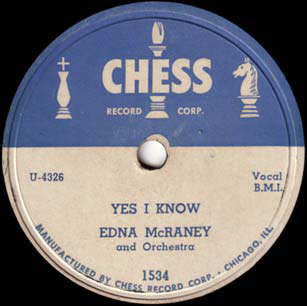
Revision note. We finally have a release date for Chess 1601 by Stomp Gordon; the company held it till August 1955. It's also occurred to use that the Joe Bisko who recorded four never-released sides in September 1955 might have been the Cowboy Joe Bisko who caught a mention in Cash Box in January 1954. Dr. Robert Stallworth has provided dubs and photos of the short-lived, elusive pop single by Tommy Nichols on Chess 1536 (recorded around January 1953). With help from Guido van Rijn and Daniel Gugolz, we have corrected the personnel on the Big Bill and Washboard Sam sessions, which took place around May 1953. We have added an obituary for Henry Gray, the blues pianist who died on February 17, 2020, at the age of 95. Now that the full severity of the Universal Studios warehouse fire on June 1, 2008 is publically known—the fire destroyed 175,000 or more masters controlled by Universal Music Group, including nearly everything UMG had acquired from previous owners of the Chess catalogue—we regretfully have to assume that any tracks or sides not issued in some durable medium prior to 2008 are lost, unless someone can show evidence to the contrary (Jody Rosen, "The Day the Music Burned," New York Times Magazine, June 11, 2019, https://www.nytimes.com/2019/06/11/magazine/universal-fire-master-recordings.html). We've revised our listing for Chess 1547 by Joseph Dobbins, which almost certainly was not recorded by Sam Phillips. We've discovered there was extended talk in Cash Box, in June and July 1955, about two further singles in the Chess 4858 series, one by Jimmy Lee and Johnny Mathis, and another by a Cherokee Joe Bennett. Neither materialized. We will also be adding information about the Reverend Utah Smith, who recorded Checker 785 (as with most of the Chess brothers' gospel output during this period, his was not a 45 rpm release).
In 1953, the Chess brothers continued to make their sessions at Universal Recording in Chicago. But after moving from 750 East 49th Street to 4750 South Cottage Grove (the move was announced in Cash Box for May 1, 1954, "Chess and Checker Records Move to Larger Quarters"), Leonard and Phil Chess opened a small studio in the back of their new offices. Announced in a Billboard article on June 19, 1954, this was mostly used for demos. Any recordings made there and used for release had to be done on the sly. Every effort was made to insure that it wouldn't, but the makeshift studio did eventually come up on the radar screen at Local 208 of the Musicians Union. And the sound quality attainable there fell well short of Universal's standards.

From early January through early May 1953, everything that Chess laid down at Universal was placed in the U4300 series. This had been opened in the ledger originally for Al Benson's freelance sessions. Over these four months, the matrix numbers ran from 4318 up through 4404; 4405 through 4410 were picked up in November and December 1953, and the last few items, through 4418, were afterthoughts in 1954. There is no evidence that any of the U4300s past U4317 (with a few exceptions that were released on Benson's Parrot label) involved performers under contract to Benson. It of course is possible that Benson supervised some sessions with artists who were under contract to Chess. In any event, the customary U7000 series was interrupted during this period, and we are faced with the challenge of dating sessions and interleaving their matrix numbers from two different series.
Before we started these pages, the U4300 system had never been fully charted. Many items with U4300 matrix numbers were missing from Michel Ruppli's Chess Discography, Volume 1.
Overall, the company recorded 169 new tracks, mostly in Chicago, but otherwise in New York City or New Orleans (the total includes documented alternate takes, but not gaps in the matrix series that may never have been filled). For the very first time, the Chess brothers recorded more new material than Aristocrat had laid down in 1947. At last they'd scored enough hits to feel comfortable making the investment.
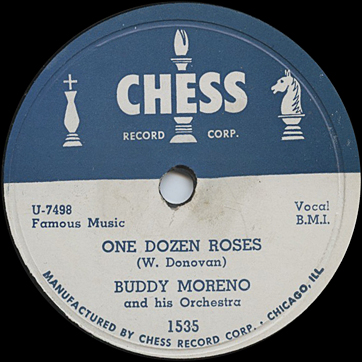
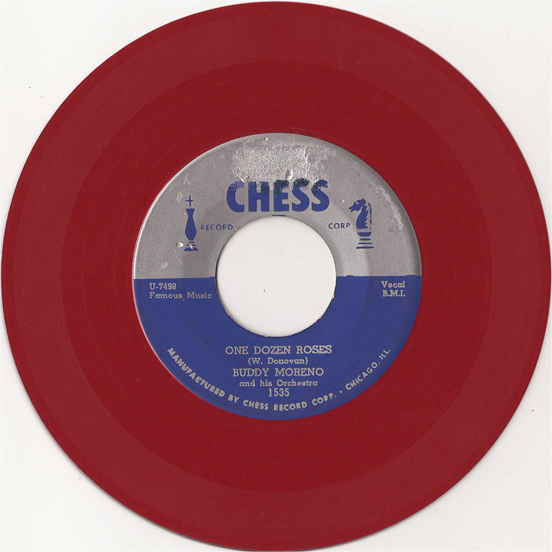
Probably in January, the Chess brothers recorded pop singles on two White bandleaders, both active in Chicago at the time. Buddy Moreno was working regularly in Chicago nightspots. Buddy Moreno was born Carlos Jesús Moreno in Los Angeles on July 14, 1912, and grew up in San Francisco, where he sang with a vocal group while still in high school. In 1933, Griff Williams put a dance band together in San Francisco and told Moreno he had a place in it if he would learn to play guitar. Moreno moved to the Dick Jurgens band around 1940 and was featured on many of their records, scoring a number 1 hit with "One Dozen Roses" in 1942. He then joined the Harry James band, replacing Dick Haymes, appearing in two MGM movies with the band, and doing commercials for Chesterfield cigarettes. Drafted in 1944, he took advantage of knowing Buck Clayton and other musicians in the all-black army band at Camp Shanks, New York, and performed with them when the military was still segregated. He started his own 12-piece band in Chicago in 1947, recording for RCA Victor. Needing a female vocalist he hired Audrey Perry (stage name Perri Mitchell). They were married in 1950, the same year that he had to downsize his band. Bookings at such establishments at the Blackhawk (where Moreno had an engagement starting August 24, 1949; Billboard, August 6, 1949, p. 33) had become too scarce.
Moreno recorded for Chess with a studio orchestra consisting of two clarinets and a bass clarinet (doubling two alto saxes and a tenor), 4 violins, electric guitar, bass, and drums. The illusion of a Hollywood orchestra was created without the brass section... or the payroll. Moreno offers the pleasant tenor for which he was known, and the clarinetists are good, but the ork is purposely producing the sappy rhythm that would become commonplace on Seymour Schwartz's Heartbeat label a few years later. The Chess brothers were expecting some sales on a remake of "One Dozen Roses," because they released Chess 1535 on both 78 and 45 rpm. Besides, "Let's Go Down to the Tavern" was effectively sponsored by the National Tavern Owners' Association (see the company ad in Cash Box, February 21, 1953), which was responsible for advance orders for 8,000 copies ("Tavern Owners Assn. Backs New Chess Disk," same issue of Cash Box).
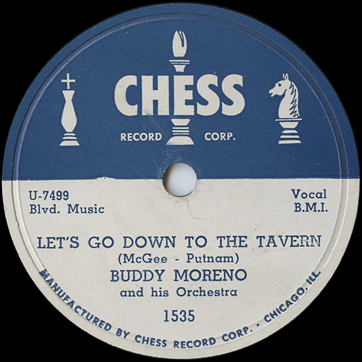
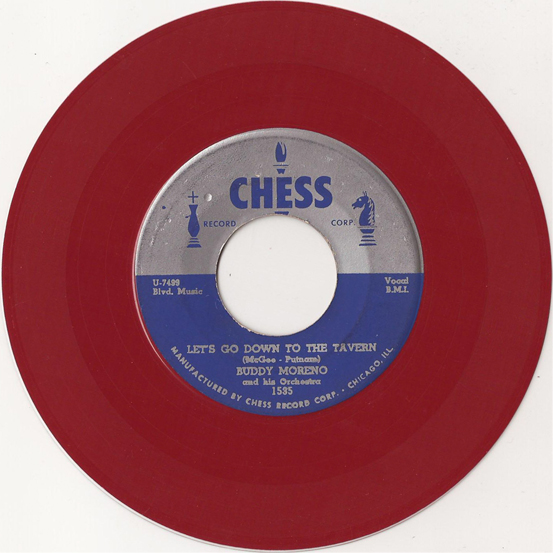
Moreno's hopes weren't riding on this record in any event. In August 1955, he began working as a DJ (broadcasting live in Chicago for WJJD from a supper club,The Old Heidelberg; Cash Box, August 20, 1955, pp. 7, 24). Then he accepted an offer of steady work from the Chase Club in Saint Louis, where he led the house band and his wife was a regular vocalist. He also ran a variety show on KMOX-TV. In the 1960s, he was a radio announcer with WHHM in Memphis, then for several stations in Saint Louis. He was the program director at WEW for 23 years. His final gig was a weekly big band program on WSIE out of Edwardsville, Illinois, which ran from 1996 till 2005. Buddy Moreno died at Delmar Gardens North, in University City, Missouri, on November 29, 2015. He was 103. (See Gloria S. Ross, "Obituary: Carlos 'Buddy' Moreno, a Swing-era Singer and Bandleader, Had the Number One Hit in '42," St. Louis Public Radio, November 30, 2015, http://news.stlpublicradio.org/post/obituary-carlos-buddy-moreno-swing-era-singer-and-bandleader-had-number-one-hit-42.)
Tommy Nichols was active in the Loop and on the North Side during this period. While Moreno was a big-band singer, Nichols most often accompanied himself at the piano, and seems to have remained a local artist.
In 1950 and 1951, Nichols got two releases on London, which was drawing a lot of material recorded in Chicago from James Martin's Sharp label, and some from the Universal label operated by Bill Putnam, by then on its way out. Both labels had made deals with London because of their poor distribution outside of Chicagoland. Billboard's reviewers thought that Nichols sounded like Buddy Clark, and that this was a good thing. London 789, which they found dull, was reviewed in the issue of October 28, 1950 (p. 116). Accompaniment on one side was by the Cliff Parman Orchestra, clinching a Chicago origin for the sides. A more favorable review went to London 875 (Billboard, December 23, 1950, p. 31). We figure that in 1951 the parent label (be it Sharp or Universal) didn't pick up Nichols' contract.
Chess 1536 is far scarcer today than Chess 1535. Until 2022 we did not know that that it had been issued on 45 rpm. We also didn't know the correct titles for the sides. Now that Dr. Robert Stallworth, who found a 45, has enabled us to hear it, we can at last report that the same studio ork (saxophone option only) accompanied on Chess 1536 as on Chess 1535. Nichols had a pleasant but strong voice that would have worked in country music, but the performances are strictly pop. The guitarist gets a little exposure, and on "Wail of the Wild Banshee" the violinists are required to show off their technique. Nichols didn't have the Tavern Owners' Association ordering his records by the carload. His single sold so poorly that after more than 20 years working on this page we still haven't seen a photo of the 78. The Moreno / Nichols session was given a block of matrix numbers in the U7000 series, which was then put on hiatus for four months. The first master from May had to be logged as U7501A because U7501 had—oops—already been allocated to one of Nichols' entries.
Nichols fell right off the Chess roster. Some months later, as the Sharp label was winding down, he got the vocal credit on "A Bottle of Wine and You" by Lee Monti & His Paisans (Sharp 57). By then Sharp had no distribution beyond James Martin's own operation. In December 1953 Martin dealt the disk to a company that had a bit more; it was reissued as Allied 5018 ("Allied Nabs Disk by Lee Monti," Billboard, December 26, 1953, p. 20).
In 1958, Nichols would resurface, likely for the last time, with a single on the Stepheny label, out of Evanston, Illinois (Cash Box, September 20, 1958, p. 24). Stepheny 1830 featured him on "Three Sisters (A-Tiri-Tumba)" and "Miss You," both accompanied by Joe De Salvo with the Villa Venice Orchestra. De Salvo, about whom we wish we could report more, got part composer credit on "Three Sisters."
The sales on Chess 1535 did not offer sufficient enticement. The Chess brothers would not get involved in pop music again until December 1955, when they started recording singles for their new Marterry label.
What might have been the first session of the new year (we aren't sure, because of the switch from the U7000 series to the U4300) featured Little Walter, now firmly ensconced as the first hitmaker for Checker. Scott Dirks has informed us that the original session log for 4318 through 4320, filled out by Bill Putnam at Universal Recording, reads "January '53." Our thanks to Dirks for providing take numbers and the correct track identification for 4319. No title for 4318 was supplied on the session tapes, but Putnam wrote down "fast boogie" in the log; 4319 was left completely untitled until the track was issued in the early 1990s ("Don't Need No Horse" is a rather dismissive reference to the clop, clop being produced by the Fred Below). Amazingly, nothing from the session was released. Perhaps the Chess brothers weren't interested in putting out a remake of Charles Brown's "Driftin'"—meanwhile, less than six months after "Juke" had become a hit, Walter and his band were cranking out top-quality instrumentals much faster than B sides were opening up.
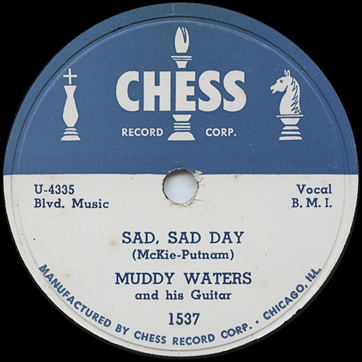
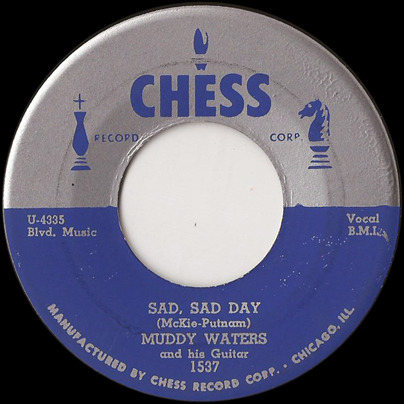
In a session usually vaguely attributed to the month of January, Muddy Waters returned to the studio for another four sides. Junior Wells had been drafted into the army, and his replacement, for just a little while, was "Big" Walter Horton. Horton's presence argues for January 9, when the company is known to have recorded him with Gus Jenkins. Although Horton played brilliantly on the session, and would do the same on some others for the company, this particular experiment would not be repeated. The band was rounded out with Jimmy Rogers on second guitar and an assertive drummer, whose cymbal crashes dominate "She's All Right." Willie Nix, also known to have been on hand for the Jenkins outing, is the likely candidate. Nix, too, was an experiment that would not be repeated. From Muddy's next session all the way to May 1955 (when Junior Wells cut a single number with him), his studio outings would be scheduled only when Little Water was in town and available. "She's All Right" (a breathless jump that picks up where the last verse of "Still A Fool" left off) and "Sad, Sad Day" were quickly paired on Chess 1537. "My Life Is Ruined," a lilting slow blues that made a considerable impact when finally released on an LP in the 1960s, was left in the can, as was the mournful "Flood."
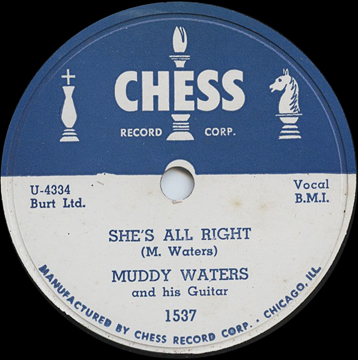
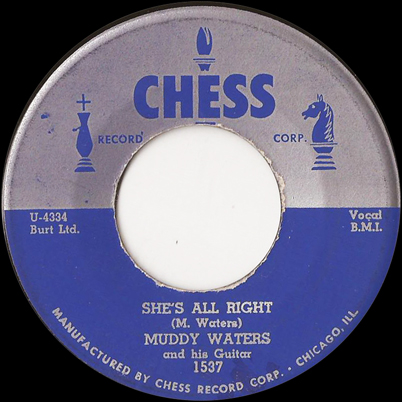
A sign of improved cash flow was the Chess brothers' increasing willingness to leave sides unissued. This was already apparent with the Little Walter session that started off the year. And just two tracks have ever been released from the get-together on January 9 that featured guitarist Honeyboy Edwards and pianist Gus Jenkins: "Drop Down Mama" (which had to wait 17 years) and "Eight Ball" (which had to wait a couple more). While "Drop Down Mama" is a respectable performance, and the band (just Edwards' guitar, Jenkins' piano, probably Willie Nix on drums) stays together throughout, there is a collective lurch from barline to barline, gently informing the listener that everyone on the session was drunk. It is unlikely that anything will ever happen with the other sides; indeed, the last two Edwards tracks are said to be incomplete. On his own four sides, Jenkins was joined by Nix and "Big" Walter Horton on harmonica, to little avail.
Both Edwards and Jenkins would get much better results in the future. Gus Jenkins moved to the West Coast, where he recorded for the Flash label in the late 1950s.
David Edwards was born in Shaw, Mississippi, on June 28, 1915; "Honeyboy" was a childhood nickname. His mother played guitar; his father played guitar and fiddle. HIs father bought him a guitar for $8; in 1929, hearing Tommy Johnson inspired him to learn how to play the blues. In the 1930s, Edwards played with Charlie Patton and Robert Johnson; he recorded for the Library of Congress in 1942. He made no commercial recordings until he settled in Chicago, in the early 1950s; the messed-up Chess session was apparently his first. His visits to the studio would be sporadic until 1969, when he appeared on the Fleetwood Mac Blues Jam in Chicago LPs. In 1972, he began an association with Michael Frank, who would serve as his manager, booking agent, and harmonica player for the rest of his career. In his later years, Edwards typically played 100 concerts a year—until he gave up touring at the age of 93. He recorded frequently, and published his autobiography, The World Don't Owe Me Nothing, in 1997. He played his last gig at a festival in Clarksdale, Mississippi, in April 2011, and died at his Chicago home on August 29, 2011. (See Bill Friskics-Warren, "David Honeyboy Edwards, Delta Bluesman, Dies at 96," New York Times, August 29, 2011, http://www.nytimes.com/2011/08/30/arts/music/david-honeyboy-edwards-delta-bluesman-dies-at-96.html?_r=2&emc=eta1; Caryn Rousseau, "Bluesman David 'Honey Boy' Edwards Dead at 96," Associated Press, August 29, 2011, http://www.google.com/hostednews/ap/article/ALeqM5gchxCWrQLlu02pVulvGf8e4pMZ-A?docId=672ac529d2024cb18089ab22077a6c86.
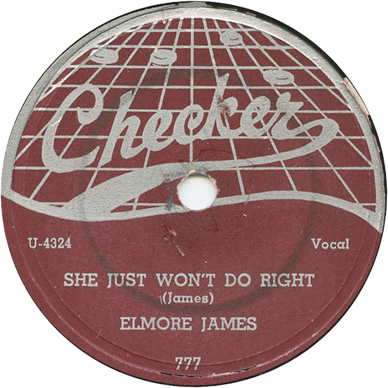
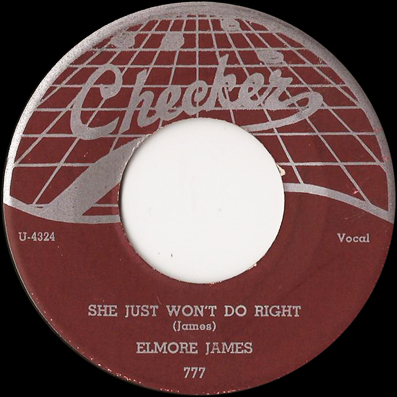
On January 17, the great bluesman Elmore James and his working band of J. T. Brown (tenor sax), Johnny Jones (piano), Ransom Knowling (bass), and Odie Payne Jr. (drums) paid a visit to Universal Recording. James and the Broomdusters, as they were usually billed, had been together since June 1952. They had recorded in Bill Putnam's studio in November 1952 and would be back there in April and August 1953, under the aegis of various labels run by the Bihari brothers, such as Meteor and Flair. Since Elmore James was under contract to Joe Bihari in January 1953, the outing for the Chess brothers was, well, irregular. But no effort was made to hide his identity when Checker 777 was released in July. Apparently, Leonard Chess had resolved to steal the bluesman, whose first releases had had a major impact on the market, away from a rival firm. Lester Bihari went so far as to accuse Leonard Chess of opening his mail at Plastic Products, the Memphis pressing plant that Chess, Sun, RPM/Flair/Modern, and Meteor all used.
Elmore James was born in Richland, Mississippi, on January 27, 1918, the son of a farmhand named Leola Brooks. He began playing the guitar as a boy. He met Robert Johnson and assimilated some of Johnson's repertoire while working juke joints during his teens. Around 1940 he began working with harmonica player Aleck Miller, then known by such handles as "Little Boy Blue," but later billed as Sonny Boy Williamson. After service in the Naval Reserve from 1943 to 1945, James returned to Mississippi where he was active on the local musical scene. He was slowed, however, by a serious heart condition that was first diagnosed in 1947. In 1951, he began recording as a sideman for Trumpet Records, a label based in Jackson, and in August of that year, he was prevailed on to cut a version of "Dust My Broom" at the end of a Sonny Boy Williamson session. The one and only side he made for Trumpet became a hit, but when he resumed recording as a leader it was for Joe Bihari's Modern label, in 1952.
Five sides were laid down at the James session. The mood is a little subdued by comparison with some of the sides he made for the Biharis, but all five tracks were strong performances. Two were selected for Checker 777, which was released in the summer. "She Just Won't Do Right" was rather brazenly worded as a sequel to James' Trumpet release. Checker 777 was withdrawn after the Bihari brothers found out about it and threatened legal action. Really, though, the company pulled records back from its distributors in super slo-mo. The single is nowhere close to the rarest that Checker put out—the unwithdrawn Checker 752 and 753 are much harder to find, and then there's Checker 757—though the 45s are encountered less frequently than the 78s. The rest of the titles stayed in the vault until they saw release on a Chess Vintage Series LP in 1969. As sometimes happened to Chess reissues during that period, the titles of the two released sides had been completely forgotten and new ones were substituted.
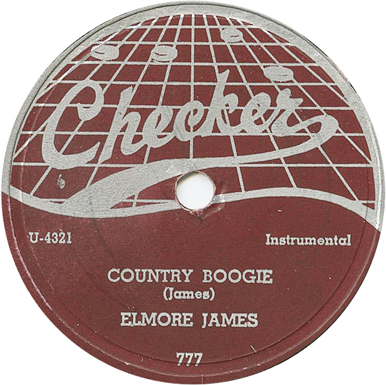
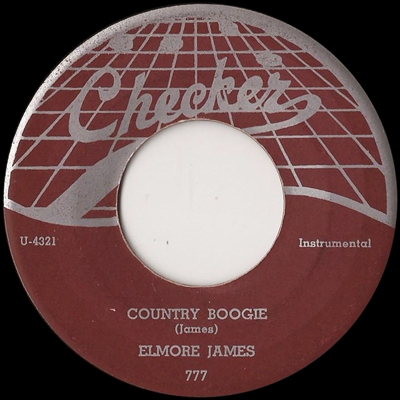
James stayed with Modern until 1956, when, faced with declining sales on all blues artists not named B. B. King, the company dropped him. After a brief affiliation with Mel London's Chief label (1957), James struck up an alliance with Bobby Robinson's Fire, Fury, and Enjoy operation, based in New York City, that lasted from 1959 until his death. In 1960, however, he snuck in a second session for the Chess brothers; it includes Elmore's lesson in how to swing a rock and roll number, "Madison Blues". His health worsening, Elmore James was finally ready to play a union joint again under the jurisdiction of Local 208 when he suffered a fatal heart attack in Chicago on May 24, 1963.
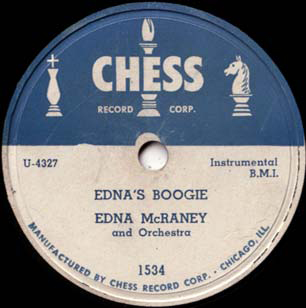
Next up (approximately, because the U4300 matrix number series was being handled casually; the January 9 sessions don't seem to have been entered into the master book until late February) were two sides by R&B shouter Edna McRaney, who had previously done a vocal duet with Jackie Brenston and another one with Eddie Johnson. She was backed by an unidentified combo of tenor sax, piano, bass, and drums. "Yes, I Know" was an obvious answer record, trying to benefit from the company's ongoing hit "I Don't Know." The tenor sax work is prominent and first-rate on both sides; since McRaney had already cut a duet with Johnson, and to our knowledge he was still in good health when the session was cut, he is an obvious candidate. Maybe someone knows who the excellent pianist was? But McRaney's only record as a solo artist, Chess 1534, was a 78-only release, and we infer less than scintillating sales.
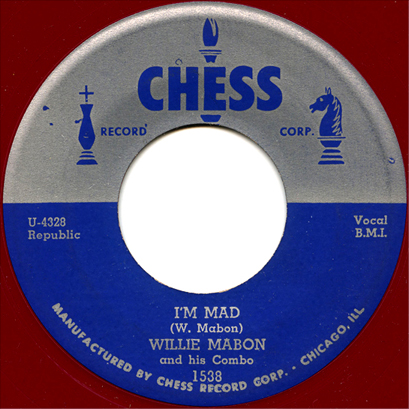
On February 5, Willie Mabon, now under contract to Chess, returned to Universal Recording for a follow-up to his breakthrough session. On this occasion, the pianist was accompanied by Fred Clark (tenor saxophone), Joseph "Cool Breeze" Bell (bass), and Steve Boswell (drums). "I'm Mad" successfully picked up where "I Don't Know" left off; it was coupled on Chess 1538 with "Night Latch," a sort-of instrumental on which Mabon wordlessly sang part of the theme. The other two sides had to wait for years to see release. (Cool Breeze, who had been on the scene since the late 1940s, got regular club bookings on the South Side for his combo, which often featured his own blues singing. But only Mayo Williams, then he proprietor of a boutique label called Ebony, and Bell himself ever showed an interest in recording the group.)
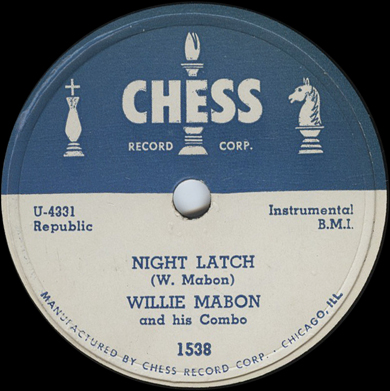
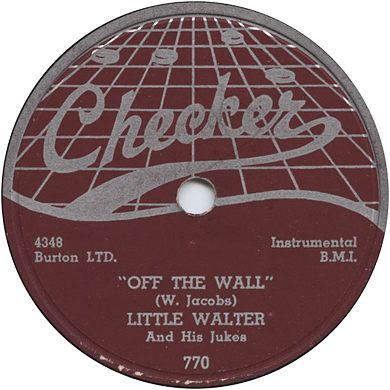
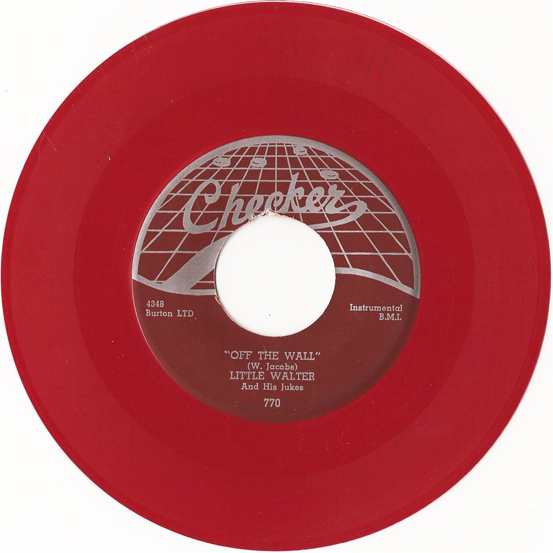
Little Walter and his Jukes made a return visit to Universal in early March of 1953. The company initially slated "Don't Want to Hurt No More" (misrendered as "Don't Want to Hunt"—it was an instrumental, so the misspelling wasn't self-evident) and "Tonight with a Fool" for release, on Checker 767. The instrumental side was one of Walter's best, but "Tonight with a Fool" (a phrase not to be found in the lyrics) was a run-of-the-mill downtempo number, with words apparently made up in the studio.
Plans were hastily changed—super-hastily, as 767 had already been advertised—and the company went instead with Checker 770. The replacement single coupled a virtuoso instrumental, "Off the Wall," with "Tell Me Mama," a snappier piece with catchier lyrics. Both sides of 770 are now considered classics. (The hasty abandonment of 767 would cause confusion later. Checker 767 was actually released for the first time in the mid-1960s, in a 45 rpm series that its producers thought were all rereleases.)
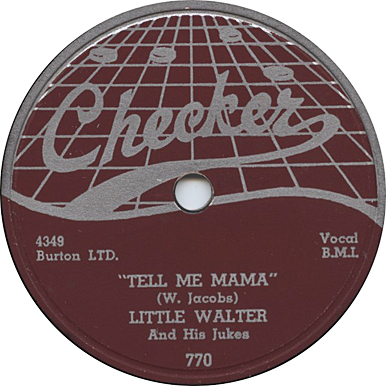
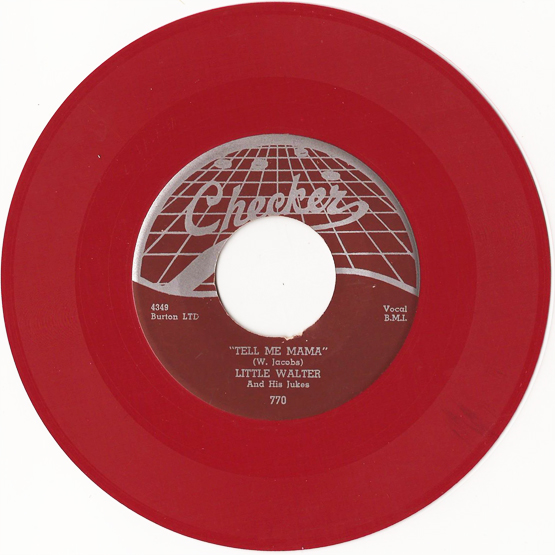
On the same day, the Chess brothers brought in John Brim to perform with the Jukes, just as they had previously recorded Floyd Jones at the end of a couple of Muddy Waters sessions. According to Glover, Dirks, and Gaines, Little Walter was responsible for bringing Brim to the label. Leonard Chess had made noises about signing him, but seemed to be interested only in Grace Brim as a singer. But at Walter's insistence it was John who recorded. Though the group was billed as the "Gary Kings," "Rattlesnake" and "It Was a Dream" were backed by Walter himself, playing as brilliantly as he ever did on his own sides, along with Louis and Dave Myers, guitars, Fred Below, drums, and Willie Dixon, discreetly added on string bass. In fact, "Rattlesnake" makes excellent use of the same rim clopping that Below had previously essayed on "Don't Need No Horse."
Through some terrible luck, Checker 769 was shelved shortly after it was announced. After holding back for months on Big Mama Thornton's "Hound Dog," Don Robey of Peacock had been prevailed on to release it and was now suddenly enjoying a hit. He sued Sam Phillips over Rufus Thomas's "Bearcat: The Answer to Hound Dog," also recorded in early March. Sun Records did not withdraw the single; the company just took the subtitle and other references to "Hound Dog" off the label, and kept racking up sales. But Leonard and Phil Chess were obviously afraid that Robey would go after "Rattlesnake" as well. So "Rattlesnake" and "It Was a Dream" would have to wait till the late 1960s, when they finally came out on a British LP.
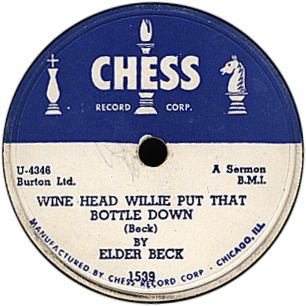
Around this same date—the matrix numbers are actually sandwiched in among those from Little Walter's session, though we will not read them literally—Chess began recording the prolific gospel sermonizer, Elder Beck. Charles Beck was a veteran preacher in the Church of God in Christ. He played trumpet, organ, vibes, bongos, probably several other instruments, and had been recording his "religion in rhythm" off and on since 1930. His most recent record company affiliations had been with Gotham (1948-1950) and King (1950). A title like "Wine Head Willie Put That Bottle Down" told the listener exactly what to expect. The Elder played the organ; his fire and brimstone were otherwise given a sparse accompaniment of electric guitar, piano, bass, and drums. And someone took the hapless Willie's speaking role ("Oh Lord, here come the Reverend"). "I'm Gonna Tell God" is an R and B ballad about all the wrongs someone did to the singer; only the tale's intended audience is different. Since the Chess brothers did not expect gospel buyers to own the latest equipment, and placement on jukeboxes was not widely anticipated, Chess 1539 was released on 78 only.
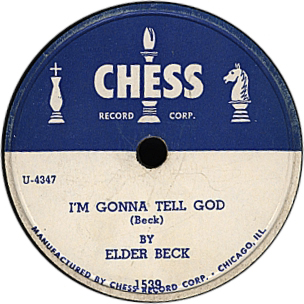
While the Chess brothers were continuing some degree of collaboration with Al Benson, it looks plans for coordinated releases were included, with Checkers and singles on Benson's fledging Parrot label sharing the same number. However, so far as we've been able to determine, none of the coordinated releases actually took place. Benson recorded two sides by a vocal group that he had named the Parrots, after his new label. But Parrot 772 was not joined by a Checker 772, even though Leonard and Phil Chess had left a space for it in their release series. We mention them here because there apparently was once a plan to put them out on Checker and they belong to the U4300 matrix series. For more, we refer readers to our Parrot page.
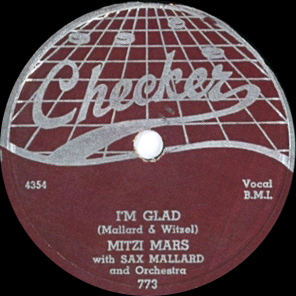
On March 29, Mitzi Mars cut two sides for Checker. Ms. Mars was a brassy nightclub singer, who often made her appearances wearing a blond wig. She had been in the South Side clubs since at least 1951, when she made an extremely obscure record for JOB with Henry Palmer and his Boys. Unfortunately, the songs she was handed for that session were incredibly inane and dated. An answer song to "I'm Mad" was much better suited to her, so the company rolled the dice again after Edna McRaney's commercially unsuccessful reply to "I Don't Know." The flip, "Let It Roll" (on which Ms. Mars employs an Eartha Kitt-like device, stretching "roll" into "rolllll-a"), builds some considerable momentum. Expert backing was supplied by Sax Mallard (playing tenor sax on this R&B date) and his quartet. By May 22, in a Cash Box advertisement, the company was bragging about the orders for Checker 773 that were rushing in from Atlanta and Pittsburgh and Memphis. The record sold so well that it started bringing Sax Mallard more gigs (Cash Box, June 18, 1953).
The Chess brothers had recorded Jackie Brenston in Chicago in December 1951, in a session that led to the release of two singles. After Chess 1532 came out in December 1952, with less than gratifying results at the cash register, they decided to give him one more try. he session of April 17, 1953, with unidentified tenor sax, piano, guitar, bass, and drums, produced 8 sides—not one of them deemed suitable for release. Only two have ever seen the light of day, on a Japanese LP issued many years later. The Chess brothers were now fed up with Brenston, whose entire career, when he was not back working as a sideman, fruitlessly kept trying to re-create the one hit record that had launched it.
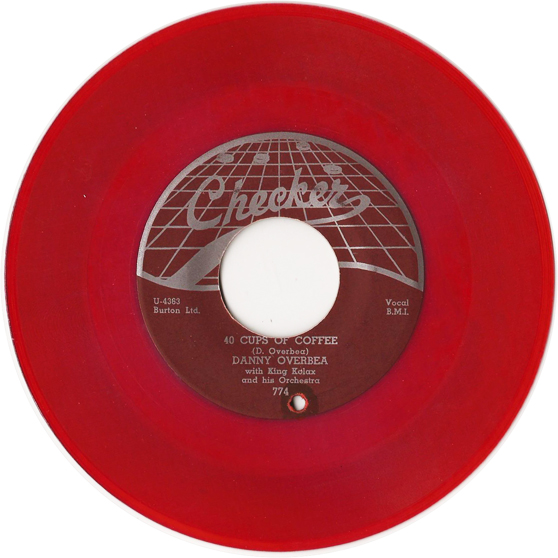
During what was shaping up to be a busy month, Danny Overbea returned to the studio. Although his first session had been recorded for Al Benson, he was now under contract to Checker. Overbea recorded four sides with accompaniment, once again, by King Kolax and his band. Checker 774 paired an uptempo blues with a catchy hook and lots of guitar soloing ("40 Cups of Coffee") with a pretty good ballad ("I'll Follow You"), on which Overbea managed to keep his sap habit under control. Besides Overbea's guitar, the instrumental lineup consisted of King K's trumpet, Dick Davis's tenor sax, plus a rhythm section of Prentice McCarey (piano), Mentho "Cowboy" Martin (bass), and "Little Gates" (drums). As typically happened with Overbea's efforts for the company, the other two sides were left in the can.
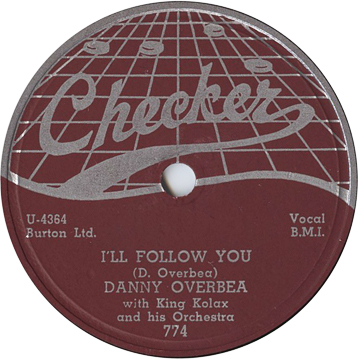
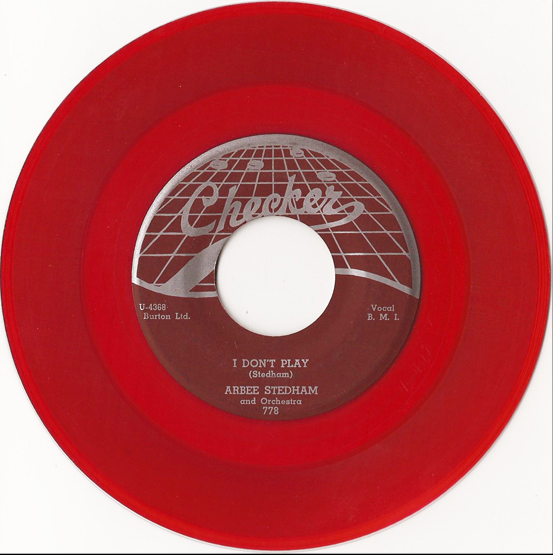
Next, Arbee Stidham returned to Checker for his third and last session. On this occasion, the quavery-voiced baritone was accompanied by J. T. Brown's tenor sax and Odie Payne's drums, along with a still-uncredited trumpet player, second saxophonist, pianist, and bassist. Two sides were released on Checker 778, pressed on both 78 and 45. The record was reviewed in Billboard (July 18, 1953, p. 57), but copies are far from plentiful today. Another two tracks have never been released; some sources, in fact, have credited them to Danny Overbea. We've gone with Stidham here, but it seems as though some further vault research is needed (we don't know whether it's still possible).
Like the other older blues performers the company had been trying out for the last couple of years, Arbee Stidham was not invited back after this session. He next surfaced on Joe Brown and Eli Toscano's Abco label, releasing two singles in 1956. In 1957, he was responsible for a strong outing with an Al Smith band that proved to be the swan song for States. As audience interest declined during the late 1950s, there was a three-year period of no recording. When Stidham made his comeback in 1960, with an LP for Bluesville, he was featured on the guitar. Two LP sessions for Folkways (both featuring Memphis Slim) followed in 1960 and 1961. His last session was done for Sam Phillips in Memphis in 1965; nothing was released off it till years later, though in the early 1970s, still actively performing, Stidham was featured in a short film.
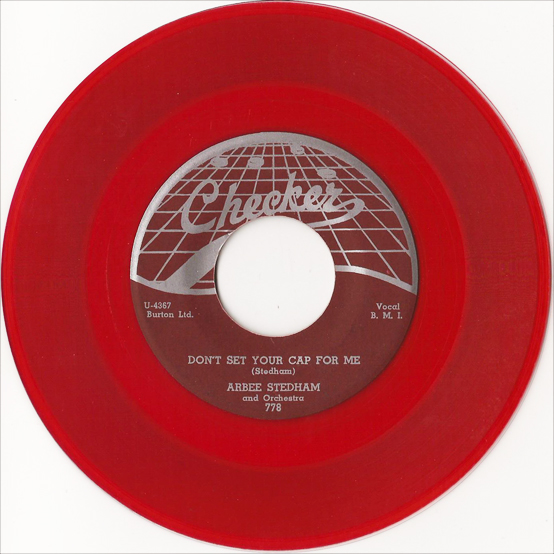
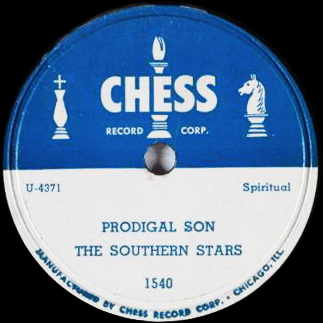
Next, if we take the matrix numbers literally, the Southern Stars cut two more gospel numbers, which were released on Chess 1540. Hayes and Laughton opine that these two sides were recorded back in 1952 and came from the same session that produced Chess 1520. Since Chess purchased at least the former two sides from another company and it would purchase at least two more on the group later, we have very little to go on here (and while we admit that a jubilee-style gospel group accompanied only by a little acoustic guitar won't sound terribly different recording in a different venue, we haven't heard the sides). Although Chess would release four singles on them, the Southern Stars of Richmond seem to have remained a regional act. Chess 1540, with "Prodigal Son," showed up in an ad for Cleveland's Music Center in Danville, Virginia (The Bee, June 25, 1953, p. 10B). The Southern Stars were one of three gospel groups on a bill at the YMCA in Petersburg, Virginia, on October 18, 1953 (Progress-Index, October 1, 1953, p. 24). Like most of the company's gospel releases, Chess 1540 was 78-only; today it is also much scarcer than Chess 1520.
We should note, however, that Cash Box announced (January 23, 1954, p. 19) that "that new spiritual group, The Southern Stars, were discovered by the Sinsheimer boys of Richmond, Va. The tape sent here [Chicago] to be placed on Chess shellac." Of course, it also made Chess 1556 out to be the group's "very first," and it was their third release on Chess. Maybe it was the promotional efforts that were starting over.
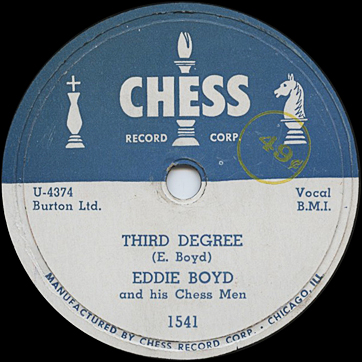
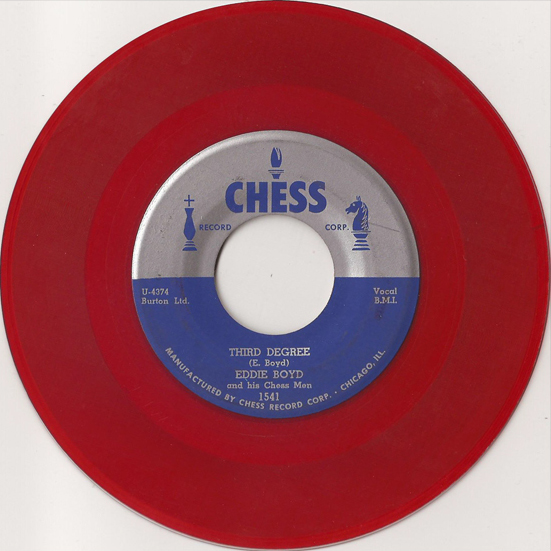
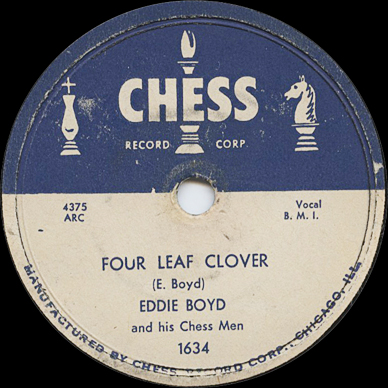
A session in May brought Eddie Boyd and his group into the studio for four tracks. "Third Degree," Eddie's tale of woe based on the traditional "got me 'cused of forgin'" theme, and a solid instrumental, "Back Beat," promptly formed Chess 1541, released on both 78 and 45. The other two sides were also released. "That's When I Miss You" didn't have to wait too long, just till Chess 1552. But "Four Leaf Clover," a euphoric tribute to his girlfriend's good-luck properties, was held back until 1956. Boyd was backed by Robert "Little Sax" Crowder (on the tenor instrument), Echford "Lee" Cooper (guitar), and Percy Walker (drums), plus a man who was beginning to be omnipresent—Willie Dixon on bass.
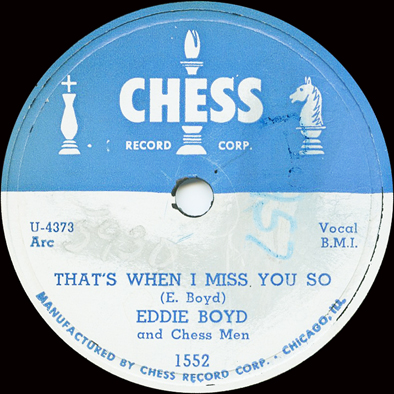
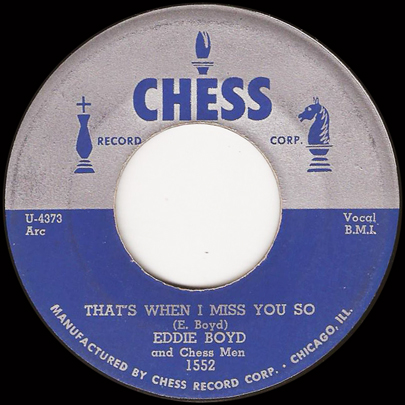
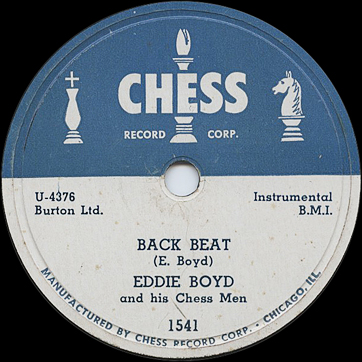
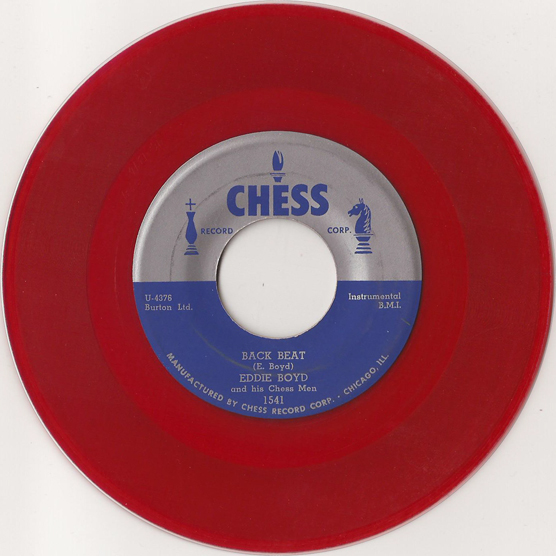
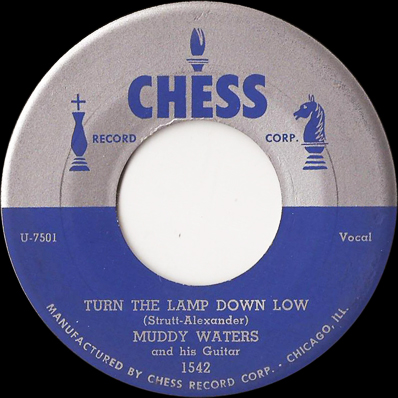
Another memorable session with multiple leaders took place on May 4, when Muddy Waters cut two sides ("Turn the Lamp Down Low" was the title originally used for the A side, but entire rest of the world knows it as "Baby Please Don't Go"). By now, Henry "Pot" Strong was Muddy's regular harmonica player, but the company still preferred to use Little Walter on his recording sessions. "Turn the Lamp Down Low" was released right away, on Chess 1542 (78 and 45), while "Loving Man" (in accord with the lyrics, it should have been titled "Lover Man") was held for use as a B side, appearing in December 1954 on Chess 1585 (Cash Box reviewed it on January 22, 1955, p. 30).
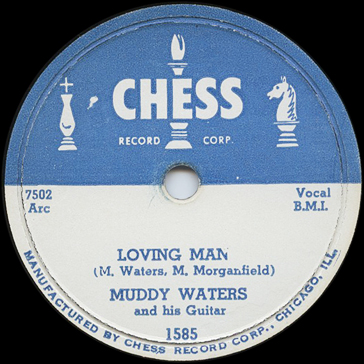
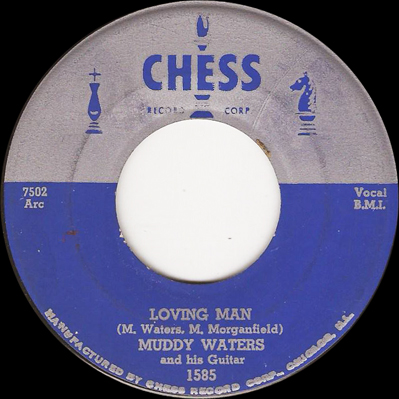
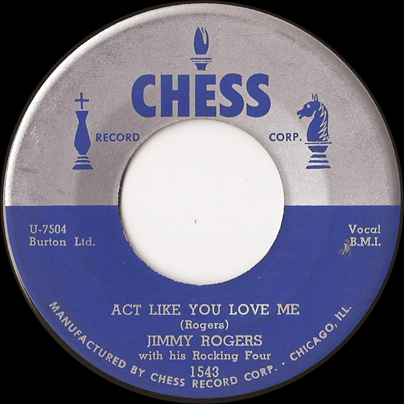
Jimmy Rogers followed suit with "Act like You Love Me" and "Left Me with a Broken Heart," both promptly released. "Broken Heart" was a Memphis Minnie composition that she had already recorded for Checker. Then John Brim finished the session with two of his own. Since Little Walter was in the studio on this occasion to accompany Muddy, the melancholy "Lifetime Baby" and amiably salacious "Ice Cream Man" put Brim in with Walter, Jimmy Rogers (not Eddie Taylor as suggested in some discographies), and Muddy's regular drummer, Elga Edmonds. Willie Dixon, whose string bass is often barely audible on sessions from this period, was definitely on the Jimmy Rogers sides. The Muddy and Rogers sides would soon reach the store shelves. But for some reason (lingering soreness over having to withdraw "Rattlesnake"? a reference to pineapple ice cream that Leonard Chess thought was silly?), the Chess brothers passed on "Ice Cream Man," which had to wait 15 years for release. Brim would make his next session for Al Benson's Parrot label. Only after "Tough Times" was a hit for Benson would he be able to return to Chess—and actually get his recordings released.
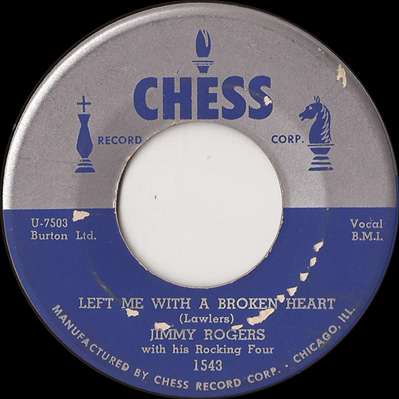
On May 11, Morris Pejoe returned for a second session, cutting four sides that did not please the Chess brothers. At least that is our inference, because nothing was released from the session at the time, and nothing has been since then. (Since Pejoe would later record for United a slow, plaintive blues addressed to a woman with the fairly implausible name of "May Bea," we suspect that it was one of the titles made on this occasion.) He recorded again in July, on a session that produced a release. If the unreleased track U7633, from April 1954, is really Pejoe's, the company actually gave him four tries before dropping him from the roster.
At the end of the session, Pejoe's pianist Henry Gray cut two vocal numbers of his own, which eventually saw release in the early 1970s; an alternate take had to wait till 1984. Solid blues performances, these are of further interest to today's listeners because they are the only surviving studio recordings featuring Henry "Pot" Strong's harmonica; the remaining personnel were Pejoe on guitar and Earl Phillips at the drums. But in those days Gray was much more highly valued as a session pianist than as a leader or a singer. Exactly the same thing would happen to him when he cut for Parrot/Blue Lake in 1955.
Henry Gray was born in Kenner, Louisiana, on January 19, 1952. He was brought up on a farm in Alsen, Louisiana, which is just north of Baton Rouge. He began taking piano lessons when he was 8. After serving in the United States Army during World War II, Gray moved to Chicago, In Chicago Big Maceo Merriweather became his mentor. Gray's first studio work was with Jimmy Rogers, for Chess in 1952. After his session for Parrot, Gray became Howlin' Wolf's regular pianist, a job he held for 12 years. During this period, he also did a lot of session work for Chess. In 1968, Gray moved back to Louisiana; in 1977, he got his first LP as a leader. Gray continued to work into his 90s; his last CD, titled 92 for his age, was recorded in 2017. One of the last surviving artists to record for Chess and Checker during this period, Henry Gray died in Baton Rouge, Louisiana on February 17, 2020, at the age of 95.
Next in the matrix number series were two sides that Al Benson recorded on Herbie Fields, a jazz musician who played alto, tenor, and baritone saxes and led a strong sextet. Discographical controversies have raged over these for years, and not all of the questions have been resolved, but Fields and his combo appear to have recorded in April 1953. The first release from the session, pairing two tributes to Johnny Hodges, "Harlem Nocturne" and "Things Ain't What They Used to Be," was intended as as another joint project of Checker and Parrot. However, while copies of Parrot 775 (which sold well enough to chart) aren't too hard to find today, we have yet to encounter a Doppelgänger on Checker—the only indication of one-time plans is the gap in the release series where this single was supposed to go. (The second release from the session will not be listed here, because it came out in 1954, after Parrot and Checker had gone their separate ways and Benson had adopted a new matrix series.)
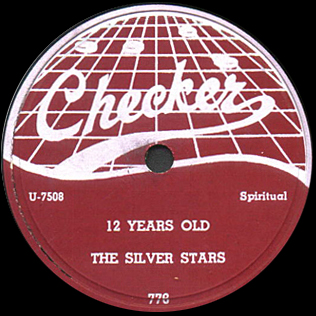
Two sides by an all-male gospel group called the Silver Stars were done next. Hardly anything is known about them, and Checker 776 (78 rpm only) is a very rare record today. A group by the same name had recorded one single for Hi-Lo a year earlier, and two singles on the Ebenezer label would be likewise credited. Probably in 1954, a group billed as "Silver Star" recorded at Universal for the tiny Chicago-based C. H. Brewer label; could this have been the same ensemble? Obviously, more research is needed...
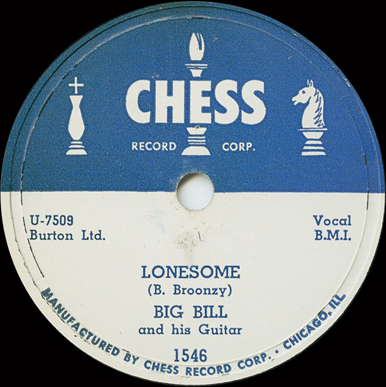
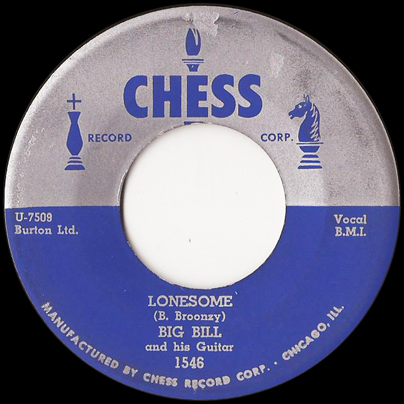
They'd tried Memphis Minnie the previous year. Now the Chess brothers turned to two other veteran blues performers who had been regulars with the Melrose combine, and had since been displaced by the company's down home blues acts. During a couple of sessions in May 1953, the company cut four sides by Big Bill Broonzy and no less than ten by Washboard Sam. Just one single was released on each of these artists, however.
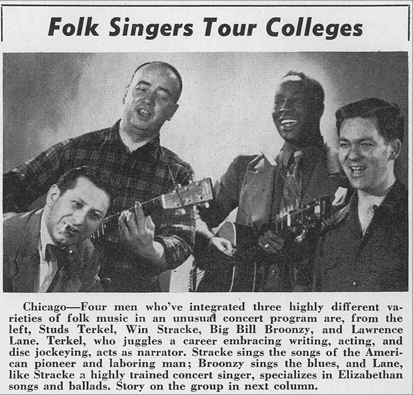
Big Bill Broonzy was not originally named William—or Broonzy. He may well have been the only person ever to employ Broonzy as a surname, as appears to have made it up. He also claimed to have been born in Mississippi, and, in the time-honored manner of Jelly Roll Morton or Bunk Johnson, to be as many as 10 years older than he really was. We are indebted to Bob Riesman, whose definitive biography (I Feel So Good: The Life and Times of Big Bill Broonzy, Chicago: University of Chicago Press, 2011) dispels the myths and keeps the substance of a remarkable musician's life. The bluesman was born Lee Conley Bradley, in Arkansas, in 1903; his origin there was not the best-kept secret, since well into the 1950s he was visiting relatives in North Little Rock every year or two. Big Bill's recording career began in Chicago in 1926, leading to a prolific output on several labels in a variety of styles. In 1953, Big Bill had recently worked through a brief career slump (for a while he was in Iowa City, on a day job as a janitor at the University of Iowa) and successfully rebranded himself as a folk singer. In that new capacity, he had already made two tours of Europe and recorded a 10-inch LP in Paris. He had also recorded for Mercury, in 1951 and 1952, with an R&B audience still in mind.
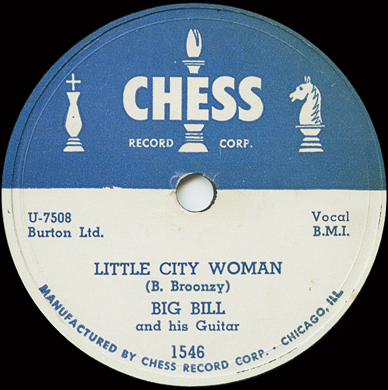
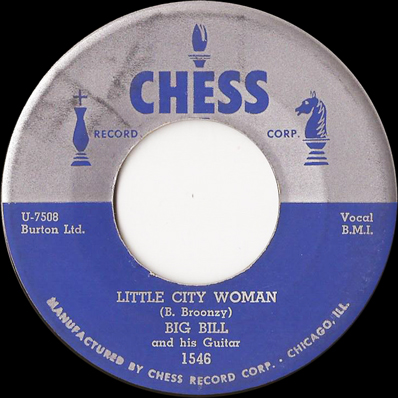
There are some myths to dispel about the Chess sides that Bill made with Washboard Sam, some featuring Bill as the leader, some featuring Sam. According to Michel Ruppli's Chess Discography (Volume 1, 1982), Echford "Lee" Cooper played electric guitar on the sides without piano, and Memphis Slim was the pianist on the sides with piano. After discussions with Guido van Rijn and Daniel Gugolz, and consulting Chris Smith's 1995 discography on Big Bill, we have made several corrections to what we formerly listed here (we'd followed Ruppli, except where we interpolated the month of recording; Ruppli wrote "1953"). We can now sayd sides without piano were the work of Big Bill (electric guitar), Ernest "Big" Crawford (bass), and Washboard Sam. (Daniel Gugolz still thinks the electric guitar solos on U7511 through U7513 were by Lee Cooper, but on U7511 Sam calls "All right, take it Big Bill, take it" before the final guitar solo). When the piano was added, it was by Bob Call. Instrumentation notwithstanding, Big Bill made an effort to update his sound on the four sides he cut as a leader, aiming "Little City Woman" and "Lonesome" squarely at Chess's down-home clientele. They were, in fact, chosen for release on Chess 1546.
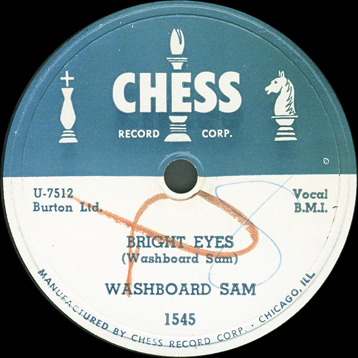
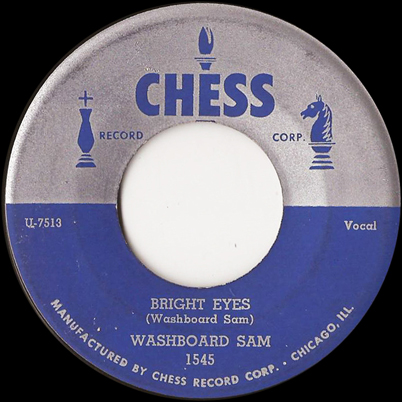
Washboard Sam (who was born Robert Brown in Jackson, Tennessee, on July 15, 1903) reeled off three sides with Big Bill (electric guitar) and Big Crawford (bass). Far as we can tell, these were from the same session as Big Bill's four. Not too long afterwards, Sam taped another six sides with Bob Call (piano), Big Bill, and Big Crawford. Sam's release on Chess 1545 paired an ominous slow blues, "Bright Eyes," with a remake of his hit "Diggin' My Potatoes." Sam was less interested in updating, however; his rendition of Broonzy's "By Myself" (on which Big Bill contributes the backing vocal) keeps the old Bluebird beat. "Shirt Tail," not used on a single, is a tour de force of washboard technique (yes, there is such a thing), and Sam's instrument was well recorded throughout these sessions. Although U7516 places "Shirt Tail" in the session with Bob Call, a comparison with the other five sides shows how effectively Call's piano masks some of Sam's work on the washboard. So Call sat out the washboard feature.
Two sesssions produced enough material to fill an album. Which leads us to think that the Chess brothers were considering one at this early date. But they would not make the move into LPs for another 2 1/2 years. Only with the 1961 release of all but one of the known sides on Chess LP 1468 did these tracks truly find a home.
Ruppli claimed a second version of "Diggin'" on U7514, but no second version is credited in Chris Smith's discography and Guido van Rijn has stated that every issue he has heard is of the same performance. We do agree with Ruppli about the matrix numbers on the other sides from these sessions, simply because Ruppli had access to some kind of company documentation, at a minimum what was used in compiling the LP in 1961. We will not renumber "Shirt Tail" as U7514, etc., without seeing some concrete counterevidence. A lacquer from Universal Recording with a matrix number on it that agrees with Smith would do nicely; does anyone have one?
The lack of sales on his Chess single made little difference to Big Bill, who continued to perform and record extensively, in the USA and abroad, until he became ill toward end of 1957. Lee Conley Bradley aka Big Bill Broonzy died of throat cancer in Chicago, on August 14, 1958; he was 55 years old. Artists who had worked with him and enjoyed his support on the Chicago scene produced several tribute recordings, including an LP of his songs by Muddy Waters. Meanwhile, Washboard Sam would prove less resilient as a performer. His career already in decline, Sam shows some vocal fatigue on such numbers as "Diggin' My Potatoes." "Horse Shoe over My Door" refers to carrying a police club in his pocket; he had worked for Chicago PD before the session and probably continued afterward. Sam recorded very little after his Chess session. Washboard Sam died in Chicago on November 13, 1966.
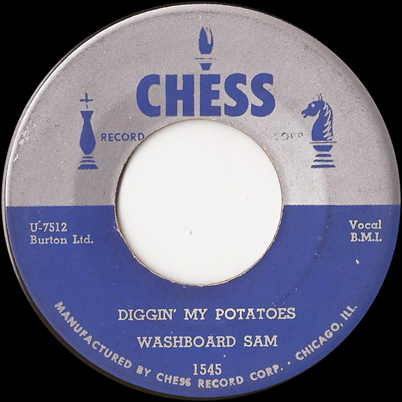
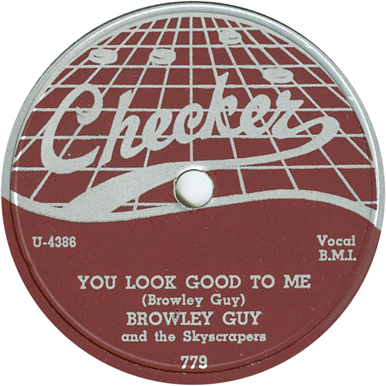
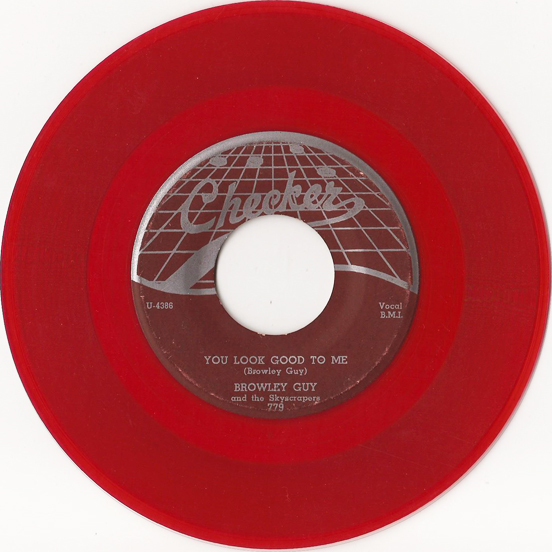
A session usually dated June 10 marked the final collaboration with Parrot, which Al Benson was about to take independent. Baritone crooner Browley Guy, a 1936 graduate of Wendell Phillips High School, had recorded for Miracle and States. By 1953 his lugubrious manner at slow tempos and the harmonies of his vocal group, the Skyscrapers, had become dated. As always, Guy and Scrapers were much better when not doing ballads, so the near work song, "Watermelon Man," is the side of Checker 779 that would still interest listeners today. We know of no Parrot 779—another joint release may have been intended—but the tapes remained in Al Benson's possession and tracks from the session (including the two left unissued on Checker) have appeared only on Parrot reissue compilations. The Skyscrapers would cut one more session, for Mercury in January 1956, before passing into history. Browley Guy recorded for Vee-Jay in 1963 as a solo artist; Vee-Jay 541 was his last single.
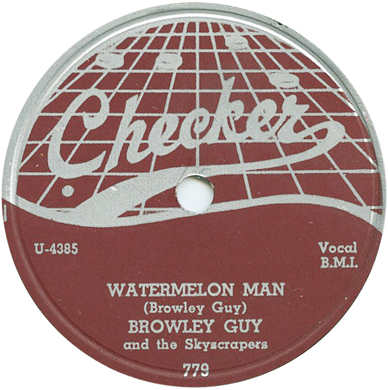
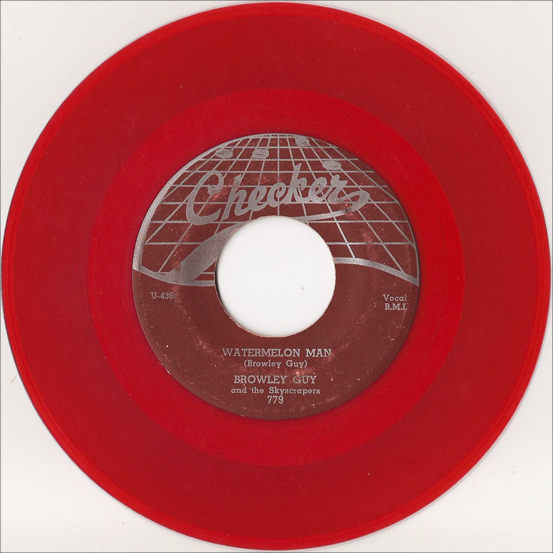
The company was sufficiently encouraged by "I'm Glad" to bring Mitzi Mars in for a second outing. But none of the four tunes have ever been released. Ms. Mars continued to perform locally for the remainder of the decade; what she did after that is unknown to us.
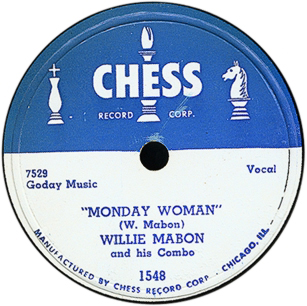
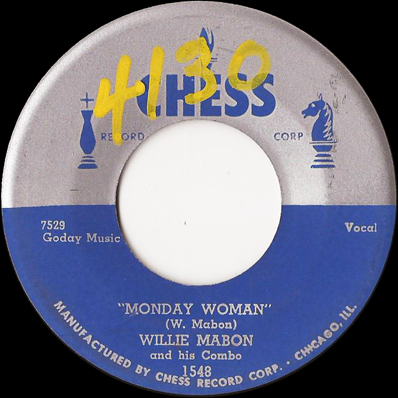
In June 1953, Willie Mabon laid down two more tunes, including the rollicking "Monday Woman." The band for this occasion included Milt Larkin (trombone), Charles Ferguson (tenor sax), Ted Sturgis (bass), and unidentified musicians on trumpet, alto and baritone sax, and drums. The involvement of Sturgis, who did a lot of session work in New York, and Larkin (who had once led the big band that brought Tom Archia to Chicago, and later led R&B combos that recorded for Sunrise and Savoy) tells us that the session was recorded in the Apple while Mabon was on tour. What's more, the composer credit on the flip, "You're a Fool," goes to Joel Turnero, a New York-based producer and arranger. Just over a year later, Turnero would parachute into Chicago to supervise a session by the vocal group the Spaniels for Vee-Jay.
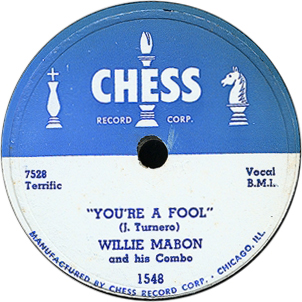
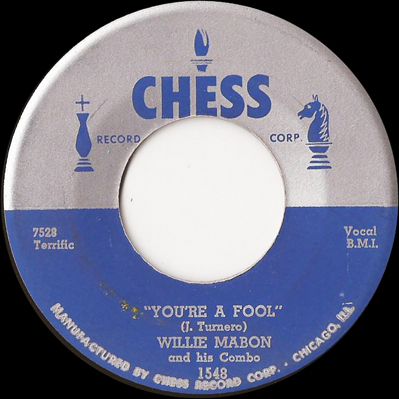
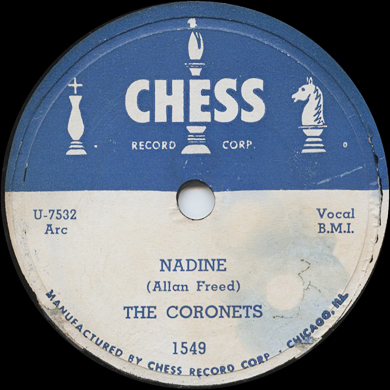
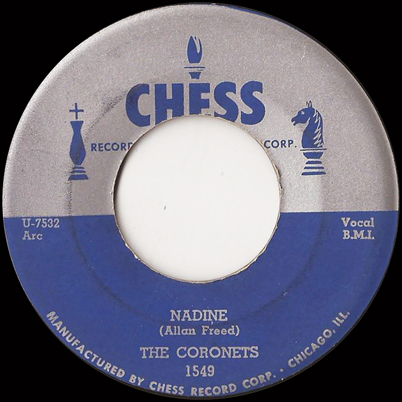
In June, Cleveland DJ Alan Freed brought a second act to the label, a vocal group called the Coronets. The group was formed by second tenor Sam Griggs, who recruited his brother William to sing bass and two former classmates from Thomas Edison High, first tenor Lester Russaw and baritone George Lewis; the group was completed by Charles Carruthers, who sang lead, and guitarist Tony King. The group started hitting the clubs in Cleveland early in 1953; after making a demo of two songs at a Cleveland studio, the Coronets got Freed to listen to it, and he signed the group to a management contract. Unlike the Skyscrapers, the Coronets were a doowop group, and the single that resulted, on Chess 1549, was a solid contribution to the genre.
Accompaniment was provided by Sax Mallard's quartet; the leader lays out on the ballad, "Nadine," but his tenor sax can be heard to advantage on the jump side, "I'm All Alone." Both songs were in the group's initial (very limited) repertoire, previously appearing on the demo they'd made for Freed. The Coronets did not see eye-to-eye musically with Mallard and his musicians, and were dissatisfied with the results; however, the conflicts were not of the sort that would be apparent to listeners, then or now, and "Nadine" spent 10 weeks on the Billboard R&B charts, peaking at #3.
Freed did not endear himself to the group's members by appropriating composer credits. The theft was more serious in the case of "Nadine," which was Carruthers' song. "I'm All Alone" had already been filched from B. B. King, whose "Woke Up This Morning" was released in March 1953 when the group was getting started.
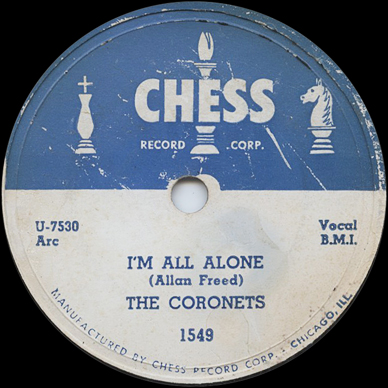
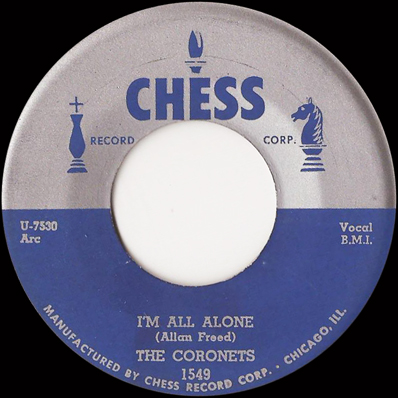
The matrix numbering of the company's July sessions is confusing, to say the least: sessions seem to wrap around sessions that seem to wrap around... There may have been a trial run of two sides by Little Walter, then a longer session (or sessions) from which releasable results were obtained. But we really don't know.
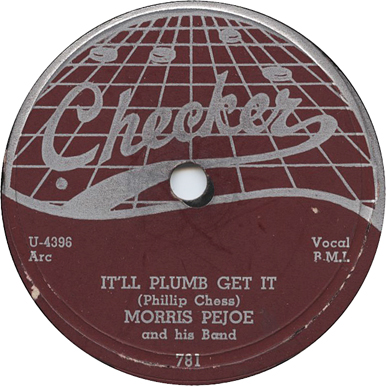
To keep things manageable, we'll start with the four sides that Morris Pejoe laid down at some point during July, on his third session for the label. This time, the Chess brothers were pleased with the Louisiana bluesman's output, selecting "Can't Get Along" and "It'll Plumb Get It" for release on Checker 781 (available on 78 and 45). Maybe they liked "It'll Plumb Get It" a little too much... Phil Chess claimed to have composed it. The guitarist was accompanied by Henry Gray on piano, plus unidentified musicians playing tenor sax, bass and drums. Checker 781 is a hard-driving blues release, quite listenable today, but it must not have met the sales targets that had been set for it. Pejoe would cut just one more side for the Chess brothers, early in 1954, and they didn't release it. He next showed up at the end of that year, recording for United in a session held in Al Smith's basement. In May 1955, Pejoe made one single for Vee-Jay; as soon as the Vee-Jay contract was up, in May 1956, he did one for Abco.
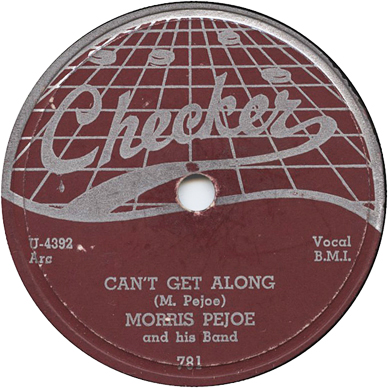
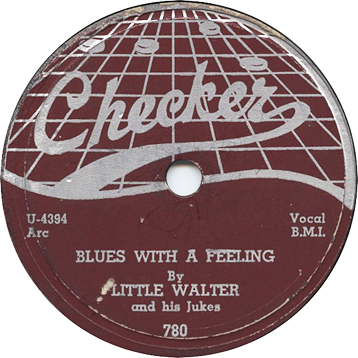
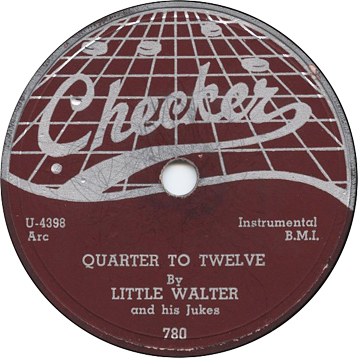
While there may be some doubt about exact recording dates, there is none about the quantity or the quality of Little Walter's contributions. The harmonica-playing leader was absolutely on fire, cutting 11 sides in less than a month. What he needed was an LP: Walter and the Jukes were turning out instrumentals much faster than the Chess brothers' release schedule could ever hope to absorb them. The sessions gave rise next two singles, Checker 780 and 786. So strong a vocal number as "Too Late" had to wait two years for release, and some of the instrumentals would spend 40 years in the vaults.
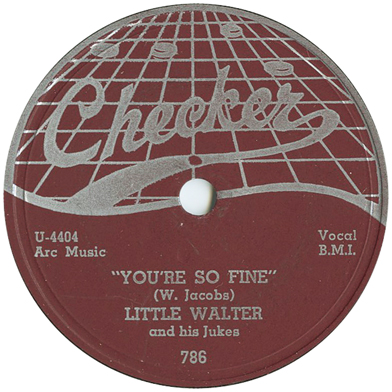
"Too Late" made its tardy appearance on Checker 825, released in September 1955. The coupling was "Hate to See You Go" from Walter's session of April 28, 1955. The first ad for 825, along with a bunch of other Chess and Checker releases, ran in Cash Box on October 1, 1955 (p. 33). A feature review ran in the same issue (p. 34). The company ran another multiple-release ad in Cash Box on October 8, 1955 (p. 23). Checker 825 was pushed again on October 15 (p. 32), October 22 (p. 8), November 5 (p. 29), November 12 (p. 31), and November 19, 1955 (p. 35).
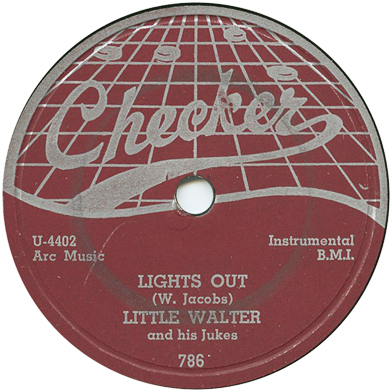
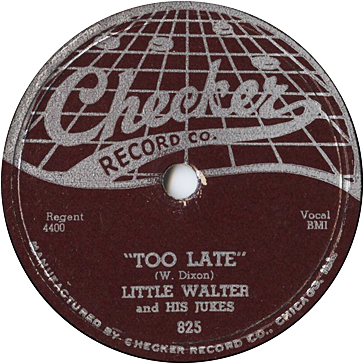
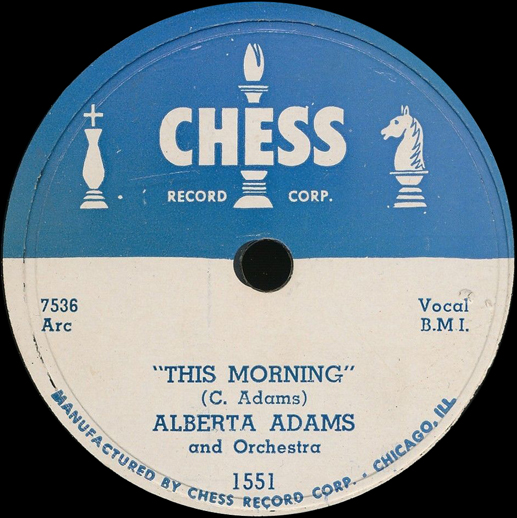
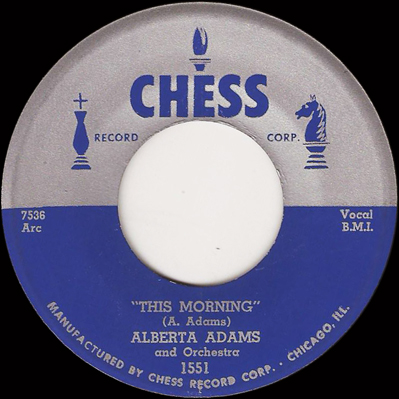
Alberta Adams was a showbiz veteran when the Chess brothers signed her. Born Roberta Louise Osborne in Indianapolis, in July 1917, to a mother she described as an alcoholic, she was raised in Detroit by an aunt. In the late 1930s, she began working Detroit clubs as a tap dancer, getting her break as a singer at Club B and C when the headliner was out sick. In the 1940s she was a regular in Detroit, but until the Chess brothers picked her up in 1953 she had not appeared on record. Her one session for the label was made in Detroit, on July 16, 1953. A Red Saunders unit traveled there to back her.
Chess 1551 didn't sell enough to induce the company to call her back. Adams subsequently recorded for Savoy, and for Berry Gordy's Thelma label. She continued to work locally in Detroit for many more years, finally enjoying a resurgence in the 1990s under the management of drummer and blues band leader R. J. Spangler; she made two CDs for the Cannonball label. She recorded her last album, for the Eastlawn label, in 2008 at the age of 91. In and out of the hospital during her last years, Alberta Adams died of congestive heart failure on December 25, 2014, at a rehab facility in Dearborn, Michigan. She was 97.
See Brian McCollum, "Detroit Blues Legend Alberta Adams Dies at 97," Detroit Free Press, December 29, 2014, online at http://www.freep.com/story/news/local/michigan/detroit/2014/12/25/detroit-blues-legend-alberta-adams-dies/20898315/.
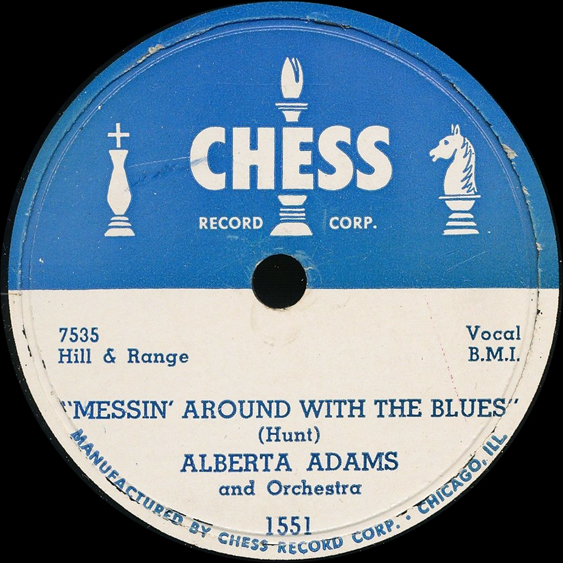
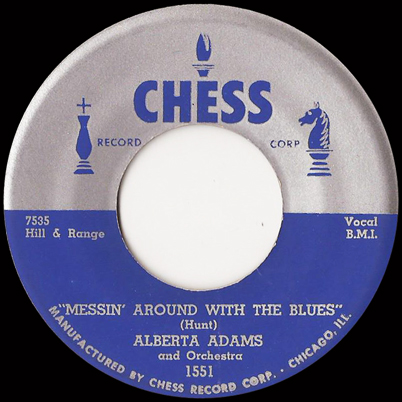
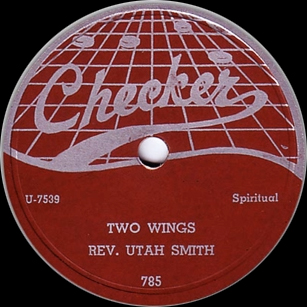
The Reverend Utah Smith, who recorded for Checker in August, was a traveling evangelist and a minister in the Church of God in Christ (his home church was located in New Orleans). Lynn Abbott's indispensable book on the reverend claims that this session was made in New York, but no specifics are given and we see no reason why it couldn't have been done in Chicago.
Rev. Smith was known for his wild guitar playing, electrified since 1941—and for the cardboard wings he wore while walking up and down the aisles. His signature number, "Two Wings," was first done for Regis in 1944 (subsequently reissued, in better sound, on the Manor and Arco labels); in all, he would be responsible for six different versions of it. The remake on Checker 785 is one of his best performances: the Reverend's singing and shouting, his guitaristics, and the responses from the congregation were all vividly recorded (there are no other instruments, but the polyrhythmic hand clapping compensates).
The sales must just not have been there. According to Big Joe Louis, no more than 20 copies of Checker 785 (issued only on 78 rpm) are in the hands of today's collectors.
"Take a Trip" is all about traveling to heaven on a rocket ship. One wonders whether Sun Ra ever heard it.
The rest of the Rev. Smith's session has never been released and we can only pray that it hasn't been lost.
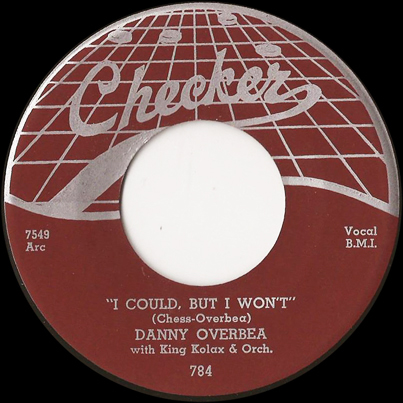
In early September, Danny Overbea committed another four tunes to tape, with backing from King Kolax and his combo. "I Could But I Won't" (a credible R&B performance) and "Sorrento" (more indicative of the direction Overbea was moving in) were used on Checker 784.
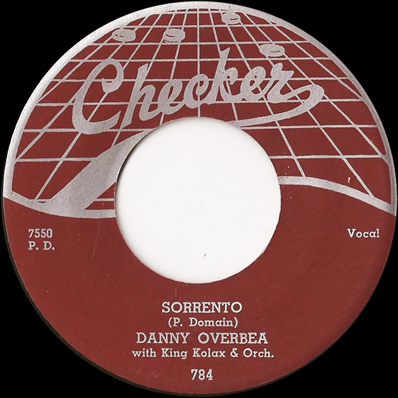
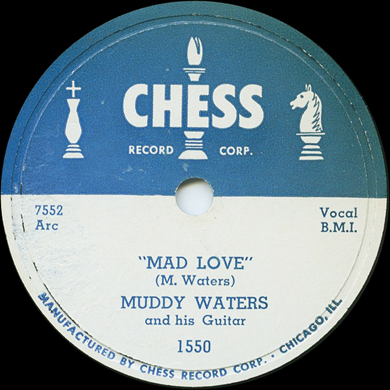
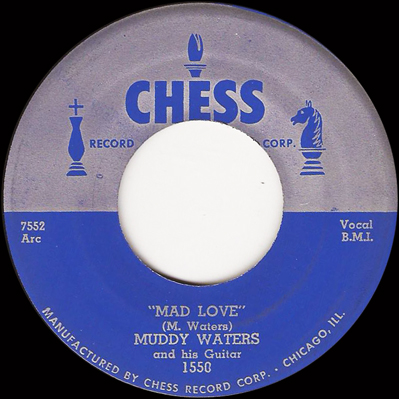
September 24 was a busy day for the company. Muddy Waters and his band cut two sides for their next single, Chess 1550. This was the first session to include his regular pianist, Otis Spann. "Blow Wind, Blow" and "Mad Love" (reissues, sticking to words Muddy actually sang, have all called it "I Want You to Love Me") are both considered blues classics today.
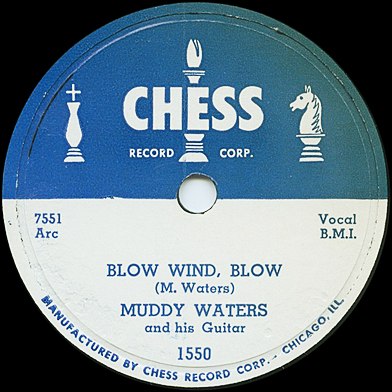
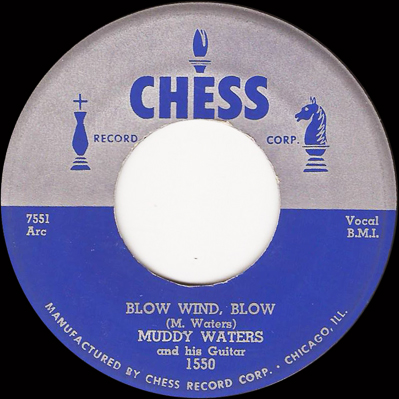
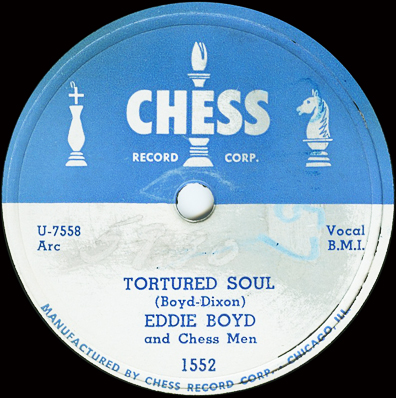
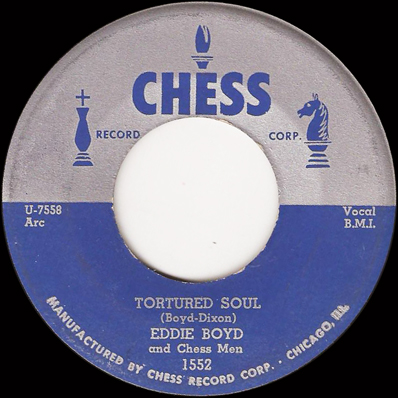
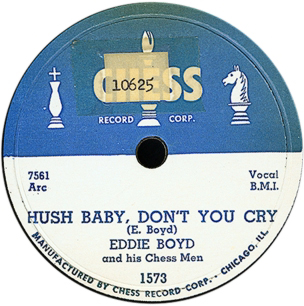
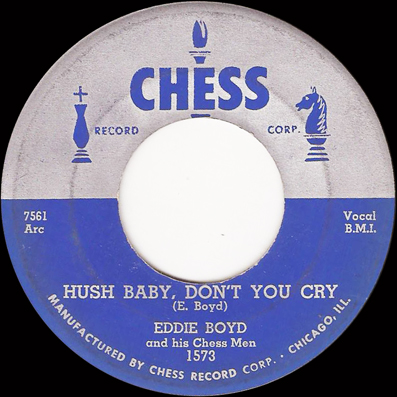
The same day, Eddie Boyd returned for four tunes. "Tortured Soul" was promptly used on Chess 1552; two other tracks were showed up on Chess 1573 and 1576; and the fourth side wasn't picked up till 1956, for Chess 1634. Boyd's style hadn't changed in the interim, so record buyers wouldn't have known that such material wasn't brand new.
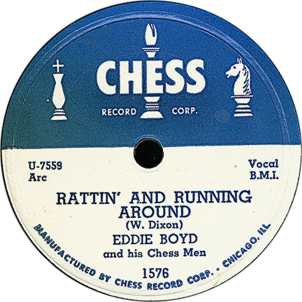
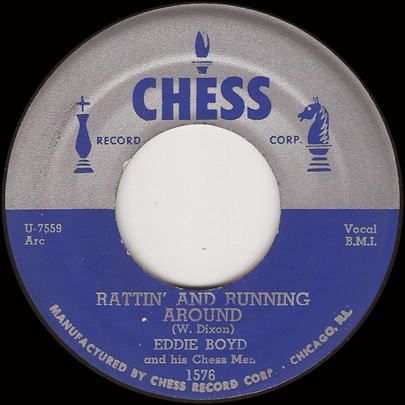
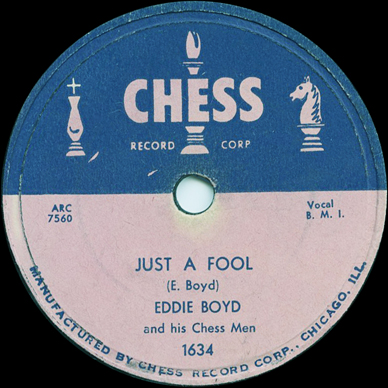
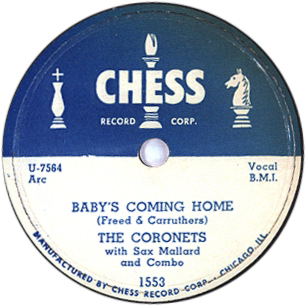
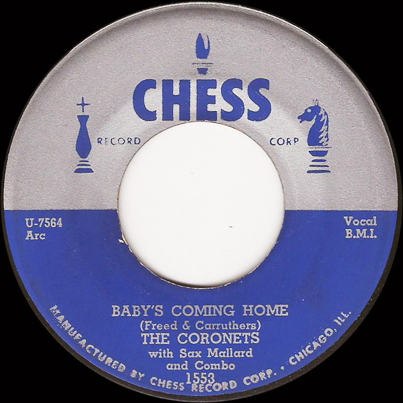
On October 11, the company brought the Coronets back to cut three numbers. A truce must have been declared, because the vocal group once again recorded with Sax Mallard's quartet, which even got credit on the label. And Charles Carruthers only had to share composer credit with Alan Freed.
Although both sides of Chess 1553 were strong performances (and, as a bonus, "Baby's Coming Home" featured Sax Mallard's best recorded tenor sax solo), the record didn't sell. Later in the fall, Carruthers was drafted into the military, and in March 1954 the group would lose Lester Russaw the same way.
The third track from the session, "Should I," had to wait till 1994 to see release. Mallard contributes tasteful ballad accompaniment, sensitive without turning lachrymose.
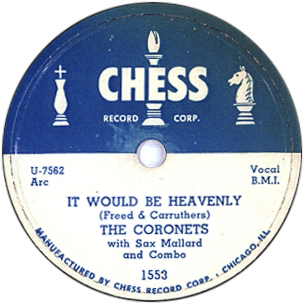
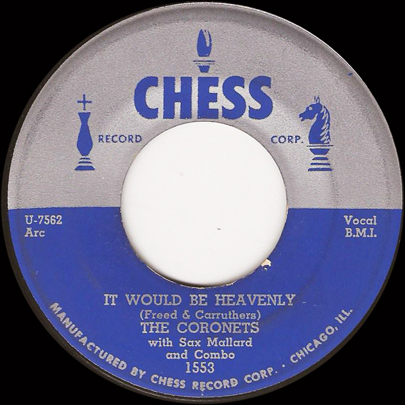
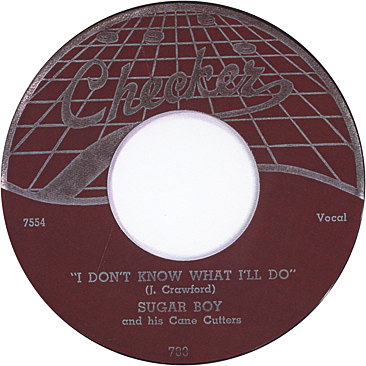
Meanwhile, Leonard Chess had shown sporadic interest in the music that was coming out of New Orleans in the 1950s. Various independent labels were recording R&B there, but apart from Imperial, which had grabbed up Fats Domino, none of them was really dominating the local scene. (He may have picked the Rev. Utah Smith during a swing through New Orleans, but Smith was on the road so much that he could just as easily have heard him in Chicago.) While visiting in September 1953, Leonard heard Sugar Boy Crawford and his band rehearsing, and asked them to make an audition tape. He was so pleased with the results that he had Universal master the two numbers, which appeared on Checker 783. The sonics on "I Don't Know What I'll Do" and "Overboard" are the worst to be heard on any of the company's releases—substantially more rugged than on Sam Phillips' early efforts, worse even than the sides that Howlin' Wolf made in Lester Bihari's establishment—and the horns aren't always in tune either. It's clear, though, that the spirited performance on "Overboard" prompted Leonard Chess's decision. Chess had thick competition for New Orleans talent, not just with Imperial, but also with Specialty, Atlantic, Mercury, and Savoy, and many of the best artists were signed by other companies. Chess and Checker would nonetheless score a few successes.
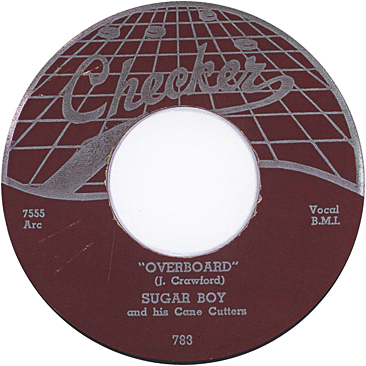
Sugar Boy Crawfordwas born James Crawford Jr., on October 12, 1934 in New Orleans. He sang in church and learned to play piano and trombone. A band that he formed in high school got a spot on WMRY, where DJ Vernon "Dr. Daddy-O" Winslow became the group's manager. They made their first recordings for Aladdin in November 1952 as the Sha-weez, but Crawford had strained his vocal cords and couldn't sing on the session. The band that auditioned for Checker consisted of Crawford (vocals and piano), Edgar "Big Boy" Miles (trombone), David Lastie (tenor sax), and Eric "Skee-Za" Warner (drums), all of them together since high school.
A studio session followed in November; on November 21, Cash Box had Leonard Chess leaving for New Orleans to cut four more sides (p. 29). Besides the vastly improved sonics, Crawford's audition band benefited from the addition of Alfred Bernard (tenor sax), Snooks Eaglin (guitar), Frank Fields (bass), and Sylvester "Slim" Sanders (backing vocals). The two sides that resulted were released on Checker 787 on February 1954. "Jock-a-Mo" (so reads the phonetic spelling for a Mardi Gras Indian chant, whose actual meaning and language of origin both remain elusive) became a New Orleans classic.
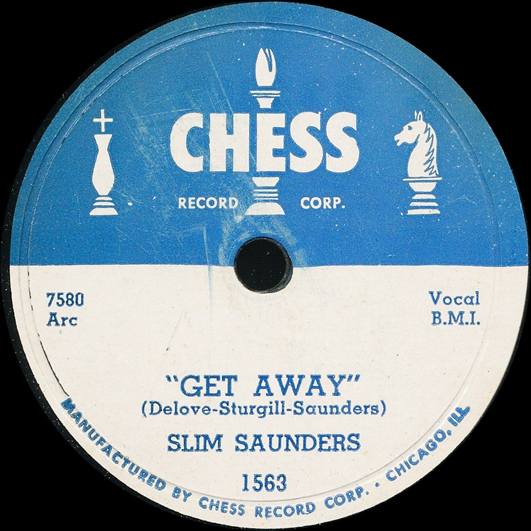
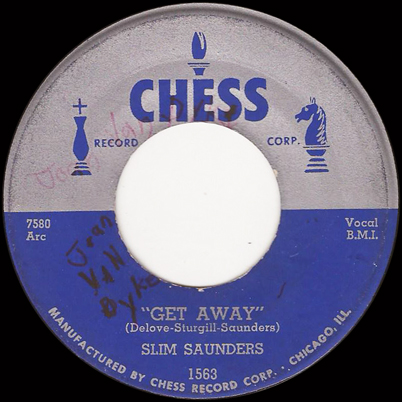
The other two sides featured Slim Saunders (as Chess chose to spell his name) as the lead singer. Born George Sanders Le Blanc, Slim often worked with Crawford's band during this period. He later moved to the West Coast, recording a single for Cavalier in San Francisco (1956), one for Lamp in Los Angeles (1956), and, sometime in the late 1950s, a final single for U-M in Los Angeles. On other records, he was variously billed as Sanders Le Blanc, Slim Sanders, and even Skinny Dynamo (when Aladdin reissued his Lamp single).
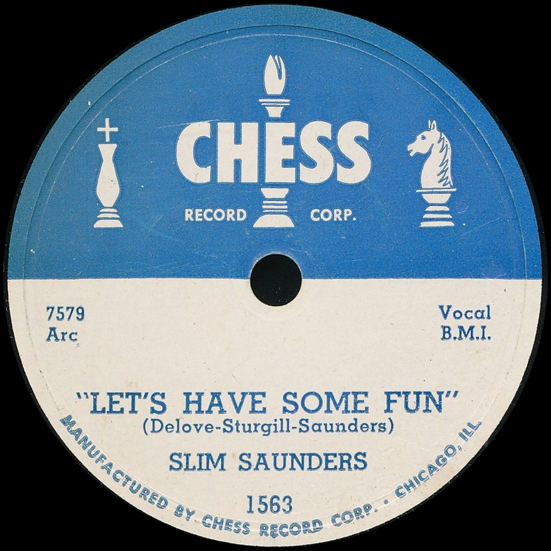
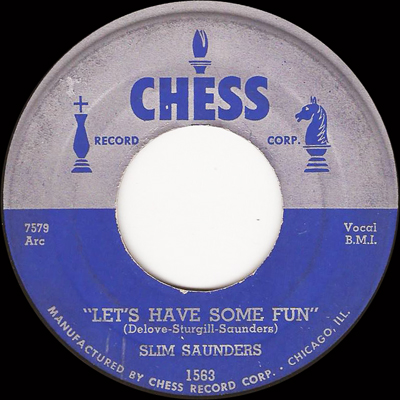
One Ray Reed cut four sides for the company in November. We can say no more, as none have ever been heard.
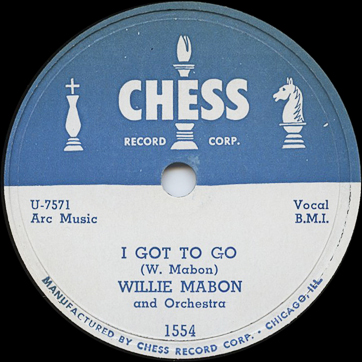
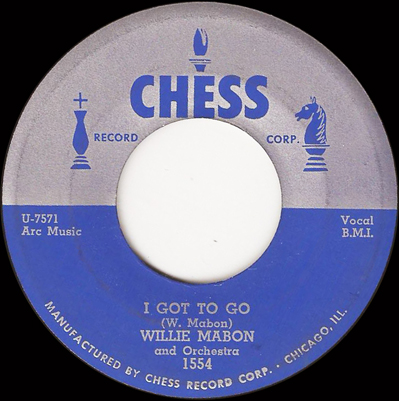
November also saw Willie Mabon's return to Universal Recording, apparently for just three tunes. Cash Box noted the session on November 14 (p 25). Mabon was accompanied by an ensemble of Paul King (trumpet), Herbert Robinson (tenor sax), Andrew "Goon" Gardner (alto and baritone saxes), Bill Anderson (bass), and Oliver Coleman (drums). While discographies have credited Gardner with alto sax only, he can be heard taking a baritone solo on "I Got to Go."
The leader's next single, Chess 1554, consisted of "I Got to Go" and an instrumental; the sardonically reflective "Life Could Be Miserable" was inexplicably left in the can. The contributions of Oliver Coleman, a veteran Swing drummer who had previously anchored Marl Young's house band for the Sunbeam label, to the success of Willie Mabon's records are rarely acknowledged. He would appear on most of Mabon's subsequent sessions for Chess.
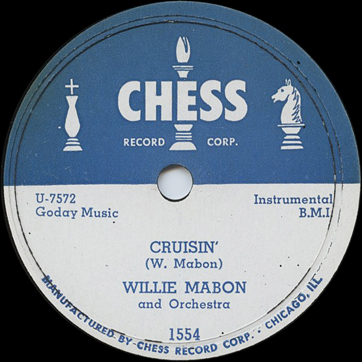
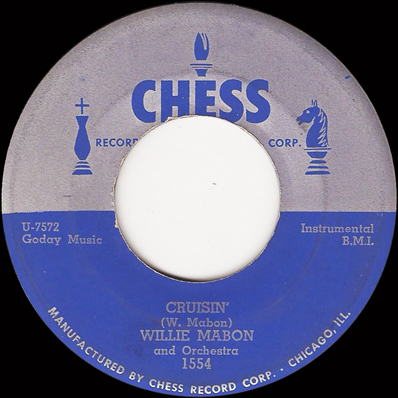
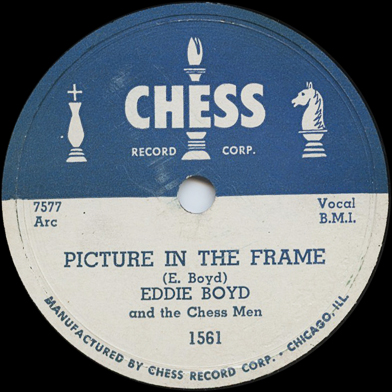
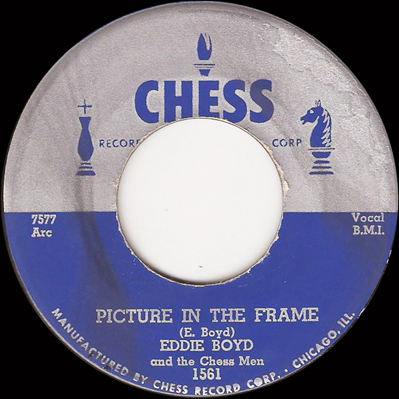
Eddie Boyd must have been writing a lot of songs, as he was back on November 9 for another four. Two were picked for release on Chess 1561 and another appeared on Chess 1573.
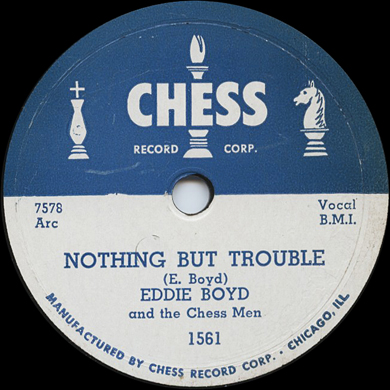
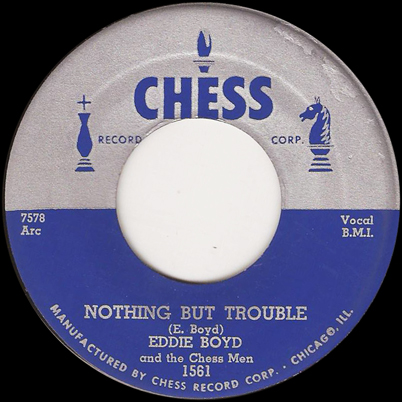
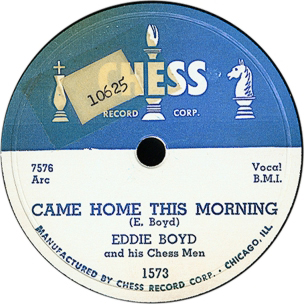
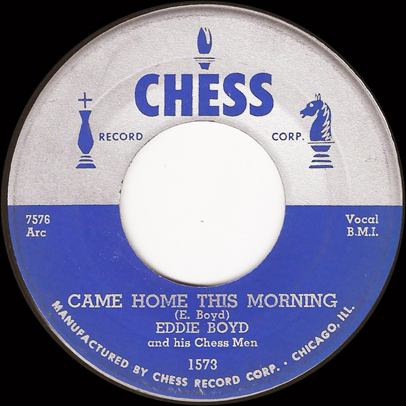
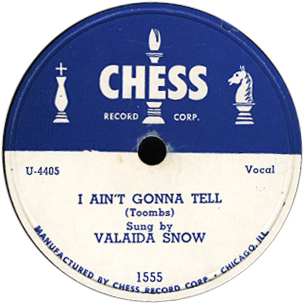
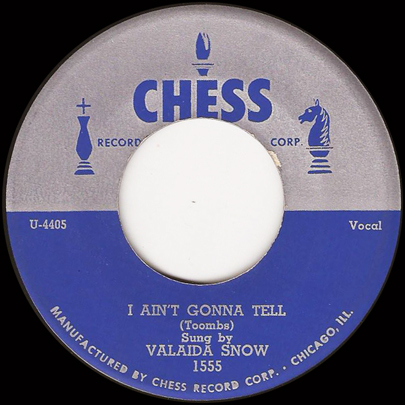
Probably the year's final session featured another fading performer, though in this case not a blues singer. Valaida Snow, the "Queen of the Trumpet," was born in Chattanooga, Tennessee, on June 2, 1904; she first arrived in New York City in 1922. She had been highly successful in Europe, where she made most of her recordings. Failing to heed the war clouds, she got trapped in Denmark during World War II, then ended up in prison while that country was under Nazi occupation. After diplomats arranged her return to the United States in 1942, with her health in decline, she struggled to recapture her old popularity. She appeared at the Rhumboogie Café in the fall of 1943. Snow continued to record sporadically for small labels, such as Bel-Tone in Los Angeles and Derby in New York City, after World War II.
The Chess brothers brought her into Universal Recording in mid November, during a gig at the Crown Propeller Lounge. Cash Box announced on November 14 (p. 25) that Leonard Chess had signed her. News of her impending arrival at the Propeller was held till the November 21 issue of Cash Box (p. 29), so she was signed before she got to town (and her signing was announced before she recorded; Chess must have started feeling more secure about such things). Another November 21 item (p. 33) mentioned that Valaida and her husband were en route to Chicago for the sesssion. A Red Saunders unit accompanied her, with Leon Washington on tenor sax, Mac Easton on the baritone, probably Ike Perkins on guitar, Earl Washington at the piano bench, Jimmy Richardson on bass, and the leader at the drums. Valaida, still in good voice in 1953 though her range was now noticeably lower, probably brought her trumpet to the session, but she didn't play it on either of the released sides.
The record appears to have been rushed out while she was in town. Cash Box gave it a favorable review (Sleeper of the Week, December 19, 1953, p. 24), but it sold poorly on both 78 and 45 rpm.
The Chess session would be her last; Valaida Snow died in New York City on May 30, 1956.
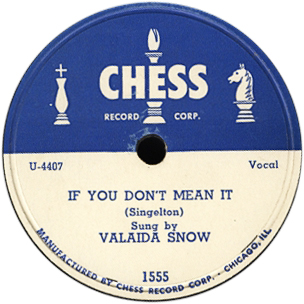
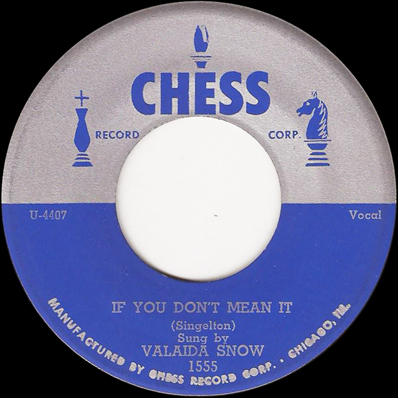
We continue our practice of marking matrix numbers in bold when we have been able to verify them from the actual releases.
| Matrix | Artist | Title | Release Number | Recording Date | Release Date |
| U-7498 | Buddy Moreno and his Orchestra | One Dozen Roses | Chess 1535 | c. January 1953 | February 1953 |
| U-7499 | Buddy Moreno and his Orchestra | Let's Go Down to the Tavern | Chess 1535 | c. January 1953 | February 1953 |
| U-7500 | Tommy Nichols and Orchestra | Ashamed | Chess 1536 | c. January 1953 | March 1953 |
| U-7501 | Tommy Nichols and Orchestra | Wail of the Wild Banshee | Chess 1536 | c. January 1953 | March 1953 |
| 4318 tk. 11 | Little Walter | Fast Boogie | (Chess CHD2-9357 [CD]) | early January 1953 | |
| 4318 tk. 12 | Little Walter | Fast Boogie | (Chess CHD4-9340 [CD]) | early January 1953 | |
| 4318 alt. 2 | Little Walter | Fast Boogie | (Hip-O Select B001RLD6AM [CD]) | early January 1953 | |
| 4318 alt. 3 | Little Walter | Fast Boogie | (Hip-O Select B001RLD6AM [CD]) | early January 1953 | |
| 4319 | Little Walter | Don't Need No Horse | (Chess CD2-9342) | early January 1953 | |
| 4320 tk. 2 | Little Walter | Driftin' | (Chess CHD2-9357) | early January 1953 | |
| 4320 alt. | Little Walter | Driftin' | (Hip-O Select B001RLD6AM [CD]) | early January 1953 | |
| U4332 | Muddy Waters | Flood | (Chess [Br] LP 6641 174) | January 9, 1953 | |
| U4333 | Muddy Waters | My Life Is Ruined [Landlady] |
(Chess LP 1511) | January 9, 1953 | |
| U-4334 | Muddy Waters and his Guitar | She's All Right | Chess 1537 | January 9, 1953 | April 1953 |
| U4334 [alt.] | Muddy Waters | She's All Right | (Chess LP 1511) | January 9, 1953 | |
| U-4335 | Muddy Waters and his Guitar | Sad, Sad Day | Chess 1537 | January 9, 1953 | April 1953 |
| U-4335 [alt.] | Muddy Waters | Sad, Sad Day | (Chess CHD2-9393) | January 9, 1953 | |
| U4336 | Gus Jenkins | Cold Love | unissued | January 9, 1953 | |
| U4337 | Gus Jenkins | Mean and Evil | unissued | January 9, 1953 | |
| U4338 | Gus Jenkins | Eight Ball | (Chess [Br] LP 6641 174) | January 9, 1953 | |
| 4339 | Honeyboy Edwards | Drop Down Mama | (Chess LP 411) | January 9, 1953 | |
| 4340 | Honeyboy Edwards | Sweet Home Chicago | unissued | January 9, 1953 | |
| 4341 | Honeyboy Edwards | Santa Fe | unissued | January 9, 1953 | |
| 4342 | Honeyboy Edwards | Frisco Line | unissued | January 9, 1953 | |
| U-4321 | Elmore James | Country Boogie [Tool Bag Boogie] |
Checker 777 | January 17, 1953 | July 1953 |
| U4322 | Elmore James | My Best Friend | (Chess LP 1537) | January 17, 1953 | |
| U4323 | Elmore James | I See My Baby | (Chess LP 1537) | January 17, 1953 | |
| U-4324 | Elmore James | She Just Won't Do Right [Dust My Broom] |
Checker 777 | January 17, 1953 | July 1953 |
| U4325 | Elmore James | Whose Muddy Shoes | (Chess LP 1537) | January 17, 1953 | |
| U-4326 | Edna McRaney and Orchestra | Yes I Know | Chess 1534 [78 rpm only] |
c. January 1953 | March 1953 |
| U-4327 | Edna McRaney and Orchestra | Edna's Boogie | Chess 1534 [78 rpm only] |
c. January 1953 | March 1953 |
| U-4328 | Willie Mabon and his Combo | I'm Mad | Chess 1538 | February 5, 1953 | April 1953 |
| U4329 | Willie Mabon and His Combo | Got to Have It | (Charly CD BM44) | February 5, 1953 | |
| U4330 | Willie Mabon and His Combo | Beggar or Bandit | (Chess [G] 6.24806AG) | February 5, 1953 | |
| U-4331 | Willie Mabon and His Combo | Night Latch | Chess 1538 | February 5, 1953 | April 1953 |
| U4343 | Little Walter | Don't Have to Hurt No More | Checker 767 [cancelled] |
March 1953 | |
| U4344 | Little Walter | Crazy Legs | Checker 986 [45 rpm] |
March 1953 | July 1961 |
| U4345 | Little Walter | Tonight with a Fool | Checker 767 [cancelled] |
March 1953 | |
| U-4346 | Elder Beck | Wine Head Willie Put That Bottle Down | Chess 1539 [78 rpm only] |
March 1953 | April 1953 |
| U-4347 | Elder Beck | I'm Gonna Tell God | Chess 1539 [78 rpm only] |
March 1953 | April 1953 |
| 4348 | Little Walter and His Jukes | Off the Wall | Checker 770 | March 1953 | April 1953 |
| U4348 [alt.] | Little Walter | Off the Wall | (Argo LP 4034) | March 1953 | |
| 4349 | Little Walter and His Jukes | Tell Me Mama | Checker 770 | March 1953 | April 1953 |
| U4350 | John Brim and His Gary Kings | Rattlesnake | Checker 769 [cancelled] |
March 1953 | |
| U4351 | John Brim and His Gary Kings | It Was a Dream | Checker 769 [cancelled] |
March 1953 | |
| 4352 | The Parrots | Please Don't Leave Me | Parrot 772 | March 1953 | May 1953 |
| 4353 | The Parrots | Weep Weep Weep | Parrot 772 | March 1953 | May 1953 |
| 4354 | Mitzi Mars with Sax Mallard and Orchestra | I'm Glad | Checker 773 | March 29, 1953 | May 1953 |
| 4355 | Mitzi Mars with Sax Mallard and Orchestra | Roll 'em | Checker 773 | March 29, 1953 | May 1953 |
| 4356 | Jackie Brenston | Don't Laugh | unissued | April 17, 1953 | |
| 4357 | Jackie Brenston | Blues Here to Stay | unissued | April 17, 1953 | |
| 4358 | Jackie Brenston | Information | unissued | April 17, 1953 | |
| 4359 | Jackie Brenston | Adam | unissued | April 17, 1953 | |
| 4360 | Jackie Brenston | True Love | (Chess [J] LP 6027) | April 17, 1953 | |
| 4361 | Jackie Brenston | Don't Leave Me | unissued | April 17, 1953 | |
| 4362 | Jackie Brenston | Mule | (Chess [J] LP 6027) | April 17, 1953 | |
| U-4363 | Danny Overbea with King Kolax and his Orchestra | 40 Cups of Coffee | Checker 774 | April 1953 | May 1953 |
| U-4364 | Danny Overbea with King Kolax and his Orchestra | I'll Follow You | Checker 774 | April 1953 | May 1953 |
| 4365 | Danny Overbea | Walkin' Blues | unissued | April 1953 | |
| 4366 | Danny Overbea | Woman Woman | unissued | April 1953 | |
| U4367 | Arbee Stedham [sic] & Orch. | Don't Set Your Cap for Me | Checker 778 | April 1953 | July 1953 |
| U4368 | Arbee Stedham & Orch. | I Don't Play | Checker 778 | April 1953 | July 1953 |
| 4369 | Arbee Stidham | 9 out of 10 | unissued | April 1953 | |
| 4370 | Arbee Stidham | Night Life | unissued | April 1953 | |
| U-4371 | The Southern Stars | Prodigal Son | Chess 1540 [78 rpm only] |
c. April 1953 [?] | May 1953 |
| U-4372 | The Southern Stars | I Saw the Light | Chess 1540 [78 rpm only] |
c. April 1953 [?] | May 1953 |
| U-4373 | Eddie Boyd and Chess Men | That's When I Miss You So | Chess 1552 | May 1953 | October 1953 |
| U-4374 | Eddie Boyd and his Chess Men | Third Degree | Chess 1541 | May 1953 | June 1953 |
| 4375 | Eddie Boyd and his Chess Men | Four Leaf Clover | Chess 1634 | May 1953 | 1956 |
| U-4376 | Eddie Boyd and his Chess Men | Back Beat | Chess 1541 | May 1953 | June 1953 |
| 4377 | Morris Pejoe | Nobody Loves Me | unissued | May 11, 1953 | |
| 4378 | Morris Pejoe | Maybe [May Bea?] Blues | unissued | May 11, 1953 | |
| 4379 | Morris Pejoe | Got a Little Girl | unissued | May 11, 1953 | |
| 4380 | Morris Pejoe | You Look Good to Me | unissued | May 11, 1953 | |
| U-4381-2 | Little Henry [Henry Gray] | I Declare That Ain't Right | (Genesis 3) | May 11, 1953 | |
| U-4381-4 | Henry Gray | I Declare That Ain't Right | (P-Vine Special [J] PLP-6022) | May 11, 1953 | |
| U4382 | Little Henry [Henry Gray] | Matchbox Blues | (Genesis 3) | May 11, 1953 | |
| U-4383 | Herbie Fields and Orchestra | Harlem Nocturne | Parrot 775 | April 1953? | July 1953 |
| U-4384 | Herbie Fields and Orchestra | Things Ain't What They Used to Be | Parrot 775 | April 1953? | July 1953 |
| U-7501-A | Muddy Waters and his Guitar | Turn the Lamp Down Low | Chess 1542 | May 4, 1953 | late May 1953 |
| 7502 | Muddy Waters and his Guitar | Loving Man | Chess 1585 | May 4, 1953 | December 1954 |
| U-7503 | Jimmy Rogers with his Rocking Four | Left Me with a Broken Heart | Chess 1543 | May 4, 1953 | July 1953 |
| U-7504 | Jimmy Rogers with his Rocking Four | Act like You Love Me | Chess 1543 | May 4, 1953 | July 1953 |
| 7505 | John Brim | Ice Cream Man | (Blue Horizon LP 7-63204) | May 4, 1953 | |
| 7506 | John Brim | Lifetime Baby | (Blue Horizon LP 7-63204) | May 4, 1953 | |
| U-7507 [sic] | The Silver Stars | Take It to the Lord | Checker 776 [78 rpm only] |
May 1953 | prob. July 1953 |
| U-7508 on label 7508A in vinyl |
The Silver Stars | 12 Years Old | Checker 776 [78 rpm only] |
May 1953 | prob. July 1953 |
| U7507 | Big Bill [Broonzy] | Jacqueline | (Chess LP 1468) | May 1953 | |
| U-7508 | Big Bill and his Guitar | Little City Woman | Chess 1546 | May 1953 | July 1953 |
| U-7509 | Big Bill and his Guitar | Lonesome | Chess 1546 | May 1953 | July 1953 |
| U7510 | Big Bill | Romance without Finance | (Chess LP 1468) | May 1953 | |
| U7511 | Washboard Sam | Never, Never | (Chess LP 1468) | May 1953 | |
| U-7512 | Washboard Sam | Bright Eyes | Chess 1545 | May 1953 | July 1953 |
| U-7513 7513* |
Washboard Sam Little Walter [sic]* |
Diggin' My Potatoes | Chess 1545 Checker 1071* [45 rpm] |
May 1953 | July 1953 March 1964* |
| U7514 | |||||
| U7515 | Washboard Sam | By Myself | (Chess LP 1468) | May 1953 | |
| U7516 | Washboard Sam | Shirt Tail | (Chess LP 1468) | May 1953 | |
| U7517 | Washboard Sam | Blues | unissued | May 1953 | |
| U7518 | Washboard Sam | Minding My Own Business | (Chess LP 1468) | May 1953 | |
| U7519 | Washboard Sam | Horseshoe over My Door | (Chess LP 1468) | May 1953 | |
| U7520 | Washboard Sam | I'm a Lonely Man | (Chess LP 1468) | May 1953 | |
| 7521 | |||||
| 7522 | and | 7523 | See | Purchased | Material |
| U-4385 tk. 2 | Browley Guy and the Skyscrapers | Watermelon Man | Checker 779 | June 10, 1953 | July 1953 |
| U-4386 tk. 4 | Browley Guy and the Skyscrapers | You Look Good to Me | Checker 779 | June 10, 1953 | July 1953 |
| U4387? tk. 7 | Browley Guy and the Skyscrapers | Blow Joe | (Relic LP 7027) | June 10, 1953 | |
| U4388? tk. 4 | Browley Guy and the Skyscrapers | I'll Be Seeing You | (Relic LP 7027) | June 10, 1953 | |
| 4389 | |||||
| 7524 | Mitzi Mars | My Little Doggie | unissued | June 1953 | |
| 7525 | Mitzi Mars | All in the Game | unissued | June 1953 | |
| 7526 | Mitzi Mars | You Got to Know | unissued | June 1953 | |
| 7527 | Mitzi Mars | Let's Face It Baby | unissued | June 1953 | |
| 7528 | Willie Mabon and his Combo | You're a Fool | Chess 1548 | June 1953 [New York City] |
September 1953 |
| 7529 | Willie Mabon and his Combo | Monday Woman | Chess 1548 | June 1953 [New York City] |
September 1953 |
| U-7530 | The Coronets | I'm All Alone | Chess 1549 | June 1953 | August 1953 |
| U-7531 | The Coronets | I Want You to Know | (Power Vine 6082 [CD]) | June 1953 | |
| U-7532 | The Coronets | Nadine | Chess 1549 | June 1953 | August 1953 |
| U-7533 | The Coronets | G. I. Missing | unissued | June 1953 | |
| 7534 | |||||
| 4390? | Little Walter | That's It | unissued | c. June 1953 | |
| 4391 | Little Walter | Blues with a Feeling [alt.] | (Chess CHD2-9357) | c. June 1953 | |
| U-4392 | Morris Pejoe and his Band | Can't Get Along | Checker 781 | c. July 1953 | August 1953 |
| 4393 | Morris Pejoe | Call It Gone | unissued | c. July 1953 | |
| U-4394 | Little Walter and his Jukes | Blues with a Feeling | Checker 780 | July 23, 1953 | September 1953 |
| 4395 | Morris Pejoe | Go On Baby | unissued | c. July 1953 | |
| U-4396 | Morris Pejoe and his Band | It'll Plumb Get It | Checker 781 | c. July 1953 | August 1953 |
| U4397 | Little Walter | That's It | (Chess CHD2-9357 [CD]) | July 23, 1953 | |
| U-4398 | Little Walter and his Jukes | Quarter to Twelve | Checker 780 | c. July 1953 | September 1953 |
| U4399 | Little Walter | Last Boogie | (Genesis 3) | July 23, 1953 | |
| 4400 | Little Walter and His Jukes | Too Late | Checker 825 | July 23, 1953 | September 1955 |
| U4401 | Little Walter | Fast Boogie | (Genesis 3) | July 23, 1953 | |
| U-4402 | Little Walter and his Jukes | Lights Out | Checker 786 | July 23, 1953 | December 1953 |
| U4403 | Little Walter | Fast Large One | (Le Roi du Blues LP 2007) | July 23, 1953 | |
| U-4404 | Little Walter and his Jukes | You're So Fine | Checker 786 | July 23, 1953 | December 1953 |
| Little Walter and His Jukes | My Kind of Baby | (Le Roi du Blues LP 207) | July 23, 1953 | ||
| 7535 | Alberta Adams and Orchestra | Messin' Around with the Blues | Chess 1551 | July 16, 1953 [Detroit] |
c. October 1953 |
| 7536 | Alberta Adams and Orchestra | This Morning | Chess 1551 | July 16, 1953 [Detroit] |
c. October 1953 |
| 7537 | Alberta Adams and Orchestra | Remember | (Chess CHD4-9340 [CD]) | July 16, 1953 [Detroit] |
|
| 7538 | Alberta Adams and Orchestra | No Good Man | unissued | July 16, 1953 [Detroit] |
|
| U-7539 | Rev. Utah Smith | Two Wings | Checker 785 [78 rpm only] |
c. August 1953 | prob. November 1953 |
| U-7540 | Rev. Utah Smith | God Is Worried | unissued | c. August 1953 | |
| U7541 | Rev. Utah Smith | Glory to Jesus | unissued | c. August 1953 | |
| U7542 | Rev. Utah Smith | Sermon | unissued | c. August 1953 | |
| U-7543 | Rev. Utah Smith | Take a Trip | Checker 785 [78 rpm only] |
c. August 1953 | prob. November 1953 |
| U7544 | Rev. Utah Smith | Good Religion | unissued | c. August 1953 | |
| U7545 | Rev. Utah Smith | Sermon | unissued | c. August 1953 | |
| U7546 | Rev. Utah Smith | Heaven Is Mine | unissued | c. August 1953 | |
| U7547 | and | U7548 | See | Purchased | Sessions |
| 7549 | Danny Overbea with King Kolax & Orch. | I Could, But I Won't | Checker 784 | September 1953 | prob. November 1953 |
| 7550 | Danny Overbea with King Kolax & Orch. | Sorrento | Checker 784 | September 1953 | prob. November 1953 |
| Danny Overbea with King Kolax & Orch. | Too Deep Blues | unissued | September 1953 | ||
| Danny Overbea with King Kolax & Orch. | Tell Me How | unissued | September 1953 | ||
| U7551 | Muddy Waters | Blow Wind, Blow | Chess 1550 | September 24, 1953 | October 1953 |
| U7552 | Muddy Waters | Mad Love | Chess 1550 | September 24, 1953 | October 1953 |
| 7553 | |||||
| 7554 | Sugar Boy and his Cane Cutters | I Don't Know What I'll Do | Checker 783 | September 1953 [New Orleans] |
October 1953 |
| 7555 | Sugar Boy and his Cane Cutters | Overboard | Checker 783 | September 1953 [New Orleans] |
October 1953 |
| U7556 | and | U7557 | See | Purchased | Sessions |
| U-7558 | Eddie Boyd and Chess Men | Tortured Soul | Chess 1552 | September 24, 1953 | October 1953 |
| U7559 | Eddie Boyd and his Chess Men | Rattin' and Running Around | Chess 1576 | September 24, 1953 | August 1954 |
| 7560 | Eddie Boyd and his Chess Men | Just a Fool | Chess 1634 | September 24, 1953 | 1956 |
| 7561 | Eddie Boyd and his Chess Men | Hush Baby, Don't You Cry | Chess 1573 | September 24, 1953 | June 1954 |
| U-7562 | The Coronets with Sax Mallard and Combo | It Would Be Heavenly | Chess 1553 | October 11, 1953 | November 1953 |
| U-7563 | The Coronets with Sax Mallard and Combo | Should I | (Chess CHD4-9352 [CD]) | October 11, 1953 | |
| U-7564 | The Coronets with Sax Mallard and Combo | Baby's Coming Home | Chess 1553 | October 11, 1953 | November 1953 |
| U7565 | and | U7566 | See | Purchased | Sessions |
| 7567 | Ray Reed | All Night Long | unissued | November 2, 1953 | |
| 7568 | Ray Reed | Gonna Murder My Baby | unissued | November 2, 1953 | |
| 7569 | Ray Reed | How the Teardrops Fall | unissued | November 2, 1953 | |
| 7570 | Ray Reed | Raindrops Falling | unissued | November 2, 1953 | |
| U7571 | Willie Mabon and Orchestra | I Got to Go | Chess 1554 | November 1953 | December 1953 |
| U7572 | Willie Mabon and Orchestra | Cruisin' | Chess 1554 | November 1953 | December 1953 |
| Willie Mabon | Life Could Be Miserable | (Chess CHD2-9385 [CD]) | November 1953 | ||
| U-7573 | The Southern Stars | Tired of the Devil | Chess 1556 [78 rpm only] |
November 1953 | January 1954 |
| U-7574 | The Southern Stars | I Remember I Heard My Mother Pray | Chess 1556 [78 rpm only] |
November 1953 | January 1954 |
| U7575 | Eddie Boyd | Sad Feeling | unissued | November 9, 1953 | |
| 7576 | Eddie Boyd and his Chess Men | Came Home This Morning | Chess 1573 | November 9, 1953 | June 1954 |
| 7577 | Eddie Boyd and the Chess Men | Picture in the Frame | Chess 1561 | November 9, 1953 | January 1954 |
| 7578 | Eddie Boyd and the Chess Men | Nothing but Trouble | Chess 1561 | November 9, 1953 | January 1954 |
| 7579 (9371) |
Slim Saunders | Let's Have Some Fun | Chess 1563 | November 1953 [New Orleans] |
March 1954 |
| 7580 (9372) |
Slim Saunders | Get Away | Chess 1563 | November 1953 [New Orleans] |
March 1954 |
| U7581 (9420) |
Sugar Boy and His Cane Cutters | Jock-a-mo | Checker 787 | November 1953 [New Orleans] |
February 1954 |
| U7582 (9421) |
Sugar Boy and His Cane Cutters | You, You, You | Checker 787 | November 1953 [New Orleans] |
February 1954 |
| U-4405 | Valaida Snow | I Ain't Gonna Tell | Chess 1555 | November 1953 | late November 1953 |
| U-4406 | Valaida Snow | L & N | unissued | November 1953 | |
| U-4407 | Valaida Snow | If You Don't Mean It | Chess 1555 | November 1953 | late November 1953 |
| U-4408 | Valaida Snow | Does You Do | unissued | November 1953 |
Meanwhile the Chess brothers were relying a whole lot less on purchased sessions in 1953—just 18 items that we know of.
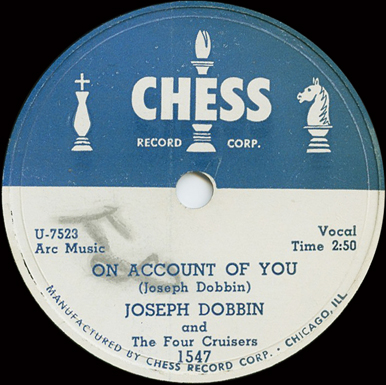
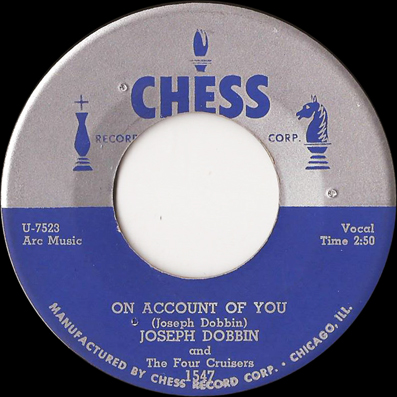
Largely this was because their arrangement with Sam Phillips in Memphis had ended. They may have been seeking other reliable sources for masters, but if they were they didn't find any. According to Nadine Cohodas' book, Leonard Chess and Sam Phillips had a falling out about who was to pay for a promotional tour by Jackie Brenston and other artists. Another report is that Leonard Chess had made blistering complaints in a phone call in 1952 about not getting enough hits out of the masters he was buying from Phillips. Phillips reacted by making an initial effort to start his own label that year, though he had to go back to recording for other companies for afew months. The Howlin' Wolf session of October 7, 1952 is the last session at Phillips' studio known to have been done for Chess. In 1953, Sam Phillips had restarted his Sun label and was concentrating on it in earnest. One of many downstream consequences: Chess would never get an opportunity to release anything by Elvis Presley.
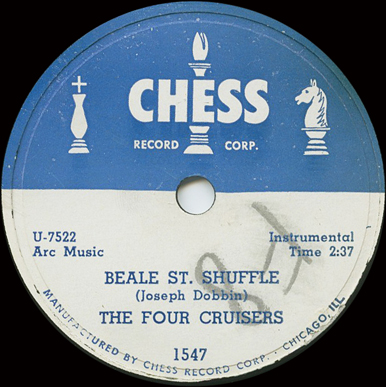
The two sides by the Four Cruisers have often been categorized as Phillips material and even included in some Sun reissue packages. In previous editions of this page we followed along. Ironically, it's the current coverage at http://www.706unionavenue.nl/67344363, which still lists the session as a Sun Recording Studio item, that's convinced us to make a change.
Joseph Dobbins, to use the correct form of his name, was a Memphis musician, and Phillips occasionally recorded supper-club blues, but the recording quality, particularly on the vocal, is not near what Sun was achieving in 1953. It's distinctly possible that after breaking with Sam Phillips, Leonard Chess intended to find another, cheaper recording venue in Memphis. But he didn't. Which leaves two possibilities: Lester Bihari and his sparingly employed Meteor studio, or a local radio station. While Les Bihari had as much reason to be pissed off at Leonard Chess as Sam Phillips did, his Meteor label was never a big earner, and relationships with his brothers in Los Angeles were often strained. Besides which, no one's ever named the radio station. So we're penciling in Les Bihari's studio as the venue (for more about this, see below).Joseph Dobbins was born in Brinkley, Arkansas, on September 9, 1901. He worked in Memphis for years, often playing hotels. By the time anyone was interested in interviewing Dobbins, he had forgotten the names of the three other musicians (playing guitar, bass, and drums) who made up the Cruisers. A couple of tracks with guitarist Mike Stewart, made in 1970 for Adelphi at the Peabody Hotel, made up the rest of his slim discography. Dobbins died in Memphis in December 1970.
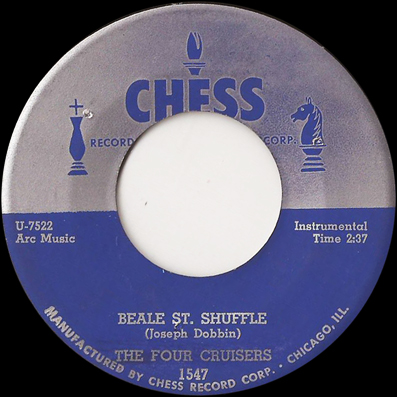
The remaining 14 items that came out of Memphis were by Howlin' Wolf. These, too, were once attributed to Sam Phillips. But Phillips didn't record the Wolf after October 7, 1952. The rugged recording quality (anything Phillips did in 1953 would have sounded much better), and some latter-day comments to Dave Sax indicate that the wayward Bihari brother, Lester, was in fact the responsible party. The sessions took place in the fall, and the only two sides that Chess released from them came from the second outing, in late October, after the company had spent much of the year pushing The Wolf to move north. It might have been the artist's idea, not the company's, to do further recording in Memphis after nearly a year out of the studio. Meanwhile, Bihari's Meteor label was on temporary hiatus, and the less-than-cutting-edge recording equipment in his studio probably needed kicking to get it going (not to mention the removal of mud dauber nests, to avoid injuries to the personnel during sessions). With The Wolf under contract to Chess and refusing to leave town, this was the best anyone could manage. Another hypothesis still occasionally entertained, that Wolf snuck into Chicago twice to record in 1953, is a non-starter on account of the sonics. No way could any of these sides have come out of Universal. And would the Chess brothers have paid The Wolf to travel to Chicago, and put up with his voluminous complaints, just to run though a bunch of numbers in the back room at 4750?
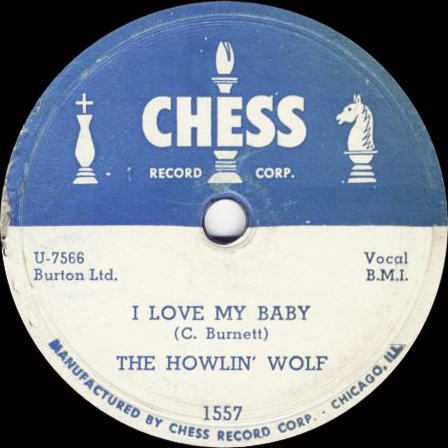
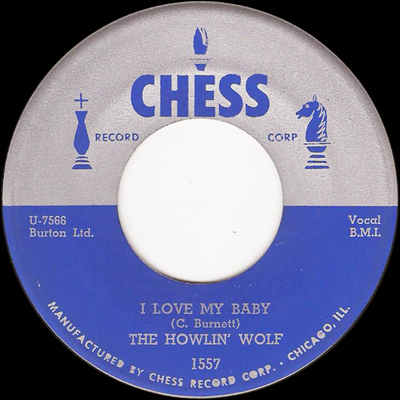
The company extracted one single from these two sessions (Chess 1557). Then The Wolf finally did move to Chicago. So Leonard and Phil Chess engaged in motivated forgetting about the rest of the material for more than a decade. Three tracks from the first session showed up on a Chess LP while Leonard was still in charge. A bunch then were collected on a bootleg LP, while tracks as powerful as "Mama Died and Left Me" had to wait until the CD era.
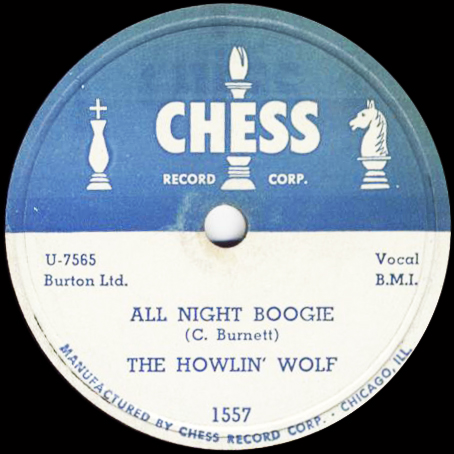
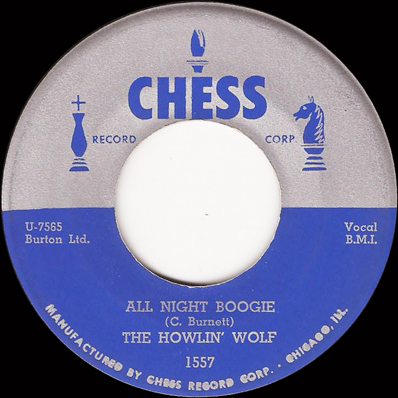
Two other odd items, by a doowop group called the Blue Jays, seem to have come from Lillian Claiborne, who ran DC Records.
| Matrix | Artist | Title | Release Number | Recording Date | Release Date |
| 7522 [Lester Bihari] |
The Four Cruisers | Beale St. Shuffle | Chess 1547 | June 3, 1953 [Memphis] |
July 1953 |
| 7523 [Lester Bihari] |
Joseph Dobbin [sic] and The Four Cruisers | On Account of You | Chess 1547 | June 3, 1953 [Memphis] |
July 1953 |
| U7547 [poss. Lillian Claiborne] |
The Blue Jays | White Cliffs of Dover | Checker 782 | 1953 [Washington, DC?] |
October 1953 |
| U7548 [poss. Lillian Claiborne] |
The Blue Jays | Hey Pappa | Checker 782 | 1953 [Washington, DC?] |
October 1953 |
| U7556 [Lester Bihari] |
Howlin' Wolf | I've Got a Woman | (Chess LP 1512) | poss. September 24, 1953 [Memphis] |
|
| U7557 [Lester Bihari] |
Howlin' Wolf | Just My Kind | (Chess LP 1512) | poss. September 24, 1953 [Memphis] |
|
| ? [Lester Bihari] |
Howlin' Wolf | Hold Your Money | (Blues Ball 2001) | poss. September 24, 1953 [Memphis] |
|
| ? [Lester Bihari] |
Howlin' Wolf | I'm Not Joking | (Chess CHD2-9349) | poss. September 24, 1953 [Memphis] |
|
| ? [Lester Bihari] |
Howlin' Wolf | Mama Died and Left Me | (Chess CHD3-9332) | poss. September 24, 1953 [Memphis] |
|
| ? [Lester Bihari] |
Howlin' Wolf | Work for Your Money | (Chess LP 1512) | poss. September 24, 1953 [Memphis] |
|
| U-7565 [Lester Bihari] |
The Howlin' Wolf | All Night Boogie | Chess 1557 | poss. October 28, 1953 [Memphis] |
December 1953 |
| U-7566 [Lester Bihari] |
The Howlin' Wolf | I Love My Baby | Chess 1557 | poss. October 28, 1953 [Memphis] |
December 1953 |
| ? [Lester Bihari] | Howlin' Wolf | Highway My Friend | (Blues Ball 2001) | poss. October 28, 1953 [Memphis] |
|
| ? [Lester Bihari] | Howlin' Wolf | Hold Your Money | (Blues Ball 2001) | poss. October 28, 1953 [Memphis] |
|
| ? [Lester Bihari] | Howlin' Wolf | Streamline Woman | (Blues Ball 2001) | October 28, 1953 [Memphis] |
|
| ? [Lester Bihari] |
Howlin' Wolf | California Blues #2 | (Blues Ball 2001) | October 28, 1953 [Memphis] |
|
| ? [Lester Bihari] |
Howlin' Wolf | Stay Here 'til My Baby Comes Back Home | (Blues Ball 2001) | poss. October 28, 1953 [Memphis] |
|
| ? [Lester Bihari] |
Howlin' Wolf | Crazy 'bout You Baby | (Blues Ball 2001) | poss. October 28, 1953 [Memphis] |
Activity in the Chicago (and, once in a while, New Orleans or Dallas) studios was a little less frantic in 1954: the Chess brothers were responsible for 150 known sides (again, we are counting alternates but not blanks in the matrix number series). Nearly everything was still being done at Universal Recording.
However, when the company moved to more capacious quarters at 4750 South Cottage Grove, a back room was set up to record demos. Once in a while, a demo recording would be brought to Universal and the engineers there would have to spruce up the sound as best they could so it could be readied for release. Or so we are told in Nadine Cohodas's book. At one point Leonard Chess was called in front of the Board of Musicians Union Local 208 and asked whether he was doing any recording in the back room; he claimed he wasn't (otherwise he would have had to pay the musicians Union scale for the sessions). Nonetheless, we know of two such sessions that produced material used for release. The first of these, the Muddy Waters session from November 1954, features notably muffled sonics that could never have come out of Universal.

Danny Overbea led off the year with his last session to use King Kolax's group. Tenor man Dick Davis had taken ill (he would die later in January from pneumonia) and was replaced by Harold Ousley. In the future the guitarist would be accompanied by studio bands recruited by Willie Dixon.
Overbea was followed into the studio by pianist Jimmy Binkley. James H. Binkley was born on the West Side of Chicago, on March 1, 1923. We know nothing of his early development of a musician, but he eventually patterned his style after Erroll Garner's, and was occasionally active on the Chicago scene in the late 1940s, probably spending the rest of his time on the road. From August 1951 through May 1952, he enjoyed a significant run at Club Evergreen. His first recordings were four sides for Aladdin, cut later that same year: two instrumentals featuring a booting tenor sax and two vocal sides with Harold Burrage. While at the Capitol Lounge, in February 1953, Binkley cut four sides with Chance, featuring the tenor sax of Dave Mitchell and vocals by his drummer, George Green, Later that year Binkley began an occasional association with an Indianapolis-based record company called Note. Note was always short on distribution, and his first two sides for the company actually came out on Dot.
Binkley's trios and quartets earned their bread and butter playing standards, but record companies generally wanted him to do novelty R&B, of the sort we hear on Checker 789. It was cut in January 1954 with a trio, probably Eldee Young on bass and Tommy Harris on drums.
We doubt that Checker 789 was much of a seller, but Binkley had little time to pay attention; he spent most of 1954 and 1955 on the road. However, the Chess brothers gave him one more try, on January 24, 1956; the session led to one further release on Checker. Later that year, his combo accomapanied a vocal group called the Dusters, for a new Cincinnati-based label called ARC. In 1957, his group backed The Teasers for a Note session that actually led to a release on the label, Note 1002.
So far as we can determine, Jimmy Binkley would keep performing for another 56 years without making another commercial recording. In 1960, his quartet got a gig at Collins Corner in Peoria, Illinois. After the venue ran low on money and the group had to downsize, Binkley stayed in town, where (except for a few months back on the road in 1964) he variously played jazz clubs, an annual jazz festival, hotel piano bars, and steak houses for the rest of his life. Around 1985, he began a regular practice of carrying a portable keyboard to nursing homes, often playing several eash week. In 1986, he appeared in Richard Pryor's semi-autobiographical movie, Jo Jo Dancer, Your Life Is Calling. Jimmy Binkley made his last public appearance as the grand marshal of the 2014 Peoria Christmas parade. He died in Peoria on January 26, 2015, at the age of 91. His obituary can be seen at http://obit.funeralnet.com/obitdisplay.html?id=1475264&clientid=thewiltonmortuary.
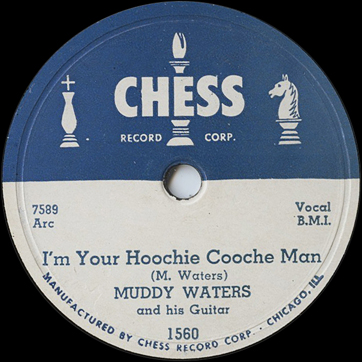
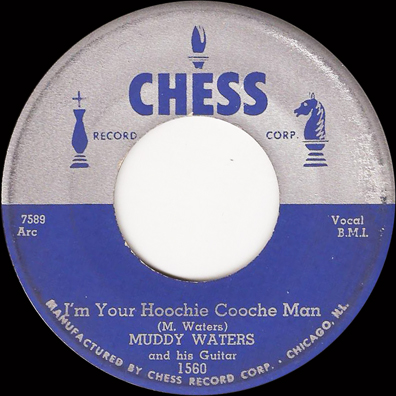
Next, on January 7, came a classic session by Muddy Waters and his band, with Muddy featured on two sides and Jimmy Rogers on two more. The two by Muddy saw immediate release on Chess 1560. Although the key adjective has nearly always been spelled "Hoochie Coochie," the Chess brothers first tried "Hoochie Kooche" (on the very first 78 rpm pressing), then settled on "Hoochie Cooche" (for the 45s and all subsequent 78s). However they chose to spell it, it was a hit.
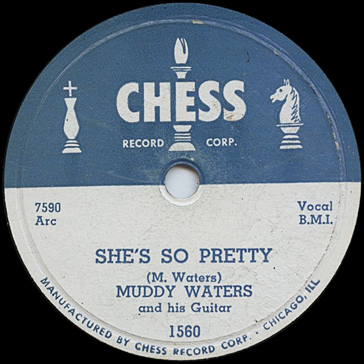
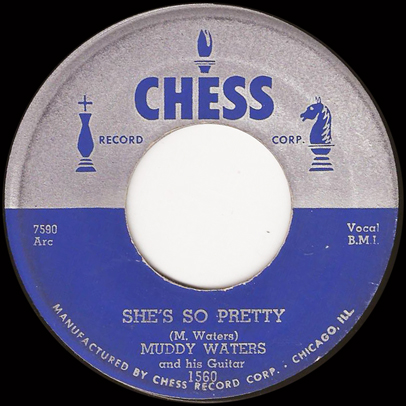
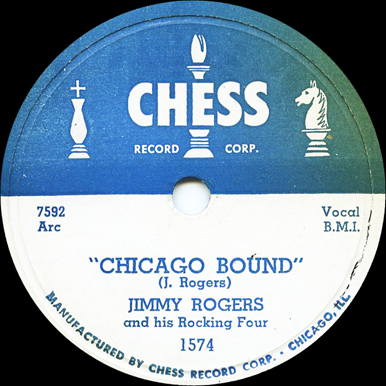
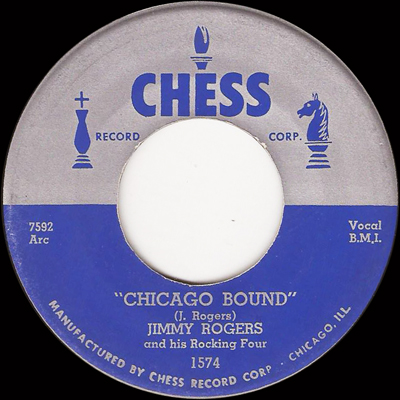
One of the Jimmies was held for Chess 1574, later in the year; the other would have to wait two full years to make the flip side of his biggest hit, Chess 1616.
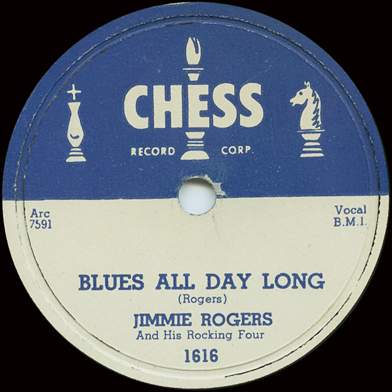
Chess 1616 was advertised in Cash Box on March 10, 1956 (p. 36) and reviewed in the same issue of the magazine (p. 32). A solo ad followed on March 17 (p. 36).
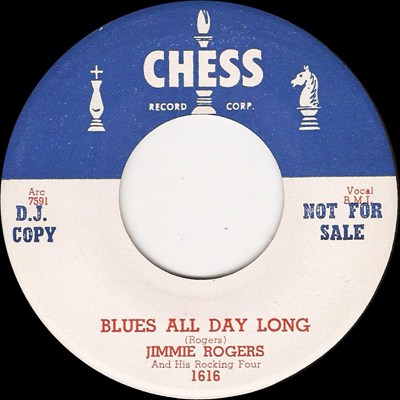
On January 16, Leon D. Tarver and his vocal group The Chordones recorded for Checker. Tarver, who originally hailed from Baltimore, was apparently given the name Leander at birth but had variously gone as Lance and Leon. In 1952, while he was a member of the Cardinals, Tarver had appeared on one single for Atlantic. Willie Dixon, who was now firmly in charge of vocal group sessions for the Chess brothers, played bass and directed. Tarver played his own piano. Guitarist and drummer remain unidentified, but the tenor saxophonist who makes a guest appearance on just one track, "I'm a Young Rooster," appears to be Lucius Washington, in what was probably his first studio recording. Checker 791, "I'm a Young Rooster" b/w "Ooh-Wee What's Wrong with Me?" was released in March (advertised in Cash Box on March 27, 1954). The two sides left unreleased are both blues featuring the group's vocal harmonies.
Just over a month later, on February 17, a Willie Dixon-led studio group (identified as such on the label—for the first and only time) accompanied a vocal group then known as the El Rays. "Christine" and "Darling I Know" were released in May on Checker 794. The El Rays (Marvin Junior, Johnny Funches, Verne Allison, Chuck Blackwell, Lucius McGill, and Michael McGill) showed that they weren't quite ready for prime time; they didn't always harmonize their parts correctly. A more experienced group would resurface in 1955 at Vee-Jay; now known as The Dells, they went on to enjoy commercial success. As usual with Willie Dixon groups, we know that Dixon is on bass; otherwise, the pianist, guitarist, and drummer remain unidentified. However, both of the El Rays' sides include recognizable tenor sax solos by Lucius Washington (heretofore, discographies have pencilled in Harold Ashby, who enjoyed a run of Dixon-led sessions from 1954 through 1956).
The two other sides from the session, which featured Willie Dixon's vocals, were left on the shelf. One is the very first version of "Wang Dang Doodle," which became a blues classic some years later, when Howlin' Wolf recorded it in June 1960. The band rocks and the song is already formed, though the lyrics occasionally diverge from the words that the Wolf sang ("Legion Hall" instead of "Union Hall," "Lightning Pete" instead of "Pistol Pete"). Lucius Washington gets a tenor sax solo. The band member who screams during the refrain remains unidentified. The other Dixon number—a ballad titled "So Long"—is accompanied mainly by the guitarist and Little Wash, with the piano and drums way way back; the El Rays also do some humming in the background. Neither got a legitimate release until 1995, when they appeared on a Chess CD of miscellaneous Willie Dixon items titled The Original Wang Dang Doodle.
Shortly after the El Rays wrapped up, Little Walter was in for a session that produced two vocal numbers and two instrumentals. "Oh Baby" and "Rocker" were picked for issue on Checker 793. "I Love You So" was accidentally released in the 1960s, when someone at Chess mixed up the master numbers and thought it was "Oh Baby"; the other instrumental has never emerged and may have been lost.
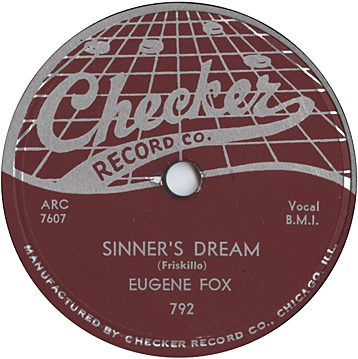
On February 22, 1954, the brothers made an isolated field recording—four sides cut in the heart of the Delta, in Clarksdale, Mississippi. Two members of Ike Turner's band were featured (Turner was no longer available via Sam Phillips' operation, but he was happy to cooperate with any record company that showed interest).
Eugene Fox, who usually played tenor sax, had a comically gravelly voice. On "Stay at Home," he turned in a solid blues performance, with backing from Bobby Fields (tenor sax), Dennis Binder (piano), Ike Turner (guitar), Jesse Knight, Jr. (bass), and either Willie Sims or Robert Prindell (drums). The recording is listenable but would never be confused with anything out of Universal; the tenor sax seems to have wandered somewhere down the hall. The outstanding side was "Sinner's Dream," a melodrama about none other than Eugene Fox's soul being led off to hell. Fox, Binder, and Annie Mae Wilson's voices and the ghostly special effects attributed to one C. V. Veal were accompanied by nothing but Ike Turner's wild, tremulous, distorted electric guitar. Chuck Berry's "Downbound Train" is innocuous by comparison, and the Stone Guest scene in Don Giovanni not nearly so rough around the edges.
Fox's discography as front man is slender. Checker 792 was his debut. The company expected something out of it, releasing it March 1954. (An ad in Cash Box, March 13, 1954, declared "This Will Be Our Biggest Record in Five Years!") Fox would redo "The Dream" the next month as a two-sided production for RPM (a label that would be making much more use of Ike Turner's services in the future). Later the same year, he contributed another three sides in front of Turner's band to a small label called Spark.
The Chess brothers were also experimenting with a new label design for Checker, which incorporated "Record Co." prominently into the logo. However, after trying it out on Checker 792 and 793, they reverted for a little while. With Checker 801, new design would take over for good.
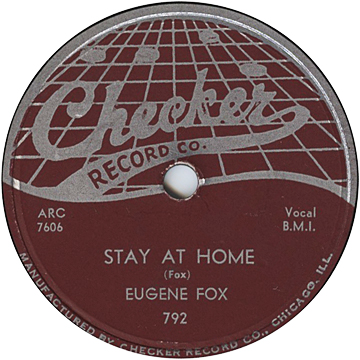
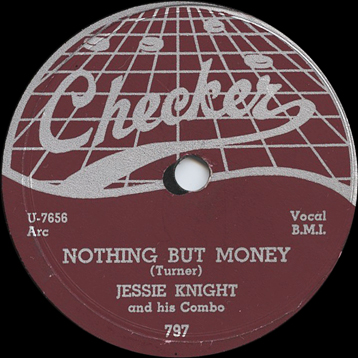
Jesse Knight, whose discography is even more abbreviated, played bass in Turner's band at the time. He was credited as the leader on two more sides. The rest of the band should be familiar: Eugene Fox and Raymond Fields (tenor saxes), Dennis Binder (piano), Ike Turner (guitar), and Willie Sims (drums). Knight actually just sang "Nothing but Money"; its flip on Checker 797, "Nobody Seems to Want Me," was entrusted to Ike Turner (who obviously had some reason not to put his name on it). Entered into the ledger on May 24, 1954 (which is almost certainly the mastering date at Universal and not the recording date), this would be Knight's only outing as a leader.
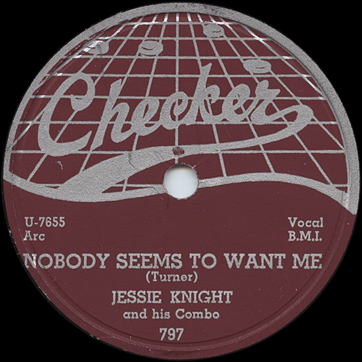
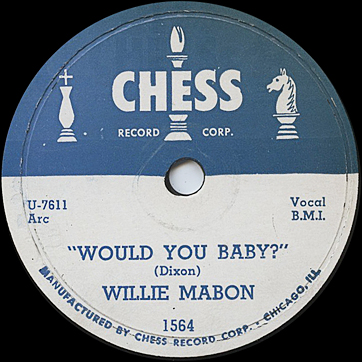
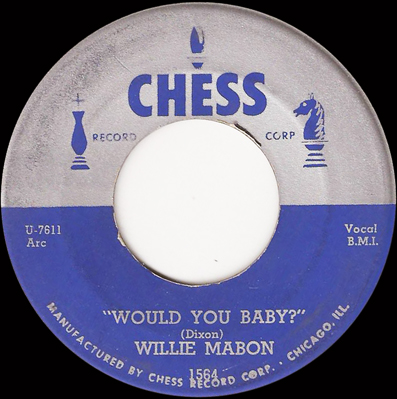
Willie Mabon and his combo also returned to Universal in February. On this occasion the company released two vocal numbers, "Would You Baby?" and "Late Again," in April on Chess 1564. A third vocal item would be left unreleased. Mabon's usual front line of Paul King (trumpet) and Herbert Robinson (tenor sax) was reinforced by the great tenor saxophonist Harold Ashby, who takes a prominent solo on "Late Again." Bill Anderson (bass) and Oliver Coleman (drums) provided the customary rhythm support.
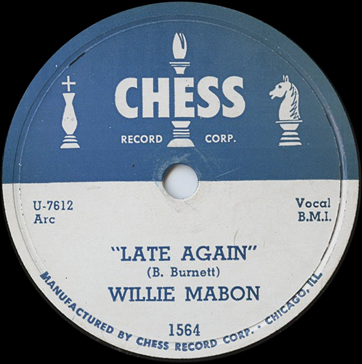
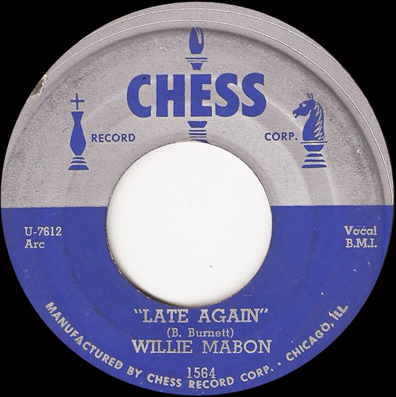
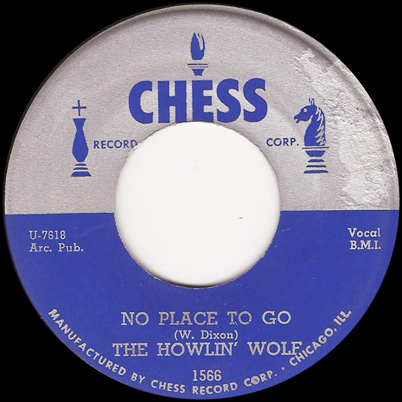
The Chess brothers, after two or more years of wheedling and negotiating, had finally persuaded Howlin' Wolf to move to Chicago. They celebrated with a session at Universal, followed by a prompt release on Chess 1566. The other two tracks had to wait more than a decade, but were eventually included on a Real Folk Blues series LP.
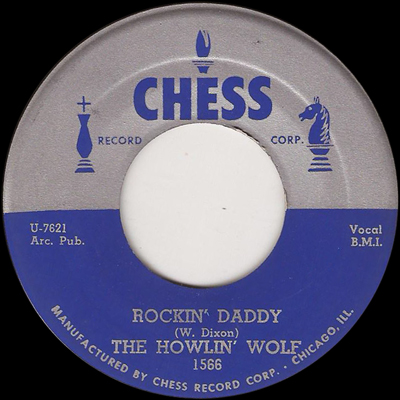
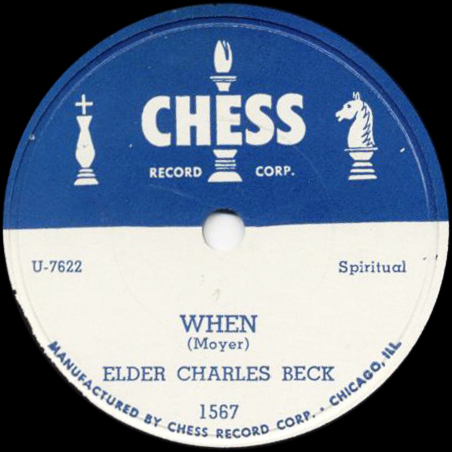
At some point in March, Elder Beck was invited back for a couple more musical sermons. On this occasion, the Elder was accompanied by piano and organ on "When" (just organ on "I'm Walking with Jesus at My Side"), plus guitar and drums. Chess dropped him after his second release, on Chess 1567 (as the company was still doing for gospel releases, this was 78-only). His next appearance on record would come two years later, when he made the famous two-part "Rock and Roll Sermon" for Chart (it's hard not to like a sermon against rock and roll when the reverend's electric guitarist keeps breaking into ... rock and roll). Elder Beck's final recordings came later that same year at a church in Buffalo, New York, where he broadcast a weekly show; they were eventually released on a Folkways LP.
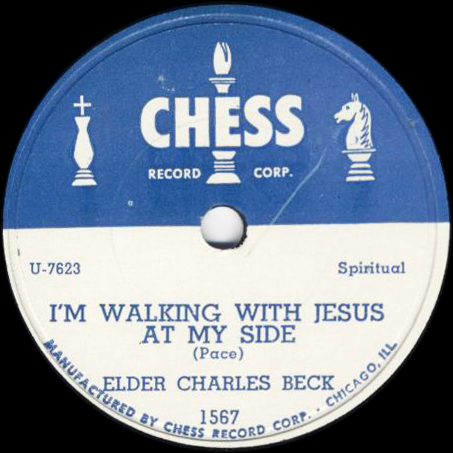
Another gospel session in March featured the The Southern Stars, now denominated as being of Richmond. Again there were just two tracks. This was the Southern Stars' fourth and last Chess single, another 78-only release. Apparently sales progressively decreased on their singles, so Chess 1568 is their rarest.
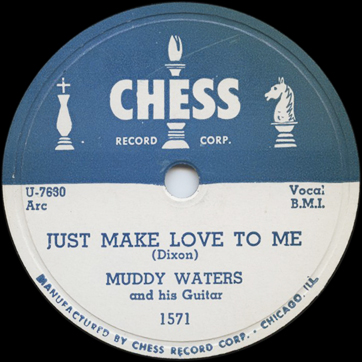
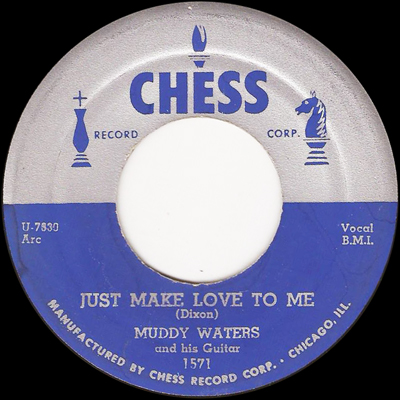
On April 13, Muddy Waters and Jimmy Rogers were back for another conjoined session. "I Just Want to Make Love to You" is another Willie Dixon classic. Even though Muddy never sings the phrase, the original release on Chess 1571 was titled "Just Make Love to Me." "Sloppy Drunk," a number borrowed from Leroy Carr, was featured on the next Rogers release, Chess 1574. If the surviving documentation is accurate, just the one Rogers track was attempted (or at least completed) on the session; the final side was apparently by Morris Pejoe. "Ain't It Lonesome" has never been released, so there's nothing more to say.
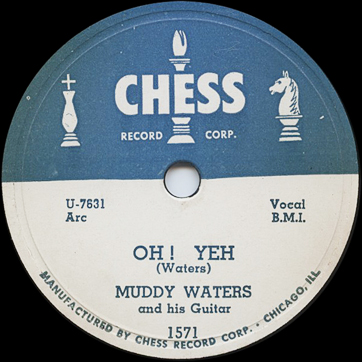
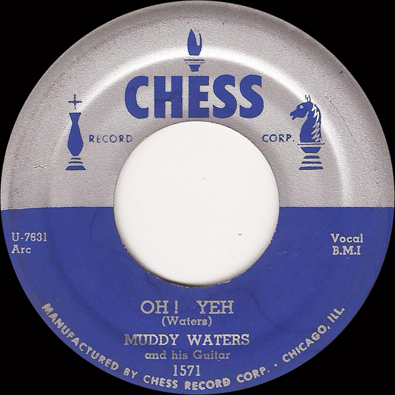
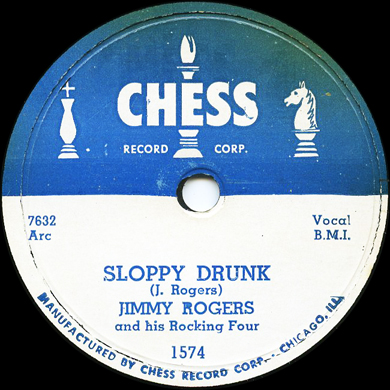
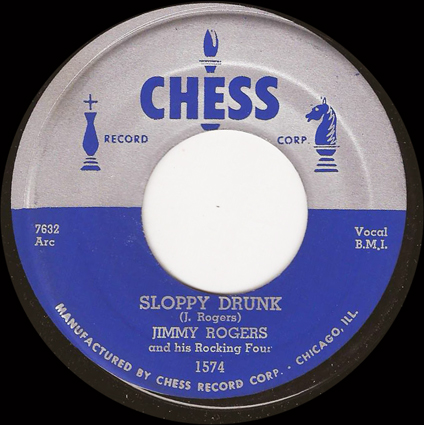
With Checker 791 already out, Chess brothers brought Leon Tarver and the Chordones back on April 20. On this occasion two vocal group tracks were laid down ("All My Fault" adds a female vocalist, who offers several retorts to Leon's plaints, and joins in on the final vocal chorus). But the company lost interest in Tarver, and the sides would have to wait something like 30 years to see release—on a bootleg LP. The other two tracks, still in the can after 55 years, were instrumentals. Again, Tarver seems to have played the bluesy piano heard on the session, and Willie Dixon was probably on the string bass. Guitarist and drummer remain unidentified. The tenor saxophonist, who appears on both of the vocal features, plays on the gritty side and is definitely not Lucius Washingon. Our guess is Harold Ashby, who was becoming a regular on Dixon-led studio sessions.
Tarver made just one more record, for Al Benson's Blue Lake imprint in December 1955. The Chordones had apparently gone their separate ways. For Blue Lake he sang in an incipient soul style, to accompaniment by a studio band led by trumpet player Lewis "Bill" Ogletree. The record did not sell well enough to keep him in Chicago. On October 4, 1956, "Leander Tarber" (everyone seemed to have trouble with his name) was on a list of members of Local 208 (Board Meeting Minutes, p. 4) "erased" for failure to keep their accounts paid up.
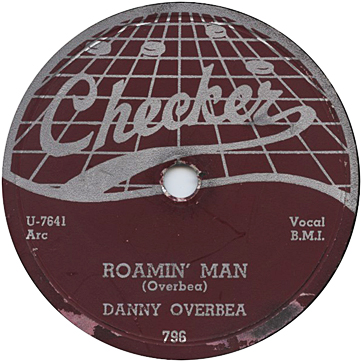
Danny Overbeareturned to the studio in April to record for Checker. From here on out, the guitarist's sessions would no longer feature the King Kolax band that had accompanied him so ably on "Train, Train, Train" and "40 Cups of Coffee." Instead, there was a studio ensemble of tenor and baritone saxes, piano, bass, and drums. No telling who these musicians were, except Willie Dixon on bass.
The Chess brothers left a lot of Overbea sides in the can, but on this occasion they used two tracks right away on Checker 796. A third side showed up about a year later, on Checker 816 (released around May 1955, and never covered in Cash Box). While "Roamin' Man" is a rather gloomy blues effectively sung by Overbea, "You're Mine" features sentimental balladeering in an overripe baritone—not a favorable leading indicator of his future artistic direction.
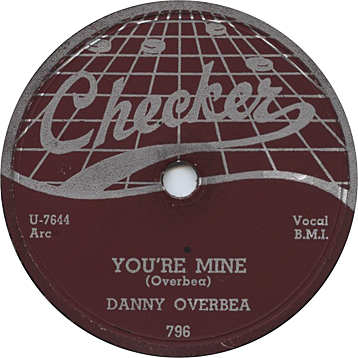
The Chess brothers must have been mightily impressed with the commercial potential of Sugar Boy Crawford, because they brought him into the studio again in May 1954, this time for the regulation four tunes. On this solid session, he was accompanied by Alfred Bernard and David Lastie on tenor saxes, Frank Fields on the string bass, and Eric Warner on drums. Two cuts saw release on Checker 795, but his third single apparently didn't do as well as either of the first two. It was Crawford's last for Checker.
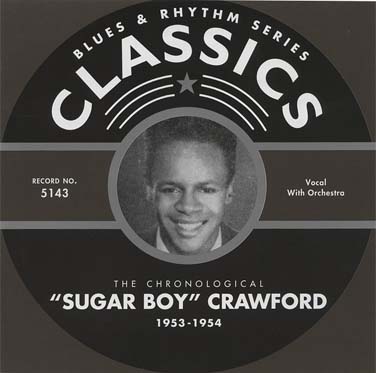
Yet the company brought his band in for another session at which at least 7 tunes were cut. On them Crawford's May 1954 lineup was joined by an unidentified trumpet player, Big Boy Miles on trombone, and Snooks Eaglin on electric guitar. Slim Saunders sang duets with Crawford on two of the cuts. And still another 6-tune outing ensued a little later in the year; this was done by the same forces minus Saunders. We can't assign precise dates to either session, because none of the matrix numbers were assigned at the time. But in the spring of 1959, consecutive series were allocated in the 9300s and 9400s, as would be done in preparation for mastering and releasing an LP or LPs. Still, nothing materialized until well after the brothers had sold the company to GRT; it was only in 1975, after the remains of the company had in turn been scavenged from GRT by All Platinum, that nearly the entire batch of Sugar Boy Crawford studio sides was packaged into a double LP. Some of the cuts featured sloppy instrumental work or whiny vocalizing from Crawford, who was not cut out to sing ballads. But it remains a mystery why, a year and a half before the company began to release anything on LP, Checker would record so much of Crawford's band.
Sugar Boy Crawford next signed with Imperial, cutting four singles with Dave Bartholomew's band at three sessions in 1956 and 1957. Singles followed on Louisiana-based labels like Montel (1959) and Ace (1961). Crawford's career unfortunately came to an end one night in 1963, when his Cadillac was pulled over by a state trooper in Monroe, Louisiana. The Smokey expressed his dissatisfaction with African American men in expensive cars by severely pistol-whipping the driver. Crawford's band had to do a scheduled recording session for Peacock without him. After two years of recovery, Crawford realized that he was never going to be able to play piano professionally again. He became a locksmith and a building engineer, confining his musical activities to singing in church.
On May 22, Little Walter was back for two sides of his own, which the company curiously neglected (they had to work hard to get enough vocals that they liked, while piling up instrumental tracks there was no room for on singles). As strong a vocal performance as "I Got to Find My Baby" had to wait 6 years for release on a Checker single, while an acceptable one on "Big Leg Mama" had to be bootlegged on a 1970s LP. On the other two sides, the company experimented with using Walter's band to back The Coronets. Although the results were listenable, the Chess brothers weren't happy with the slow sales on Chess 1553 and passed on releasing another by the group; they also quit using blues bands behind doowoppers. Even the compilers of the 4-CD Hip-O Select box, which included practically every scrap by Little Walter, left out the vocal group tracks—which seems narrow-minded of them.
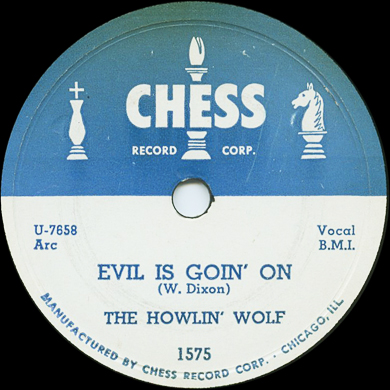
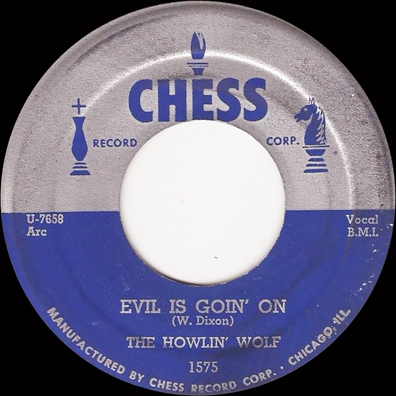
Then on May 25, Howlin' Wolf returned for his second Chicago session. This was devoted the two tracks needed for his next single, which got quick release as Chess 1575. If anything else was attempted that day, it was rejected so long ago as to leave no trace.
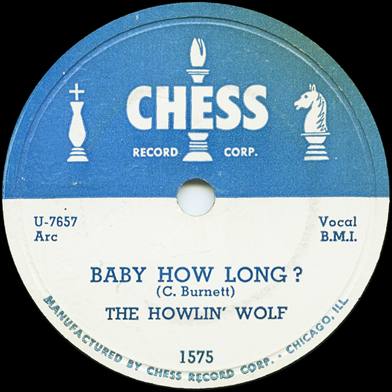
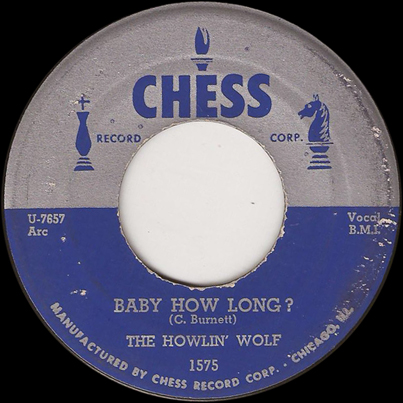
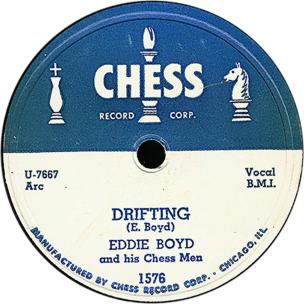
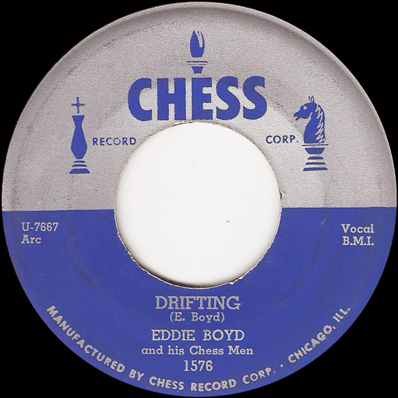
An Eddie Boyd session followed on May 28, 1954. Three sides were spread over three singles: Chess 1576, Chess 1595, and Chess 1674 (the last not being released for three and a half years).
Chess 1595 was advertised in Cash Box on April 9, 1955 (p. 29). The trade reviewed it on April 16 (p. 29).
A fourth, instrumental track is still unissued, and most likely lost.
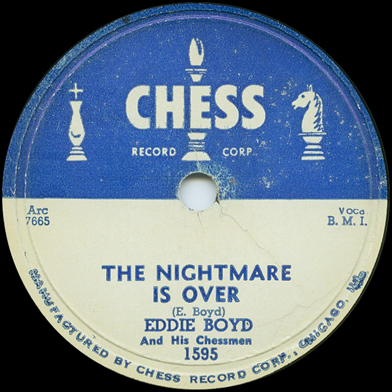
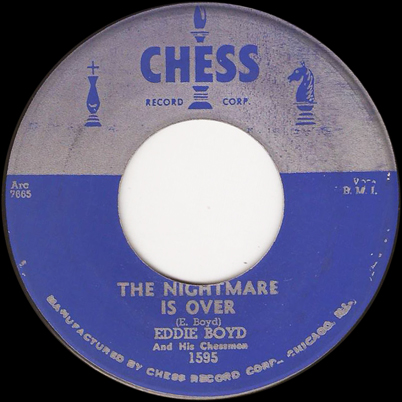
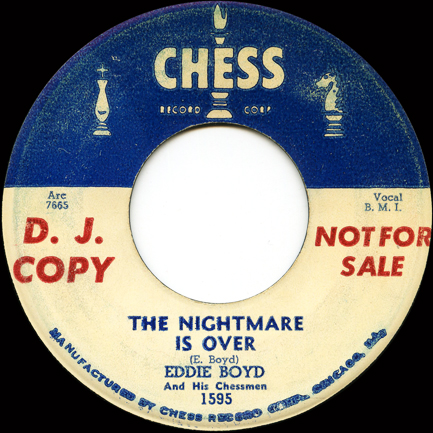
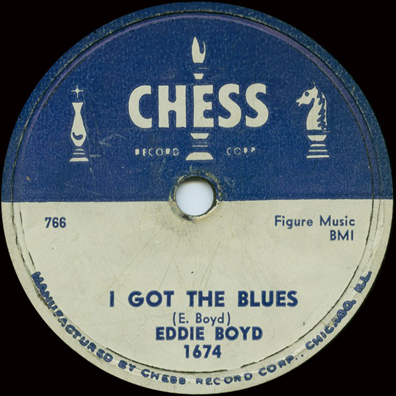
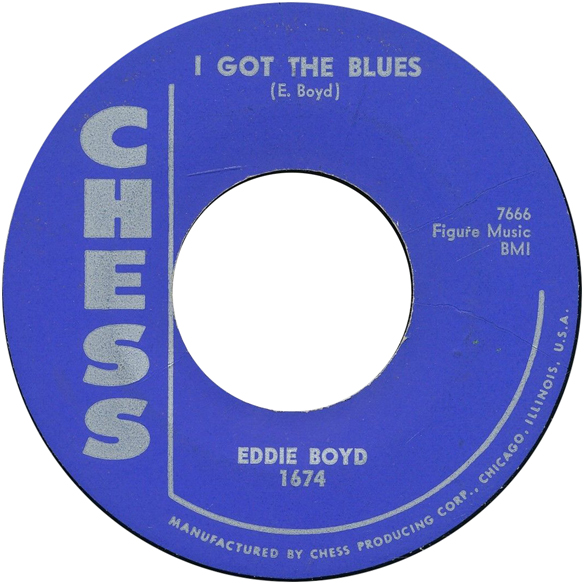
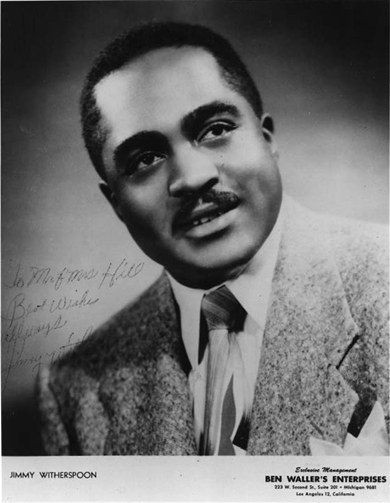
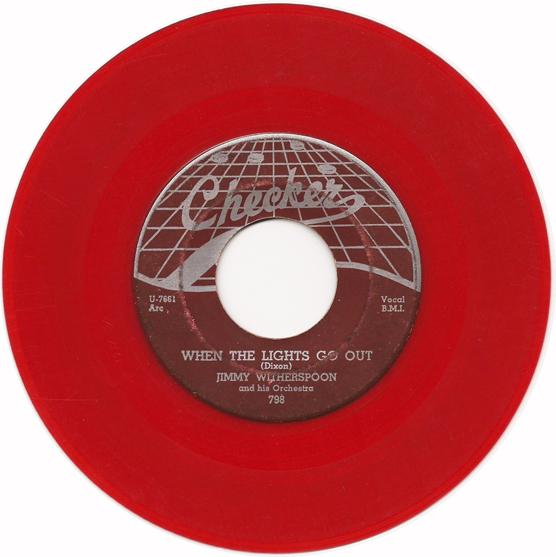
As their resources continued to expand, the Chess brothers started picking up established R&B artists from other parts of the country. Jimmy Witherspoon was born in Gurdon, Arkansas, on August 18, 1921, where he did his first singing in a local Baptist church choir. He served in the Merchant Marine from 1941 to 1943, getting an opportunity to perform in Calcutta with Teddy Weatherford's band. In 1944 he joined Jay McShann's band. In 1947, he recorded four sessions for the Los Angeles-based Supreme label during that year's frantic last quarter; his new rendition of "Ain't Nobody's Business," on his fourth Supreme single, turned into a big hit. Witherspoon left McShann in 1948 to recruit his own combo, recording for Down Beat (1948), Modern (1949-1953), and Federal (1952-1953). His fortunes declined, however, and in 1953 he declared bankruptcy.
The Chess brothers saw an opportunity to pick him up as he was rebuilding his career. The urbane blues shouter's first date for Checker took place on June 10. A studio band of Eddie Chamblee (tenor sax), Lafayette Leake (piano), Echford "Lee" Cooper (guitar), Willie Dixon (bass), and Fred Below (drums) accompanied him on four sides.
Witherspoon's signing was announced in the customary fashion, after he had recorded ("Checker Records Signs Jimmy Witherspoon," Cash Box, July 10, 1954, p. 19). In August (the record was advertised in Cash Box on August 14, p. 27), "When the Lights Go Out" and "Big Daddy," both tunes credited to Willie Dixon, were shipped to retailers on Checker 798. The other two sides would have to wait well into the era of reissues on LP.
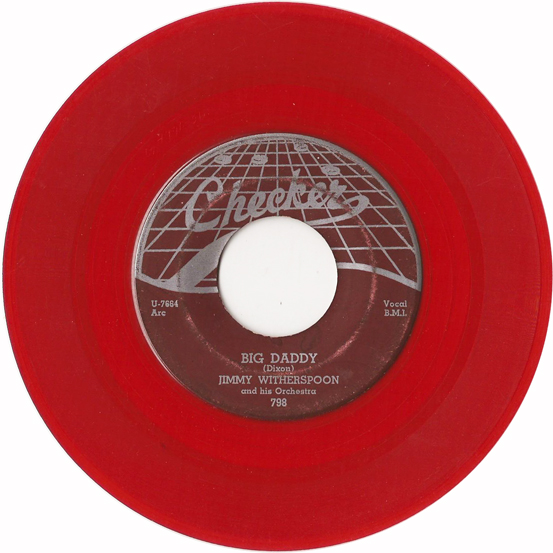
At two sessions in July, Little Walter cut four sides. "My Babe" and "Last Night," done on July 1, were both remade at other sessions; the initial versions had to wait for LP release years later. July 14, on the other hand, yielded both sides of Checker 799.
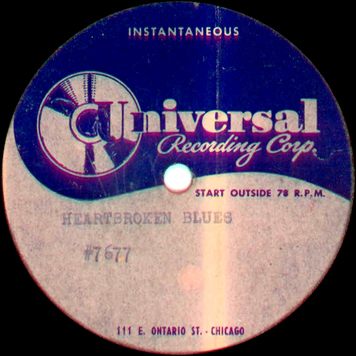
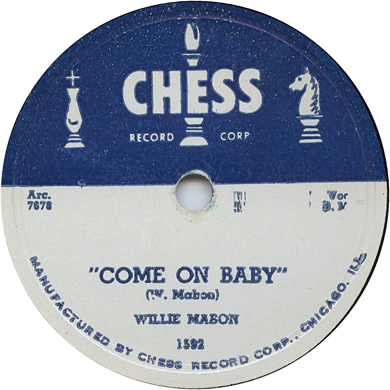
Willie Mabon cut four sides in August, at his second session of the year. "Come on Baby" was chosen for release, in March 1955 on Chess 1592. The single rated a solo ad on March 26, 1955 (Cash Box, p. 27), then got some group exposure on April 2, 1955, p. 65, along with Chess 1589, and Checker 811, 812, and 814). Cash Box also reviewed it on April 2, 1955 (p. 66). Two other sides from the session had to wait 15 years or more for a German LP reissue, while "Heartbroken Blues" was never released and is probably now lost.
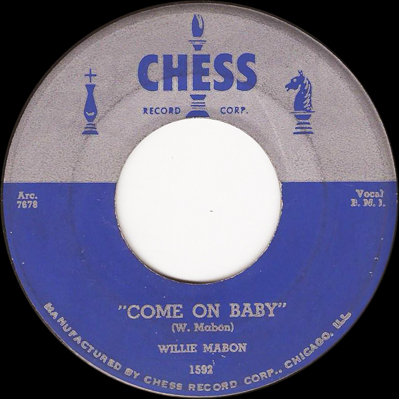
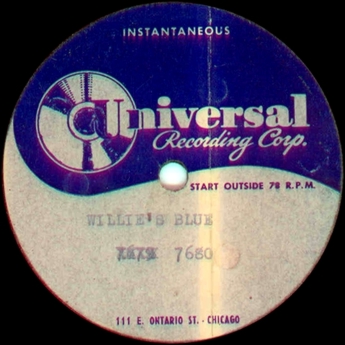
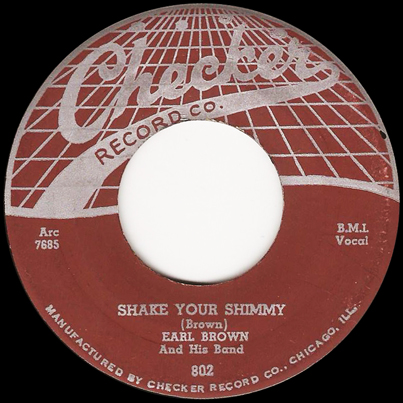
Alto saxophonist and singer Earl Brown started his recording career on the West Coast, with a version of "Dust My Broom" for Swing Time in 1951; the band reportedly included Lowell Fulson on guitar and Lloyd Glenn on piano. A second session for Swing Time, apparently done when the company was in terminal decline, went unreleased for many years. On August 26, 1954 Brown cut four sides for the Chess brothers; Fancourt and McGrath give the location as Chicago. We feel entitled to some skepticism on that score, as they note the presence of a tenor saxophone, piano, bass, and drums, and miss the fierce guitar soloist who dominates both sides of Checker 802 (which was released in both formats). However, Dan Kochakian's interview with Earl Brown in Blues & Rhythm 249 indicates that Brown was in Chicago during the second half of 1954, going on tour with the Muddy Waters band in October and November of that year. Whose band was it? Where did the material come from? From the recording date that's come down to us (which may not be reliable) and the position in the matrix number series, we formerly inferred some connection with Paul Gayten. But there are only two saxes on the date, no baritone, no brass, the balance is very different, and guitarist isn't Ernest McLean.
A connection with Lowell Fulson is more likely, as Brown had played with him on the West Coast and would be included in both of the guitarist's 1955 sessions for Checker. But Fulson's first session for the Chess brothers, cut in Dallas on September 27, 1954 (see below), features a much larger horn section (5 in all) and nothing else about the band resembles the one that was assembled for Brown's. Checker 802 coupled "Shake Your Shimmy," which Brown partly talks and partly sings, with an instrumental called "The Cat's Wiggle." "Wiggle" is not a feature for the alto saxophonist, though he is prominent in the ensemble riffing; it's for the guitarist, a virtuoso vehicle in fact. On "Shake Your Shimmy" (a number that Brown also cut for the Music City label) the guitarist again dominates the ensemble, and saxes are not heard during Brown's talking and singing, though, with the alto in the lead, they take the piece out.
The guitarist who made "Cat's Wiggle" is way too good to remain anonymous. If he was Lowell Fulson, as some have thought, where and when was the session made? If he was Lee Cooper (a candidate that's been proposed by several expert listeners), exactly when was Earl Brown in Chicago (Cooper is not known to have recorded anywhere else) and who else might have been involved?
Although "Wiggle" as released carries U7688 as its matrix number, "Untitled Instrumental" on U7687 (which is known only from a Universal Recording lacquer that came up for sale on ebay a decade ago) is, in fact, the same performance. Meanwhile the test U7688 is an unrelated item (by an unaccompanied gospel quartet). If the Earl Brown session and the gospel material were obtained from another label, which one? When?
Earl Brown released two more sides on Checker in 1957. As Earl "Good Rocking" Brown he recorded a single for Kappa in San Francisco (1958), returned to the Chess brothers in 1959 (enough for an album, but nothing was released at the time). then re-emerged for the last time in San Francisco, doing a single for Shirley (1961).
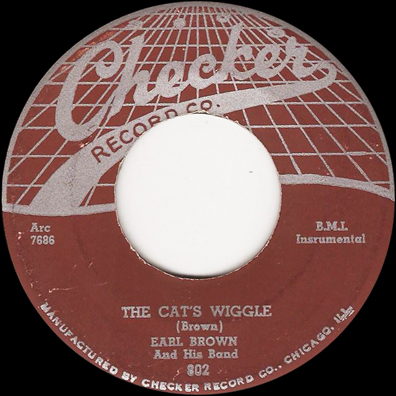
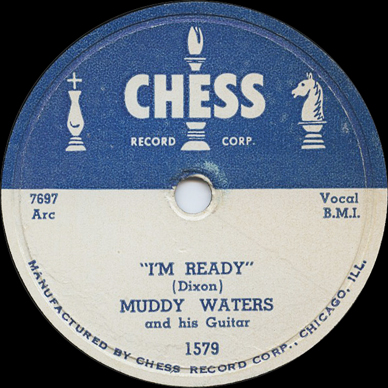
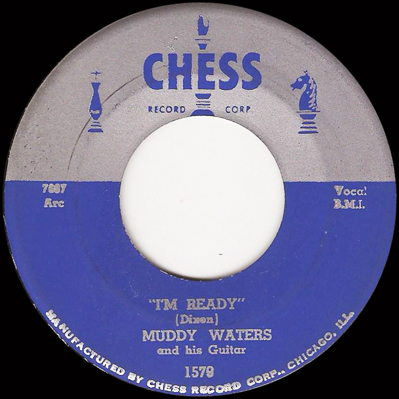
Muddy Waters was back for another classic session on September 13, his third of the year. Willie Dixon provided "I'm Ready" as a follow-up to "Hoochie Coochie Man" and "Want to Make Love." The flip side to Chess 1579, "I Don't Know Why," is just as good. But "Smokestack Lightning" was shelved after Howlin' Wolf recorded his version, in January 1956. It was finally released in the early 1970s. Something called "Shake It Baby," if this really was by Muddy, is still unheard and may have been lost.
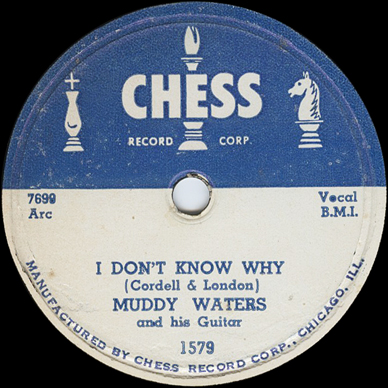
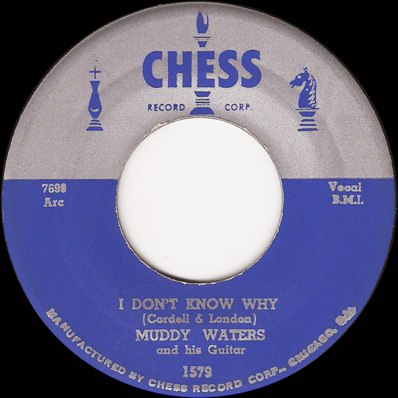
Because Detroit was not nearly the recording center that Chicago was, the company made periodic forays there, or brought Detroit-based artists to Universal Recording. In September Sax Kari made his first appearance on Checker.
Sax Kari (who, despite his moniker, also played guitar and piano) was born Isaac Saxton Kari Toombs February 6, 1920, in Chicago. He was raised in New Orleans, and went to high school in Gary, Indiana. In his late teens, he formed his first combo to play the strip joints of Calumet City, Illinois, and during the 1940s toured the South. At one point he inherited the musicians from the famed Carolina Cotton Pickers, and recorded with them in New York on Apollo. He also played in a variety of big bands, notably those of Coleman Hawkins, Tiny Bradshaw, and the house band at the Rhumboogie in Chicago (probably in the club's waning days, when Floyd Campbell was the leader). In the late 1940s he became one of the Hi De Ho Boys at the Club DeLisa, working alongside Lefty Bates.
During the 1950s Kari was based mainly in Detroit. He recorded there for States (two sessions in 1953). "Daughter (That's Your Red Wagon)," with vocals by Gloria Irving, became a national R&B hit. His second single for States went nowhere, however, so he moved on to record for a much smaller operation called Great Lakes (1953, also done in Detroit). When he came to Chess, Kari was taking another shot at the big time. "Mama Took the Baby," featuring Lena Gordon's vocal, was one of a several "answer records" back at the infamous "Work with Me Annie" and "Annie Had a Baby" by Hank Ballard and the Midnighters. ("Annie's Answer," by Hazel McCollum with Al Smith's band, was a direct competitor on Vee-Jay.) "Disc Jockey Jamboree" was a novelty with a clever conceit, imagining a hit R&B record being auditioned by an assembly of DJs, an impressive number of whom are referred to by name. Kari chants the vocal, with some help from the other band members. Obviously Kari was familiar with the extracurricular habits of the individuals he was referring to, because in the story he tells Al Benson is the first DJ to sing along with the record. The band on the record features a prominent, jazzy trombonist, whose name no one seems to remember, Fletcher Barnett on tenor sax, Jimmy somebody on guitar, Johnny Vincent on bass, and an unidentified but prominent drummer. Kari played piano on the date.
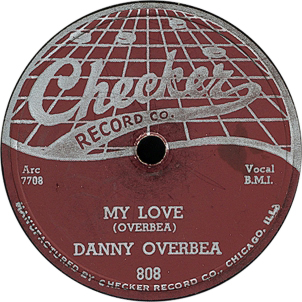
On September 27, Danny Overbea was back with a studio band. Two of his sides were released in December 1954 on Checker 808; the single was advertised in Cash Box on January 15, 1955 (p. 20, along with Chess 1586 and Checker 809), on January 22 (p. 31, same lineup), and on January 29 (p. 31, just with Chess 1586). Overbea continued to trend toward pop material. His Latin number, "My Love," is kind of overripe, but a lot more interesting than the schmaltzy "Toast to Lovers," where the accompaninment includes organ and violins. The other two sides were left in the can.
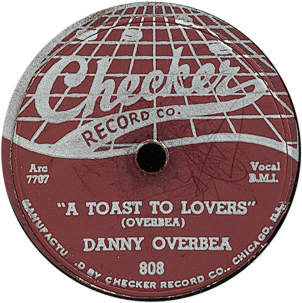
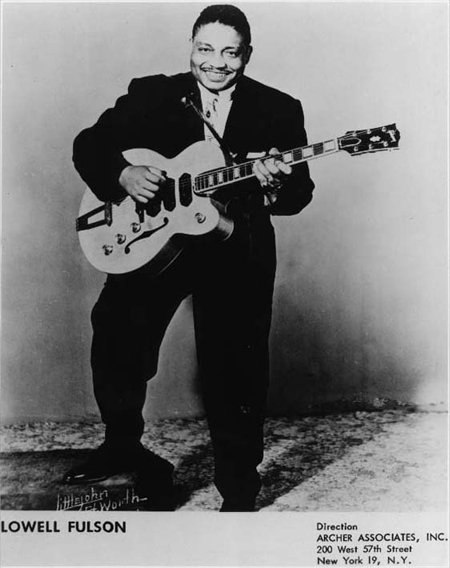
With Lowell Fulson, an established artist since 1946 with a slew of recordings for other labels, the company established a policy of recording in other cities. The first two Fulson sides were cut in Dallas on September 27, 1954, with several members of Ray Charles' band giving a serious kick to the accompaniment. The company seems to have been waiting patiently for Fulson's last contract with Swing Time to expire, even though Swing Time had declared bankruptcy nearly a year earlier and had quit releasing records in the spring of 1954.
Two sides from the September 1954 session were rushed into release on Checker 804. "Reconsider Baby" and "I'll Believe I'll Give It Up" gave Fulson's career with the Chess brothers a powerful launch.
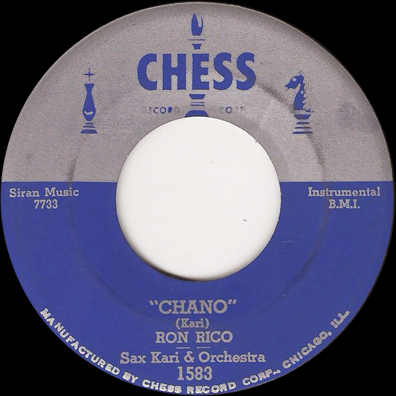
October 1954 turned out to be an extremely busy month in the studio. Sax Kari came right back after Checker 803 with a single on Chess featuring his Latin alter ego, Ron Rico. Today Chess 1583 is much harder to find than his Checker. Evidently neither was the breakthrough hit that they were after, and the Chess brothers dropped Kari.
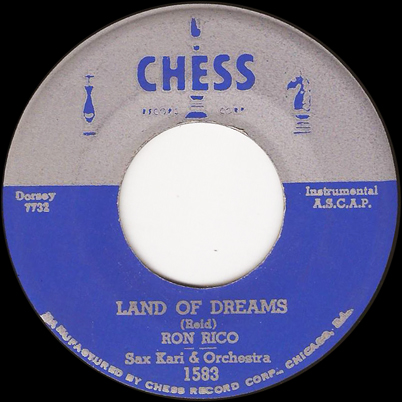
Kari would return to the Chicago scene one last time in 1959, when he cut another sort of "answer record." Like many during that period, it was inspired by "The Purple People Eater." "Goldie the Green Eyed Octopus" was done for JOB. We got our biographical details from Dan Kochakian's exhaustively detailed story, "The Sax Kari Story Part One: 'I Should Have Been Born in New Orleans,'" which appeared in Blues & Rhythm 161 (August 2001).
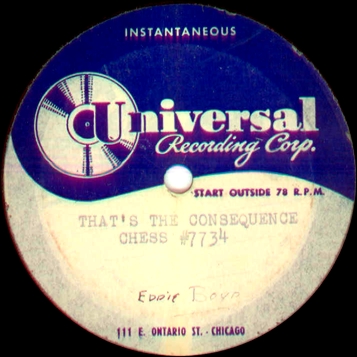
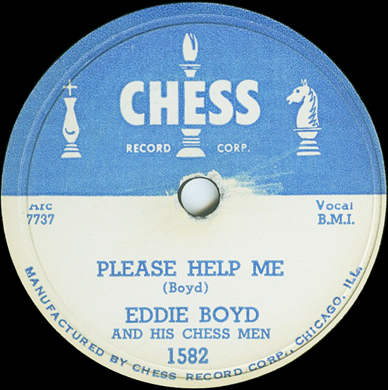
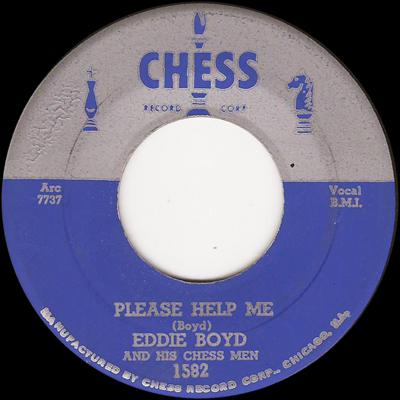
On September 27 (or so we are told), the Chess brothers set up a second four-tune session for Eddie Boyd. "The Story of Bill" and "Please Help Me" went out the door right away on Chess 1582. "Got Me Seein' Double" had to wait a long time to appear on LP, and "That's the Consequence" is unissued after 61 years. At least a test pressing survives.
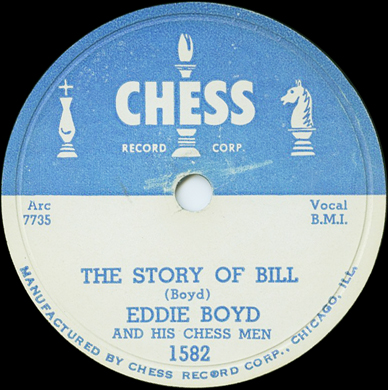
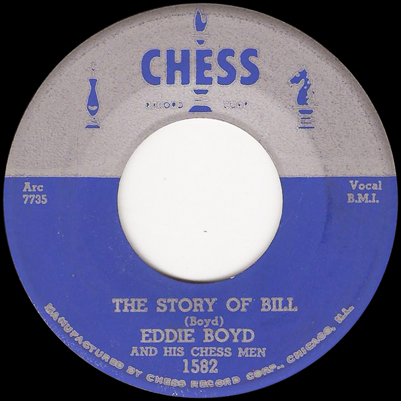
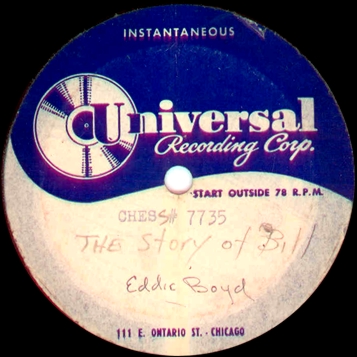
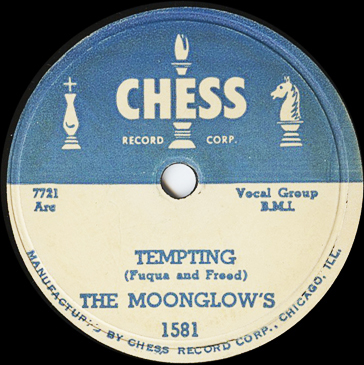
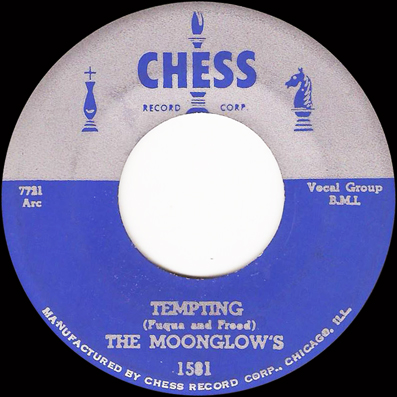
The Moonglows had been recording for Chance, with excellent artistic results but disappointing sales; now Art Sheridan was winding the label down. DJ Alan Freed, who had been sponsoring the doowop group, contacted Leonard Chess, who needed no arm-twisting to sign them. Chess paid Sheridan $500 for what was left on the Moonglows' contract and took them into the studio almost immediately. At this point, the Moonglows consisted of Bobby Lester (lead and tenor), Harvey Fuqua (lead and baritone), Pete Graves (tenor), and Prentiss Barnes (bass). The accompaniment consisted of tenor sax (sounds to us like Lucius Washington), piano, guitar, bass (Willie Dixon, of course), and drums. Other sources credit the accompaniment to Eddie Chamblee's current group. Of the 5 sides done at Universal Recording, two were released under the group's name on Chess 1581; another two were issued on Checker 806 with a credit to Bobby Lester and the Moonlighters. (The Moonlighters releases were framed as vocal duets between Bobby Lester and Harvey Fuqua, but this was a bit of a pretense. The whole group can be heard on "Shoo Doo — Be Doo.") Getting the group's records on two labels at once was expected to increase the overall rate of play by DJs.

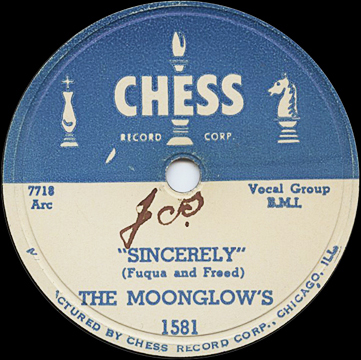
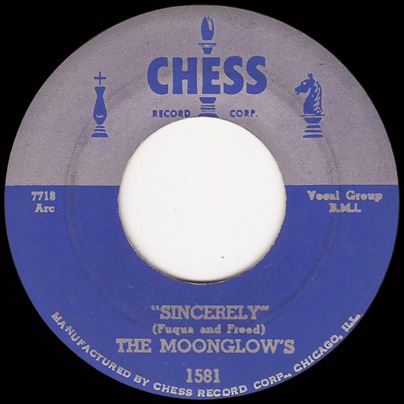
When Chess 1581 came out toward the end of the month, "Sincerely" built up into a national hit, reaching all the way to #1 and staying on the R and B charts for 20 weeks. Its flip, "Tempting," used still-fashionable mambo rhythms. Both "Sincerely" and "Tempting" were credited to Fuqua and Freed, but Freed's actual contributions consisted of an occasional tweak to the lyrics. "Shoo Doo—Be Doo" by the Moonlighters was released in November and garnered strong regional sales.

Willie Dixon would step up his studio supervision in 1955, and turn away from using Lucius Washington. Over the next year Dixon relied most on Eddie Chamblee and Harold Ashby to handle the tenor sax chores. Washington wouldn't become a studio regular until Al Smith picked him up in 1956 for work at Vee-Jay, and occasionally at other companies.
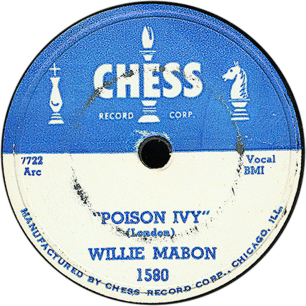
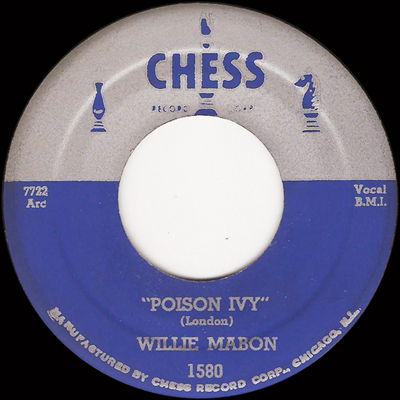
Willie Mabon was back in October for his third session of the year. This time the company was in a hurry to get two sides out. "Say Man" (a stop-time number which featured a compositional contribution by drummer Odie Payne) and "Poison Ivy" (written for Mabon by Mel London) made for a strong release on Chess 1580; "Poison Ivy" would be Mabon's last top-10 R&B chart hit. The combo on this occasion consisted of the faithful Paul King (trumpet), Goon Gardner (alto and baritone saxes), and Herbert Robinson (tenor sax), with Bill Anderson (bass). But the drummer on the session sounds like Odie himself, making a guest appearance.
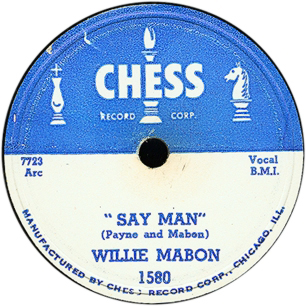
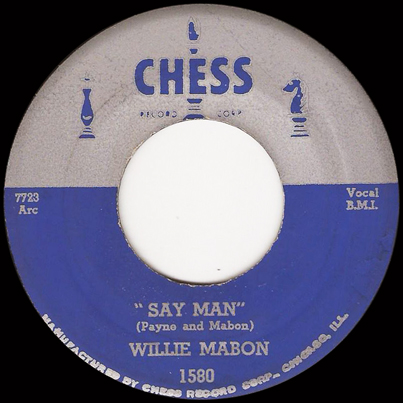
Indeed, the two Mabon tunes were followed (we suspect immediately) by a lengthy session featuring Odie Payne and his combo. Though best known for his work in blues bands, such as Elmore James and the Broomdusters, Payne was leading a Latin ensemble at the time. The company apparently saw no commercial promise in the results, which remain unreleased after 60 years.
On October 5, Little Walter cut two of his best sides: a remake of "Last Night," and "Mellow Down Easy" (a lesser Willie Dixon song that would have sounded seriously dire coming from anyone else). Unusually, both featured vocals. They were given prompt release on Checker 805. A third, instrumental track was left in the vault.
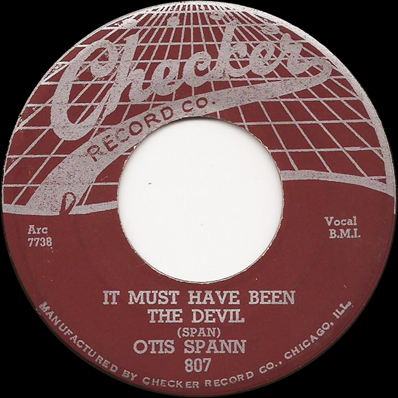
On October 25, 1954, the company split a session between Otis Spann (who had not previously recorded as a leader) and Howlin' Wolf. Jody Williams recalled B. B. King, who knew The Wolf from his Memphis days, dropping by.
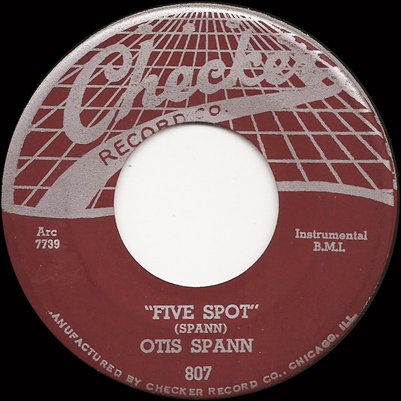
Spann's debut featured his piano and vocals, with George "Harmonica" Smith (on "It Must Have Been the Devil"), Jody Williams and surprise guest B. B. King on guitar, the omnipresent Willie Dixon at the bass, and Earl Phillips on drums. Both Spann's idiosyncratically upbeat approach to "It Must Have Been the Devil" and the instrumental side, "Five Spot," were successful performances, but Spann lacked name recognition at this point in his career, and his debut release on Checker 807 is a rarity today. Spann would record two more sides in 1956, but they were not released until years later. Otis Spann began enjoying more success as a recording artist in 1960, when he recorded an LP for British Decca and one for Candid (when fully mined, the session would generate a couple more for reissue labels such as Barnaby and Mosaic). Although he stayed in the Muddy Waters band during most of this period, Spann continued to record regularly until shortly before his death in 1970.
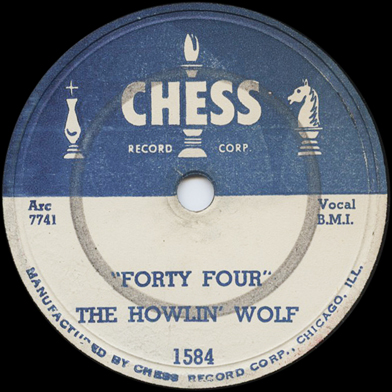
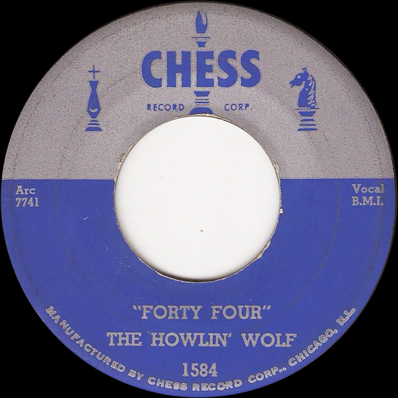
The session continued with the Wolf (vocals and harmonica), Spann at the piano, Jody Williams and Hubert Sumlin (guitars), Willie Dixon and Earl Phillips. The Wolf's malevolent remake of Roosevelt Sykes' "Forty Four" and the even creepier "I'll Be Around" (which seems to be promising a visit from his ghost) made a classic blues single when released in January 1955 on Chess 1584. It sold well enough to show up on the Cash Box regional charts for Memphis and New Orleans.
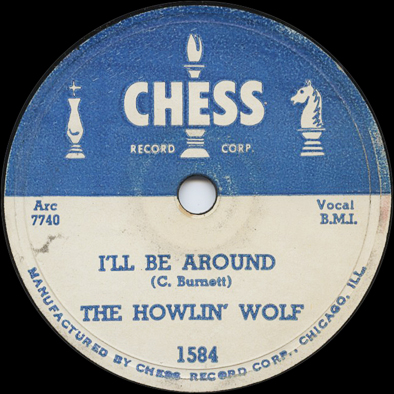
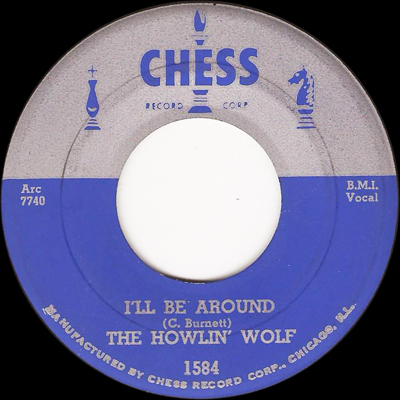
Another significant step in the company's evolution took place in October 1954, when the Chess brothers annnounced the signing of the Griffin Brothers band and Lowell Fulson. Both were established artists. And the moves were announced in the October 30 issue of Billboard—before the Griffins had cut anything: Buddy Griffin and Claudia Swann would record on November 8. In the past, signings were never announced until all of the artists had already recorded (Fulson had). The Chess brothers were now so well established in the business that they could afford to be less fearful of pre-emptive moves by the competition.
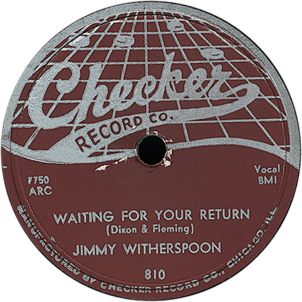
In November, the company brought Jimmy Witherspoon back to Universal Recording for another four sides. On this occasion, the singer was accompanied by Lee Cooper (guitar), Willie Dixon (bass), and Fred Below (drums). Eddie Chamblee was on the road with Lionel Hampton. He was replaced by Harold Ashby on tenor sax, as we may easily judge from the solo on "Time Brings About a Change." A baritone saxophonist was added. Two of the four sides were promptly released, while another waited till the 1980s and "Lovin' Man in Town" has never made it.
Checker 810, "Time Brings About a Change" b/w "Waiting for Your Return," was released in February 1955: plugged by Leonard Chess in Cash Box on February 5, 1955 (p. 25); advertised in Cash Box on Feburary 12 (p. 35); and reviewed on February 26 (p. 22).
Although the pianist on this date has been listed as Lafayette Leake, both sides of Checker 810, which (ahem!) draw a good deal of their inspiration from "The Things I Used to Do," are credited to "Dixon-Fleming." One wonders whether King Fleming might have had something to do with this... Who played piano, we still aren't sure. However, the Dixon who was responsible for "Time Brings About a Change" was Floyd Dixon, who had recorded it for Specialty in 1953 (his version was left in the can for years).
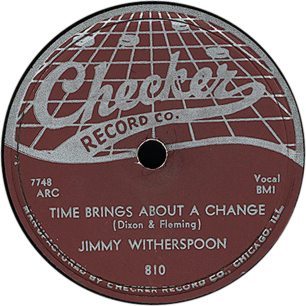
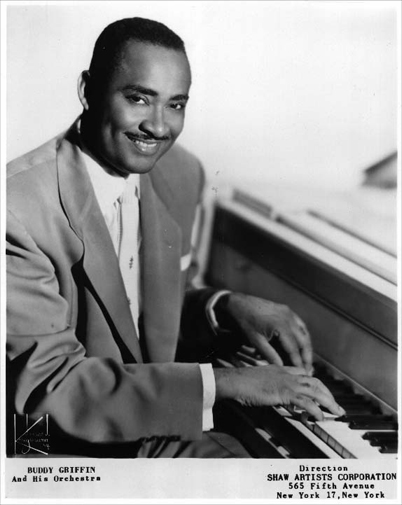
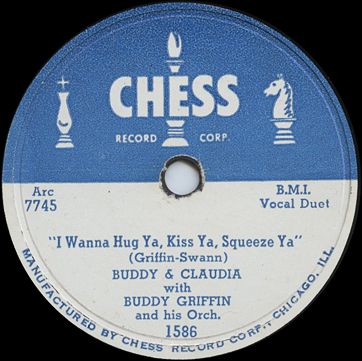
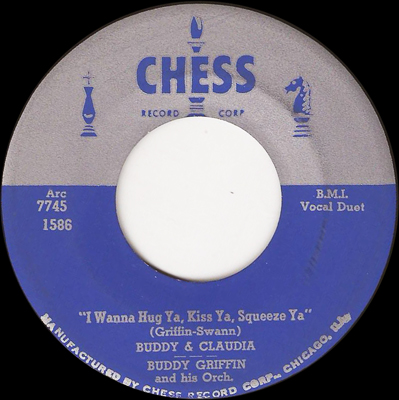
Based in Washington, DC, the Griffin Brothers band had been a premiere R&B ensemble since it began recording for Dot in September 1950. Around the beginning of 1954, trombonist Jimmy Griffin left to form his own band. Edward "Buddy" Griffin made a final session for Dot in January or February 1954. Buddy Griffin played piano on the session and a female vocalist named Claudia Swanson made her recorded debut. Landing the Buddy Griffin Orchestra after their Dot contract expired was a fair coup for Chess. At the band's first session at Universal, on November 8, 1954, Buddy Griffin and Claudia Swann, as she was now known, sang "I Wanna Hug Ya, Kiss Ya, Squeeze Ya," a catchy love duet. The lovelorn flip, "Please Come Back to Me," was entrusted to Swann with uncredited help from the Moonglows. The other members of the band on this occasion were "Silly Willie" Wilson (trombone), Chuck Reeves (alto and baritone saxes), Earl Swanson (tenor sax), Lawrence Burgan (bass), and Courtney Brooks (drums).
"I Wanna Hug Ya" was released on Chess 1586 in January 1955. Leonard Chess was talking about it as a Buddy and Claudia Griffin release in Cash Box for January 15, 1955 (p. 23) and company ads for the record, which started in the same issue, did likewise. On January 15, Chess 1586 joined Checker 808 (Danny Overbea) and Checker 809 (Jon Thomas) in a company ad (p. 20). The triplet was repeated on January 22 (p. 31). Cash Box reviewed the record (as by Buddy & Claudia) in the same issue (p. 34). On January 29, the oomph was just behind Chess 1586 and Checker 808 (p. 31). By February 19, the record was a hit and it got an ad all to itself (Cash Box, p. 23).
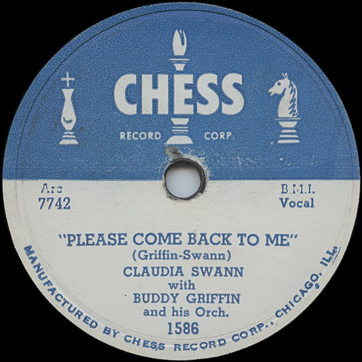
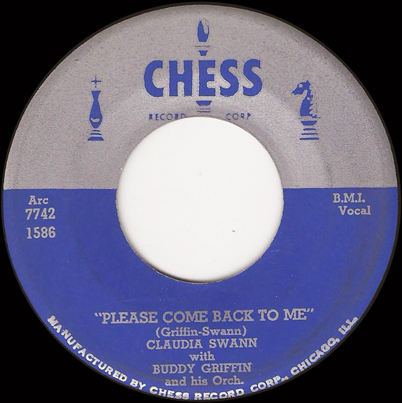
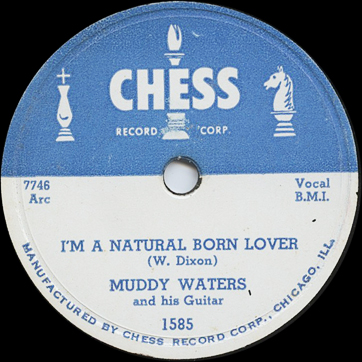
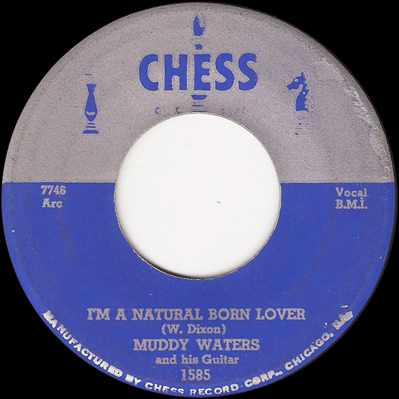
Muddy Waters' final session of the year, in November, took place in the back room at the Chess offices. The sound on "Natural Born Lover" is on the murky side, but this did not prevent its release on Chess 1585 in December 1954 (the record got a higlighted review in Cash Box, on January 22, 1955, p. 30). On "Ooh Wee" (which waited three and a half years to show up on Chess 1724) the microphone is placed so close that Muddy's vocal breathes down the listener's neck. But Leonard Chess liked both performances and shipped the tapes to Universal to prepare the material for release.
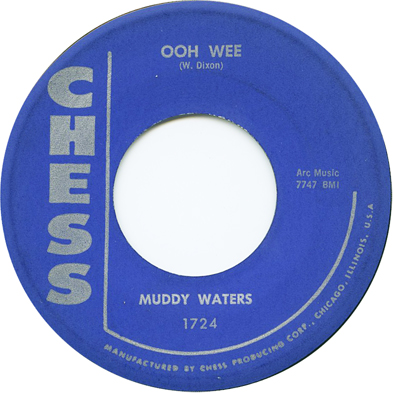
Local 208 of the Musicians Union eventually caught up with this off-the-books activity, which involved no union contracts and no union scale for the musicians. On February 16, 1956
Mr. Leonard Chess of the Chess Record Corporation appeared before the Board as notified to explain certain phases of his recording activity [...]
The Board questioned Mr. Chess at length regarding the use of his studio in his office. He stated that the studio is used for rehearsals and auditions but that he never used the tapes for masters. After the group got their tunes together the session was made at Universal. Under further questioning he stated that he never made a tape for rehearsals unless requested to do so by the orchestra leader. He further explained that his studio is not fully sound proof and it would be impossible for him to produce a tape good enough to be sold. He also advised that he did not employ a technician and that he usually sat at the controls himself and he was far from being perfect.
Mr. Chess was told that he was in violation when he made an audition tape as this procedure was not permitted by the National office. He advised that he was not familiar with this ruling and stated that most of the rehearsals and auditions were with vocal groups where no accompaniment was required. [...]
The matter was discussed at length with Mr. Chess and he was told in no uncertain terms that unless he complied fully with the rules and regulations of the Local and the Federation that his recording license would be in jeopardy. To this, Mr. Chess replied that he had worked too hard to build his business to jeopardize it by entering into collusion with any member in order to save a few dollars. He stated that several years ago this may have happened because he was not in a position at all times to meet his financial obligations. (Local 208 Board meeting minutes, pp. 1-2)
We may be reasonably sure that there was no more recording for release in the back room studio after February 1956, when Leonard Chess was threatened with the revocation of his recording license.
| Matrix | Artist | Title | Release Number | Recording Date | Release Date |
| 7583 | Danny Overbea with King Kolax & Orch. | The Pain | unissued | January 1954 | |
| 7584 | Danny Overbea with King Kolax & Orch. | Stomp and Whistle | Checker 788 | January 1954 | March 1954 |
| 7585 | Danny Overbea with King Kolax & Orch. | Ooh | unissued | January 1954 | |
| 7586 | Danny Overbea with King Kolax & Orch. | Ebony Chant | Checker 788 | January 1954 | March 1954 |
| U7587 | Jimmy Binkley and his Combo | Boogie on the Hour | Checker 789 | January 1954 | March 1954 |
| U7588 | Jimmy Binkley and his Combo | Wine, Wine, Wine | Checker 789 | January 1954 | March 1954 |
| U7589 | Muddy Waters | I'm Your Hoochie Kooche Man [1st 78 pressing] I'm Your Hoochie Cooche Man [all other pressings] |
Chess 1560 | January 7, 1954 | late January 1954 |
| U7590 | Muddy Waters | She's So Pretty | Chess 1560 | January 7, 1954 | late January 1954 |
| 7591 | Jimmie [sic] Rogers and His Rocking Four | Blues All Day Long | Chess 1616 | January 7, 1954 | February 1956 |
| 7592 | Jimmy Rogers and his Rocking Four | Chicago Bound | Chess 1574 | January 7, 1954 | June 1954 |
| 7593 | Leon D. Tarver and The Chordones | Ooh-Wee What's Wrong with Me? | Checker 791 | January 16, 1954 | March 1954 |
| 7594 | Leon D. Tarver and The Chordones | I'm a Young Rooster | Checker 791 | January 16, 1954 | March 1954 |
| U7595 | Leon D. Tarver and The Chordones | Why Do I Love You So? | (Rarin' LP 777) | January 16, 1954 | |
| U7596 | Leon D. Tarver and The Chordones | Baby Come Back to Me | (Rarin' LP 777) | January 16, 1954 | |
| U7597 | and | U7598 | See | Purchased | Sessions |
| U7599 | El Rays with Willie Dixon and Orchestra | Darling I Know | Checker 794 | February 17, 1954 | May 1954 |
| U7599 [alt.] | El Rays with Willie Dixon and Orchestra | Darling I Know | (Chess 2CH 50030) | February 17, 1954 | |
| U7600 | Willie Dixon and Orchestra | Wang Dang Doodle | (Chess CHD 9353) | Feburary 17, 1954 | |
| U7601 | Willie Dixon and Orchestra | So Long | (Power Vine CD 7093 Chess CHD 9353) |
February 17, 1954 | |
| U7602 | El Rays with Willie Dixon and Orchestra | Christine | Checker 794 | c. February 1954 | May 1954 |
| U7603 | Little Walter | Come Back Baby | (Chess [G] 6.24805AG) | February 22, 1954 | |
| U7604 | Little Walter and His Jukes | Rocker | Checker 793 | February 22, 1954 | March 1954 |
| U7605 | Little Walter | I Love You So (Oh Baby*) |
Checker 793* (some later presses) Le Roi Du Blues LP 2012 |
February 22, 1954 | 1960s |
| U7608 | Little Walter and His Jukes | Oh Baby | Checker 793 | February 22, 1954 | March 1954 |
| U7609 | Little Walter | Blue Light | unissued | February 22, 1954 | |
| 7606 | Eugene Fox | Stay at Home | Checker 792 | February 22, 1954 [Clarksdale, MS] |
March 1954 |
| 7607 | Eugene Fox | Sinner's Dream | Checker 792 | February 22, 1954 [Clarksdale MS] |
March 1954 |
| U-7655 | Jessie [sic] Knight and his Combo | Nobody Seems to Want Me | Checker 797 | prob. February 22, 1954 [Clarksdale MS] |
prob. June 1954 |
| U-7656 | Jessie Knight and his Combo | Nothing but Money | Checker 797 | prob. February 22, 1954 [Clarksdale MS] |
prob. June 1954 |
| U7610 | Willie Mabon | I'm Tired | (Chess [G] 6.28406AG) | February 1954 | |
| U-7611 | Willie Mabon | Would You Baby? | Chess 1564 | February 1954 | April 1954 |
| U-7612 | Willie Mabon | Late Again | Chess 1564 | February 1954 | April 1954 |
| U7614 | and | U7615 | See | Purchased | Sessions |
| 7616 | |||||
| 7617 | |||||
| U-7618 | The Howlin' Wolf | No Place to Go | Chess 1566 | March 1954 | May 1954 |
| U7618 [alt.] | Howlin' Wolf | You Gonna Wreck My Life | Chess 1744 | March 1954 | 1958 |
| U7619 | Howlin' Wolf | Neighbors | (Chess LP 1512) | March 1954 | |
| U7620 | Howlin' Wolf | I'm the Wolf | (Chess [G] 6.24804AG) | March 1954 | |
| U-7621 | The Howlin' Wolf | Rockin' Daddy | Chess 1566 | March 1954 | May 1954 |
| U-7622 | Elder Charles Beck | When | Chess 1567 [78 rpm only] |
c. March 1954 | May 1954 |
| U-7623 | Elder Charles Beck | I'm Walking with Jesus at My Side | Chess 1567 [78 rpm only] |
c. March 1954 | May 1954 |
| U7624 | The Southern Stars of Richmond | Weep Little Children | Chess 1568 [78 rpm only] |
c. March 1954 | May 1954 |
| U7625 | The Southern Stars of Richmond | Jesus Will Be Waiting | Chess 1568 [78 rpm only] |
c. March 1954 | May 1954 |
| 7626 | and | 7627 | See | Purchased | Material |
| U7628 | and | U7629 | See | Purchased | Material |
| U7630 | Muddy Waters and his Guitar | Just Make Love to Me | Chess 1571 | April 13, 1954 | May 1954 |
| U7631 | Muddy Waters and his Guitar | Oh! Yeh | Chess 1571 | April 13, 1954 | May 1954 |
| 7632 | Jimmy Rogers and his Rocking Four | Sloppy Drunk | Chess 1574 | April 13, 1954 | June 1954 |
| U7633 | Morris Pejoe | Ain't It Lonesome | unissued | April 1954 | |
| 7634 | through | 7636 | See | Purchased | Material |
| 7637 | Leon D. Tarver and The Chordones | Soup Line | (Rarin' LP 777) | April 20, 1954 | |
| 7638 | Leon D. Tarver and The Chordones | All My Fault | (Rarin' LP 777) | April 20, 1954 | |
| 7639 | Leon Tarver | untitled fast instrumental | unissued | April 20, 1954 | |
| 7640 | Leon Tarver | untitled slow instrumental | unissued | April 20, 1954 | |
| U-7641 | Danny Overbea | Roamin' Man | Checker 796 | April 1954 | June 1954 |
| U7642 | Danny Overbea | I'm a Fool | unissued | April 1954 | |
| 7643 | Danny Overbea | Hey Pancho | Checker 816 | April 1954 | prob. May 1955 |
| U-7644 | Danny Overbea | You're Mine | Checker 796 | April 1954 | June 1954 |
| U-7645 | Sugar Boy | I Bowed on My Knees | Checker 795 | May 1954 [New Orleans] |
c. June 1954 |
| U7646 (9370) |
Wandering Baby | Sugar Boy Crawford | (Chess 2ACMB 209) | May 1954 [New Orleans] |
|
| U-7647 | Sugar Boy | No More Heartaches | Checker 795 | May 1954 [New Orleans] |
c. June 1954 |
| U7648 | Sugar Boy Crawford | What's Wrong | (Chess 2ACMB 209) | May 1954 [New Orleans] |
|
| 7649 | and | 7650 | See | Purchased | Material |
| U7651 | The Coronets | Corbella | (Le Roi du Blues LP 2012) | May 22, 1954 | |
| U7652 | The Coronets | Beggin' and Pleadin' | (Le Roi du Blues LP 2012) | May 22, 1954 | |
| 7653 | Little Walter | I Got to Find My Baby | Checker 1013 [45 rpm] |
May 22, 1954 | May 1962 |
| U7653 [alt.] | Little Walter | I Got to Find My Baby | (Chess CHD4-9340) | May 22, 1954 | |
| U7654 | Little Walter | Big Leg Mama | (Le Roi du Blues LP 2007) | May 22, 1954 | |
| U7655 | and | U7656 | See | Above | at U7607 |
| U-7657 | The Howlin' Wolf | Baby How Long? | Chess 1575 | May 25, 1954 | July 1954 |
| U-7658 | The Howlin' Wolf | Evil Is Goin' On | Chess 1575 | May 25, 1954 | July 1954 |
| 7659 | and | 7660 | See | Purchased | Material |
| 9365 | Sugar Boy Crawford | Please Believe Me | (Chess 2ACMB 209) | 1954 [New Orleans] | |
| 9366 | Sugar Boy Crawford | Long Lost Stranger | (Chess 2ACMB 209) | 1954 [New Orleans] | |
| 9367 | Sugar Boy Crawford | Rollin' | unissued | 1954 [New Orleans] | |
| 9368 | Sugar Boy Crawford | Night Rider | (Chess 2ACMB 209) | 1954 [New Orleans] | |
| 9369 | Sugar Boy Crawford | For Me | (Chess 2ACMB 209) | 1954 [New Orleans] | |
| 9370 | Sugar Boy Crawford | Wondering | (Chess 2ACMB 209) | 1954 [New Orleans] | |
| 9373 | Sugar Boy Crawford | You Know I Love You | (Chess 2ACMB 209) | 1954 [New Orleans] | |
| 9374 | Sugar Boy Crawford | Stop | (Chess 2ACMB 209) | 1954 [New Orleans] | |
| 9375 | Sugar Boy Crawford | Watch Her, Whip Her | (Chess 2ACMB 209) | 1954 [New Orleans] | |
| 9365 | Sugar Boy Crawford | Oh-No | unissued | 1954 [New Orleans] | |
| ? [18795] |
Jimmy Witherspoon | I Can Make Love to You | (Chess CHV-412) | June 10, 1954 | |
| U7661 | Jimmy Witherspoon and his Orchestra | When the Lights Go Out | Checker 798 | June 10, 1954 | August 1954 |
| U7662 | Jimmy Witherspoon | Danger | (Chess LP 93003) | June 10, 1954 | |
| U7663 | Jimmy Witherspoon | Live So Easy | (Chess LP 93003) | June 10, 1954 | |
| U7664 | Jimmy Witherspoon and his Orchestra | Big Daddy | Checker 798 | June 10, 1954 | August 1954 |
| 7665 | Eddie Boyd and His Chessmen | The Nightmare Is Over | Chess 1595 | May 28, 1954 | April 1955 |
| 7666 | Eddie Boyd | I Got the Blues | Chess 1674 | May 28, 1954 | November 1957 |
| U7667 | Eddie Boyd and his Chess Men | Drifting | Chess 1576 | May 28, 1954 | August 1954 |
| U7668 | Eddie Boyd | untitled instrumental | unissued | May 28, 1954 | |
| U7669 | Little Walter | Mercy Babe (My Babe) | (Chess [Can] 60003) | July 1, 1954 | |
| U7670 | Little Walter | Last Night | (Argo LP 4042) | July 1, 1954 | |
| 7671 | and | 7672 | See | Purchased | Sessions |
| U7673 | Little Walter and His Jukes | You'd Better Watch Yourself | Checker 799 | July 14, 1954 | August 1954 |
| U7674 | Little Walter and His Jukes | Blue Light | Checker 799 | July 14, 1954 | August 1954 |
| 7675 | and | 7676 | See | Purchased | Sessions |
| 7677 | Willie Mabon | Heartbroken Blues | unissued | August 1954 | |
| 7678 | Willie Mabon | Come on Baby | Chess 1592 | August 1954 | March 1955 |
| U7679 | Willie Mabon | Lonely Blues | (Chess [G] 6.24806AG) | August 1954 | |
| 7680 | Willie Mabon | Willie's Blue (Willie's Blues) | (Chess [G] 6.24806AG) | August 1954 | |
| 7681 | and | 7682 | See | Purchased | Sessions |
| 7683 | Earl Brown | Sweet Man | unissued | August 26, 1954 | |
| 7684 | Earl Brown | John Henry | unissued | August 26, 1954 | |
| 7685 | Earl Brown And His Band | Shake Your Shimmy | Checker 802 | August 26, 1954 | October 1954 |
| 7686 7687 |
Earl Brown And His Band | The Cat's Wiggle No Title Selection 3 [guitar instrumental] |
Checker 802 | August 26, 1954 | October 1954 |
| 7688 | See | Purchased | Sessions | ||
| 7689 | through | 7692 | See | Purchased | Sessions |
| 7693 | and | 7694 | See | Purchased | Sessions |
| 9416 | Sugar Boy Crawford | Love, Love, Love | (Chess 2ACMB 209) | 1954 [New Orleans] | |
| 9417 | Sugar Boy Crawford | Troubled Mind Blues | (Chess 2ACMB 209) | 1954 [New Orleans] | |
| 9418 | Sugar Boy Crawford | Oo Wee Sugar | (Chess 2ACMB 209) | 1954 [New Orleans] | |
| 9419 | Sugar Boy Crawford | There Goes My Baby | (Chess 2ACMB 209) | 1954 [New Orleans] | |
| 9422 | Sugar Boy Crawford | You Call Everybody Sweetheart | (Chess 2ACMB 209) | 1954 [New Orleans] | |
| 9423 | Sugar Boy Crawford | If I Love You Darling | (Chess 2ACMB 209) | 1954 [New Orleans] | |
| 7697 | Muddy Waters and his Guitar | I'm Ready | Chess 1579 | September 13, 1954 | late September 1954 |
| 7698 | Muddy Waters | Smokestack Lightning | (Chess [Br] 6641174) | September 13, 1954 | |
| 7699 | Muddy Waters and his Guitar | I Don't Know Why | Chess 1579 | September 13, 1954 | late September 1954 |
| 7700 | Muddy Waters | Shake It Baby | unissued | September 13, 1954 | |
| 7701 | Lena Gordon | Sax Kari and Orch. | Mama Took the Baby | Checker 803 | September 1954 | late September 1954 |
| 7702 | Sax Kari and Orch. | Disc Jockey Jamboree | Checker 803 | September 1954 | late September 1954 |
| 7703 | and | 7704 | See | Purchased | Sessions |
| 7705 | and | 7706 | See | Purchased | Sessions |
| 7707 | Danny Overbea | A Toast to Lovers | Checker 808 | September 27, 1954 | December 1954 |
| 7708 | Danny Overbea | My Love | Checker 808 | September 27, 1954 | December 1954 |
| 7709 | Danny Overbea | Cherokee Hug | unissued | September 27, 1954 | |
| 7710 | Danny Overbea | Green Valley | unissued | September 27, 1954 | |
| 7711 | Lowell Fulson | Reconsider Baby | Checker 804 | September 27, 1954 [Dallas] |
October 1954 |
| 7712 | Lowell Fulson | I Believe I'll Give It Up | Checker 804 | September 27, 1954 [Dallas] |
October 1954 |
| 7713 | and | 7714 | See | Purchased | Sessions |
| 7715 | and | 7716 | See | Purchased | Sessions |
| 7717 | Bobby Lester and The Moonlighters | Shoo Doo—Be Doo (My Loving Baby) | Checker 806 | October 1954 | November 1954 |
| U7718 | The Moonglow's [sic] | Sincerely | Chess 1581 | October 1954 | late October 1954 |
| 7719 | Bobby Lester and The Moonlighters | So All Alone | Checker 806 | October 1954 | November 1954 |
| U7720 | The Moonglows | Such a Feeling | unissued | October 1954 | |
| U7721 | The Moonglow's | Tempting | Chess 1581 | October 1954 | late October 1954 |
| U7722 | Willie Mabon | Poison Ivy | Chess 1580 | October 1954 | late October 1954 |
| U7723 | Willie Mabon | Say Man | Chess 1580 | October 1954 | late October 1954 |
| 7724 | Odie Payne | Samba Rhythm Blues | unissued | October 1954 | |
| 7725 | Odie Payne | My Honey Man | unissued | October 1954 | |
| 7726 | Odie Payne | Triangle Girl | unissued | October 1954 | |
| 7727 | Odie Payne | Gallop Rhumba | unissued | October 1954 | |
| 7728 | Odie Payne | La Do Da Dee | unissued | October 1954 | |
| 7729 | Odie Payne | Give Me a Drink | unissued | October 1954 | |
| 7730 | Odie Payne | Can't Get You off My Mind | unissued | October 1954 | |
| 7731 | Odie Payne | I'm in a Daze | unissued | October 1954 | |
| 7732 | Ron Rico | Sax Kari & Orchestra | Land of Dreams | Chess 1583 | October 1954 | December 1954 |
| 7733 | Ron Rico | Sax Kari & Orchestra | Chano | Chess 1583 | October 1954 | December 1954 |
| 7734 | Eddie Boyd | That's the Consequence (It's True I Love You) | unissued | September 27, 1954 | |
| 7735 | Eddie Boyd and His Chess Men | The Story of Bill | Chess 1582 | September 27, 1954 | November 1954 |
| 7736 | Eddie Boyd | Got Me Seein' Double | (Chess [G] 6.24810AG) | September 27, 1954 | |
| 7737 | Eddie Boyd and His Chess Men | Please Help Me | Chess 1582 | September 27, 1954 | November 1954 |
| 4415 | Little Walter? | untitled instrumental | unissued | October 5, 1954 | |
| 4416 | Little Walter and his Jukes | Last Night | Checker 805 | October 5, 1954 | November 1954 |
| 4417 | Little Walter and his Jukes | Mellow Down Easy | Checker 805 | October 5, 1954 | November 1954 |
| 4418 | Little Walter | Instrumental | (Le Roi du Blues LP 2017) | October 5, 1954 | |
| 7738 | Otis Spann | It Must Have Been the Devil | Checker 807 | October 25, 1954 | December 1954 |
| 7739 | Otis Spann | Five Spot | Checker 807 | October 25, 1954 | December 1954 |
| 7740 | The Howlin' Wolf | I'll Be Around | Chess 1584 | October 25, 1954 | January 1955 |
| 7741 | The Howlin' Wolf | Forty Four | Chess 1584 | October 25, 1954 | January 1955 |
| 7742 | Claudia Swann [and the Moonglows] with Buddy Griffin and his Orch. | Please Come Back to Me | Chess 1586 | November 8, 1954 | January 1955 |
| U7743 | Buddy and Claudia | Runnin' for My Life | unissued | November 8, 1954 | |
| U7744 | Buddy and Claudia | How Can You Say You Love Me | unissued | November 8, 1954 | |
| 7745 | Buddy and Claudia with Buddy Griffin and his Orch. | I Wanna Hug Ya, Kiss Ya, Squeeze Ya | Chess 1586 | November 8, 1954 | January 1955 |
| 7746 | Muddy Waters and his Guitar | I'm a Natural Born Lover | Chess 1585 | November 1954 [Chess offices] |
December 1954 |
| 7747 | Muddy Waters | Ooh Wee | Chess 1724 | November 1954 [Chess offices] |
April 1959 |
| 7748 | Jimmy Witherspoon | Time Brings About a Change | Checker 810 | November 1954 | February 1955 |
| U7749 | Jimmy Witherspoon | Lovin' Man in Town | unissued | November 1954 | |
| 7750 | Jimmy Witherspoon | Waiting for Your Return | Checker 810 | November 1954 | February 1955 |
| U7751 | Jimmy Witherspoon | T.W.A. | (Chess LP 93003) | November 1954 |
Making up to some extent for decreased vigor at Universal Recording, the Chess brothers bought 48 sides from other sources in 1954.
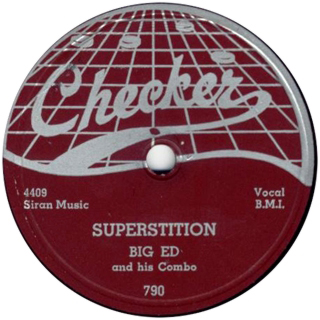
Four of these were from Joe Von Battle's boutique operation, J-V-B, in Detroit; Von Battle had previously supplied Chess with some John Lee "Booker." Bluesman Eddie Burns, an occasional Hooker collaborator who went on the labels as Big Ed, got a release on Checker 790.
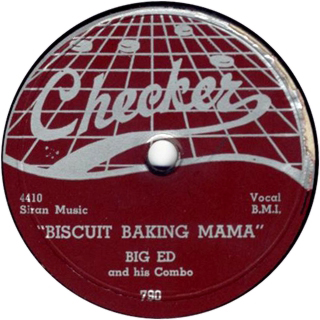
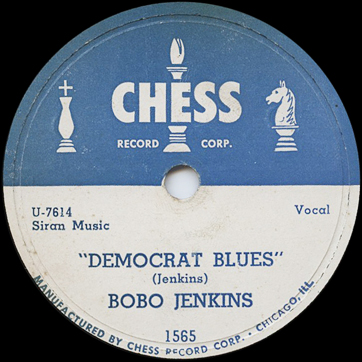
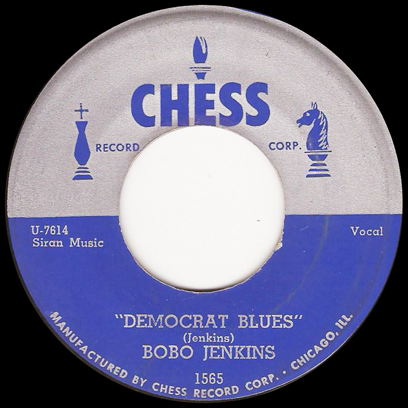
The other J-V-B item was a single by guitar-playing bluesman Bobo Jenkins, doing a little bit of electioneering in time for the 1954 midterms. It was his only release on the Chess labels. Jenkins mostly recorded for small Detroit-based entities, but he would make a reappearance in Chicago in 1959, for a tiny indie called Boxer.
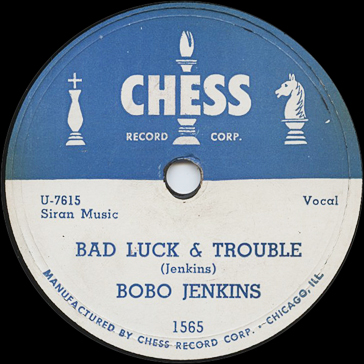
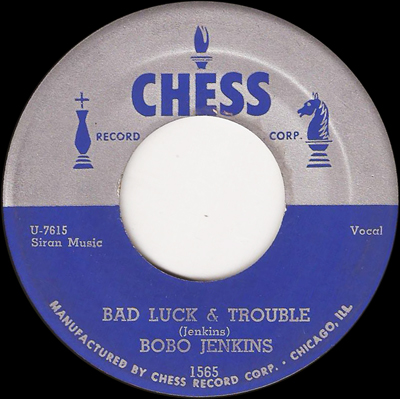
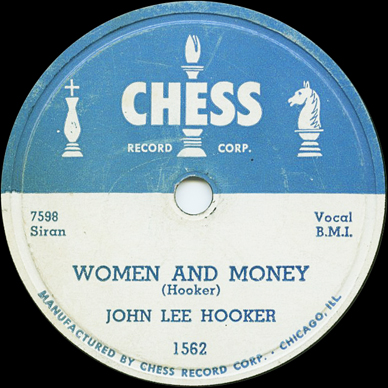
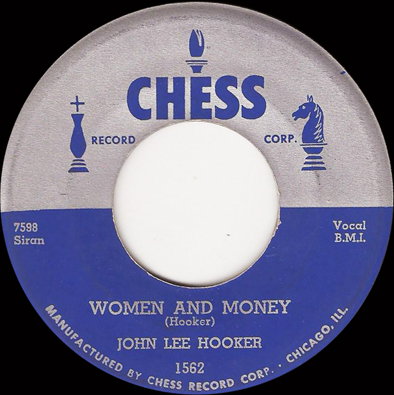
The brothers got some more of John Lee Hooker, now from the eccentric Fortune operation, also out of Detroit. This was one of the few occasions on which Fortune licensed any of its product. Chess 1562 was released in March 1954 (advertised in Cash Box on March 27); it would be the company's last John Lee Hooker release prior to the reissue LP era.
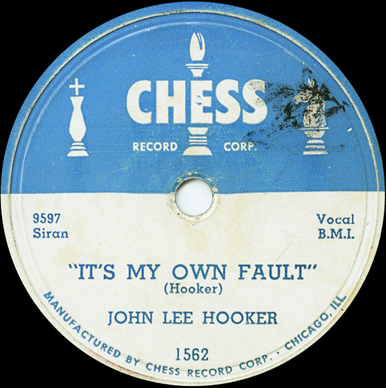
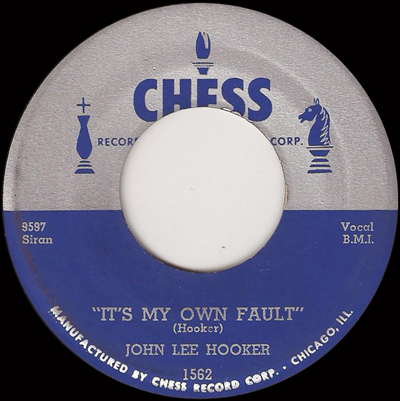
Among the most enigmatic of all Chess releases is 1559, by a vocal group called The Chesterfields. We don't know who the Chesterfields were, or who they originally recorded for. Not only is their Chess release extremely rare, but it appeared on 78 only, which suggests they were a gospel group (never having heard them, we can't even say whether they were or not).
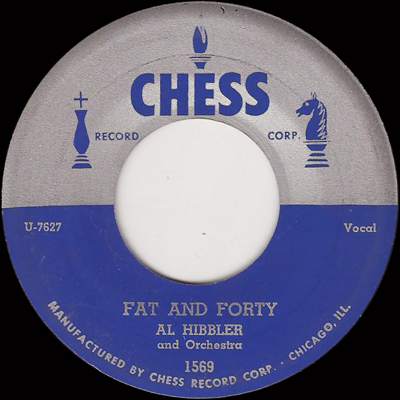
After losing interest in the pile of masters they'd acquired from Miracle, Premium, and Sunrise, the Chess brothers made a delayed dip into the Al Hibbler material. They really expected 6 and 7-year-old sides ("Poor Butterfly" and "Fat and Forty," respectively) to generate some fresh sales—and it appears they were right. Their next Miracle/Premium/Sunrise recycling venture would be their very first LP, Marterry (later Argo) 601, also by Al Hibbler.
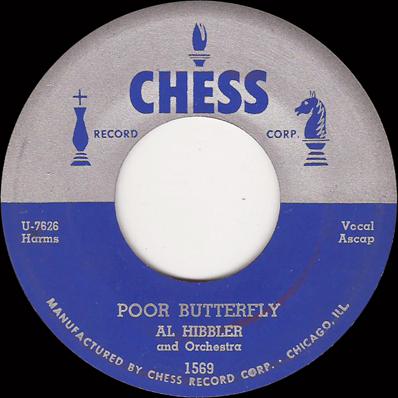
The two sides by The Swans, a doowop group, were apparently a joint venture with DJ Al Benson's Parrot label. We know that two tracks by the group were assigned numbers 7649 and 7650 in the Chess master book. We are assuming that these are the ones that appeared years later on a Relic LP and a (strictly bootleg) Parrot 45, under the titles we have listed.
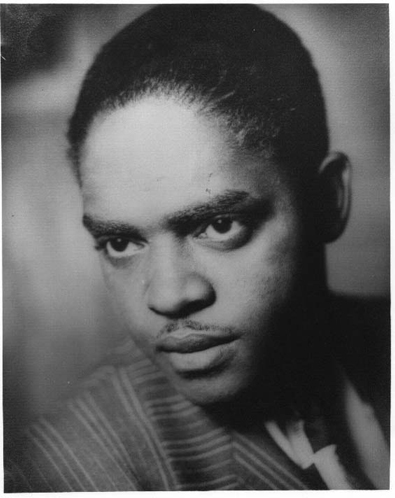
Chess launched a new, productive relationship with pianist, bandleader, and producer Paul Gayten in New Orleans. Paul Leon Gayten was born in Kentwood, Louisiana, on January 29, 1920. He was the nephew of Little Brother Montgomery, and was playing piano professionally in his teens. His first group, Paul Gayten's Sizzling Six, included Teddy Edwards on tenor saxophone. After serving in the Army, where he led a band, during World War II, he started a trio that promptly landed a steady engagement in New Orleans.
In the fall of 1947, Aristocrat tried to sign Gayten's singer Annie Laurie, but the deal fell through because she was staying with Gayten, and Gayten was staying with the DeLuxe label. In all, Gayten recorded more than 60 sides for DeLuxe in New Orleans, between January 1947 and January 1949. From the summer of 1949 through the fall of 1951, he was with Regal, where he scored a hit with Larry Darnell; he then spent two years with OKeh, making another hit ("Cow Cow Blues"). But his last session for the label came in November 1953, as Columbia was cutting way back on its subsidiary.
The outing on August 26, 1954, in New Orleans, was his first for the Chess brothers. Fancourt and McGrath put Gayten (piano, vocals), Lee Allen (tenor sax), Alvin "Red" Tyler (baritone sax), Ernest McLean (electric guitar), Frank Fields (bass), and Earl Palmer (drums) on the session. They overlooked the trumpet player, not to mention the funky trombonist who is in evidence on "Get It." Billy Vera's liner notes to Chess CH9294 and CHD9294, Paul Gayten: Chess King of New Orleans, mention but don't identify the trumpet player, and nominate Edgar "Big Boy" Myles for the trombone role. Vera, citing Gayten's recollections, has Edgar Blanchard on guitar. Checker 801 (78 and 45) paired the vigorous "Get It" (featuring solos by Lee Allen and the guitarist) with an "I'm Tired" morose enough to warrant a psychiatric referral (also featuring a solo by Allen). Great drumming by Earl Palmer can be heard on both. Gayten was an effective vocalist, though too enamored, on occasion, of the yip previously employed by Dossie Terry and Cleanhead Vincent.
A previously unreleased item, "Down Boy," first appeared on the aforementioned Chess LP and CD in 1989. Vera places it in 1954 and it appears to have the same four horns on it. There is a tempting gap in the matrix series at U7695 and U7696, where "Down Boy" may have once been intended to go. If there was a fourth side from the session, however, it must be long lost.
In 1956, Paul Gayten quit touring and moved onto the Chess payroll as producer, talent scout, and songwriter. He brought Clarence "Frogman" Henry to the company in 1956 (Henry would be an Argo artist), made records under his own name through March 1958, and did occasional session work for several years. In 1960, he moved to Los Angeles to run the company's new branch operation. In 1968, when Chess was sold, he started the Pzazz label, which went out of business when too many distributors failed to pay up. He subsequently retired Paul Gayten died in Los Angeles on March 26, 1991.
(We should note that the Sugar Boy Crawford sessions from 1953 and 1954 have sometimes been attributed to Paul Gayten. These were all definitely done in New Orleans, but the studio material seems to have been made under Leonard Chess's direct supervision.)
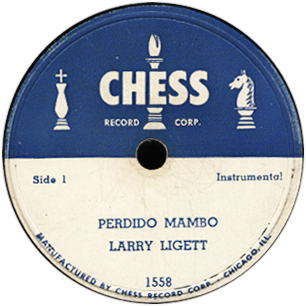
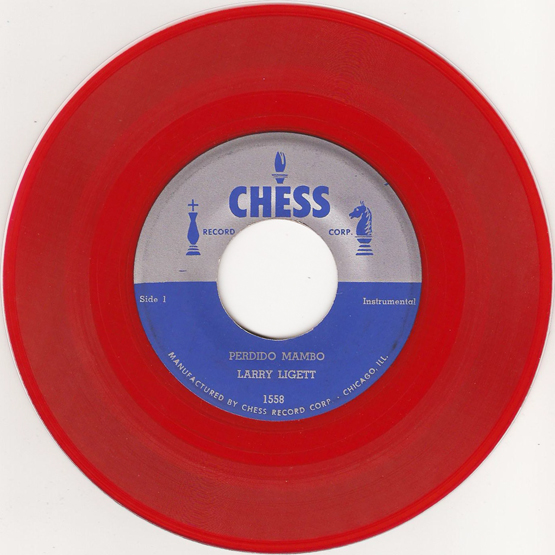
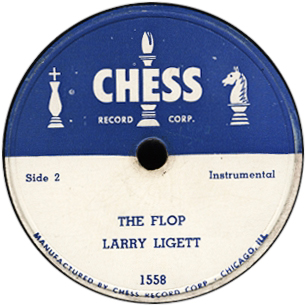
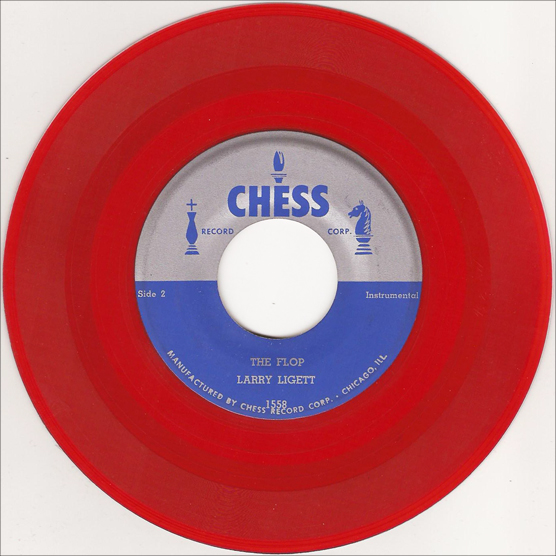
The Chess brothers also began to acquire sides by Larry Liggett, the leader of an instrumental R&B combo that, on his first release, consisted of his alto sax with piano, guitar, bass, and drums. (Liggett sang occasionally, as we can hear on "That Man Is Walking," a blues on which he played tenor sax). The liner notes to the Chess Rhythm & Roll compilation, operating on the assumption that Liggett was from Chicago, incorrectly identified him with Ellsworth "E. L." Liggett—probably not related—who played string bass in the 1940s.
The initial release of the first Liggett single was on Note 1000. Note was an Indianapolis-based label, and Chess 1558 carried the same "foreign" matrix numbers. Liggett's subsequent releases had U7000 series matris numbers, but as they were always entered into the master book in pairs and the publisher for Liggett's originals was always listed as Condor (Note's house music company), we know they were produced elsewhere. Note material originated in either Indianapolis or Cincinnati (there being more studios in the Queen City than in Naptown).
Larry Liggett was a stage name. Laurence Leonard Leggett was born in Brazil, Indiana, on October 23, 1921. At 10, he became the youngest member of the Brazil High School marching band. At Indiana State Teachers College (now Indiana State University), he was the first black member of the marching band, the symphonic band, and the orchestra, and the first black student to earn a degree in music. He played in an Army Air Force band during World War II. To Naptown students, Leggett was what Fess Whatley, Percy McDavid, and Captain Walter Dyett had been in other places at somewhat earlier times. From 1948 to 1978, he taught band and instrumental music at Crispus Attucks High School, where his students included Freddie Hubbard and Larry Ridley. He was also responsible for the music instruction at 14 primarily black elementary schools. His bands and orchestras won 58 awards at the state music contest. From 1978 until his retirement in 1988, he was the director of music education for the Indianapolis public school system.
Liggett was one of the top saxophonists in Naptown, precluded from touring by his day job. (He reportedly turned down offers from both Count Basie and Duke Ellington.) So the group we hear on his recordings for Note and Chess was a part-time affair. From 1950 to 1956, he led Three Flips and a Flop, working most frequently at Mates' White Front Nightclub. His recording ensemble (a quintet, on the sides we have heard) added one musician.
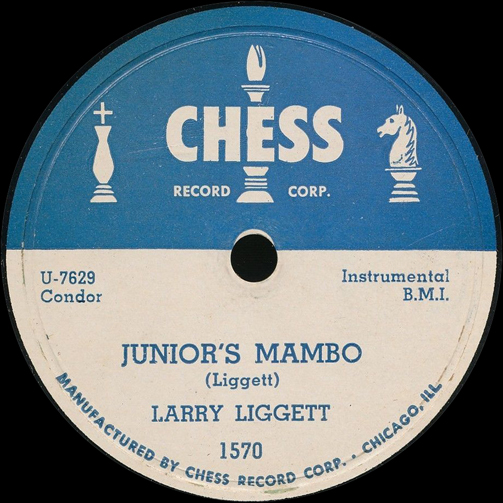
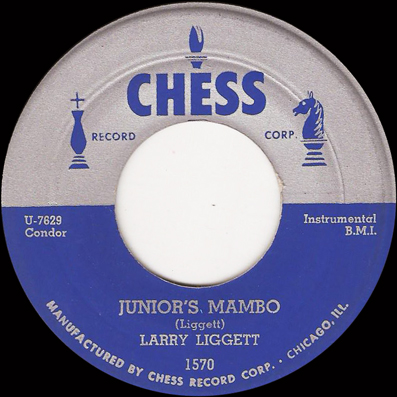
A second Liggett release appeared on Chess 1570, around May 1954, and a third on 1578, in October.
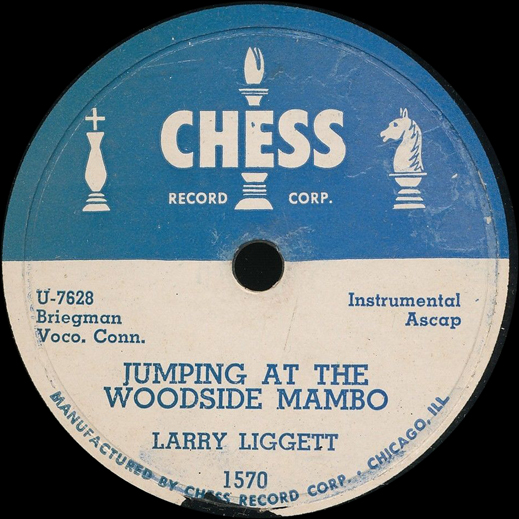
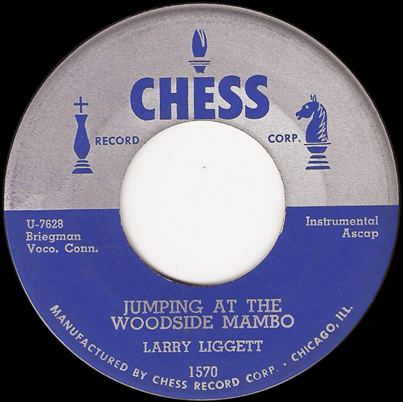
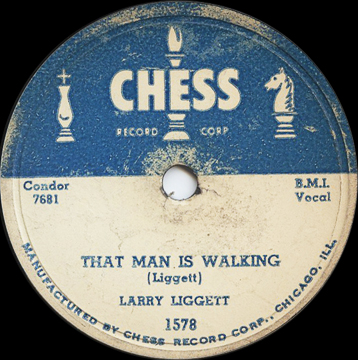
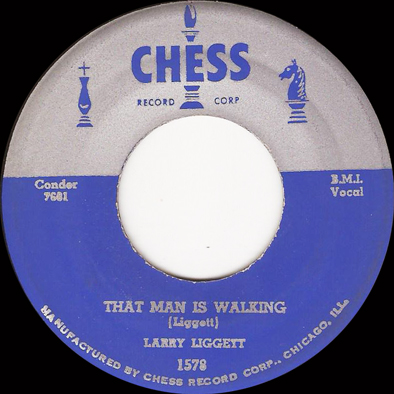
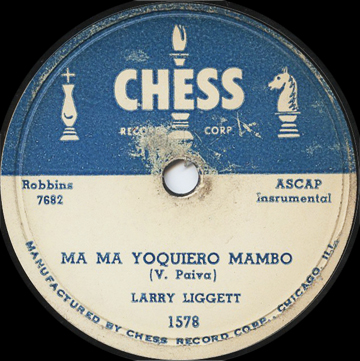
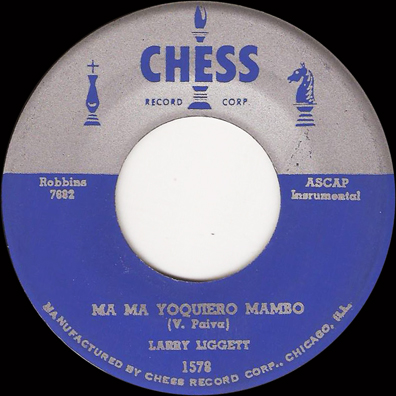
In August 1954, there was another acquisition from Note, by a vocal group called The Teasers. Accompaniment on Checker 800 was provided by Jimmy Binkley's combo, which had already made its own session for Checker.
There would be a little more from Note over the next two years; the Liggett series kept going into 1956, when Three Flips and a Flop broke up (his last release would be Chess 1622).
Chess resumed some licensing from Note, now with other artists, in 1958 and 1959. In 1957, Laurence Leggett organized a small Swing band, which most of its membership from teachers in the Indianapolis Public Schools; the Larry Liggett Band was in long residencies at two big hotels, the Marriott for 4 years during the early 1960s, and Stouffer's Inn from 1967 to 1974. At Stouffer's which opened in 1967 on the site formerly occupied by the Frank Van Camp mansion, the band recorded Larry Liggett Swings Stouffer's. Now a rare collector's item, the 1969 LP appeared on a label (Meridian) with a number (2820) that supplied the hotel's address. It featured a 7-piece ensemble playing arrangements of latter-day Count Basie and Duke Ellington numbers, as well as a Jimmy Coe arrangement of "Windy," in honor of the recently deceased Wes Montgomery. On his LP, Leggett played alto sax exclusively, delegating the tenor duties to Fred "Big Cat" Monroe. In 1991, Leggett received the Sagamore of the Wabash award, and, in 1999, a Governor's Arts Award. Laurence Leggett died in Indianapolis on January 20, 2001.
We drew our biography from David Leander Williams, Indiana Jazz: The Masters, Legends, and Legacy of Indiana Avenue (The History Press, 2014, pp. 164-165), and a memorial notice at http://www.findagrave.com/cgi-bin/fg.cgi?page=gr&GRid=45958837)
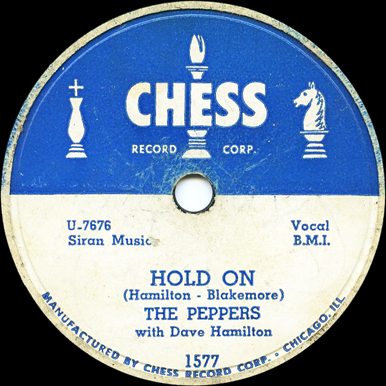
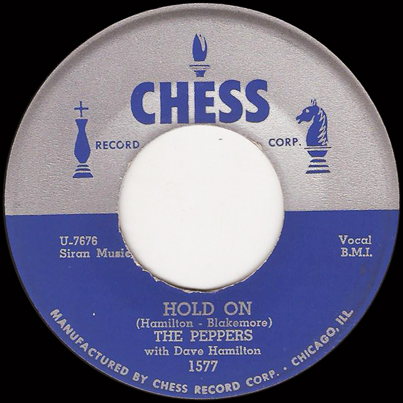
A further one-off acquisition from the Detroit scene (we don't know which company did the original recording) was Chess 1577, by a vocal group called The Peppers. It would be nice to learn something about the vocalists, or the accompanying combo, which was led by one Dave Hamilton. It so happens that the 45-rpm edition of 1577 was the last to use the original "silvertop" Chess design, with "Record" and "Corp." splayed out widely to the left and the right. Subsequent 45 labels moved "Record Corp" together above the center hole.
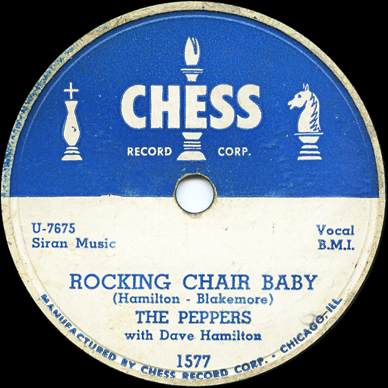
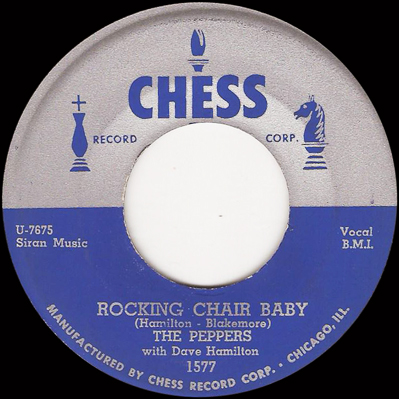
A previously unknown side appeared on a Universal Recording Studio test pressing that came up for auction in the fall of 2002, when it was acquired by Dan Kochakian. 7688 is an unaccompanied male gospel quartet number. There is no further documentation on the item, so we don't know where the Chess brothers picked it up or who the artists were. Oddly, however, the flip, 7687, which also carries no title, is "The Cat's Wiggle" by Earl Brown, from his session of August 26, 1954 (it ended up being released with matrix number 7686).
There may be some connection (such as label of origin) between the elusive 7688 and 7689 through 7692, four sides by drummer Felix Gross and his R and B band. Gross was out of Los Angeles, had recorded for Swing Time, and had gotten two sides picked up by Chess on a previous occasion. These tracks are supposed to have originated in Dallas, back in 1952. We can say no more, because after acquiring them, the Chess brothers did nothing with them. They may have felt that Gross's brand of R&B (akin to what Liggins brothers were putting down) was becoming dated.
What looks like the final acquisition of the year (we are putting it here so the Chess 4858 Country series can get a section of its own) was a gospel group by now familiar to the company, the Southern Stars. The label of origin was Tip Top, in Richmond, Virginia. Tip Top was run by Joe Sinsheimer, of Allen Distributing Company; he had been involved with the group's earlier recordings before opening his own label (which, by November 1955, seems to have reached just TIp Top 202; Cash Box, November 5, p. 19). It was becoming increasingly common for the Chess brothers to buy sides and then decide not to release them. That's what happened here; there would be no fifth single for the group.
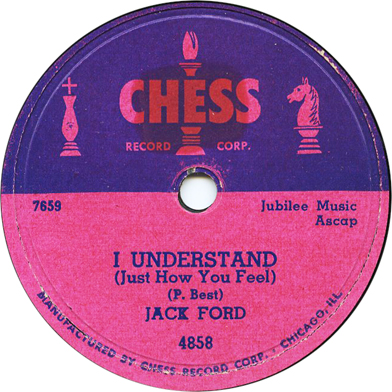
The Chess brothers had never been committed to "hillbilly" or "country and Western." We have no idea whether Leonard Chess was in the studio when Dick Hiorns cut his four sides—the only country offerings for Aristocrat— back in December 1947. In the early days of Chess and Checker, they obtained a handful of sides from Sam Phillips in Memphis (such as the Bob Price single), plus the Tommy Trent single from an unknown source on the East Coast. In May or June 1954, however, Leonard and Phil Chess entered into a deal with their friend and long-time distributor Stan Lewis, who was located in Shreveport, Louisiana, to issue singles that he produced himself or obtained from sources in the area.
The Shreveport items were given a special series, starting at 4858 (the first address of Checker Records), and (for the 78s) a special label scheme. The first release in the new series came out in June 1954; Cash Box mentioned the release of Chess 4858 on June 26 (p. 23). The 78 labels were usually printed in blue on pink instead of the standard blue on white; the 45-rpm labels stuck with the "silver top" format.
Shreveport was a propitious location, on account of the popular Louisiana Hayride show on radio station KWKH. All of the featured artists in the new Chess series were participants in the Hayride shows (and associated tours); all of the tracks were recorded at the KWKH studio. And right in the middle of the 4858 series' run, in November 1954, the Hayride added an up-and-coming performer named Elvis Presley.
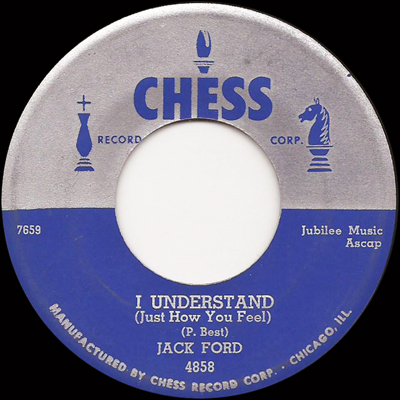
First out of gate was Chess 4858 by Jack Ford. The most obscure artist to record for this series—we are indebted to Dominique Anglares at the Jim Reeves Fan Club site (http://jimreevesfanclub.com/jack_ford.htm) for giving us some background on him—Ford seems to have been a little older than the other performers. We don't know when or where he was born, but in the late 1940s he was working with Tex Ritter. In 1948 and 1949 he was the rhythm guitarist for Curley Williams' Georgia Peach Pickers, making a single with them for Columbia. He also worked with the Sunshine Boys and Hank Williams.
In 1950, Ford joined the Shreveport Police Department. The day job prevented him from becoming a regular on the Hayride, which he'd started on in 1948, till late 1953 (most of this information was already in a capsule bio of "the singing cop" that ran in Cash Box on November 20, 1954). In April 1954, Ford also appeared on a local TV show in Shreveport and he was on the October 16, 1954 Hayride broadcast where Elvis Presley made his first appearance.
We don't know the complete personnel on Chess 4858, but Floyd Cramer, a regular at sessions done at KWKH, was at the piano. The 78s carry the new blue on pink label. Chess was expecting a lot from the record, buying a big display ad in Cash Box (July 3, 1954, p. 74) and a smaller one a week later (July 10, p. 26). Cash Box reviewed it on July 17 (p. 36). Chess 4858 did not evolve into a hit; supposedly in the first 6 months it sold 1600 copies.
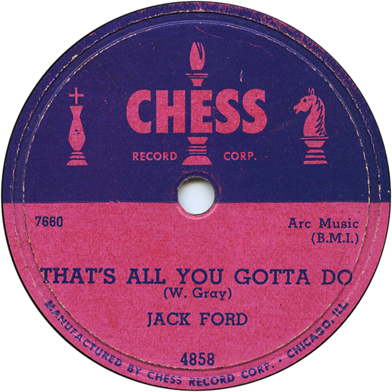
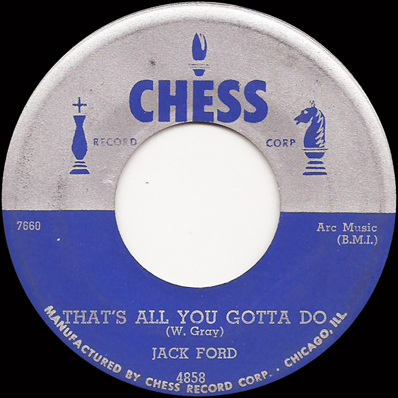
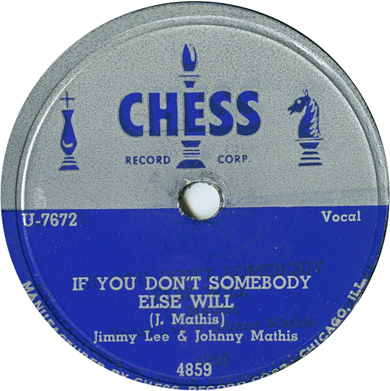
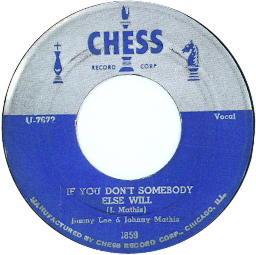
In August, the company followed with Chess 4859 by Jimmy Lee and Johnny Mathis. It got a display ad in Cash Box on August 28 (p. 27). Jimmy Lee Fautheree from Maud, Texas (1934-2004) and Johnny "Country" Mathis from Smackover, Arkansas (1930-2011) started working together on a certain radio show in 1951, and were duly billed in Chess's advertising as "Stars of the Louisiana Hayride." Previously Jimmy Lee had been under contract to Capitol for three years, recording regularly but failing to score a hit.
Some of the 78 labels for 4859 were blue on pink; other were printed in the silver on blue that the company had occasionally used for Chess 78s in the past, including the Guy Blakeman 1525. The 45 labels brought Record and Corp together above the center hole, aligning them with the labels to Chess 1578 in the company's main series. Chess 4859 had an entirely different fate from 4858; it reportedly hit #4 on the Country charts. It garnered a review in Cash Box on August 28, 1954 (p. 26), with an ad running in the same issue (p. 27) and again on September 4 (p. 31). Billboard reviewed Chess 4859 on September 4, 1954 (p. 33) and gave it a "Best Buy" push on September 18 (p. 36). The company advertised it in Billboard on September 25, 1954 (p. 58). On November 20, 1954, Chess took out an ad in Cash Box (p. 65) thanking Country DJs for promoting the record.
Mathis, however, left the duo before the end of 1954. Jimmy Lee then worked with Wayne Walker for less than 4 months, making one of the last two singles in the 4858 series. Then Jimmy and Johnny had a slight return, with Jimmy's brother, Lynn Fautheree, now billed as "Johnny." That version of the group recorded for Decca in 1956 and 1957, and for D Records in 1959. The real Johnny (Mathis) then returned to the duo, which continued through 1961, recording for Republic. Mathis scored his last hit in 1963, but continued to write songs for many years thereafter (he ended up being credited with 500).
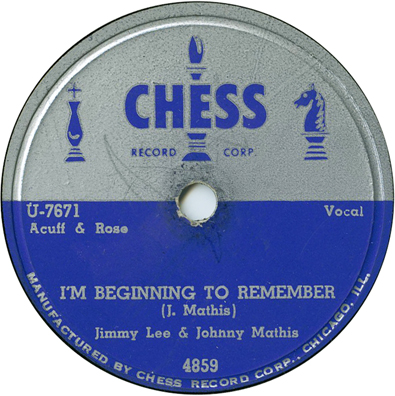
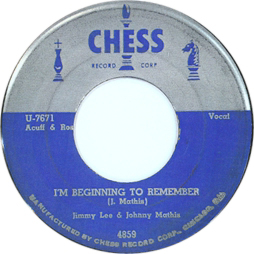
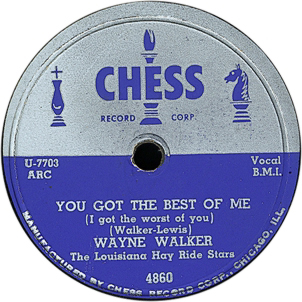
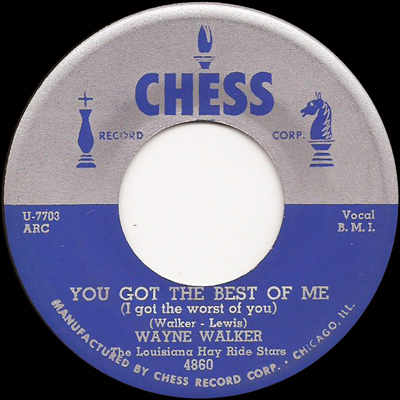
A second batch of releases arrived in October 1954. Wayne Walker and the Louisiana Hay Ride Stars got Chess 4860. Wayne Paul Walker was born in 1925 in Quapaw, Oklahoma, was raised in Kilgore, Texas, then moved to Shreveport, where he worked a series of day jobs before landing on the Hayride show in 1953. Chess 4860 was his first appearance on record. For more on Wayne Walker see the thorough research at http://www.rockabilly.nl/references/messages/wayne_walker.htm.
As with 4859, 78s of 4860 are known with both blue on pink and with silver on blue. By this time, the company was starting to experiment with special labels for DJ copies (though most DJ special 78s that we have seen from 1954 and 1955 just carried the regular labels with extra notation overprinted in red). The promotional 78s for Chess 4860 used a black on white label.
4860 seems to have done OK; as late as March 12, 1955, the company was advertising it in Cash Box (p. 32, "Going Good").
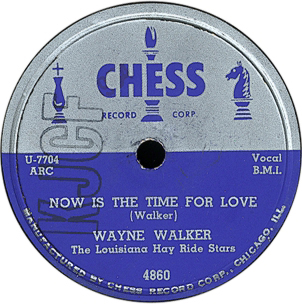
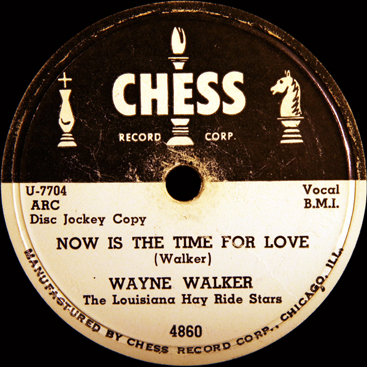
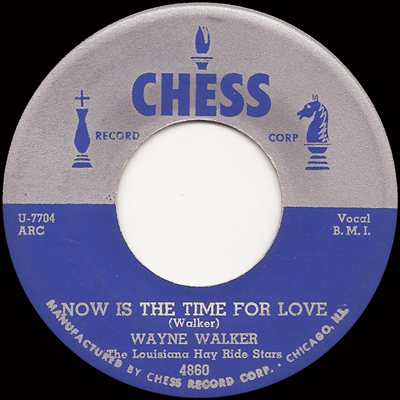
Chess 4861 was by Carolyn Bradshaw. She was 17 when she made it, and it wasn't her debut; in fact, it would be her last. She had three singles already out on Abbott. Abbott, a Los Angeles-based Country and Western label run by Fabor Robison, recruited country artists associated with the Lousiana Hayride, and recorded most of them in Shreveport.
Carolyn Bradshaw was born in 1937, on a farm near Camden, Arkansas; she had five brothers and two sisters. She heard music in church and on Grand Ole Opry broadcasts. At some point, her family moved to the northeastern corner of Texas. A family photo from 1951 was taken in Mineola, Texas (see the photo exhibits for her oral history from the R. W. Norton Art Gallery in Shreveport, at http://www.oralhistory.ws/tpl/index3.php?view=images&subview=captions&client=5235&free=22&total=24). At age 15, she sang in public for the first time at a club in Longview, Texas. Bradshaw began performing one-nighters in East Texas, Arkansas, and Louisiana, and soon landed a spot on the Louisiana Hayride, probably arriving during Hank Williams' last stay there, which started in August 1952.
Bradshaw's sides for Abbott were taped at KWKH. At a session in the summer of 1953, she made Abbott 141, which was released in July. "The Marriage of Mexican Joe" b/w "Baby, Then You're Catchin' on" was "a very successful record for several weeks in Texas" ("This Week's Best Buys," Billboard, September 5, 1953, p. 28). Abbott followed up with a four-tune session in October 1953, again at KWKH. Abbott 151 was released around December 1953, and Abbott 153 followed in February 1954 (Billboard, February 6, 1954, p. 28)
Her best-selling record was her first. She never received any royalties from it (see the biographical sketch at http://ohp.rwnaf.org/tpl/index3.php?view=profile&client=5235&step=Null). After three singles and still no money out of Abbott, Bradshaw figured it was time to change labels, and Leonard Chess and Stan Lewis were looking for Hayriders to sign.
For Chess, she recorded at KWKH once again, around September 1954. Apparently there were just two sides this time, released on Chess 4861 in October. The first pressing of the Chess 78 misspelled one of the titles as "This Is the Knight"; the copies we have seen with the errant spelling have the blue on pink label. It was corrected on the second pressing, with silver on blue labels. The 45 rpm labels were all correctly spelled.
Around the time Chess 4861 was released, Carolyn Bradshaw met a newcomer to the Hayride, Elvis Presley; they dated for three months, but after he left the Hayride (most likely, when he went on tour with Hank Snow in February 1955) she never saw him again. Carolyn Bradshaw dropped out of Cash Box's Hayride coverage after March 1955. She stopped getting newspaper mentions after a performance in Shreveport on April 27, 1955, when she appeared at the Holiday in Dixie street dance with Hayriders Johnny Horton and Jack Ford ("Street Dance Will Lauch '55 Festival," Shreveport Times, April 26, 1955, p. 11-A). The only item we've found from 1956 mentioned a fund-raiser for the National Guard on May 11, 1956 in Marshall, Texas with "Miss Carolyn Bradshaw" among the performers ("Guard Sponsors Variety Show," Marshall News Messenger, April 19, 1956, p. C3).
All three of her recording sessions took place in Shreveport, where she was living in 1953-1954. Although she traveled to California on one occasion while she was signed to Abbott and Fabor Robison was her personal manager, we don't know whether she performed there. We haven't found evidence of any long excursions with groups from the Hayride. However, on the strength of her new Chess single, she returned to California for a few weeks to appear on Cliffie Stone's TV show (Cash Box, October 30, 1954, p. 31).
After her two sides for Chess, from which we doubt she saw any money either, Carolyn Bradshaw never recorded again (her complete discography, by Praguefrank and Thieu van de Vorst, is available at http://countrydiscoghraphy2.blogspot.com/2016/11/carolyn-bradshaw.html. In a while, she moved to Houston, Texas, and worked in several law firms there, including Fulbright and Jaworski. In 1967, she married John H. Shanahan, Jr., in Houston. They had three children, six grandchildren, and (as of 2013), three great-grandchildren. In later years she moved to Virginia. For a while, Carolyn Bradshaw-Shanahan was sought for interviews because she was at the Hayride while Hank Williams, Johnny Horton, and Elvis Presley were performing there. Apparently, though, while making the music she didn't think there was anything unusual about it. Now in her 80s and no longer giving interviews, she is one of the few Chess artists from this period still living.
Chess 4862 was, once again, by Jimmy Lee and Johnny Mathis. It was reviewed in Cash Box on February 12, 1955 (p. 40). The company was hoping for some more chart action, but didn't get any this time.
Although most the Chess 4858 series releases were exclusives, "If You Don't, Somebody Else Will" also appeared as the A side of Feature 1092 (Feature was a Louisiana-based label that recorded mostly Country and Cajun music). Meanwhile, the B side was reportedly "Now Is the Time for Love." A different performance from the one on Chess 4859? We wouldn't bank on it.
On February 26, 1955 Cash Box (p. 37) reported that Stan Lewis and Leonard Chess had been to Nashville to talk to Ernie Young of Nashboro/Excello. Were they looking to unload some masters? Apparently nothing else in the series enjoyed nearly the success of Chess 4859.
The Chess brothers and Stan Lewis pulled the plug on the 4858 series after a year. In all, 7 releases saw the light of day: 4 in 1954, one in January 1955, the last two following in late March of 1955. One wonders how much of the sales shortage was attributable to the material, and how much had to do with the Chess brothers' lack of experience with Country radio. In and around Shreveport, Stan Lewis could take care of the radio side of things; in other markets…
We thought the plug was pulled in April 1955, but it turns out Stan Lewis was still promoting the last two releases into July. He further declared that Jimmy Lee and Johnny Matthis were going to get a "forthcoming" release (Cash Box, July 2, 1955, p. 84). Cash Box (July 9, p. 30) ran a photo of the duo, supposedly taken at their latest session in Nashville. And maybe there was one—it just didn't lead to anything appearing on Chess. On July 16, Cash Box (p. 31) had Stan Lewis anticipating the new Jimmy Lee and Johnny Mathis single imminently. It never happened.
Lewis was also telling Cash Box he had another new record, by one Cherokee Joe Bennett, that was going to be out on Chess. We know nothing of the performer, except that he was being given a tryout by the Louisiana Hayride (Cash Box, June 18, 1955, p. 43). The two titles he was said to have cut ("Pretty Face," "Smokin' and Drinkin'") were remarkably generic. There was another mention of his "current waxing" in Cash Box for June 25 (p. 29). Then, "Leonard is also excited about a newcomer to his Country music roster" (Cash Box, July 2, 1955, p. 84). On July 9, Lewis was actually cited as saying the single had "just hit the market" and sales were favorable (Cash Box, p. 33). Anyone ever seen hide or hair of this record? It looks to us like Lewis was angling persistently for a Chess 4865 and in the end Leonard Chess decided not to release one. While an errant release announcement occasionally crept into the trades, the four-week push given to "Pretty" b/w "Smokin'" has to count as an outlier.
| Matrix | Artist | Title | Release Number | Recording Date | Release Date |
| 4409 [J-V-B] |
Big Ed and His Combo | Superstition | Checker 790 | November or December 1953 [Detroit] |
January 1954 |
| 4410 [J-V-B] |
Big Ed and His Combo | Biscuit Baking Mama | Checker 790 | November or December 1953 [Detroit] |
January 1954 |
| 1-294 (45-1-294) [Note 1000] |
Larry Ligett [sic] | Perdido Mambo | Chess 1558 | late 1953 [Indianapolis?] |
December 1953 |
| 2-294 (45-2-294) [Note 1000] |
Larry Ligett | The Flop | Chess 1558 | late 1953 [Indianapolis?] |
December 1953 |
| U500 [unknown source] |
Chesterfields | All Messed Up | Chess 1559 [78 rpm only] |
prob. 1953 | January 1954 |
| U501 [unknown source] |
Chesterfields | I'm in Heaven | Chess 1559 [78 rpm only] |
prob. 1953 | January 1954 |
| U7597 (9597 on label!) [Fortune] |
John Lee Hooker | It's My Own Fault | Chess 1562 | 1952 or 1953 [Detroit] |
March 1954 |
| ? [Fortune] |
John Lee Hooker | Blues for Big Town | (Fortune LP 3002) | 1952 or 1953 [Detroit] |
|
| U7598 [Fortune] |
John Lee Hooker | Women and Money | Chess 1562 | 1952 or 1953 [Detroit] | March 1954 |
| U-7614 [J-V-B] |
Bobo Jenkins | Democrat Blues | Chess 1565 | 1954 [Detroit] |
April 1954 |
| U-7615 [J-V-B] |
Bobo Jenkins | Bad Luck & Trouble | Chess 1565 | 1954 [Detroit] |
April 1954 |
| U-7626 [SU 2141] |
Al Hibbler and Orchestra | Poor Butterfly | Chess 1569 [Sunrise 503] |
1948 | May 1954 |
| U-7627 [EB1001] |
Al Hibbler and Orchestra | Fat and Forty | Chess 1569 [Sunrise 2001] |
early 1947 [New York City] |
May 1954 |
| U7628 [Note] |
Larry Liggett | Woodside's Mambo | Chess 1570 | 1954 [Indianapolis?] |
prob. May 1954 |
| U7629 [Note] |
Larry Liggett | Junior's Mambo | Chess 1570 | 1954 [Indianapolis?] |
prob. May 1954 |
| 7649? [Al Benson] |
The Swans | I Love You So | (Parrot 801 [boot]) | mid-1954 | |
| 7650? [Al Benson] |
The Swans | Will You Be Mine | (Parrot 801 [boot]) | mid-1954 | |
| 7659 [Stan Lewis] |
Jack Ford | I Understand (Just How You Feel) | Chess 4858 | 1954 [Shreveport] | June 1954 |
| 7660 [Stan Lewis] |
Jack Ford | That's All You Gotta Do | Chess 4858 | 1954 [Shreveport] | June 1954 |
| U-7671 [Stan Lewis] |
Jimmy Lee & Johnny Mathis | I'm Beginning to Remember | Chess 4859 | 1954 [Shreveport] | August 1954 |
| U-7672 [Stan Lewis] |
Jimmy Lee & Johnny Mathis | If You Don't Somebody Else Will | Chess 4859 | 1954 [Shreveport] | August 1954 |
| 7675 [unknown source] |
The Peppers with Dave Hamilton | Rocking Chair Baby | Chess 1577 | 1954 [Detroit] |
September 1954 |
| 7676 [unknown source] |
The Peppers with Dave Hamilton | Hold On | Chess 1577 | 1954 [Detroit] |
September 1954 |
| 7681 [Note] |
Larry Liggett | That Man Is Walking | Chess 1578 | 1954 [Indianapolis] |
October 1954 |
| 7682 [Note] |
Larry Liggett | Ma Ma Yoquiero Mambo [sic] | Chess 1578 | 1954 [Indianapolis] |
October 1954 |
| U-4413 [Note] |
The Teasers | I Was a Fool to Let You Go | Checker 800 | August 11, 1954 [Indianapolis] |
September 1954 |
| U-4414 [Note] |
The Teasers | How Could You Hurt Me So | Checker 800 | August 11, 1954 [Indianapolis] |
September 1954 |
| 7688 [source unknown] |
unidentified male gospel quartet | No Title Selection 4 | 1954 | ||
| 7689 [source unknown] |
Felix Gross and his Orchestra | I Was Wrong | unissued | September 29, 1952 [Dallas?] |
|
| 7690 [source unknown] |
Felix Gross and his Orchestra | Good Rockin' Mama | unissued | September 29, 1952 [Dallas?] |
|
| 7691 [source unknown] |
Felix Gross and his Orchestra | Reapin' Blues | unissued | September 29, 1952 [Dallas?] |
|
| 7692 [source unknown] |
Felix Gross and his Orchestra | untitled instrumental | unissued | September 29, 1952 [Dallas?] |
|
| 7693 [Paul Gayten] |
Paul Gayten | I'm Tired | Checker 801 | August 26, 1954 [New Orleans] |
October 1954 |
| 7694 [Paul Gayten] |
Paul Gayten | Get It | Checker 801 | August 26, 1954 [New Orleans] |
October 1954 |
| 7695? [Paul Gayten] |
Paul Gayten | Down Boy | (Chess CH9294, Chess CHD9294) | August 26, 1954 [New Orleans] |
|
| 7696 | |||||
| U-7703 [Stan Lewis] |
Wayne Walker | The Louisiana Hay Ride Stars | You Got the Best of Me (I Got the Worst of You) | Chess 4860 | 1954 [Shreveport] |
October 1954 |
| U-7704 [Stan Lewis] |
Wayne Walker | The Louisiana Hay Ride Stars | Now Is the Time for Love | Chess 4860 | 1954 [Shreveport] |
October 1954 |
| U-7705 [Stan Lewis] |
Carolyn Bradshaw | Oh! I Like It | Chess 4861 | c. September 1954 [Shreveport] |
October 1954 |
| U-7706 [Stan Lewis] |
Carolyn Bradshaw | This Is the Knight [sic, on the first pressing of the 78] This Is the Night [on 45] |
Chess 4861 | c. September 1954 [Shreveport] |
October 1954 |
| 7713 [Stan Lewis] |
Jimmy Lee & Johnny Mathis | Can't You—Want [sic] You? | Chess 4862 | 1954 [Shreveport] |
January 1955 |
| 7714 [Stan Lewis] |
Jimmy Lee & Johnny Mathis | The Fun Is Over | Chess 4862 | 1954 [Shreveport] |
January 1955 |
| 7715 | The Southern Stars | I Met My Mother | unissued [Tip Top 201] |
1954 [Richmond, VA] |
|
| 7716 | The Southern Stars | When Life Is Done | unissued [Tip Top 201] |
1954 [Richmond, VA] |
In 1955 the Chess brothers were well enough heeled to pay for 201 studio tracks of their own. Most were still being done in Chicago at old reliable Universal Recording, but we know of at least one session (by Lowell Fulson in August) that was recorded specially for Chess in Los Angeles.
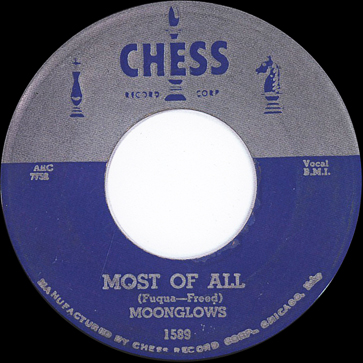
The Moonglows had scarcely gotten their first two releases out when the company whisked them back into Universal Recording for the company's first session of the new year. (We once dated this session to December 1954, but according to vocal group expert Ferdie Gonzalez, it was done in January 1955).
Chess 1589, a February release, was reviewed in Cash Box on March 12, 1955 (p. 29). The same issue carried a big joint ad (p. 25) for Chess 1589 and Checker 813, with smaller-print references to Chess 1588, Checker 811, and Checker 812. A joint ad for Chess 1589 and Checker 812 ("Climbing Fast") ran on March 19 (p. 29). As Bo Diddley's Checker 814 hit the shelves, the company was still promoting Chess 1589 (along with Chess 1592, Checker 811, and 812, April 2, 1955, p. 65). "Most of All" was climbing fast. It reached #5 on the Billboard R and B chart in the spring of 1955, sticking around for 11 weeks all told. The studio band on this occasion included guitarist Wayne Bennett, who was working in the house band at the Crown Propeller Lounge. Bennett would tour with the Moonglows in December 1955, but he subsequently returned to Texas, where he would become famous for his work with singer Bobby "Blue" Bland.
The session yielded a second single ("New Gal" b/w "Hug and a Kiss") credited to Bobby Lester and the Moonlighters. Checker 813 was also released in February and featured in a joint ad with Chess 1589 (the review of Checker 813 ran in Cash Box on March 19, 1955, p. 28) but it went nowhere at the cash register. The remainder of the 6-tune session was left in the can.
Two tracks that we used to think came from the end of this sesion (U7758 and 7759) are, according to Gonzalez, not by the Moonglows at all. Instead, they are the work of the Five Thrills, a vocal group that had previously made two sessions for Al Benson at Parrot. The titles as recorded in the Chess master book suspiciously resemble two titles—"LaVerne" and "Darlene (Girl of My Dreams)"—thought to have been done for Parrot in March 1954, with a combo led by Paul Bascomb. Al Benson struck some kind of deal with the Chess brothers in the early months of 1955, as we will see below. And the Five Thrills may have already broken up by this time. More research could help, but from what we have learned we are not treating these as new recordings for Chess, or as new recordings at all.

On January 13, Chess took advantage of Lowell Fulson's presence in Chicago to arrange a session for him—the guitar-playing bluesman's second for the label. The complete lineup is not known, but Earl Brown was on alto sax, Otis Spann at the piano, Willie Dixon on bass, and probably Fred Below on drums, along with tenor and baritone saxes. Fulson is said not to have liked the accompaniment he got in Chicago—his dislikes were fully on display at the 1957 session that produced "Tollin' Bells"—but whatever was bothering him is not apparent to the listener.
In fact, all four sides from the January 13 session were released. Checker 812, "Loving You" b/w "Check Yourself, " was released in February, first advertised on March 5, 1955 (Cash Box, p. 27), and reviewed in Cash Box on March 12, 1955 (p. 28). One more ad followed on April 2 (p. 65).
Checker 820, "Lonely Hours" b/w "Do Me Right," was out in July. It was advertised in Cash Box on July 9, 1955 (p. 26). Cash Box reviewed it on July 16, 1955, p. 26; the company advertised it again on July 23 (p. 41); a solo ad in the same magazine on July 30, p. 19; lastly it was given a joint push with Checker 821 and 822 (August 27, p. 24).

On January 19, or so we are told, Jackie Brenston cut one track, which from its title looks like another remake of "Rocket 88." It was entered belatedly into the master book, then the Chess brothers forgot all about it.

After his sojourn at Parrot, bluesman John Brim returned to Chess in January 1955. On this occasion, he recorded with his working group, instead of Little Walter or Muddy Waters' band. More important, he actually saw his sides released. Brim's band, the real Gary Kings this time, consisted of James Dalton (harmonica), W. C. Dalton (guitar), and Grace Brim (drums).
Chess 1588 was released in February 1955, garnering its first ad in Cash Box on March 5 (p. 32), along with Checker 811 and 812. Cash Box reviewed it on March 19 (p. 29). It must have sold something, because John Brim would record once more for Chess, in April 1956.


Next up, probably on January 25, was the Reverend Robert Ballinger, an exponent of sanctified gospel singing in the manner of the Reverend Utah Smith. During this portion of his career, he was serving in Chicago as an assistant to Bishop J. E Watley, Sr., of the Church of God in Christ. In December 1952, Ballinger laid down seven tunes for United, but Leonard Allen never released any of his sides. Ballinger played piano, and the omnipresent Willie Dixon played bass on the session.
Chess 1590 coupled "This Train" with "How I Got Over." Apparently it was released in February, not too long after Checker 811, and it was reviewed in Cash Box on March 12, 1955 (p. 29). Chess 1590 must have done something, because it was the first Chess or Checker gospel release to appear on a 45.
But the Reverend Ballinger's second outing for Chess, possibly in June, produced two sides that the company didn't use. Ballinger eventually moved to the Peacock label, where he had several gospel hits in the early 1960s. He died in 1965.

Studio activity continued on the 25th with a doowop session, on which the Fortunes and the Clouds were responsible for two sides each. These have caused all manner of discographical confusion, as none of these sides were released at the time—and when they did eventually appear it was either on bootlegs, or on Parrot reissues. The Fortunes consisted of Donald Jenkins (lead), Ronnie Strong (tenor), Walter Granger (baritone), and William Taylor (bass). The members of the group were just 12 or 13 years old at the time, but Ronnie Strong, a former member of the Hambone Kids, was already a veteran. The Clouds were led by Sherrard Jones; the group's remaining members have not been identified, although Albert Hunter was probably there when the Chess/Parrot session took place. The groups had been finalists in a talent contest put on by disk jockey McKie Fitzhugh at the Pershing Ballroom; the prize was a recording session, and a joint venture between Al Benson and Leonard Chess was involved.
Nothing is known about the ensemble that backed the groups (tenor and baritone saxes, piano/celeste, guitar, bass, and drums) except that it was led by Willie Dixon (note the accompaniment on "Bread"). The tenor saxophonist sounds like Harold Ousley or Von Freeman, but there is nothing else to go on. (It doesn't help that the master tapes were stolen from the Chess vaults in the early 1970s.)
On February 12, 1955, Cash Box (p. 33) mentioned Fitzhugh's contest, the groups, and their recent session for Chess. It correctly identified the two titles by the Fortunes and credited the Clouds with "an original written by the group" called "Thinking about You." Singles on both groups "should be released any minute now." But they weren't. The first release of "Baby Wants to Rock," by the Clouds, was on Broadcast 1002, a 45-rpm single put out by a company that specialized in doowop bogosities; the flip was another unissued Chess doowop side, by The Larks from 1959. The other sides appeared on bootleg Parrots. The Fortunes would stay with Chess, making two further sessions in March and May; the Clouds, enjoying the sponsorship of DJ McKie Fitzhugh, would record for Cobra in 1956 and remained on the scene into 1957.
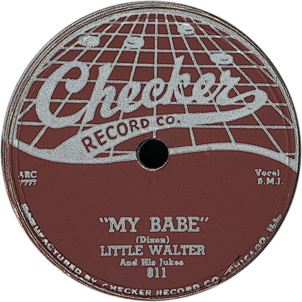
On release, the second version of "My Babe" became Little Walter's biggest hit. "Thunder Bird" provided a high quality instrumental B side for the single. Leonard and Phil Chess knew they had something and Checker 811 was being advertised in Cash Box 3 weeks after the session (February 19, 1955, pp. 23, 27). Cash Box gave the record an "Award o' the Week" on March 5 (p. 28), predicting that it could be Walter's "biggest yet"; the single was advertised in the same issue (p. 27). Further Cash Box ads followed on April 2 (p. 65, promoting Checker 811 alongside the newly released Checker 814 by Bo Diddley).
A gratuitous reissue of "My Babe" would take place five years later, on Checker 955, with a female chorus layered onto the original recording; despite the terrible taste—or was that because of it?—it sold moderately well to pop record buyers. Cash Box actually gave the dubbed-over "My Babe" a favorable review (June 18, 1960, p. 14).
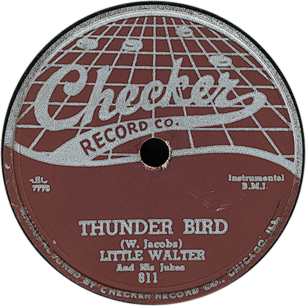
A little later, Willie Mabon recorded one side. We don't know why "Wow I Feel So Good," with its mambo rhythm, was the only number recorded that day. The number was deemed suitable for Mabon's next release. (Was the aim just to record one side to complement "Come on Baby," which the Chess brothers already wanted to release from his previous session?) Mabon was accompanied by his usual rhythm section of Bill Anderson, bass, and Oliver Coleman, drums. There is long solo for a tenor saxophonist, probably Herbert Robinson. The trumpet player and what sounds like a second tenor saxophonist get nothing but a couple of riffs to play; Paul King is the likely suspect for the trumpeter, but for the second tenor we have nothing to go on.
Chess 1592 was released in March 1955. It got a solo ad in Cash Box on March 26, 1955 (p. 27), then was advertised again on April 2, p. 65, along with Chess 1589, and Checker 811, 812, and 814. Cash Box also reviewed it on April 2, 1955 (p. 25).

February 3 was divided between two long sessions, one featuring Muddy Waters' band, and the other featuring Howlin' Wolf's. Waters recorded 4 sides with Little Walter (harmonica), Jimmy Rogers (guitar), Otis Spann (piano), Willie Dixon (bass), and Francis Clay (drums). "I Want to Be Loved" and "My Eyes (Keep Me in Trouble)," both expounding familiar themes, were promptly released on Chess 1596, which was advertised in Cash Box on April 30, 1955 (p. 27), again on May 7 (p. 25), and reviewed on May 14 (p. 24).
"Young Fashion Ways" (that's how it was rendered, on both the 78 and the 45) came out on Muddy's next single, Chess 1602. "This Pain," a ponderous slow blues, was held back, way back, showing up many years later on a Japanese LP.
Chess 1602 coupled "Young Fashion" with "Mannish Boy." It was in a company ad in Cash Box for July 2, 1955 (p. 59). It was advertised in Cash Box on July 9, 1955 (p. 26), along with a new release by Lowell Fulson on Checker 820, and a blast from the past: Checker 762 by Joe Williams. That same week the single landed an "Award o' the Week" review (p. 28). Chess 1602 appeared in another company ad on July 23 (p. 41) and bobbed back up in company ads on September 17 (p. 27), September 24 (p. 29), October 1 (p. 32), and October 8, 1955 (p. 23).
After Muddy had finished his numbers, the rest of the band stuck around for a first try at a Jimmy Rogers vehicle, "You're the One." The company was not satisfied with the number, choosing a remake at a later session. To today's ears, it is an excellent performance featuring a powerful harmonica solo by Little Walter, but Rogers' vocal moves along a little briskly.

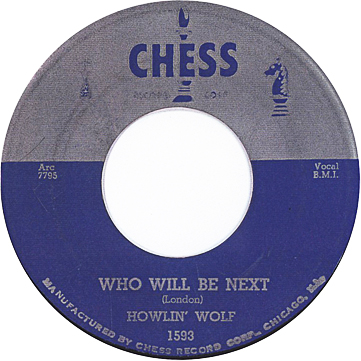
With backing from Jody Williams and Hubert Sumlin (guitars), Henry Gray (piano), Willie Dixon (bass), and Earl Phillips (drums), the Wolf turned in four strong performances, which made up his next two releases on Chess. By this point, Howlin' Wolf was finally no longer being referred to in New York Times style.
Chess 1593, "Who Will Be Next" b/w "I Have a Little Girl," got its review in Cash Box on May 7, 1955 (p. 24). The company also ran an ad on May 7 (p. 25).
Chess 1607, "Come to Me Baby" plus "Don't Mess with My Baby," was advertised in Cash Box on October 15, 1955 (p. 32), as the newest addition to the company's recent blues releases: Chess 1602, 1605, and 1606, along with Checker 822, 824, and 825. 1607 was included in another company ad on October 22 (p. 28). It was reviewed in Cash Box on October 29 (p. 30). Ads followed on November 5 (p. 29) and November 12 (p. 31).
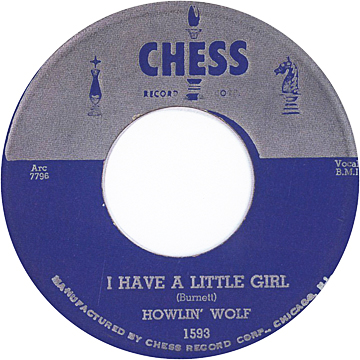
Chess was now fully prepared for the rock and roll revolution. The first offensive was launched by Bo Diddley. Ellas McDaniel was born Otha Elias Bates in McComb, Mississippi, on December 30, 1928. He was raised by one of his mother's cousins, who moved to Chicago in 1948. McDaniel had been leading a street corner band for several years; once in a while they would land a gig in the clubs. We learn from the Board meeting minutes of Musicians Local 208 that he had been playing a gig at the 708 Club (708 East 47th Street) when he was fined $50.00 on April 17, 1952 for accepting less than Union scale. McDaniel was promptly "erased" for nonpayment. Apparently not getting a whole lot of other offers from Union establishments in Chicago, he did not apply for reinstatement until October 7, 1954, when the Local allowed him to return to the membership rolls for $12.61, giving him 6 weeks to pay the fine.
It was early in 1955 when McDaniel recorded some demos and made the rounds of the independent record companies in Chicago. United wasn't interested enough in the band to offer to pay them for recording. A visit to Vee-Jay brought a brush-off from a secretary, in one version of the story, and an emphatic rejection from Ewart Abner, in another. Leonard Chess, however, heard something new. Chess pressed McDaniel to come up with lyrics to a hambone number, previously called "Uncle John" or "Hey Noxema," that could be played on the radio. Supposedly the words took a week to retool. The tune ended up being titled "Bo Diddley." Whether the leader had gone by that name before or not, it was firmly attached to him by the time he completed the session on March 2, 1955.
On the eponymous tune, the band consisted of Bo Diddley (vocals and guitar), Jerome Green (maracas), and Clifton James (drums). Bo's 19-year-old harmonica player, Billy Boy Arnold, joined the band on the other tracks, along with Otis Spann (piano) and Willie Dixon (bass).
After the four Bo Diddley numbers were finished, Chess gave Billy Boy Arnold an opportunity to sing on three tunes. One was rejected outright. The other two were left in the can after Billy Boy signed a contract with Vee-Jay a couple of months later.
The company rushed out Checker 814, a coupling of "Bo Diddley" and the blues "I'm a Man," before the month was over. It was advertised as a new release in Cash Box on April 2, 1955 (p. 65), reviewed on April 9 (p. 28), said to be "Climbing" in an ad on April 9 (p. 29), advertised again on April 16 (p. 29). The record was a massive hit. Another ad for it ran in Cash Box on May 7, 1955 (p. 25)
Bo Diddley's music looked like a straightforward outgrowth of the Chicago blues scene—Muddy Waters hurried to make an answer record to "I'm a Man," and Little Walter was eager to collaborate with the band. But in short order rock and roll would be outcompeting the blues for the affections of the record buying public, and Bo Diddley would be seen as a rock and roller. Meanwhile, Diddley's decision to seek reinstatement with the Musicians Union paid off when Elas [sic] McDaniel posted an indefinite contract with the New Hollywood Show Lounge on April 21, 1955.
For some reason not presently known to us, the company did a straight reissue of Checker 814 six years later. Chess and Checker got involved in reissuing singles later in the 1960s (a few of these were 45s of titles that had only been on 78s, and once in a while, as we've noted, a "reissue" was of a master not previously used). But when Checker 997 showed up, in November 1961, it was a singularity.
March 1955 was not reserved for Bo Diddley; it turned out to be a busy month in the studio.
An Eddie Boyd group cut two sides. "Real Good Feeling" was the A side to Chess 1595, released in April; the other was never issued and may have been lost. Chess 1595 was advertised in Cash Box on April 9, 1955 (p. 29). The trade reviewed it on April 16 (p. 29).
Danny Overbea, whose popularity was now on the wane, came in for four, and the company ended up using one. "Do You Love Me" showed up on Checker 816. The release, which probably came out in May 1955, was never mentioned in Cash Box.

The Flamingos (Nate Nelson, lead; Johnny Carter, tenor and falsetto; Zeke Carey, second tenor; Paul Wilson, baritone; and Jake Carey, bass) were already an established doowop group when they signed with Checker. They had begun recording for Chance in 1953. In the middle of 1954, as Chance was beginning to falter, their manager, Ralph Leon, signed the group to Parrot, but after two sessions for Al Benson failed to produce a hit, Leon began negotiations with the Chess brothers. Leon died before the deal was finalized, but in March 1955, probably on the expiration of their Parrot contract, the group was ready to record for Checker. Reportedly at least the version of "When" that appeared on Checker 815 was cut in the back office, and released in preference to a version done at Universal. If it was cut on the premises, the sonics had improved since Muddy Waters laid down "Ooh Wee," because "When" sounds more than presentable and has great dynamics. The group was backed by an undocumented Willie Dixon-led ensemble consisting of tenor and baritone saxes, piano, bass, and drums.
Two of the sides from the session were paired on the group's first release, in April 1955. Checker 815 was advertised in Cash Box on April 23, 1955 (p. 25) and on April 30 (p. 27), with a review also appearing on April 30 (p. 27). There was another ad on May 7 (p. 25). Checker 815 did nothing special sales-wise.
The third side, "Need Your Love," was held till late December 1955, when it became the B side of the group's first hit for the label, "I'll Be Home." Checker 830 caught an Award o' the Week review in Cash Box on January 7, 1956 (p. 26). An ad with a photo of the group followed on January 14 (p. 34). On January 21, it was promoted alongside the first Bobby Charles single (p. 33); on February 4 (p. 27), February 11 (p. 38), and February 18 (p. 30), it was hypoed in tandem with Chuck Berry's Chess 1615. A final ad ran in Cash Box on March 10 (p. 31).

The Fortunes, who seem to have interested the Chess brothers more than the Clouds did, also returned to the studio in March, cutting two further sides as the company continued its search for releasable material. The Fortunes may have cut at the end of the Flamingos' session, but only the tenor sax can be heard on "My Baby Is Fine." "Baby" showed up on the group's only single, Checker 818, complete with a bogus composer credit to one Russ Fratto, who owned the stationery store next door to the Chess headquarters. Checker 818 was released the last week of May 1955 (Cash Box, June 4, 1955, p. 23). The record was reviewed in Cash Box on June 18, 1955 (p. 37). The company was not inclined to give the record a significant push.
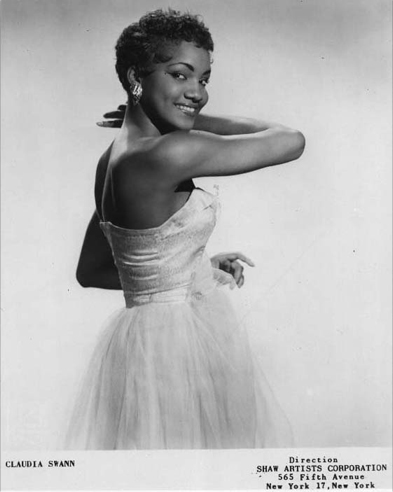
Then on March 22, Buddy and Claudia Griffin, now a married couple, returned to Chess for a second session. Besides Buddy's vocals and piano and Claudia's vocals, the group included "Silly Willie" Wilson on trombone, Chuck Reeves on alto and baritone saxes, Earl Swanson on tenor sax, Lawrence Burgan, bass, and Courtney Brooks, drums. Two of the five sides came out on Chess 1597, which was advertised in Cash Box on May 21, 1955 (p. 25) and reviewed in the same issue (p. 24). It turned out to be the group's last release.
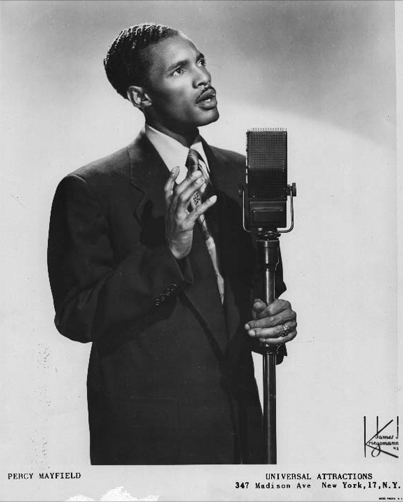
On April 12, basso blues singer Percy Mayfield made his debut for Chess, cutting four sides with Fred Clark on tenor sax, plus alto and baritone saxes, piano, bass, and drums. Mayfield was another veteran. Based on the West Coast, he had made his debut for Gru V Tone in 1946, picking up with Supreme in 1949, then settling in with Specialty from 1950 through 1954. His biggest hit, "Please Send Me Someone to Love," was done at his first session for Specialty.
Chess got one good-quality single out of the session. On May 14, 1955, Cash Box carried the announcement that Chess had signed Mayfield (p. 21). Supposedly the Chess brothers hadn't decided yet which label he would appear on. But they also supposedly hadn't recorded him yet. Whatever the decision process really was, they opted for Chess, and Chess 1599 was out in June (reviewed in Cash Box on July 2, 1955, p. 62). Both sides of Chess 1599 were credited, once again, to Russ Fratto, who does not seem to have harbored any aspirations as a songwriter. The Chess brothers must have owed him big...
Leonard and Phil retained enough interest in Mayfield to call him back for a follow-up in 1956. After that, however, he returned to recording for West Coast labels.

Little Walter. who was present during the rehearsals for Bo Diddley's first session, returned to the studio on April 28, 1955. Along with Luther Tucker, Wilie Dixon, and Fred Below, Bo Diddley was on hand to play on "I Hate to See You Go" (an obsessional boogie modeled after "You Don't Love Me" from his first session) and "Roller Coaster" (an instrumental that evolved out of another composition of his). On "I Got to Go," which bears down like a jubilant express train, Robert Jr. Lockwood took Bo's place. This session formed one of the peaks in Little Walter's output: "Roller Coaster" was a transcendental exercise in rhythmic displacement.
The superb instrumental and the equally brilliant "I Got to Go" were paired on Checker 817. The company had it out in a month, advertising it in Cash Box (along with Chess 1597 by Buddy and Claudia) on May 28, 1955 (p. 26). Cash Box gave it an Award o' the Week review in the June 4 issue (p. 26).
Before "Hate to See You Go" was released on Checker 825, it was edited down to just 2:17. In this case the decision to take off Walter's last two vocal choruses, hinting at reconciliation and dulling the sting, was the right one artistically. The editing and remastering were done on August 12, 1955, which sometimes led discographers to give the wrong recording date in the past. Checker 825 coupled "Hate to See You Go" with "Too Late," from Walter's great creative burst of July 1953. It was advertised with a bunch of other Chess and Checker releases in Cash Box on October 1, 1955 (p. 33). A feature review ran in the same issue (p. 34). The company ran another multiple-release ad on October 8, 1955 (p. 23). Checker 825 was pushed again on October 15 (p. 32), October 22 (p. 8), November 5 (p. 29), November 12 (p. 31), and November 19, 1955 (p. 35).

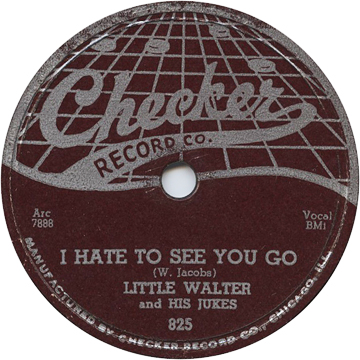
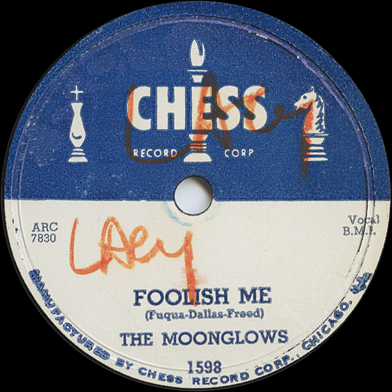
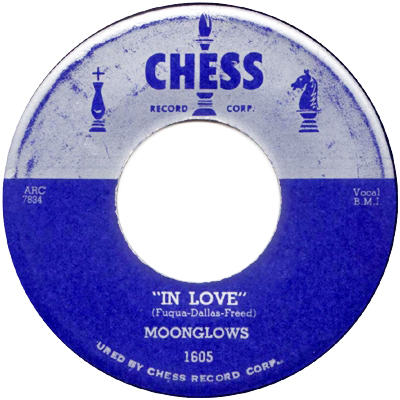
In May, the company's other major doowop act, the Moonglows, cut 6 tunes. Bobby Lester (lead and tenor), Harvey Fuqua (lead and baritone), Pete Graves (tenor), and Prentiss Barnes (baritone) laid down six sides with Eddie Chamblee (tenor saxophone), Sax Mallard (baritone sax), unidentified piano and guitar, Willie Dixon (bass), and Leon Hooper (drums). Chamblee solos on "Slow Down," while Mallard remains underemployed on this session (it's the only one we know he made on the baritone).
"Slow Down" and "Foolish Me" came out on Chess 1598 in June 1955. Chess 1598 was reviewed in Cash Box on June 11, 1955 (p. 32). It was advertised along with Bo Diddley's Checker 819 on June 18 (p. 37) and June 25 (Cash Box, p. 21).
"Starlite" and "In Love" showed up on Chess 1605 in August. Chess bought a solo ad for the single (Cash Box, September 3, 1955, p. 20), and put it in another company ad on September 10 (p. 27); it was favorably reviewed in the same issue ofCash Box (p. 28). Inclusion in company ads followed on September 17 (p. 27), September 24 (p. 29), October 1 (p. 32), October 8 (p. 23), October 15 (p. 32), and October 22 (p. 28),
Despite excellent performances, neither single showed up in the R&B charts. The other two sides waited nearly 40 years to see release.
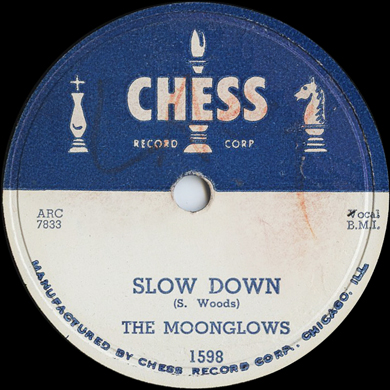

It appears that at the end of the Moonglows' session, the Fortunes cut one more side; Chamblee and Mallard can be heard on it, though they get no solos. The Chess brothers would couple it with one of the tracks from March—an odd choice because the group's work on the January session had been better. Again, Russ Fratto was the absentee co-composer of "Believe in Me." Checker 818 was released the last week of May 1955 (Cash Box, June 4, 1955, p. 23). It's doubtful that this release put many dollars in Mr. Fratto's pocket. The company would not be recording the Forutnes again.
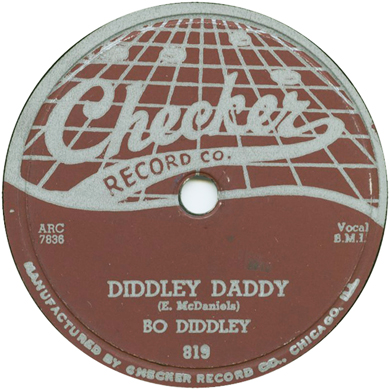
The Moonglows were also on hand for Bo Diddley's second session as a leader, on May 15. Matters became, mmm, complicated when Billy Boy Arnold informed Leonard Chess that he had signed with Vee-Jay and recorded "I Wish You Would" a few days earlier. Bo had been planning to record the same number. It was hastily reworked into "Diddley Daddy," with backing vocals by the Moonglows. Little Walter was responsible for the harmonica work on "Daddy," which otherwise employed Bo's regular band with Clifton James on drums and Jerome Green on maracas. Billy Boy made his farewell appearance with the band on "She's Fine, She's Mine," which also featured an added percussionist.
The results were promptly released on Checker 819. The single was afforded a solo ad in Cash Box on June 11, 1955 (p. 30) and doubled up with Chess 1598 by the Moonglows for June 18 (p. 37). A feature review appeared in the same issue (Cash Box, June 18, p. 36).
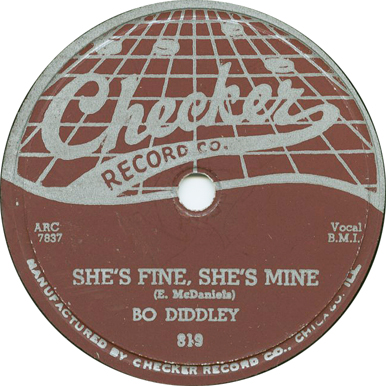
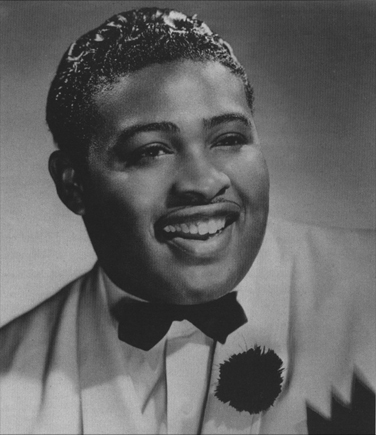
Next, the Chess brothers gave Stomp Gordon and his touring R&B unit a try. Archie A. Gordon was born in Columbus, Ohio, on February 10, 1926, where he was raised as the adopted son of Squire and Elizabeth Bagby. At age 13, he was already performing locally as a pianist. He was also already known as "Stomp," because of his attention-getting habit of taking off his shoes and socks and playing the bass line with his feet. By 1948 he was leading an R&amb;B combo, whose live appearances eventually became a big enough draw to interest the record companies. Gordon's working quartet cut two sessions for Decca in August 1952 and January 1953, but gate receipts never translated into record sales and the group's contract was not renewed. By 1952, Gordon was also landing high-profile club gigs in Chicago, as the Local 208 contract lists attest. In June and July 1953 two different editions of the Stomp Gordon combo recorded in Chicago for Mercury, producing a classic set of blues lyrics in "What's Her Whimsey, Dr. Kinsey?" But sales again failed to meet expectations and several tracks were left in the vault.
Whether Leonard Chess became aware of Stomp Gordon when the group previously recorded in town, or because he'd caught the act live, he decided to give Gordon a try in May 1955. Just two sides were laid down at Universal Recording. Gordon usually worked with tenor sax, guitar, bass, and drums; for the session, a trumpet and a second tenor sax were added. "The Grind" is a raucous dance number closely related to its contemporary rival, the Chicken; apparently the lyrics employed at the band's live shows were not suitable for radio play and were replaced on the record with wording deemed more innocuous. "Don't Do Me That Way" is a gimmicky blues. The ambience is loud and frantic, as Gordon seems determined to out-shout the band; much of his and their stage magic fails to come through.
Leonard and Phil didn't put a lot of publicity behind Stomp Gordon's single. We once estimated a release date for Chess 1601 in June. In fact, Billboard reviewed it on September 3, 1955 (p. 48). Despite the repairs to the lyrics, the reviewer noted that DJs might still not want to play a record that exhorted listeners to "do the grind, do the grind, do the grind, do the grind." Not until October 15, 1955, did the Pittsburgh Courier run a story (George E. Pitts, "After Twelve," p. 16) that quoted from a Stomp Gordon press release: mock instructions for doing the grind.
One of the rarest of all Chess gospel records (Chess 1603, also the company's last 78-only) was cut by The Dixieland Singers.
Willie Dixon cut two sides under his own name. Were these done after business was completed on another session he was supervising? If this was the case, we don't know which other session. "If You're Mine" was released on Checker 822 in July; "Alone" had to wait 15 years.
Checker 822 was advertised in Cash Box on August 6, 1955 (p. 25). Cash Box reviewed it on August 13 (p. 24). Checker 822 was included in company ads on August 27 (p. 24), September 10 (p. 27), September 24 (p. 29), October 1 (p. 32), October 8 (p. 23), and October 15 (p. 32).
A second front was opened in the rock and roll revolution on May 21, when Chuck Berry entered Universal Recording for the first time. After Berry was turned down by Vee-Jay, Muddy Waters encouraged him to take his demo of "Ida Mae," a number intended as a parody of Country and Western music, to Leonard Chess, and helped to persuade Chess to record it. Supposedly "Maybellene" (as the number was retitled in the studio) required 36 takes to complete—perhaps because Berry was a rather erratic guitar player—though in typical Chess fashion the obvious failures were recorded over on the tape. The Charles Brown style B side, "Wee Wee Hours," was much easier to record. The band consisted of Berry, vocals and guitar; Johnny Johnson, piano; Willie Dixon, bass; Ebby Hardy, drums; and, on "Maybellene," someone on maracas. Since Bo Diddley's main man Jerome Green was on the road at the time, the most likely suspect is... Leonard Chess.
Chess 1604 was out in July; Leonard Chess talked it up in Cash Box on July 16, 1955 (p. 23); it was featured in company ads on July 23 (p. 41) and July 30 (p. 4), and reviewed on July 30 (p. 20). The record was such a huge hit that both sides charted, and it was on the pop charts as well as the R&B charts. Two splashy solo ads appeared in Cash Box on August 13 (p. 13) and August 27 (p. 20). "Maybellene" was mentioned in another company ad on September 10 (p. 27). After that the one title to be displayed was "Wee Wee Hours": September 17 (p. 27), September 24 (p. 29), October 1 (p. 33), October 8 (p. 23).
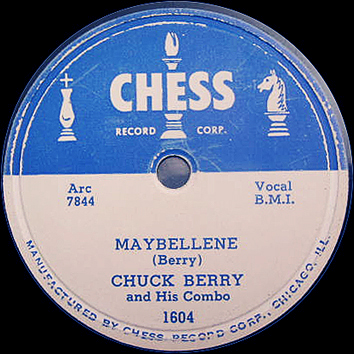
The first pressing of Chess 1604, on 78 and 45, credits "Maybellene" to Chuck Berry alone. But in a little while two other names were added to the composer credit: Alan Freed, the powerful DJ, and Russ Fratto, whose stationery store was next door to the Chess offices. The cut accorded to Freed was part of Chess's overt program of payola, but Fratto's slice? Was the company that far behind in its payments on letterhead?
Chess had inherited its distributor operation from Aristocrat, then maintained it for 5 years after the label changed its name. On May 28, 1955, Cash Box (p. 25) announced the opening of a new distributor on Michigan Avenue, headed by Paul Glass (it would be called All-State, though the item didn't include the name). Besides Atlantic, Cat, Excello, Nashboro, and Herald, All-State, at 2033 South Michigan, would be distributing Chess and Checker. "Len Chess confided that by turning disks over to a distributor, he felt that both he and Phil could be on the road at the same time without business suffering. And with the hits they turn out, they'll have puhlenty to promote." By July 2, 1955 (p. 63), Cash Box was treating All-State as an established player.
Three days later, Muddy Waters was in the studio with a single urgent mission, to cut his response to "I'm a Man." (He felt entitled; Bo Diddley had borrowed liberally from "Hoochie Coochie Man.") Muddy was accompanied on the occasion by Jimmy Rogers (guitar), Fred Below (drums), and Junior Wells (harmonica), plus a chorus of three women who scream in the appropriate places. This would be Muddy's only studio session without Little Walter between January 1953 and June 1957. Junior Wells was recording with Muddy for the first time since September 1952, when he was a regular member of the band.
Muddy's Chess 1602 was out before Berry's Chess 1604; the known quantity got precedence. Chess 1602 coupled "Mannish Boy" with "Young Fashion Ways" from the February session. It was in a company ad in Cash Box for July 2, 1955 (p. 59). It was advertised in Cash Box on July 9, 1955 (p. 26), along with a new release by Lowell Fulson on Checker 820, and a blast from the past: Checker 762 by Joe Williams. That same week the single landed an "Award o' the Week" review (p. 28). Chess 1602 appeared in another company ad on July 23 (p. 41) and bobbed back up in company ads on September 17 (p. 27), September 24 (p. 29), October 1 (p. 32), and October 8, 1955 (p. 23).
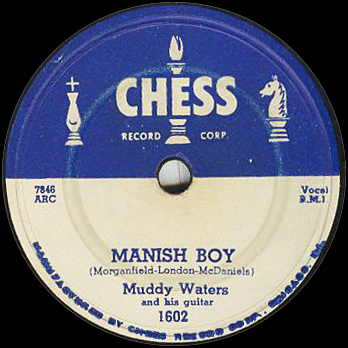
Willie Mabon returned to Universal on June 1 for the full four-tune treatment. The only important song that Wille Dixon wrote for the pianist, "The Seventh Son," was a highlight of the session. With its discmate, "Lucinda," it made for one of Willie Mabon's strongest releases. Mabon, so we are told, was accompanied by his usual ensemble of Paul King, trumpet; Andrew "Goon" Gardner, alto sax; Herbert Robinson, tenor sax; Bill Anderson, bass; and Oliver Coleman, drums. (Some discographies have expanded the reed section even further with a second tenor sax.)
There are, in fact, several reasons to question this roster. For one thing, Willie Dixon was there—so why wouldn't he have been playing bass? Besides, "Lucinda" is credited to Bill Martin. The song (a paraphrase of "Mariah," which Martin had done for Hy-Tone in 1946) was first recorded on a marathon Gatemouth Moore session (20 sides) for King that used Martin's band. In fact, it appears that Martin took Moore's place and sang on it (it was the last master out of 20, so Moore's pipes could have been getting tired). That was back in December 1947, and the side wouldn't be released for 50 years. Martin also cut "Hey Lucinda" on his last recording date as a leader (for Coral in September 1950). So it's a reasonable guess that Willie Mabon got the song from Bill Martin, which, in turn, suggests that Martin was playing on the session. Oh, and there are just two horns: trumpet and tenor sax.
Our revised personnel therefore becomes: Bill Martin (trumpet); Herbert Robinson (tenor sax); Willie Dixon (bass); and Oliver Coleman (drums).
With such experienced jazz players on hand, it's regrettable that only Robinson was called on to solo, though Martin does get some nice independent lines in the accompaniment. The atmosphere was unusually mellow; a number like "Someday You Will Have to Pay" comes across as more nostalgic than minatory. On "He Lied," Willie Dixon contributes some falsetto rejoinders to Willie Mabon's vocal complaint.
Chess 1608 was released in October 1955. It was talked up (p. 27) and advertised in Cash Box on November 5 (p. 29). The review followed on November 12 (p. 30), along with another ad (p. 31). Chess 1608 was advertised again on November 19 (p. 35). The other two sides from June 1 had to wait far into the reissue era.
A further reasonable guess: Willie Dixon's single track, "Walking the Blues" was made at the tail end of this session. We've therefore changed the date from c. June 1955 to June 1. "Walking the Blues," a cover of a hit that Champion Jack Dupree had been having, came right out a month later, on Checker 822.
Checker 822 was advertised in Cash Box on August 6, 1955 (p. 25). Cash Box reviewed it on August 13 (p. 24). Checker 822 was included in company ads on August 27 (p. 24), September 10 (p. 27), September 24 (p. 29), October 1 (p. 32), October 8 (p. 23), and October 15 (p. 32).
On June 15, Jimmy Witherspoon visited Universal Recording for the third time. On this occasion the veteran blues shouter was backed by a band featuring Harold Ashby on tenor sax and Willie Dixon on bass; the pianist, guitarist, and drummer have not been identified.
Two sides saw prompt release on Checker 826, which would be his last single for the company. Leonard Chess saw fit to turn over half the composer credit on "It Ain't No Secret" to Russ Fratto, soon to be enhancing his revenues with one third of the composer royalties for "Maybellene." We doubt that the real author of the tune, Willie Dixon, was especially pleased with this business arrangement.
Checker 826 was out in October 1955. It was first advertised in Cash Box on October 22 (p. 28), then on November 5 (p. 29), and November 12 (p. 31). It was reviewed on November 19 (p. 37).
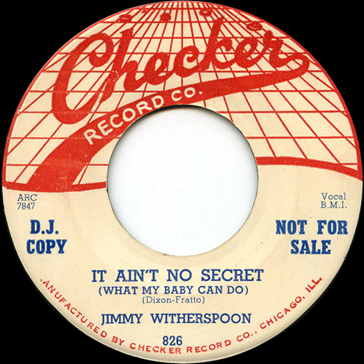
Witherspoon would make another four-tune session for Checker in August 1956; nothing was released off it for years. The singer then recorded in New York and Los Angeles for other labels from 1956 through 1958. Chess got him on disk one last time in January 1959, with his old bandleader Jay McShann in Kansas City, but again nothing was used for a long time. Witherspoon's last session in Chicago would take place for Vee-Jay, later that same month. He appeared at the Monterey Jazz Festival in 1959, which opened up a slew of opportunities to work and record with jazz musicians. He went on to record prolifically for multiple record companies from the 1960s through the 1980s. In 1983, he underwent successful treatment for cancer and returned to performing until a few months before his death. Jimmy Witherspoon died in Los Angeles on September 18, 1997.

Another June session was reserved for the Flamingos, who cut four sides. The first two selected for release ("I Want to Love You" b/w "Please Come Back Home") appeared on Checker 821. The others were released on singles, but not until 1957 and 1959, respectively.
Checker 821 was advertised in Cash Box on July 23, 1955 (p. 41), and again on July 30 (p. 21). It was reviewed on July 30 (p. 20). Further ads ran on August 27 (p. 24), September 10 (p. 27), September 17 (p. 27), September 24 (p. 29), October 1 (p. 33), and on October 8 (p. 23).
The group would not score a hit for the Chess brothers until their third release for label, toward the end of December 1955.

A full four-tune session by The Sparrows is the biggest chunk of doowop to go unreleased in the company's history. Nothing has been heard after nearly 80 years, and all four sides are presumed lost.
July 14 was a busy day at Universal, featuring back-to-back sessions by Little Walter and Bo Diddley. Further collaboration between the leaders would have been interesting, but each was focused on his own material that day.
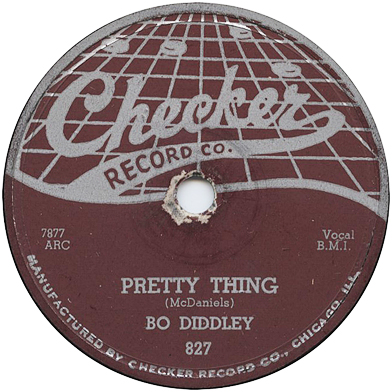
Bo Diddley used his working band of Lester Davenport (harmonica), Jerome Green, and Clifton James; Willie Dixon helped out on bass on three of the four sides (he laid out on "Pretty Thing"). "Pretty Thing" and "Bring It to Jerome" (the first of the band's numbers to give the percussionist a vocal role) were chosen for release on Checker 827. "Bring It to Jerome" was edited for release with awkwardly audible tape splices. Checker 827 was advertised for the first time in Cash Box on November 19, 1955 (p. 35), and reviewed in the same issue (p. 36). 827 was advertised again in Cash Box on December 10, 1955 (p. 43, along with Chess 1611 by the Moonglows).
"Spanish Guitar," an instrumental too long for a jukebox single, was held till Chess put out its second Diddley LP. "Heart-O-Matic Love," a labored effort to outrun Chuck Berry in the automotive arena, would not be heard until well into the CD era.
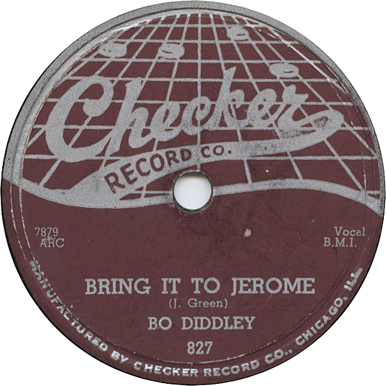
On August 3, Lowell Fulson recorded 4 sides in Los Angeles, with a band and arrangements of his choosing. Fulson was much more comfortable in this setting (his two sessions in Chicago were both contentious affairs). There were two more tracks on the same tape reel, but neither "The Checker" (as it was probably meant to be titled) nor "My Baby's Gone" are by Lowell Fulson. Who the singer was remains a mystery.
Two sides were released on Checker 829: "Trouble, Trouble" and "I Still Love You, Baby." Checker 829 was advertised in Cash Box on January 7, 1956 (p. 24). Fulson's other two sides had to wait till well into the era of reissue LPs.

On August 12, the company conducted its long-awaited first session with Sonny Boy Williamson. A harmonica-playing bluesman of uncertain age (supposed years of birth, somewhere in rural Mississippi, have ranged all the way from 1894 to 1912; the current consensus is on 1912), Sonny Boy was originally known as Aleck Miller, and in his younger days was sometimes billed as Little Boy Blue. But a crass advertising decision, made in the early 1940s when he was appearing on the King Biscuit Program on KFFA in Helena, Arkansas, deliberately confused him in the minds of listeners with the then-popular John Lee "Sonny Boy" Williamson, who recorded extensively between 1937 and 1947. Miller clung to the imposture after the real Sonny Boy's early death, in 1948. Like his old associates Howlin' Wolf and Elmore James, he finally broke onto the recording scene in 1951. He recorded for Lillian McMurray's Trumpet label until 1954, when the foundering company sold his contract to a Memphis-based pressing plant to which it owed a large sum of money. The pressing plant, in turn, dealt his contract to Leonard Chess, and well into the next year he was finally in Chicago ready to record.
The red carpet was rolled out: on hand were Otis Spann (piano), Muddy Waters and Jody Williams (guitars), Willie Dixon (bass), and Fred Below (drums). Five sides were cut, and the two that were selected for his first Checker single, "Don't Start Me Talkin'" and "All My Love in Vain," are both considered classics.

Checker 824 was advertised in Cash Box on September 17, 1955 (p. 27). The company was running batch advertisements during this period, so Sonny Boy's new single was pushed along with Checker 821 through 823 and Chess 1602, 1604, 1605, and 1606. Cash Box reviewed 824 on September 24 (p. 30). It was readvertised in further batches on September 24 (p. 29), October 1 (p. 33), October 8 (p. 23), October 15 (p. 32), October 22 (p. 28), November 5 (p. 29), November 12 (p. 31), and November 19 (p. 35).
Although Sonny Boy finally arrived in Chicago as popular demand for the blues was beginning to soften, and his health was in steady decline—he probably lost weight every year that he worked for the company—he recorded regularly for Checker until 1964. From 1963 through 1965 he toured Europe with the American Folk Blues Festival; many of his overseas appearances were recorded. Not long after returning from Europe to Helena and the King Biscuit radio show, the second Sonny Boy Williamson died suddenly on May 26, 1965.
The company got Eddie Boyd back into the studio, the very same day if the documentation is to believed. This time Chess got two sides out of him, which appeared on Chess 1606 at the end of the month. Chess 1606 was advertised in Cash Box on September 17 (p. 27)
and September 24, 1955 (p. 29). The review arrived on September 24 (p. 30). Basically, the single was advertised for a month: October 1 (p. 33), October 8 (p. 23), and October 15 (p. 32).Bobby Tuggle, we are reasonably sure, was a drummer by trade (note the prominence given to the drums on "The $64,000 Question"). Tuggle made his debut as a leader for Checker at some point in August. It would be interesting to know who was responsible for the stinging lead guitar work on his sides; also who produced the session, which may have been sold to the company.
Checker 823 was being promoted by Leonard Chess on September 3, 1955 (Cash Box, p. 10; the company took out a gimmicky sideways ad in the same issue, p. 13). Cash Box reviewed it on September 10 (p. 27) and September 17 (p. 28) and Checker 823 was included in a company ad in the September 17 issue (p. 27). The final company ad to mention it ran on September 24 (p. 29).
Tuggle did well enough with "The $64,000 Question" that the company brought him back early in 1956 for an isolated, unissued track ("Bobby's Blues"), then for a five-tune session in May 1956, which would be his last.
Chess needed more Chuck Berry, right away. In September, his band cut the two sides of Chess 1610, the rocker "Thirty Days" and the uncharacteristlcally sentimental (but effective) "Together." The single was in the stores by the end of the month. Leonard Chess was pitching it to Cash Box on October 8, 1955 (p. 21), it was getting reviewed on October 15 (p. 32), and it was being advertised (in conjunction with other Chess and Checker releases) on October 22 (p. 28), November 5 (p. 29), and November 19 (p. 35). A solo ad for the single ran on October 29 (p. 29). Despite the publicity, and a cover of "Thirty Days" by Ernest Tubb, Chess 1610 didn't sell nearly like "Maybellene" (which was hanging around in regional charts long after it was released).

The cooperation with the Parrot label evident in the vocal group sessions from January proved to be short-lived, for as the rival company fell into decline the Chess brothers didn't hesitate to lure Al Benson's talent away. On September 14, the eccentric guitar-playing bluesman J. B. Lenoir cut 9 tracks, two of which saw fairly prompt release on Checker. Checker spelled the bluesman's name as his previous label had spelled it: "Lenore." From late 1950 through early 1953, Lenoir had recorded for JOB (though his first session for that label, back in December 1950, was promptly sold outright to Chess). In 1954 and 1955 he'd cut 3 sessions for Parrot, where "Mamma Talk to Your Daughter" was a hit.

On his first outing for Checker, J. B.'s vocals and guitar were accompanied by his working band: Alex Atkins (alto sax), Ernest Cotton (tenor sax), Joe Montgomery (piano), and Al Galvin (drums). (Some sources have put Willie Dixon on these tracks, but there was no string bass in Lenoir's working ensemble and none is audible on the sesssion.) None too thrilled about Lenoir's defection, Al Benson put out one last release on the bluesman in November 1955, doctoring the matrix numbers to make it look like a new recording.
The only single to be released from the session, Checker 844, didn't appear till July 1956. It was reviewed in Cash Box on August 11, 1956, p. 30, and showed up in a full-page company ad on September 8, 1956 (p. 13). The full-page ad spelled "Lenoir" correctly.
Although the rest of Lenoir's output from his first session had to wait for reissue LPs, the Chess brothers stuck by this quirkily brilliant artist, recording him again in four-tune sessions on December 19, 1956, May 16, 1957, and April 14, 1958.
At some point in September 1955, someboy named Joe Bisko recorded four tunes, of which nothing more has ever been heard. A Cowboy Joe Bisko caught a mention in Cash Box for January 9, 1954 (p. 25); he had signed a one-year contract with a company called Blue Ribbon, which had just put out a single on him. The label in question was more fully known as Chaw Mank presents Blue Ribbon. According to the labels on Blue Ribbon 1918, the company was located in Staunton, Illinois, in a rural area northeast of Saint Louis. Chaw Mank (né Charles Menk, Jr., 1902-1985) was involved in a lot of different things, including playing piano and organ, leading a small dance band, organizing fan clubs, and producing country music. Cowboy Joe Bisko was also credited, along with Chaw Mank and Kay and Dolly Karroll, for a yodeling vehicle titled "Hillbilly Leprechauns." This was recorded by the Karroll Sisters on Blue Ribbon 1923, another 1954 release (Decca subsequently acquired the master and reissued it with a different coupling in 1955). Nothing in the titles that Joe Bisko recorded for Chess would rule out a country artist. But the 4858 series was over and done, Chess would not be making another entry into the country and western business, and the tracks ascribed to Joe Bisko are unrecoverable today.
The fallow period continued as the company brought Stomp Gordon back for a standard-issue four-tune session. His first Chess release had just come out—it was going nowhere. The advent of rock and roll had just made his brand of R&B seem dated. None of the sides from his second session have ever been seen the light of day. As the company's assets grew, and the cost of recording was gradually declining in relative terms, the brothers were willing to take risks that would have been inconceivable in 1950 or 1951.
Stomp Gordon would make his final records in September 1956, for Savoy; the two sides that were released emit an aura of desperation, with frenetic, raspy singing. Although Universal Attractions picked him up in 1957, rock and roll was cutting more and more deeply into his bookings, and Gordon had developed a heroin habit. On January 18, 1958, he was found dead in the driver's seat of the band's station wagon, which was parked on an avenue in Harlem.

In October, the Moonglows returned for a fairly long session at Universal. The documentation is confusing, perhaps incorrectly suggesting multiple attempts at the song that was released as "Lover, Love Me" on Chess 1611. Just this tune and its flip, "In My Diary," were released at the time. Another track came out on an LP in the 1970s. There were no "Moonlighter" releases on Checker this time.
Chess 1611 was advertised in Cash Box on December 10 (p. 43, co-promoted with Checker 827 by Bo Diddley) and December 17, 1955 (p. 24). A further Cash Box ad ran on January 28, 1956 (p. 24). We wonder whether Cash Box really didn't review Chess 1611; could it have happened on December 31, 1955, from which an incomplete copy has come down to us?


Somewhere in October, Chess laid down two sides by a doowop group called The Five Notes. The group was originally formed in Dallas, Texas. Al Braggs was the lead singer, Cal Valentine was the second lead, and the other members were Robert Lee Valentine, Jesse Floyd, and Billie Fred Thomas. After winning some talent shows in Texas, the group moved to Milwaukee, where a DJ named Chuck Dunaway promoted the group at his stage shows and took co-composer credit on their songs. Dunaway was from Houston, and may have heard the group in this home state. As soon as he arrived in Milwaukee and began working at WRIT, he started schmoozing the Chicago-based writers for Cash Box. For instance, on November 11, 1955 (Cash Box, p. 14), he was said to be in Chicago visiting Paul Glass at All-State Distributors—which handled Chess and Checker in the region.
The Five Notes recorded just two sides for Chess, and the company, preoccupied with the Moonglows and the Flamingos and Howlin' Wolf and Bobby Charles and Chuck Berry, didn't put much promotion behind them, but their single release, on Chess 1614, is considered a classic of the genre. Chess 1614 was probably released in February 1956 (it was never advertised in Cash Box, but drew a review on March 17, 1956, p. 38). According to Robert Pruter, "With its relaxed lope, vigorous doowop chanting, and splendid work by the bass and high tenor, 'Park Your Love' was the side that got the most plays across the country. 'Show Me the Way,' the ballad side, likewise got strong doowoppy support from the chorus" (Doowop: The Chicago Scene, p. 81). The Five Notes were backed by an unidentified rhythm section of piano, guitar, bass, and drums, which for all we know was also imported from Milwaukee.

The Five Notes returned to Dallas in 1957, appearing in a locally made rock and roll film; they recorded two sides as the Five Stars for Blues Boy Kingdom, a label operated by B. B. King (1957), and two more as the Five Masks, for a label of uncertain geographical location called Jan (1958). It probably didn't help that there were several other active groups called the Five Stars, including one that recorded in Chicago for the Indianapolis-based Note label. The group broke up in 1958. Subsequently, Al "TNT" Braggs performed as a soloist, recording for Duke and working as a popular opening act for Bobby "Blue" Bland. The brothers Valentine started a group called the Valentines, which got six blues sides released on King. According to Michel Ruppli, The King Labels, Volume 1, the Valentines cut two tracks in Dallas, Texas, on March 14, 1960, followed by no fewer than 12 on September 13 and 14, 1960, in Cincinnati. The September sessions also yielded a single on Bethlehem, a King subsidiary.

On November 3, Muddy Waters and his band laid down four tunes. The results of this session were uniformly strong, and all of the sides would be released on singles, starting with "Sugar Sweet" b/w "Trouble, No More" on Chess 1612.
Chess 1612 was released quickly (out before the end of the month), but it got casual handling as far as promotion was concerned. Beyond a remark about "Sugar Sweet" from Paul Glass of All-State distributors (Cash Box, December 3, 1955, p. 33) we've seen neither ads nor a review (however, the two pages with the R&B reviews are missing from the December 31 issue of Cash Box available online).
"I Got to Find My Baby," which was just as good as the first two tracks, was held for release on Chess 1644, first advertised in Cash Box on December 1, 1956 (p. 39) and re-advertised on December 15 (p. 38). Cash Box reviewed it on December 15, 1956 (p. 40). Chess 1644 figured in another company ad on December 29, 1956 (p. 39). "Got to Find" was effectively the flip to one of Muddy's best sides from 1956, "Just to Be with You."
Muddy was entering a period in which his studio recordings and club appearances concentrated on his singing, making the "Muddy Waters & His Guitar" billing a little archaic. During 1956 and 1957 he actually hung his instrument up, though fortunately the decision turned out to be temporary.

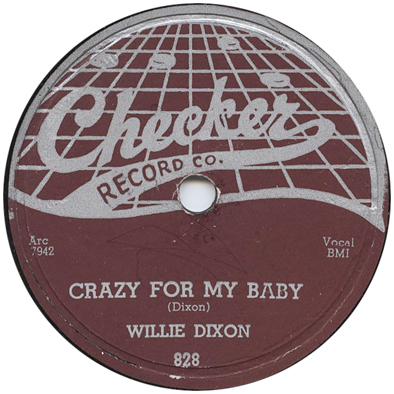
Tucked into the next few days was another session for Willie Dixon as a leader. As with so many of the sessions that Dixon supervised, the personnel isn't known with certainty: two tenor saxes, guitar, piano, the leader's bass, and drums.
Willie Dixon's stolid bass wasn't an ideal lead, but he makes a good account of himself on "Crazy for My Baby," one of his better songs. The number also features a rockin' tenor sax solo that may the work of Harold Ashby. "I Am the Lover Man" is a rather strange tune that too often pulls Dixon down to the very bottom of his range. These two sides were rushed out on Checker 828. On November 12, 1955 (p. 33), Cash Box told of "Lover Man" getting played for two solid hours by a DJ in New Orleans,. This didn't launch the disk, which was advertised just once in Cash Box (November 19, 1955, p. 35) and not reviewed.
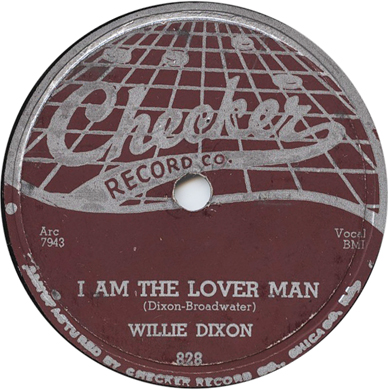
"Pain in My Heart" (a ballad with a long tenor sax solo by Ashby) was held for Checker 851 (where it was paired with Dixon's classic "29 Ways"). Checker 851 was advertised in Cash Box on December 1, 1956 (p. 39) and reviewed in the same issue (p. 39). A fourth side was left in the can.
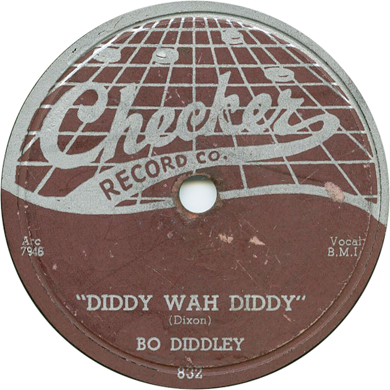
A week after the Muddy Waters session, a very busy Bo Diddley was back for his fourth session in 8 months. Little Willie Smith was now playing harmonica in his working group (after he left, Bo would drop the instrument), and was duly featured on the classic "Diddy Wah Diddy," along with backing vocals by the Moonglows. "I Am Looking for a Woman" featured the guitar lead of Jody Williams, a significant addition to the band who was a month away from making his own classic session for Parrot. Jerome Green and Clifton James rounded out the session, with help as usual from Willie Dixon on the bass.
Checker 832 was reviewed in Cash Box on February 18, 1956 (p. 35). It was advertised in the March 10 issue (p. 31). The shortage of oomph behind the single was a bit surprising.
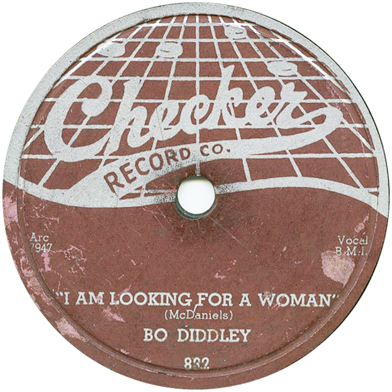

Although members of the group told Robert Pruter that they had recorded their famous ballad, "I'll Be Home," back in March, the matrix number series suggests that the Flamingos made it at their third session, which took place in November. The existence of two matrix numbers for the same title does support the recollection that "I'll Be Home" was first cut in the company's back office, and Leonard Chess ended up preferring that version to the one that the group subsequently made at Universal Recording. When Checker 830 came out toward the end of December 1955, "I'll Be Home" scored a hit, reaching #5 on the Billboard R&B chart.
Checker 830 caught an Award o' the Week review in Cash Box on January 7, 1956 (p. 26). An ad with a photo of the group followed on January 14 (p. 34). On January 21, it was promoted alongside the first Bobby Charles single (p. 33); on February 4 (p. 27), February 11 (p. 38), and February 18 (p. 30), it was hypoed in tandem with Chuck Berry's Chess 1615. A final ad ran in Cash Box on March 10 (p. 31).
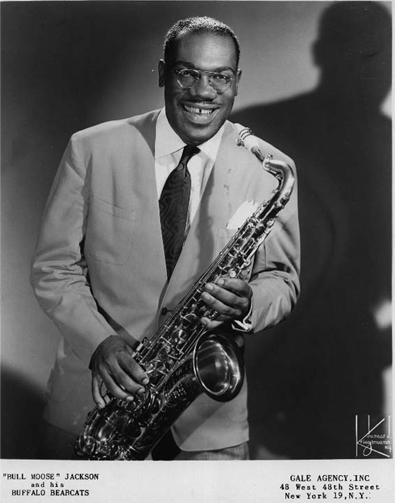
On December 15, Chess recorded Bull Moose Jackson with brass and reed sections, piano, bass, drums, and female backing singers. Benjamin Clarence Jackson had been a top R&B artist since August 1945, when he first recorded for King Records. After "I Love You Yes I Do" (1947) and "Big Ten Inch Record" (1952), Jackson ended a decade with King with a session in January 1955. According to some accounts, Jackson was signed with the aim of using his sides for the brothers' new Marterry label. The session date fits. But nothing was released on any label, not till well into the CD era—and what wasn't released then is probably now lost.
The Chess brothers may have concluded that Jackson's material was dated and wouldn't sell. It surely didn't help when Leonard Chess was called on the carpet by the Board of Musicians Union Local 208 for recording Jackson while he was an "erased member" of the local. (See the Musicians Union Local 208 Board minutes for February 16, 1956, p. 1; we learned the precise date of the session from this source.)
Bull Moose Jackson recorded little after his failed session at Chess: 4 sides for Encino in Los Angeles (1956), two for Warwick in New York (1960), and two more for 7 Arts, also in New York (1961).
At some point during the month, Chess also worked in two sides by The Flock Rocker, a prominent St. Louis DJ. What these were like we have no idea, because they've never surfaced in any form. Were the Chess brothers trying to compete with Vee-Jay, which had recorded one of the Flock Rocker's Chicago-based competitors, the Magnficent Montague?

On December 20, the company brought Chuck Berry and his group back into Universal Recording to make six more sides; much was expected, as this was their third session in less than a year. The lineup consisted of Berry, vocals and guitar; Otis Spann, piano; Wille Dixon, bass; and Ebb Hardy, drums. Somebody contributed maracas to one of the instrumentals. The two warm-up instrumentals were mastered and titled, to appear a little while later on the company's first Chuck Berry LP.
The first release from the session, Chess 1615, coupled "No Money Down" and "The Downbound Train." Chess 1610 having run out of steam, the company had 1615 on shelves by the end of January 1956. Cash Box reviewed it on February 4, 1956 (p. 36). The same issue featured an embarrassing piece of ad copy (p. 27) that made Chess 1615 out to be Bo Diddley's new single. The error was corrected in the February 11 issue (p. 38), and Chess ran another ad on February 18 (p. 30). A final push came from a company ad for March 10 (p 31). Chess 1615 seems to have moved better than Chess 1610, but Leonard and Phil wouldn't meet their sales targets until Chuck Berry's next release (Chess 1626, "Roll Over Beethoven").
"You Can't Catch Me" was held for release on Chess 1645, the third release after 1615. In part, the delay was because the song was featured in a film. For some reason, Chess 1645, with "Havana Moon" on the other side, failed to chart, even though "You Can't Catch Me" has long since been considered a rock and roll classic. Chess 1645 was being talked up (p. 34) and advertised (p. 39) in Cash Box for December 1, 1956. Cash Box reviewed it on December 8 (p. 49).
"Can't Catch" also appeared on LP 1425, the very first 12-inch LP on the Chess label.
"I've Changed" has no matrix number, and there is some question as to when it was done. We've gone here with Fred Rothwell's judgment on the matter, in his book Long Distance Information.

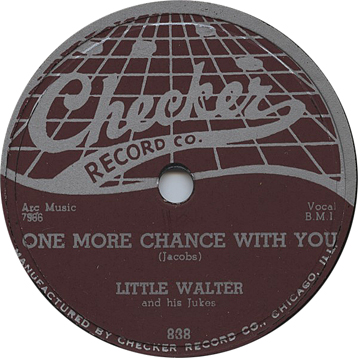
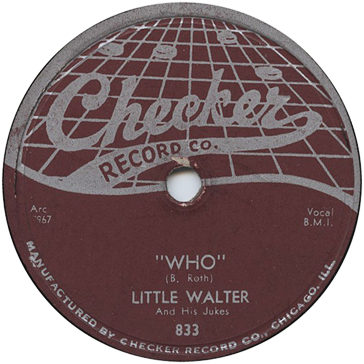
Closing out their blues recording for the year, the Chess brothers brought Little Walter into the studio for another four sides. "Who," a cleverly worded number by Bernard Roth, and "It Ain't Right" formed his next single on Checker 833. Checker 833 was first advertised in Cash Box on March 3, 1956 (along with Howlin' Wolf's Chess 1618, p. 30). Cash Box give it an Award o' the Week review on March 10 (p. 32) and it was readvertised in the same issue (p. 31). The company gave 833 a solo ad on March 17, 1956 (Cash Box, p. 36) and tried again on March 24 (p. 35).
"One More Chance with You" made Walter's next release, Checker 838; the company hadn't waited long for 833 to develop sales. With the addition of an instrumental, "Flying Saucer," recorded in 1956, Checker 838 was out in May. It was advertised in Cash Box on May 12, 1956 (p. 65), on May 19 (p. 31), and again on June 2 (p. 30), June 9 (p. 30), and June 16 (p. 30). Cash Box reviewed it on May 26, 1956 (p. 32).
"Boom Boom Out Goes the Lights" would see release on Checker 867. Unusually for a Walter session, all four numbers had vocals.
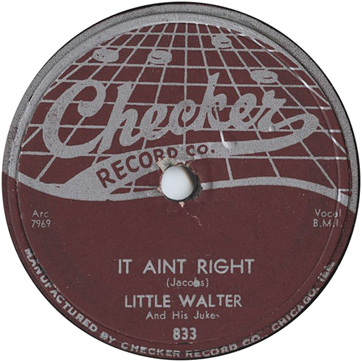
To round out the session, Jimmy Rogers came in with a single mission: to remake his song "You're the One." The new laid-back rendition got a pretty prompt release on Chess 1616 and became a hit.
Chess 1616 was advertised in Cash Box on March 10, 1956 (p. 36) and reviewed in the same issue of the magazine (p. 32). A solo ad followed on March 17 (p. 36).
Around this same time, amid circumstances no longer recalled, Eddie Boyd laid down a single track that sat unreleased for 40 years.
In the second half of 1955 the Chess brothers, now in a position to expand their operations significantly, began preparations for a third record label. The first release on the label was their first LP, in November 1955. According to a story in Billboard for December 24, 1955, they wanted a pop imprint whose records would get immediate play on pop radio, instead of waiting to cross over from the R&B charts; the first singles were scheduled for release on January 1, 1956 (a date that ended up slipping into February). A slightly different tale was told to Cash Box on January 14, 1956: "The Marterry label will be Chess & Checker pop subsidiary to cover their R&B hits. Much more news on this soon" (p. 33). The master numbers indicate that the first LP and EP on the label were also put together in 1955.
The plan was to name the new brand after Leonard Chess's son Marshall and Phil's son Terry. But the Marterry name would soon elicit complaints from society band leader Ralph Marterie (who resided in Chicago and was recording prolifically for Mercury). So after just two Marterry singles from the original batch, the name was changed to Argo. The Marterry/Argo release series began at 5249, another significant address in the history of the Chess brothers. While the company regrouped (and issued four Argo LPs with an extra "Creative" logo), the Savannah Churchill release on Argo 5251 and the Danny Overbea on Argo 5252 were delayed for a couple of months.
The first release on Marterry was by a doo-wop group called The Daps. The personnel of this group remains unknown, but the deluxe studio band that Willie Dixon put together for the date was finally identified by ear in 2014 (we thank Mark Mumea, Scott Dirks, and the late Steve Franz for their help with the identifications; Jody Williams confirmed working on the session). The jump side, "Down and Out" features stinging lead guitar by Jody Williams and rasping tenor sax by Harold Ashby. Williams is just as recognizable on the ballad side, "When You're Alone," where he turns his amplifier down and Ashby lays out. The rhythm section appears to have consisted of Lafayette Leake (piano), Willie Dixon (bass), and Vernel Fournier (drums). A third track, "Love Your Lovin' Ways," surfaced in 1994 on the Chess Rhythm & Roll box set. Besides the attribution to The Daps, no information was provided except an obviously incorrect 1954 recording date. It's audibly from the same session—Fournier and Ashby are both present, and Ashby gets a solo, but Williams seems to be laying out. It was most likely passed over because the group's approach to this jump makes it sound an awful lot like "Down and Out."
Marterry 5249 was released in February 1956. Leonard Chess was talking it up in Cash Box for February 26 (p. 11) and taking out a full-page ad for it in the same issue (p. 27). Another ad ran on March 3 (p. 26). On March 17, Cash Box noted (p. 34) that the Daps had appeared on Howard Miller's TV show. In April 1956 the Daps appeared in a package show at the Madison Rink (2560 West Madison) put on by DJ Sam Evans; Ray Charles and the Diablos were the headliners. The group did not record again and its subsequent activities have not been traced.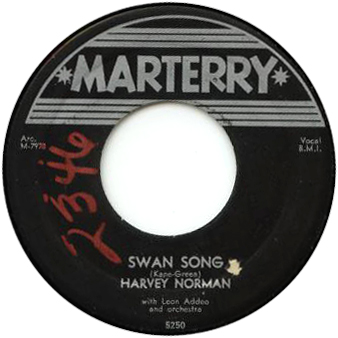
Our thanks to Dan Ferone for alerting us to the rare second Marterry release, by a pop singer named Harvey Norman. Norman was accompanied by a good-sized studio band under the baton of one Leon Addeo. Harvey Norman was born around 1935. He was described in a 1956 item in Cash Box (March 10, p. 15) as a "New Jersey boy" and in a 1962 article as "a native New Yorker"; Harvey Norman could have been a stage name. Norman was active as a singer in 1953 and made two singles for MGM, which were released in May and October 1954. He also got a favorable review from Billboard for a live performance in Syracuse, New York (albeit in a dive that featured a stripper). Marterry picked Norman up after MGM didn't renew his contract. To our ears Norman had a forgettable voice—and the songs, which were both by writers named Kane and Green, drive the needle up on the sap meter till it bursts through the glass. "City of Love" did get a push from a DJ in Rochester, New York, where Norman had some kind of following, but where else did it get more radio play, even for a week, than "Heartbreak Hotel" by Elvis Presley or "Blue Suede Shoes" by Carl Perkins?
Harvey Norman may not really have minded the sales figures on Marterry 5250. Though he made a promotional appearance in Chicago (Cash Box, March 10, 1956, p. 15), his single got little attention after the trades reviewed it (for Cash Box, this was on March 3, 1956, p. 8). By the middle of 1956 Norman was working as the straight man to comedian Stanley Dean, whose new agent thought he needed a partner. Norman and Dean were working together by July 24-25 [http://www.eddiedeezen.com/2008/02/martin-and-lewi.html], when Norman parlayed his acquaintance with Jerry Lewis—he'd sung at Brown's Hotel in the Catskills, where Lewis often hung out—into standing room admission to Dean Martin and Jerry Lewis's final appearance at the Copacabana. Dean, whose real name was Samuel Slovinsky, was born in Montre´al in 1930 and had been doing standup for two or three years when Norman joined him.
Norman and Dean enjoyed a fair amount of success as a comedy team—they are not hard to find in entertainment ads from 1957 through 1959—but they broke up at the end of that year because by then Dean had found Norman completely impossible offstage.
Here's how Dean described the situation to Kliph Nesteroff, in a long interview they did in 2012:
So he [the new agent] found somebody whom I wish I had never met! It turned out that we did sensational for the first two or three years. But then he turned out to be one of the most voracious gamblers on the face of the earth. He was nasty. He didn't care what he did. One day I got a call that he was in jail. The cops had stopped him, searched his car and found a sawed-off shotgun in his golf bag. [...]
I went and bailed him out. I said, "What were you doing with a sawed-off shotgun in your golf bag?" He said, "Well, I was thinking of holding up a bank." I said, "Okay, makes sense." (Kliph Nesteroff, "An Interview with Stanley Dean - Part One," Classic Television Showbiz, September 17, 2012, http://classicshowbiz.blogspot.com/2012/09/an-interview-with-stanley-dean-part-one.html)
According to Dean, Norman's gambling problem flared up when the two were booked—where else?—at El Rancho Vegas (November 1958, with Jane Russell heading up the bill),
We were making $7500 a week. Around the second week I needed some money. I went to withdraw some money and they told me, "Sorry. There's no money left." We were booked there for a month! That's close to thirty grand! There wasn't a dime left! The f***ing idiot went and blew the whole thing. I wanted to kill him! At that point I realized this is nothing but trouble.
Norman then worked for a while with the Ardrey Sisters, Molly and Sally—respectively the former Florida Watermelon Queen and the former Florida Citrus Queen, both former Aqua-Maids at Cypress Gardens—who got a single on MGM from 1956; they sang and tap-danced and he probably sang with them. He found a female comedy partner named Rosalie Mann, whom he probably knew from his singing days, and they didn't stay together. After Stanley Dean found that his own new partner, Tony Foster, wasn't that good onstage, then Foster left and Dean wasn't doing so well as a solo act, Norman and Dean got back together in 1961, reaching their biggest audiences with several appearances in 1962 and one in 1963 on The Ed Sullivan Show.
But the revived Norman and Dean act failed the second time, for the same reasons as the first:
Not very long. Not very long because he went back to the same thing. This man was nuts. He was so nuts. You know what he did? We worked with a trio. Two sisters [Molly and Sally Ardrey] and a guy [Billy Alberts]. It was a cute act. We worked with them and he fell in love with one of the girls [Molly]. A lovely, sweet, nice lady. She became a model and was doing very well. She was making money. Harvey went and forged her signature on cheques and took out everything she had in the bank and went and gambled. Cleaned her out. People used to stop me in the street, "Where's your partner!?" And they'd grab me. "Get your hands off me," I'd say. They'd shout, "He did this and he did that!" I'd say, "Yeah, well, I have nothing to do with it! Go find him!" (Kliph Nesteroff, "An Interview with Stanley Dean - Part Two," Classic Television Showbiz, September 24, 2012, http://classicshowbiz.blogspot.com/2012/09/an-interview-with-stanley-dean-part-two.html)
Dean went back to being a solo act, for good. The only subsequent sighting of Harvey Norman we have is from the late 1960s, when he was the entertainment director at Kutsher's, another big hotel in the Borscht Belt (Pittsburgh Post-Gazette, August 5, 1969, p. 14). His former partner, Stanley Dean, died in Davenport, New York, in 2015 (Jim Kevlin, "In Memoriam: Stanley [sic] Slovinsky, 85; Half of Norman & Dean Comedy Act," AllOtsego.com, November 19, 2015, http://allotsego.com/17735-2/); for most of what we know about Harvey Norman, we are indebted to Dean's sharp and sometimes scathing 2012 interviews about comedians (and, sometimes, their agents) with television historian Kliph Nesteroff.
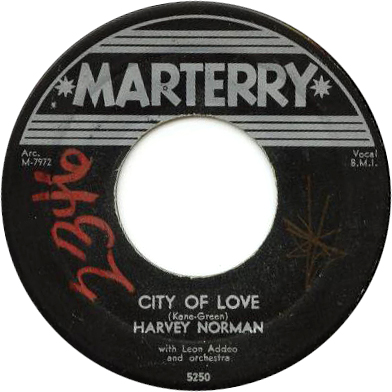
Leonard Chess announced the change of name in March 1956. On March 17, Cash Box had Chess looking for a new name for Marterry (p. 34); in keeping with the board game theme, the Cash Box scribe suggested "Bingo." Not too far off; Leonard Chess went with Argo ("Chess Pop Label Changes Name," Cash Box, March 31, 1956, p. 21). The announcement was slightly garbled: supposedly the next release, which was had probably just been recorded, was an Eddie Jefferson rendition of "Moody's Mood for Love" with jazzman James Moody playing alto saxophone on it. Moody was at the Stage Door Lounge at the beginning of February (Cash Box, February 11, 1956, p. 37). But no such single was in the works. Eddie Jefferson sang on three tracks from Moody's Flute 'n the Blues LP, one of them being "Parker's Mood" with Moody on alto sax. The release was Argo Creative LP 603, an LP that didn't show up until August. The other two singles that had recorded for Marterry in December 1955 were held for release till May 1956 (both were reviewed, in the R&B section, in Billboard for May 12, 1956, p. 119). Argo 5251 still had the Marterry prefix on its matrix numbers.
The single bySavannah Churchill, who had been recording since 1942, featured spare accompaniment and a male chorus on a pop ballad and a country ballad. Savannah Churchill was born Savannah Valentine Roberts in Colfax, Louisiana, on August 21, 1915. Her family moved to Brooklyn, New York when she was young. Her first husband, David Churchill, was killed in a car accident in 1941, and she turned to singing full-time to support her family. In 1942, she made her first single with Joe Davis's Beacon Records; in 1943, she sang with Benny Carter on Capitol. From 1945 to 1950, Savannah Churchill was under contract to Manor (later ARCO); this was her peak period as a hit-maker, with "I Want to Be Loved" (Manor 1046) reaching #1 on the R&B charts in 1947. She also appeared in a couple of films. Savannah Churchill was a contralto who sang with gospel fervor and occasional formal diction; she could sing blues, but her strengths were torch songs and ballads. She was typically accompanied by male vocal groups and small combos on her records ("I Want to Be Loved" used the Rudy Richardson Trio). As time went on the vocal groups, like the Four Tunes, became the bigger draw in their own right. In December 1950, Savannah Churchill signed with Regal, but made just one session for the label before it started going downhill. RCA Victor picked her up when Regal released her from her contract. After a year with RCA Victor, she made her last hit for Decca in 1953. Argo 5251 would be her only recording for the Chess brothers.
Savannah Churchill and her management didn't put much confidence in Argo. The release date slipped on her single because of the switchover from Marterry; the month after it was out, an ad for an engagement in Miami, Florida, pointedly referred to her as a Decca artist. There would be no opportunity for her to do more for Chess, Checker, or Argo. She was badly injured in a freak accident, which was not mentioned in the newspapers right away, but happened in late 1956 or sometime in 1957: she was singing in a club in Brooklyn and a drunk spectator fell off a balcony and landed on her. She suffered a broken hip and other serious injuries; then she had to be treated for cancer that was discovered when she was being operated on for her injuries. She returned to performing on a limited basis, in 1958, walking with a cane. She made one last record, a largely retrospective LP, for the Jamie label in 1960. Her health in steady decline, Savannah Churchill died of pneumonia in Brooklyn on April 19, 1974.
And with the advent of rock and roll, Danny Overbea had turned into a full-time pop singer, recording with strings, hence the decision to move him to the new label. Cash Box reviewed Argo 5252 on May 5, 1956 (p. 8).
After the Churchill and Overbea singles, Argo skipped two numbers before the first single recorded in 1956, Argo 5255 by The Ravens, hit the bins in July (it was reviewed in Cash Box on August 4, 1956, p. 6). Commercially, however, the Ravens were past theire prime. What got Argo going as a singles label was the release, in November 1956, of a genuine hit ("Ain't Got No Home" by Clarence Henry, on Argo 5259). That, of course, was an R&B record. From then on, the imprint was no more pop-oriented than Chess or Checker were.
Meanwhile, the Argo LP program was slow getting started. A Cash Box story in August 1956 announced LPs 602 through 605 ("Argo Releases First Jazz LPs," August 11, 1956, p. 24). They were included in the monthly LP list on September 1, 1956 (p. 20). In the August 11 story, Phil Chess was quoted extolling "Creative High-Fidelity Modern Music." The original releases for Argo LP 602 through 605, then, were Argo Creatives. Later pressings and cover printings changed the name of the label to Argo unaccompanied, but left such traces behind as Joe Segal's reference to the Creative label in his notes on the back of LP 603.
With the company getting ready to move to South Michigan Avenue, a new batch of five Argo LPs was announced ("Chess/Checker/Argo Plan for Big '57," Cash Box, January 19, 1957, p. 43). These were the first unCreative Argos: LP 606 by Cy Touff and Miff Mole, LP 607 by Norman Simmons, LP 608 by Zoot Sims, LP 609, by less heralded local jazz artists, and the second Ahmad Jamal, LP 610. Nothing was moving too fast, though; on December 22, 1956 Cash Box writers had already been treated to a sneak preview of the album covers (p. 32). In March, Phil Chess finally announced the release of Argo LPs 606 through 612, now including Ramsey Lewis's first LP and another James Moody ("Argo Releases 7 LPs," Cash Box, March 23, 1957, p. 48; the first ad ran on March 30, 1957, p. 28). Although the pace picked up as the year progressed, Argo LP releases were still often delayed.
By the end of 1958, when the company scored a monster hit with Argo LP628,Live at the Pershing by Ahmad Jamal, Argo's LP line was giving the entire label a distinct jazz orientation.
In December 1956, the Chess brothers began signalling plans for a Chess LP: a collection of recent rock and roll hits (Cash Box, December 15, 1956, p. 35). It would be their first not on Marterry/Argo. In January 1957, the company was working on more Chess- and Checker-branded LPs, by the Moonglows and Bo Diddley (Cash Box, January 26, 1957, p. 34).
| Matrix | Artist | Title | Release Number | Recording Date | Release Date |
| 7752 | Moonglows | Most of All | Chess 1589 | January 1955 | February 1955 |
| 7753 | Bobby Lester and The Moonlighters | Hug and a Kiss | Checker 813 | January 1955 | February 1955 |
| U7754 | The Moonglows | Doubtful | unissued | January 1955 | |
| U7755 | The Moonglows | He Lied | unissued | January 1955 | |
| 7756 | Bobby Lester and The Moonlighters | New Gal | Checker 813 | January 1955 | February 1955 |
| 7757 | Moonglows | She's Gone | Chess 1589 | January 1955 | February 1955 |
| U7758 | and | U7759 | See | Purchased | Sessions |
| U7760 | and | U7761 | See | Purchased | Sessions |
| 7762 | Lowell Fulson | Lonely Hours | Checker 820 | January 13, 1955 | July 1955 |
| 7762 [alt.] | Lowell Fulson | Lonely Hours | (Chess CHD 2-9394) | January 13, 1955 | |
| 7763 | Lowell Fulson | Check Yourself | Checker 812 | January 13, 1955 | February 1955 |
| 7763 [alt.] | Lowell Fulson | Check Yourself | (Chess CHD 2-9394) | January 13, 1955 | |
| 7764 | Lowell Fulson | Loving You (Is All I Crave) | Checker 812 | January 13, 1955 | February 1955 |
| 7765 | Lowell Fulson | Do Me Right | Checker 820 | January 13, 1955 | July 1955 |
| 7766 | John Brim and His Gary Kings | Go Away | Chess 1588 | January 1955 | February 1955 |
| 7767 | John Brim and His Gary Kings | That Ain't Right | Chess 1588 | January 1955 | February 1955 |
| 7768 | and | 7769 | See | Purchased | Sessions |
| 7770 | Rev. Ballenger | This Train | Chess 1590 | prob. January 25, 1955 | February 1955 |
| 7771 | Rev. Ballenger [sic] | How I Got Over | Chess 1590 | prob. January 25, 1955 | February 1955 |
| 7772 | The Fortunes | Bread | (Parrot 804 [boot]) | January 25, 1955 | |
| 7773 | The Fortunes | Love | (Parrot 804 [boot]) | January 25, 1955 | |
| 7774 | The Clouds | Baby Wants to Rock | (Broadcast 1002, Power Vine 6082 [CD]) | January 25, 1955 | |
| 7775 | The Clouds | Say You Love Me | (Parrot LP 2120 [boot]) | January 25, 1955 | |
| 7776 | Little Walter and His Jukes | Thunder Bird | Checker 811 | January 25, 1955 | February 1955 |
| 7777 | Little Walter and His Jukes | My Babe | Checker 811 | January 25, 1955 | February 1955 |
| 7777-R | Little Walter | My Babe | Checker 955 [45 rpm] | January 25, 1955 [vocal group overdubbed in 1960] |
June 1960 |
| 7778 | and | 7779 | See | Purchased | Sessions |
| 7780 | and | 7781 | See | Purchased | Sessions |
| 7782 | Willie Mabon | Wow I Feel So Good | Chess 1592 | c. January 1955 | March 1955 |
| 7783 | Muddy Waters | This Pain | (Chess [J] PLP 6040/50) | February 3, 1955 | |
| 7784 | Muddy Waters and His Guitar | Young Fashion Ways | Chess 1602 | February 3, 1955 | June 1955 |
| 7785 [alt.] | Muddy Waters | I Want to Be Loved | (Chess 2 CD 649, Hip-O Select CD 2758) | February 3, 1955 | |
| 7785 | Muddy Waters and His Guitar | I Want to Be Loved | Chess 1596 | February 3, 1955 | April 1955 |
| 7797 | Muddy Waters and His Guitar | My Eyes (Keep Me in Trouble) | Chess 1596 | February 3, 1955 | April 1955 |
| 7786 [alt.] | Bo Diddley | I'm a Man | (Chess CHD-9331) | March 2, 1955 | |
| 7786 | Bo Diddley | I'm a Man | Checker 814 Checker 997 [45 rpm] |
March 2, 1955 | late March 1955 November 1961 |
| 7787 [alt.] | Bo Diddley | Little Girl | (Chess CHD-9331) | March 2, 1955 | |
| 7787 | Bo Diddley | Little Girl | (Checker LP 1436) | March 2, 1955 | |
| 7788 [alt. 1] | Bo Diddley | Bo Diddley | (Hip-O Select CD B0009231-02) | March 2, 1955 | |
| 7788 [alt. 2] | Bo Diddley | Bo Diddley | (Hip-O Select CD B0009231-02) | March 2, 1955 | |
| 7788 | Bo Diddley | Bo Diddley | Checker 814 Checker 997 [45 rpm] |
March 2, 1955 | late March 1955 November 1961 |
| 7789 | Bo Diddley | You Don't Love Me | (Checker LP 1436) | March 2, 1955 | |
| 7790 | Billy Boy Arnold | Rhumba | rejected | March 2, 1955 | |
| 7791 | Billy Boy Arnold | Sweet on You, Baby | (Red Lightnin RL 0012) | March 2, 1955 | |
| 7792 | Billy Boy Arnold | You Got to Love Me | (Red Lightnin RL 0012) | March 2, 1955 | |
| 7793 | and | 7794 | See | Purchased | Sessions |
| 7795 | Howlin' Wolf | Who Will Be Next | Chess 1593 | February 3, 1955 | April 1955 |
| 7796 | Howlin' Wolf | I Have a Little Girl | Chess 1593 | February 3, 1955 | April 1955 |
| 7798 | Howlin' Wolf | Come to Me Baby | Chess 1607 | February 3, 1955 | October 1955 |
| 7799 | Howlin' Wolf | Don't Mess with My Baby | Chess 1607 | February 3, 1955 | October 1955 |
| 7800 | Jimmy Rogers | You're the One | (Chess [Br] 6641174) | February 3, 1955 | |
| 7801 | through | 7806 | See | Purchased | Sessions |
| 7807 | Eddie Boyd | unidentified title | unissued | March 10, 1955 | |
| 7808 | Eddie Boyd and His Chessmen | Real Good Feeling | Chess 1595 | March 10, 1955 | April 1955 |
| U7809 | Danny Overbea | Because | unissued | March 1955 | |
| U7810 | Danny Overbea | By Myself | unissued | March 1955 | |
| U7811 | Danny Overbea | Dear Friend | unissued | March 1955 | |
| 7812 | Danny Overbea | Do You Love Me | Checker 816 | March 1955 | prob. May 1955 |
| 7813 | Flamingos | That's My Baby (Chick-A-Boom) | Checker 815 | c. March 1955 | April 1955 |
| 7814 | Flamingos | When | Checker 815 | c. March 1955 | April 1955 |
| 7815 | The Flamingos | Need Your Love | Checker 830 | c. March 1955 | late December 1955 |
| 7816 | The Fortunes | My Baby Is Fine | Checker 818 | c. March 1955 | late May 1955 |
| U7817 | The Fortunes | Starlight | unissued | c. March 1955 | |
| 7818 | Buddy Griffin and his Orch. | Vocal Duet Buddy & Claudia | You Keep Me Guessing | Chess 1597 | March 22, 1955 | May 1955 |
| 7819 | Buddy and Claudia Griffin | You Let the Deal Go Down | unissued | March 22, 1955 | |
| 7820 | Buddy and Claudia Griffin | Once More | unissued | March 22, 1955 | |
| 7821 | Buddy Griffin and his Orch. | Vocal Duet Buddy & Claudia | I Got a Secret "I Ain't Gonna Keep" | Chess 1597 | March 22, 1955 | May 1955 |
| U7822 | Buddy and Claudia Griffin | Long Way Home | unissued | March 22, 1955 | |
| 7823 | Percy Mayfield | Are You Out There? | Chess 1599 | April 12, 1955 | June 1955 |
| 7824 | Percy Mayfield | You Name It | (Chess [J] PLP-6064) | April 12, 1955 | |
| 7825 | Percy Mayfield | Double Dealing | Chess 1599 | April 12, 1955 | June 1955 |
| 7826 | Percy Mayfield | No. 43 (My Story about a Woman) | (Chess [J] PLP-6064) | April 12, 1955 | |
| 7827 | Little Walter and His Jukes | Roller Coaster | Checker 817 | April 28, 1955 | May 1955 |
| 7828 | Little Walter and His Jukes | I Got to Go | Checker 817 | April 28, 1955 | May 1955 |
| 7888 | Little Walter and His Jukes | I Hate to See You Go [edited on earlier releases*] |
Checker 825* | April 28, 1955 | September 1955 |
| 7829 | Moonglows | Starlite | Chess 1605 | c. May 1955 | August 1955 |
| 7830 | The Moonglows | Foolish Me | Chess 1598 | c. May 1955 | June 1955 |
| 7830 [alt.] | The Moonglows | Foolish Me | (Chess ACRR 701) | c. May 1955 | |
| 7831 | The Moonglows | No One | (Chess CHD4-9352) | c. May 1955 | |
| 7832 | The Moonglows | Doubtful | (Power Vine 6082 [CD]) | c. May 1955 | |
| 7833 | The Moonglows | Slow Down | Chess 1598 | c. May 1955 | June 1955 |
| 7834 | Moonglows | In Love | Chess 1605 | c. May 1955 | August 1955 |
| 7835 | The Fortunes | Believe in Me | Checker 818 | c. May 1955 | late May 1955 |
| 7836 | Bo Diddley | Diddley Daddy | Checker 819 | May 15, 1955 | June 1955 |
| 7837 | Bo Diddley | She's Fine, She's Mine | Checker 819 | May 15, 1955 | June 1955 |
| 7838 | Stomp Gordon and His Orchestra | The Grind | Chess 1601 | May 1955 | August 1955 |
| 7839 | Stomp Gordon and His Orchestra | Don't Do Me That Way | Chess 1601 | May 1955 | August 1955 |
| 7840 | The Dixieland Singers | Where We Never Grow Old | Chess 1603 [78 rpm only] |
c. May 1955 | July 1955 |
| 7841 | The Dixieland Singers | Our Prayer | Chess 1603 [78 rpm only] |
c. May 1955 | July 1955 |
| 7842 | Willie Dixon and The Allstars | If You're Mine | Checker 822 | May 1955 | July 1955 |
| U7843 | Willie Dixon | Alone | (Chess [G] 6.24802AG) | May 1955 | |
| 7844 | Chuck Berry and His Combo | Maybellene | Chess 1604 | May 21, 1955 | July 1955 |
| 7845 | Chuck Berry and His Combo | Wee Wee Hours | Chess 1604 | May 21, 1955 | July 1955 |
| 7846 | Muddy Waters and his guitar | Manish Boy | Chess 1602 | May 24, 1955 | June 1955 |
| 7847 | Jimmy Witherspoon | It Ain't No Secret (What My Baby Can Do) | Checker 826 | June 15, 1955 | October 1955 |
| 7848 | Jimmy Witherspoon | Why Did I Love You like I Do? | Checker 826 | June 15, 1955 | October 1955 |
| U7849 | Jimmy Witherspoon | I Got a Lot of Lovin' | unissued | June 15, 1955 | |
| U7850 | Jimmy Witherspoon | Cryin' | (Chess LP 93003) | June 15, 1955 | |
| 7851 | Rev. Robert Ballinger | In Miami, Florida | unissued | 1955 | |
| 7852 | Rev. Robert Ballinger | "P" for Paul | unissued | 1955 | |
| 7853 | Jackie Brenston | Rocket 202 | unissued | January 19, 1955 | |
| 7854 | The Flamingos | Please Come Back Home | Checker 821 | c. June 1955 | July 1955 |
| 7855 | The Flamingo's [sic] | Just for a Kick | Checker 853 | c. June 1955 | 1957 |
| 7856 | The Flamingos | I Want to Love You | Checker 821 | c. June 1955 | July 1955 |
| U-7857 | The Flamingos | Whispering Stars | Checker 915 | c. June 1955 | 1959 |
| 7858 | through | 7861 | See | Purchased | Sessions |
| 7862 | The Sparrows | You Waited Too Long | unissued | c. June 1955 | |
| 7863 | The Sparrows | Fooling My Heart | unissued | c. June 1955 | |
| 7864 | The Sparrows | Go Home, You're Dead | unissued | c. June 1955 | |
| 7865 | The Sparrows | Gee, Isn't Love Wonderful? | unissued | c. June 1955 | |
| U7866 | through | U7868 | See | Purchased | Sessions |
| U7869 | Willie Mabon | He Lied | (Chess [G] 6.24806AG) | June 1, 1955 | |
| U7870 | Willie Mabon | Someday You Gotta Pay | (Chess [G] 6.24806AG) | June 1, 1955 | |
| 7871 | Willie Mabon | The Seventh Son | Chess 1608 | June 1, 1955 | October 1955 |
| 7872 | Willie Mabon | Lucinda | Chess 1608 | June 1, 1955 | October 1955 |
| 7873 | Willie Dixon and The Allstars | Walking the Blues | Checker 822 | June 1, 1955 | July 1955 |
| U7874 | Little Walter | Little Girl, Little Girl | (Le Roi du Blues LP 2012) | July 14, 1955 | |
| U7875 7874 on label |
Little Walter | Crazy for My Baby | Checker 986 [45 rpm] |
July 14, 1955 | July 1961 |
| U7875 [alt.?] | Little Walter | Crazy for My Baby | (Le Roi du Blues LP 2007) | July 14, 1955 | |
| U7876 | Little Walter | Can't Stop Loving You | (Le Roi du Blues LP 2012) | July 14, 1955 | |
| 7877 | Bo Diddley | Pretty Thing | Checker 827 | July 14, 1955 | November 1955 |
| U7878 [alt.] | Bo Diddley | Heart-o-Matic Love | (Hip-O Select CD B0009231-02) | July 14, 1955 | |
| U7878 | Bo Diddley | Heart-o-Matic Love | (Chess CHD-9331) | July 14, 1955 | |
| U7879 | Bo Diddley (Vocals: Bo Diddley and Jerome Green) | Bring It to Jerome | (Chess CHD2-19502) | July 14, 1955 | |
| 7879 [edited] |
Bo Diddley (Vocals: Bo Diddley and Jerome Green) | Bring It to Jerome | Checker 827 | July 14, 1955 | November 1955 |
| U7880 | Bo Diddley | Spanish Guitar | (Checker LP 2974) | July 14, 1955 | |
| 7881A | and | 7881B | See | Note on | LPs |
| 7882 | Lowell Fulson | Trouble, Trouble | Checker 829 | August 3, 1955 [Los Angeles] |
December 1955 |
| 7883 | Lowell Fulson | I Still Love You, Baby | Checker 829 | August 3, 1955 [Los Angeles] |
December 1955 |
| 7884 | Lowell Fulson | It's a Long Time | (Chess 2ACMB 205) | August 3, 1955 [Los Angeles] |
|
| 7885 | Lowell Fulson | Rollin' Blues | (Chess 2ACMB 205) | August 3, 1955 [Los Angeles] |
|
| 7886 | unidentified artist | The Chocker [sic] | unissued | August 3, 1955 [Los Angeles] |
|
| 7887 | unidentified artist | My Baby's Gone | unissued | August 3, 1955 [Los Angeles] |
|
| 7889 | Sonny Boy Williamson | Work with Me | (Chess CHV-417) | August 12, 1955 | |
| 7890 | "Sonny Boy" Williamson | Don't Start Me Talkin' | Checker 824 | August 12, 1955 | September 1955 |
| 7891 | "Sonny Boy" Williamson | All My Love in Vain | Checker 824 | August 12, 1955 | September 1955 |
| 7892 | Sonny Boy Williamson | Good Evening Everybody | (Chess CHV-417) | August 12, 1955 | |
| 7893 | Sonny Boy Williamson | You Killing Me | (Chess CHV-417) | August 12, 1955 | |
| 7894 | Eddie Boyd and His Chess Men | I'm a Prisoner | Chess 1606 | August 12, 1955 | late August 1955 |
| 7895 | Eddie Boyd and His Chess Men | I've Been Deceived | Chess 1606 | August 12, 1955 | late August 1955 |
| 7896 | Bobby Tuggle | The $64,000 Question | Checker 823 | August 1955 | September 1955 |
| 7897 | Bobby Tuggle | Too Late Old Man | Checker 823 | August 1955 | September 1955 |
| 7898 | Chuck Berry and His Combo | "Together" (We Will Always Be) | Chess 1610 | September 1955 | late September 1955 |
| 7899 | Chuck Berry and His Combo | Thirty Days (To Come Back Home) | Chess 1610 | September 1955 | late September 1955 |
| 7900 | J. B. Lenoir | Natural Man [Everybody Wants to Know] | (Chess LP 410) | September 14, 1955 | |
| J. B. Lenoir | J. B.'s Rock | (Chess 2ACMB 208) | September 14, 1955 | ||
| 7901 | J. B. Lenoir | Don't Dog Your Woman | (Chess LP 410) | September 14, 1955 | |
| 7902 | J. B. Lenore [sic] | Let Me Die with the One I Love | Checker 844 | September 14, 1955 | July 1956 |
| 7903 | J. B. Lenore [sic] | If I Give My Love to You? | Checker 844 | September 14, 1955 | July 1956 |
| 7904 | J. B. Lenoir | Low Down Dirty Blues | (Chess 2ACMB 208) | September 14, 1955 | |
| J. B. Lenoir | Everybody Wants to Know [Laid Off] | (Chess LP 410) | September 14, 1955 | ||
| J. B. Lenoir | If You Love Me | (Chess 2ACMB 208) | September 14, 1955 | ||
| 7905 | Joe Bisko | Chop Down That Big Tree | unissued | c. September 1955 | |
| 7906 | Joe Bisko | I'm Gonna Cry | unissued | c. September 1955 | |
| 7907 | Joe Bisko | Lonely Street | unissued | c. September 1955 | |
| 7908 | Joe Bisko | Maggie | unissued | c. September 1955 | |
| 7909 | through | 7912 | See | Al Hibbler | EP |
| 7913 | Stomp Gordon | Hold Me | unissued | September 29, 1955 | |
| 7914 | Stomp Gordon | Jivin' Girl | unissued | September 29, 1955 | |
| 7915 | Stomp Gordon | House Rockin' Party | unissued | September 29, 1955 | |
| 7916 | Stomp Gordon | Top Red | unissued | September 29, 1955 | |
| 7917 | Moonglows | In My Diary | Chess 1611 | c. October 1955 | November 1955 |
| U7918 | The Moonglows | Lover | unissued | c. October 1955 | |
| 7919 | Moonglows | Lover, Love Me | Chess 1611 | c. October 1955 | November 1955 |
| U7920 | The Moonglows | Lover | unissued | c. October 1955 | |
| U7921 | The Moonglows | Let's Go | unissued | c. October 1955 | |
| U7922 | The Moonglows | Thrill Me | (Chess ACRR 701) | c. October 1955 | |
| 7923 | The Strollers | False Love | (Power Vine CD 7093) | c. October 1955 | |
| 7924 | The Strollers | Baby Sweets | (Power Vine CD 7093) | c. October 1955 | |
| U7925 | King Fleming | You're Gone | unissued | c. October 1955 | |
| 7926 [on 78] U7926[on 45[ |
King Fleming [on 78] King Flemings [sic, on 45] |
Please Come Back | Chess 1633 | c. October 1955 | 1956 |
| 7927 | The Five Notes | Park Your Love | Chess 1614 | c. October 1955 | February 1956 |
| 7928 | The Five Notes | Show Me the Way | Chess 1614 | c. October 1955 | February 1956 |
| 7929 | and | 7930 | See | Purchased | Sessions |
| 7931 | and | 7932 | See | Purchased | Sessions |
| 7933 | and | 7934 | See | Purchased | Sessions |
| 7935 | and | 7936 | See | Purchased | Sessions |
| 7937 | Muddy Waters | I Got to Find My Baby | Chess 1644 | November 3, 1955 | December 1956 |
| 7938 | Muddy Waters & His Guitar | Sugar Sweet | Chess 1612 | November 3, 1955 | late November 1955 |
| 7939 | Muddy Waters & His Guitar | Trouble, No More | Chess 1612 | November 3, 1955 | late November 1955 |
| 7940 | Muddy Waters | Clouds in My Heart | Chess 1724 | November 3, 1955 | April 1959 |
| U7941 | Willie Dixon | Youth to You | unissued | early November 1955 | |
| 7942 | Willie Dixon | Crazy for My Baby | Checker 828 | early November 1955 | November 1955 |
| 7943 | Willie Dixon | I Am the Lover Man | Checker 828 | early November 1955 | November 1955 |
| 7944 | Willie Dixon | The Pain in My Heart | Checker 851 | early November 1955 | late November 1956 |
| 7945 | Bo Diddley | Dancing Girl | (Checker LP 2974) | November 10, 1955 | |
| 7946 | Bo Diddley | Diddy Wah Diddy | Checker 832 | November 10, 1955 | February 1956 |
| 7947 | Bo Diddley | I Am Looking for a Woman | Checker 832 | November 10, 1955 | February 1956 |
| 7948 | The Flamingos | Chickie-um-bah | (Checker LP 1433) | c. December 1955 | |
| 7949 | The Flamingos | I'll Be Home | unissued | c. December 1955 | |
| 7950 | The Flamingos | I'll Be Home | Checker 830 | c. December 1955 [Chess offices] |
late December 1955 |
| 7951 | Chuck Berry | You Can't Catch Me | Chess 1645 | December 20, 1955 | December 1956 |
| 7952 | Chuck Berry | Rolli Polli | (Chess LP 1426) | December 20, 1955 | |
| 7953 | Chuck Berry | Berry Pickin' | (Chess LP 1426) | December 20, 1955 | |
| 7954 | Chuck Berry and His Combo | Down Bound Train | Chess 1615 | December 20, 1955 | January 1956 |
| 7955 | Chuck Berry and His Combo | No Money Down | Chess 1615 | December 20, 1955 | January 1956 |
| ? | Chuck Berry | I've Changed | (Reelin' LP 001) | December 20, 1955 | |
| 7956 | and | 7957 | See | Purchased | Sessions |
| 7958 | Bullmoose Jackson | The Meaning of Time | unissued | December 15, 1955 | |
| 7959 | Bullmoose Jackson | Can't Get You off My Mind | unissued | December 15, 1955 | |
| 7960 | Bullmoose Jackson | Jeanie | unissued | December 15, 1955 | |
| 7961 | Bullmoose Jackson | Heavyweight Baby | (Chess CHD 4-9352) | December 15, 1955 | |
| 7962 | The Flock Rocker | I Don't Know Where | unissued | December 1955 [St. Louis?] |
|
| 7963 | The Flock Rocker | Back in Saint Louis | unissued | December 1955 [St. Louis?] |
|
| 7964 | The Daps | When You're Alone | Marterry 5249 | December 1955 | January 1956 |
| 7965 | The Daps | Down and Out | Marterry 5249 | December 1955 | January 1956 |
| The Daps | Love Your Lovin' Ways | (Chess CHD4-9352) | December 1955 | ||
| 7966 | Little Walter and his Jukes | One More Chance with You | Checker 838 | December 1955 | May 1956 |
| 7967 | Little Walter and His Jukes | Who | Checker 833 | December 1955 | February 1956 |
| 7968 | Little Walter | Boom, Boom Out Goes the Lights | Checker 867 | December 1955 | 1957 |
| 7969 | Little Walter and His Jukes | It Ain't Right | Checker 833 | December 1955 | February 1956 |
| 7970 | Jimmie [sic] Rogers and His Rocking Four | You're the One | Chess 1616 | December 1955 | February 1956 |
| 7971 | Eddie Boyd | What's the Matter Baby? | (Chess CHD2-9385) | December 1955 | |
| M-7972 | Harvey Norman with Leon Addeo and orchestra | City of Love | Marterry 5250 | December 1955 | January 1956 |
| M-7973 | Harvey Norman with Leon Addeo and orchestra | Swan Song | Marterry 5250 | December 1955 | January 1956 |
| M-7974 | Savannah Churchill with Eddie Wilcox and Orchestra | They Call Me a Fool | Argo 5251 | December 1955 | May 1956 |
| M-7975 | Savannah Churchill with Eddie Wilcox and Orchestra | Let Me Be the First One to Know | Argo 5251 | December 1955 | May 1956 |
| 7976 | Danny Overbea with Strings | Hear My Story | Argo 5252 | December 1955 | May 1956 |
| 7977 | Danny Overbea with Strings | My Stubborn Heart | Argo 5252 | December 1955 | May 1956 |
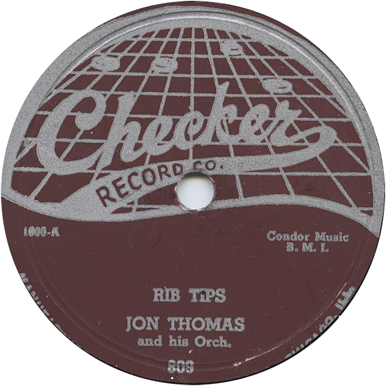
The Chess brothers acquired material from other sources at a fairly slow rate in 1955: 35 items all told.
They picked up an R&B single by Jon Thomas from the Note label in Indianapolis; the house publisher, Condor Music, is the giveaway. Thomas, playing piano on the date, led a quartet with tenor sax, electric guitar, and drums. From research by Bob Eagle, we've learned that Clifford "Wig" Bush was the guitarist. On "Rib Tips," the names of various down-home comestibles are roughly chanted over a funky background of slashing guitar and a few saxophonic whinnies; "Hi Fi" is a hard blues instrumental at a medium tempo featuring the tenor sax.
John Charles Thomas was born in Biloxi, Mississippi, on February 21, 1918. His family moved to Cincinnati, Ohio, when he was 3 years old. Growing up in Cincinnati, he worked with the Hopkins Melody Boys and a WPA band. He served in the armed forces in 1945-1946. Not long after his Note session, Thomas began playing the Hammond organ, putting together a regular quartet later that same year.
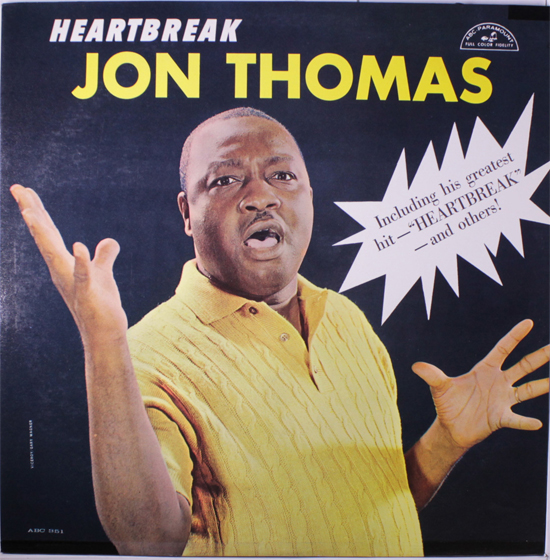
Checker 809 was released in January 1955. Leonard Chess talked it up on January 15 (p. 23) and a company ad linked it with Checker 808 and Chess 1586 (p. 20). Cash Box reviewed the record on January 15, 1955, p. 22), and the company repeated the ad from the previous week (January 22, p. 31). But on January 29, Checker 809 was dropped from the company ad (p. 31).
Thomas's music had some commercial potential, but Leonard and Phil Chess had a pile of hit records to move in 1955 and the Chess brothers did not sign him. Thomas performed on Baby Face Willette's one session for Vee-Jay in 1955, then picked up his first session gig for Cincinnati-based King Records on April 1, 1956 (not too shabby—it was backing Little Willie John on "Fever").
Thomas's next work under his own name was done as an organist: Mercury recorded him in Chicago and put out two singles on him in 1957. Mercury 71078, "Hard Head" Parts 1 and 2 got a fair-sized push, including a full-page ad in Cash Box (March 30, 1957, p. 23). The tune was credited to Annis House, which suggests it was recorded in Cincinnati. Mercury then followed up with an LP titled Big Beat on the Organ.
From late 1957 through late 1959, Thomas was a regular in the King studios, appearing on sessions with Titus Turner, Earl (Connelly) King, Tiny Topsy, Danny Overbea, Cozy Cole, Rudy West, Tab Smith, Earl Bostic, Gene Redd, The Drifters, Otis Williams and the Charms, and the Five Keys. In 1960, he started a production company called Journey and put out an LP titled Heartbreak on the ABC Paramount label; the title tune, a gritty vocal blues, was an R&B hit. On into 1961, he recorded a series of singles for ABC Paramount, some featuring piano and some featuring organ. His last known release was in 1964, a single for the Philadelpia-based Junior label. From 1967 till 1988, he was active as a pianist in cocktail lounges around Cincinnati. Jon Thomas died at the Hospice of Cincinnati on October 28, 1994.
Our Jon Thomas bio relies on Bob Eagle's detailed notes, as posted on the Real Blues Forum site on November 26, 2015.
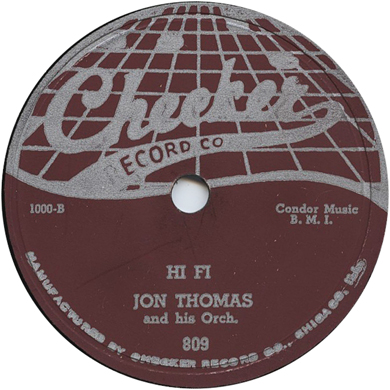
The company's sporadic dealings with J-V-B in Detroit became less so when they yielded a sermon by the Reverend C. L. Franklin (best known today as the father of Aretha). Cornelius LaVaughn Franklin had been preaching since his teens, and had taken up the pulpit at the New Bethel Baptist Church in Detroit in 1946. He was at the height of his fame when J-V-B began recording his sermons.
The Reverend Franklin's sermons completely changed the company's gospel offerings. We had thought that Chess started with singles on the Rev. Franklin, then progressed to what were really still 78-rpm albums, though these were packaged only in flimsy paper jackets. But the first album was getting talked up in January 1955, before Chess had any singles out on the Reverend, or had pressed its first LP: "Len Chess telling us about an album he has released which is reportedly selling very well. By the Rev. C. L. Franklin of Detroit. Album contains several well known sermons" (Cash Box, January 22, 1955, p. 27). Which album it was we are not sure, as they each contained several well known sermons.
By midyear, the company had a Rev. Franklin single, on Chess 1600. This also circulated as Chess 65, with the same number it had carried on J-V-B. Chess 1600, which is the less common version today, was still 78-only. The other sermons that we've encountered, whether they were sold singly or in packages were also strictly 78 rpm.
In 1956 and 1957, a tsunami rolled in: Franklin sermons in packages of 3 or 4 with paper jackets, in a separate series that mostly reused the release numbers they'd had on J-V-B. There would also be two further Franklin singles in the main series, Chess 1631 and Chess 1639. An early peformance, live in church, by his daughter Aretha would appear on Checker.
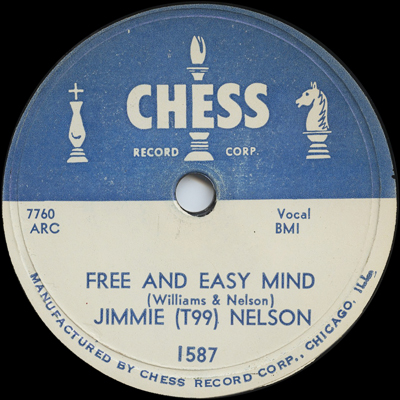
The single by Jimmie "T99" Nelson arrived from some little operation in Houston, Texas. Nelson's baritone vocals were accompanied by tenor and baritone saxes, piano, guitar, bass, and drums (musicians all unidentified). "Great Big Hunk of Man" is an exuberant blues on which Nelson does a pretty good approximation to Big Joe Turner; the slow "Free and Easy Mind" ranges into Lowell Fulson territory. Chess 1587 was released with some haste, at the beginning of February 1955: Leonard Chess was telling Cash Box about it on February 5 (p. 25); the record got a solo ad on February 12 (p. 34); and the Cash Box review arrived on February 26 (p. 32).
We're not sure what the sales were, but Leonard and Phil must have been OK with them. Chess would pick up further Nelson sides made in Houston in October 1957 and December 1959.
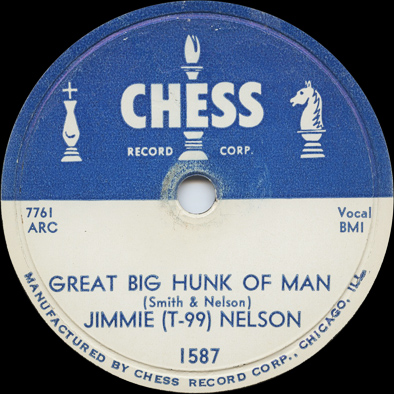
The final sides to be released in the 4858 series were cut in January 1955. Jimmy Lee and Johnny Mathis had quit working together, so for a little while Jimmy Lee was partnering with Wayne Walker.
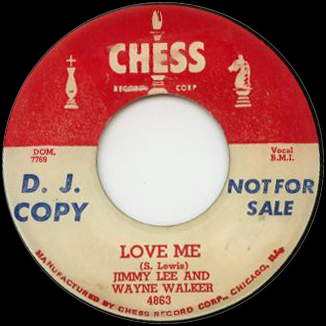
"Love Me" was the only rockabilly side to be included in the series. And Chess 4863 was the only recorded collaboration between Jimmy Lee and Wayne Walker, though they worked together on songs later. "Love Me" is an excellent example of the genre, but Walker didn't get the credit for writing it—that was appropriated by Stan Lewis.
Chess 4863 was first advertised in Cash Box (along with 4864) on March 12, 1955 (p. 32). It was readvertised (p. 80) and reviewed in Cash Box on April 2 (p. 85) then advertised again on April 23, 1955 (p. 27).
In 1956, Wayne Walker made a solo recording of "All I Can Do Is Cry" for ABC Paramount. He was now living in Nashville. In 1957, he was under contract to Columbia, releasing four singles; he continued with Coral (1958), Brunswick (1959), and some smaller labels into the 1960s. However, Walker always suffered from stage fright and hated touring. He put his energies into songwriting, at his peak supposedly turning out a new song every three days. He was inducted into the Nashville Songwriters Hall of Fame in 1975. Wayne Walker died of cancer in Nashville in 1979, at age of 53. He had 526 songs to his credit (http://www.rockabilly.nl/references/messages/wayne_walker.htm).
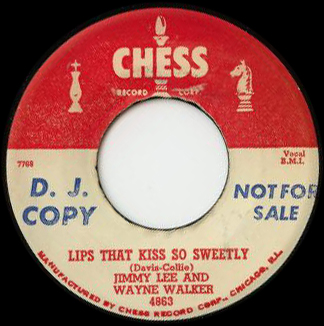
The final offering, Chess 4864, was by Jack Ford. It probably didn't sell any better than his first single. Like 4863, it was first advertised in Cash Box on March 12, 1955 (p. 32, along with 4860 and 4863), talked up in the same issue (p. 33), readvertised on April 2 (p. 80), reviewed on April 9 (p. 32), and givnn a valedictory solo spot on April 23 (p. 27).
Jack Ford left the Louisiana Hayride toward the end of 1957. In the early 1960s, he recorded for a local Shreveport label, Music of America, which was owned by Wilson Evans (the co-composer of "Yankee Dime"). Ford had at least 4 singles out on Music of America between 1961 and 1964. We don't know what happened to him after that. (Again, see http://jimreevesfanclub.com/jack_ford.htm),
The Chess brothers wrapped up their joint venture with Stan Lewis, with the last releases arriving in March 1955. Only one item out of the 4858s was in the emerging rockabilly style: "Love Me" by Jimmy Lee and Wayne Walker. The abortive venture was the farthest Chess would ever venture into Country music.
As for rockabilly, the company wasn't showing the best of timing, getting out just as the genre was getting established. Only after Chuck Berry and Bo Diddley had turned Chess and Checker into rock and roll providers did the Chess brothers make another foray into rockabilly. It would have to wait till 1957, when Stan Lewis brought them Dale Hawkins.
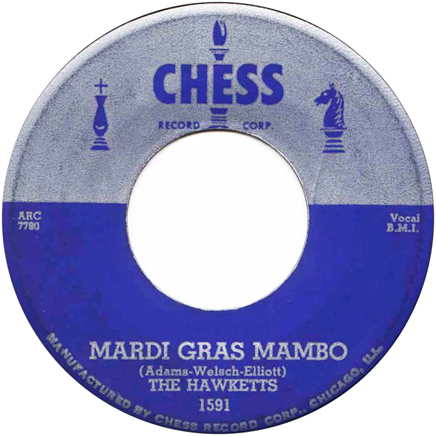
The collaboration with Paul Gayten in New Orleans proved more fruitful. Early in the year, The Hawketts served up "Mardi Gras Mambo" on Chess 1591.
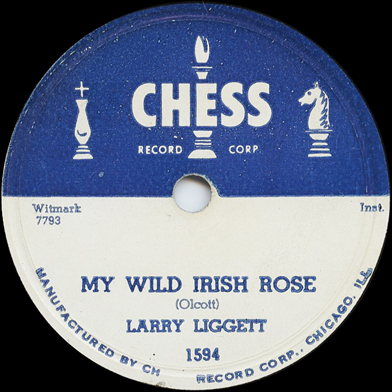
Note was already contributing Larry Liggett's singles to Chess. In April 1955, one more, his fourth, was released on Chess 1594 ("My Wild Irish Rose" and "The Turtle" were reviewed in Cash Box on April 16, 1955, p. 28). Liggett would get his fifth and final release, Chess 1622, in 1956. Because the company never would acquire any distributional muscle, some of Note's later releases, not featuring Liggett, would also show up on Checker (see our Jimmy Coe page for some from 1958).
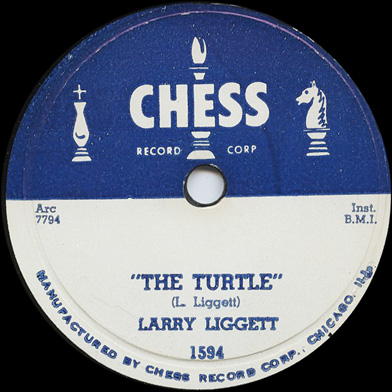
Some kind of pact was struck with Ace Records in southern Louisiana, but it must have fallen through because none of the material (by Lightnin' Slim and Henry Talbert) ever hit the racks with the Chess Producing Corp. brand on it.
In June, another Paul Gayten session was done in New Orleans witb the usual excellent personnel of Lee Allen (tenor saxophone), Red Tyler (baritone sax), Gayten (piano), Ernest McLean (guitar), Frank Fields (bass), and Earl Palmer (drums). Apparently the leader did of all the singing, and that's why the company ending up passing on the sides. One came out years later on a bootleg LP. The simple bounce "If You Love Me, Tell Me So" finally showed up on a Chess box in 1994, and the other two are most likely now lost.
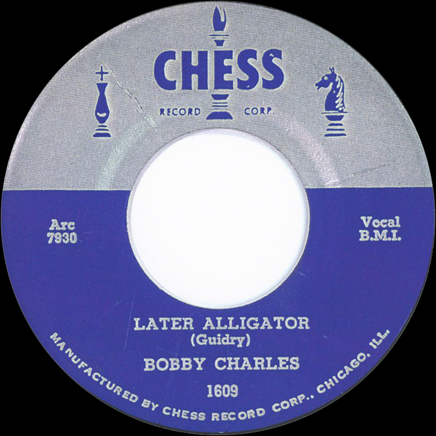
In the fall, Gayten followed up with a rock and roll hit in "Later Alligator" by Bobby Charles. Robert Charles Guidry was born in Abbeville, Louisiana, on February 21, 1938. From Cajun and Country music, his direction was forever changed when, at age 15, he first heard Fats Domino perform. He led bands as a teenager. He reportedly wrote "Later Alligator" in 20 minutes, after his piano player, Edwin LeBlanc, said "See you later, alligator" on leaving a bar, and one of the patrons replied, "After a while, crocodile."
Charles was 17 when his first session was cut in New Orleans in October, with Harry Simontaux, Raoul Prado, and Carlo Marino on the saxes, the aforementioned LeBlanc on piano, Larry Guidry on guitar, an unidentified bassist, and Kenneth Theriot at the drums.
Chess 1609 moved right on out to operators and retailers in November 1955. It was reviewed in Cash Box on November 26, 1955 (p. 33), Ads ran in Cash Box on December 24, 1955 (p. 41), January 21, 1956 (p. 33), and January 28, 1956 (p. 33). "Later Alligtor" was a bigger hit for Bill Haley on Decca, but Chess 1609 sold well enough to keep the company interested in recording Bobby Charles. The ballad on the flip side, "On Bended Knee," we have to say did not work to Charles' advantage vocally.
Continuing his collaboration with Paul Gayten, Charles made further sessions for Chess in 1956 and 1957. After two years with the Chess brothers, he departed to Imperial. In the end, he was more successful writing songs for others (such as "Walking to New Orleans" for Fats Domino, and "But I Do" for Frogman Henry) than performing on his own account. In the late 1980s, Charles ran a record label called Rice N Gravy. He died in Louisiana on January 14, 2010.
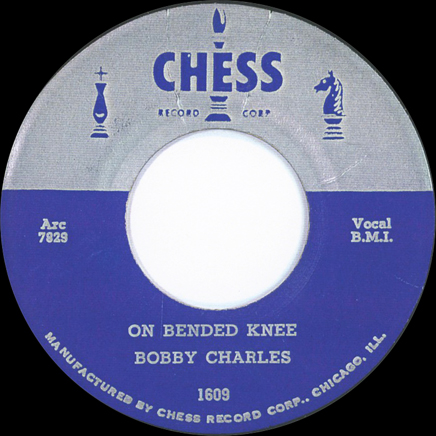
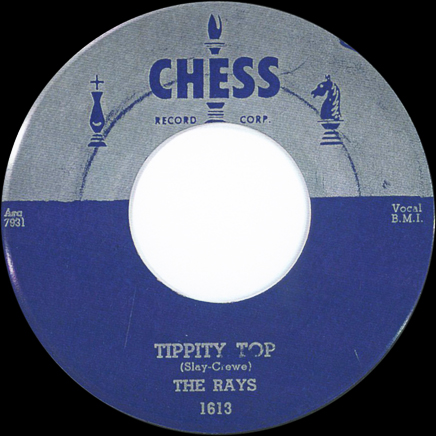
A single by the vocal group The Rays arrived from Bob Crewe Productions in New York City. Chess 1613 ("Moo-Goo-Gai-Pan" b/w "Tippity Top") was advertised in Cash Box on December 24, 1955 (p. 41) and again on January 7 (p. 24) and January 28, 1956 (p. 33). If it was reviewed in Cash Box, this must have come on December 31, 1955; we haven't seen the two pages from that issue that carried the R&B reviews. The Rays offered competitive doowop, but the company had plenty of its own vocal groups already. Chess picked up just one more by the Rays—in 1957.
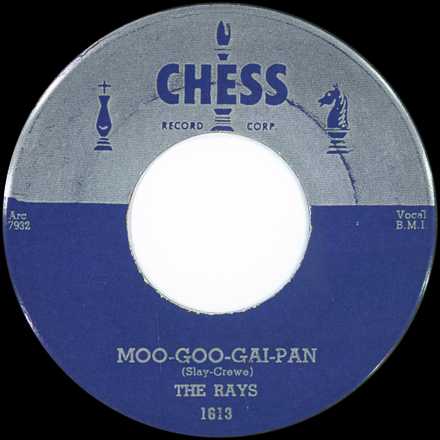
The unreleased Emmett Davis sides may have been the work of the Atlas label. The unreleased Christine Kittrell sides we have no idea about at all.
Paul Gayten was also responsible for Checker 831, a release headlined by Charles Williams. Charles "Hungry" Williams was Gayten's new drummer, replacing Earl Palmer, who had just moved to Los Angeles. (Billy Vera's liner notes to the 1989 Chess Paul Gayten LP and CD put the personnel change in 1956, but Williams' presence on a session from December 14, 1955 calls for a slight adjustment.) If anything else was cut at the December 1955 session, it's left no trace.
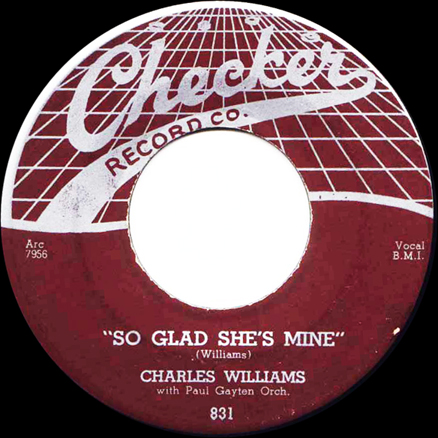
| Matrix | Artist | Title | Release Number | Recording Date | Release Date |
| 1000-A [Note] |
Jon Thomas and his Orch. | Rib Tips | Checker 809 [Note 1001] |
1954 [Indianapolis] |
January 1955 |
| 1000-B [Note] |
Jon Thomas and his Orch. | Hi-Fi | Checker 809 [Note 1001] |
1954 [Indianapolis] |
January 1955 |
| U7758 [P 53198] |
The Five Thrills | La Vern [sic] | Relic LP 5087, Parrot 803 [boot] | c. March 1954 [Parrot] |
|
| U7759 [P 53199] |
The Five Thrills | Girl of My Dreams, Darling [sic] | Relic LP 5087, Parrot 803 [boot] | 1954 [Parrot] |
|
| 7760 [source unknown] |
Jimmie (T99) Nelson | Free and Easy Mind | Chess 1587 | January 13, 1955 [Houston] | February 1955 |
| 7761 [source unknown] |
Jimmie (T-99) Nelson | Great Big Hunk of Man | Chess 1587 | January 13, 1955 [Houston] |
February 1955 |
| 7768 [Stan Lewis] |
Jimmy Lee and Wayne Walker | Lips That Kiss So Sweetly | Chess 4863 | January 1955 [Shreveport] |
March 1955 |
| 7769 [Stan Lewis] |
Jimmy Lee and Wayne Walker | Love Me | Chess 4863 | January 1955 [Shreveport] |
March 1955 |
| 7778 [Stan Lewis] |
Jack Ford | Yankee Dime | Chess 4864 | c. January 1955 [Shreveport] |
March 1955 |
| 7779 [Stan Lewis] |
Jack Ford | Teach Me to Love | Chess 4864 | c. January 1955 [Shreveport] |
March 1955 |
| 7780 [Paul Gayten] |
The Hawketts | Mardi Gras Mambo | Chess 1591 | January 1955 [New Orleans] |
March 1955 |
| 7781 [Paul Gayten] |
The Hawketts | Your Time's Up | Chess 1591 | January 1955 [New Orleans] |
March 1955 |
| 7793 [Note] |
Larry Liggett | My Wild Irish Rose | Chess 1594 | c. February 1955 [Indianapolis?] |
April 1955 |
| 7794 [Note] |
Larry Liggett | The Turtle | Chess 1594 | c. February 1955 [Indianapolis?] |
April 1955 |
| 7801 [3034, Ace] |
Lightnin' Slim | Bad Feeling Blues | (Chess [J] PLP-6035) | March 10, 1955 [Opelousas, LA] |
|
| 7802 [3035, Ace] |
Lightnin' Slim | Lightnin' Slim Boogie | (Chess [J] PLP-6035) | March 10, 1955 [Opelousas, LA] |
|
| 7803 [Ace] |
Lightnin' Slim | School Day Jump | (Chess [J] PLP-6035) | March 10, 1955 [Opelousas, LA] |
|
| 7804 [Ace] |
Lightnin' Slim | Station Blues | (Chess [J] PLP-6035) | March 10, 1955 [Opelousas, LA] |
|
| 7805 [Ace] |
Henry Talbert | Good Understanding | (Chess [J] PLP-6035) | March 10, 1955 [Opelousas, LA] |
|
| 7806 [Ace] |
Henry Talbert | Shake It Baby | (Chess [J] PLP-6035) | March 10, 1955 [Opelousas, LA] |
|
| 7858 [Paul Gayten] |
Paul Gayten | Needing Your Love | (Rarin' LP 555) | June 15, 1955 [New Orleans] |
|
| 7859 [Paul Gayten] |
Paul Gayten | If You Love Me, Tell Me So | (Chess CHD4-9352) | June 15, 1955 [New Orleans] |
|
| 7860 [Paul Gayten] |
Paul Gayten | Dirty Bird | unissued | June 15, 1955 [New Orleans] |
|
| 7861 [Paul Gayten] |
Paul Gayten | You Shouldn't Say That | unissued | June 15, 1955 [New Orleans] |
|
| 45-A [J-V-B] |
Rev. C. L. Franklin and Congregation Sings | I Love the Lord | Chess 1600 Chess 65 [J-V-B 65] |
1955 [Detroit] |
prob. June 1955 |
| 45-B [J-V-B] |
Rev. C. L. Franklin and Congregation Sings | Heard the Voice of Jesus | Chess 1600 Chess 65 [J-V-B 65] |
1955 [Detroit] |
prob. June 1955 |
| 7829 [sic] on label 7929 in vinyl [Paul Gayten] |
Bobby Charles | On Bended Knee | Chess 1609 | October 1955 [New Orleans] |
November 1955 |
| 7930 [Paul Gayten] |
Bobby Charles | Later Alligator | Chess 1609 | October 1955 [New Orleans] |
November 1955 |
| 7931 [Bob Crewe/Frank Slay] |
The Rays | Tippety Top | Chess 1613 | c. October 1955 [New York City] |
December 1955 |
| 7932 [Bob Crewe/Frank Slay] |
The Rays | Moo-Goo-Gai-Pan | Chess 1613 | c. October 1955 [New York City] |
December 1955 |
| 7933 [source unknown] |
Christine Kittrell | Handle with Care | unissued | October 25, 1955 [location?] |
|
| 7934 [source unknown] |
Christine Kittrell | Tricks of the Trade | unissued | October 25, 1955 [location?] |
|
| 7935 [poss. Atlas] |
Emmett Davis | Easier Said than Done | unissued | October 25, 1955 [New York City?] |
|
| 7936 [poss. Atlas] |
Emmett Davis | The Last Straw | unissued | October 25, 1955 [New York City?] |
|
| 7956 [Paul Gayten] |
Charles Williams with Paul Gayten Orch. | So Glad She's Mine | Checker 831 | December 14, 1955 [New Orleans] |
c. January 1956 |
| 7957 [Paul Gayten] |
Charles Williams with Paul Gayten Orch. | Mary, Don't You Weep, Mary Don't You Moan | Checker 831 | December 14, 1955 [New Orleans] |
c. January 1956 |
The end of 1955 marks a watershed. Up to this point the Chess company, like nearly all of the smaller independents, had been strictly a singles operation. (The early Reverend Franklin packages were the only exception, and these were 78s in envelopes.) The 33 1/3 rpm LP had become enough of a commercial force that the Chess brothers were now preparing to enter that market. The era of 10-inch LPs was just about over, so the company went straight to the 12-inch format.
For their first 12-inch microgroove release, on Marterry, they turned to the singer who had saved the label commercially back in 1951. This was the first item on Marterry, released in early November 1955 (plans had been made earlier; the matrix numbers indicate that the LP sides were mastered in August). The name changed to Argo so fast that the Marterry version of the LP is hard to find nowadays (the Billboard reviewer, November 12, 1955, p. 94, noticed that the tracks were old and the sonics of variable quality, but some were of "truly historical interest"). The Al Hibbler LP (matrix numbers 7881A for Side A, 7881B for Side B) was a straight reissue of the five Chess singles that had featured him. "Feather Roll Blues," an instrumental by Billy Strayhorn and band from Hibbler's first session for Sunrise, was included in the LP because it had been the flip side of Chess 1457. There was more from Sunrise and Miracle in the Chess vaults, but none of it was used on this occasion. Argo also released a 45-rpm EP consisting of four of the Hibbler items.
| Original matrix number | Title | Recording Date | Original release | First Chess release | LP release |
| EB1001A | Fat and Forty | early 1947 | Sunrise 2001A | Chess 1569 | Marterry LP 601, Argo LP 601 |
| EB1002 | Solitude | early 1947 | Sunrise 2002-A | Chess 1457 | Marterry LP 601, Argo LP 601 |
| EB1003A | My Little Brown Book | early 1947 | Sunrise 2001B | Chess 1481 | Marterry LP 601, Argo LP 601 |
| EB1004 | Feather Roll Blues | early 1947 | Sunrise 2002-B | Chess 1457 | Marterry LP 601, Argo LP 601 |
| SU-2029 | Trees | November 1947 | Miracle M-501 | Chess 1456 | Marterry LP 601, Argo LP 601 |
| SU-2030 | Lover Come Back to Me | November 1947 | Miracle M-501 | Chess 1456 | Marterry LP 601, Argo LP 601 |
| SU-2135 | It Don't Mean a Thing | 1948 | Chess 1455 | Marterry LP 601, Argo LP 601 | |
| SU-2140 | What Will I Tell My Heart? | April 1949 | Chess 1455 | Marterry LP 601, Argo LP 601 | |
| SU-2141 | Poor Butterfly | April 1949 | Sunrise 503 | Chess 1569 | Marterry LP 601, Argo LP 601 |
| SU-2142 | I Love You | April 1949 | Sunrise M-515 | Chess 1481 | Marterry LP 601, Argo LP 601 |
We are indebted to Michel Ruppli's Discography of the Chess Label for our basic listing. We have supplemented this with Les Fancourt's Chess Blues Discography and many other sources. Ian Saddler's article, "The '4800 Series' Hillbillies," in Roll Street Journal (Volume 1, No. 4, May 1983), pp. 1-3, was extremely helpful with the country series that the Chess brothers operated in 1954 and 1955 with material obtained from Stan Lewis in Shreveport, Louisiana; Dr. Robert Stallworth and Ferdie Gonzales provided significant corrections. Scott Dirks gave us full information on the Little Walter session that now sits at the head of the 1953 newly recorded listing, and improved our listing for the session of May 22, 1954. Bill Daniels researched Billboard from 1953 through 1955 to find the first mentions of most Chess and Checker releases during that period. Dave Sax provided corrections to our Eddie Boyd listings (email communication, September 7, 2006). Moanin' at Midnight: The Life and Times of Howlin' Wolf, by James Segrest and Mark Hoffman (New York: Pantheon, 2004) contains a valuable sessionography.
We strongly recommend Nadine Cohodas' book on the Chess brothers and the Aristocrat/Chess label: Spinning Blues into Gold: The Chess Brothers and the Legendary Chess Records, published in May 2000. (For more about the book see http://www.bluestogold.com.) This is not just one of the best books ever written about the Chicago scene, it may be the best book ever written about the record business. Among other things it is our source for the date of the company's move to 4750 South Cottage Grove and the occasional recording activity in the back room there.
Click here to return to the Red Saunders Research Foundation page.
Click here to return to Robert L. Campbell's Home page.